
Palæolithic flint scraper from Icklingham, Suffolk. (Evans.)
The Project Gutenberg EBook of A Student's History of England, v. 1 (of 3),
by Samuel Rawson Gardiner
This eBook is for the use of anyone anywhere at no cost and with
almost no restrictions whatsoever. You may copy it, give it away or
re-use it under the terms of the Project Gutenberg License included
with this eBook or online at www.gutenberg.org
Title: A Student's History of England, v. 1 (of 3)
From the earliest times to the Death of King Edward VII
Author: Samuel Rawson Gardiner
Release Date: February 23, 2009 [EBook #28157]
Language: English
Character set encoding: ISO-8859-1
*** START OF THIS PROJECT GUTENBERG EBOOK HISTORY OF ENGLAND ***
Produced by Darren Izzard, Christine P. Travers and the
Online Distributed Proofreading Team at http://www.pgdp.net
(This file was produced from images generously made
available by The Internet Archive/Canadian Libraries)
Transcriber's note: Obvious printer's errors have been corrected, all other inconsistencies are as in the original. The author's spelling has been maintained.
Each page of the original book had a side note stating the time span treated on that page. Those side notes have been deleted.
FROM THE EARLIEST TIMES TO THE DEATH OF KING EDWARD VII
BY
VOL. I.
B.C. 55—A.D. 1509
NEW IMPRESSION (1915)
REISSUE
LONGMANS, GREEN, AND CO.
39 PATERNOSTER ROW, LONDON
FOURTH AVENUE & 30th STREET, NEW YORK
BOMBAY, CALCUTTA, AND MADRAS
1916
All rights reserved
HISTORY OF ENGLAND, from the Accession of James I. to the Outbreak of the Civil War, 1603-1642. With Maps. 10 vols. crown 8vo. 5s. net each.
A HISTORY OF THE GREAT CIVIL WAR, 1642-1649. With Maps. 4 vols. crown 8vo. 5s. net each.
A HISTORY OF THE COMMONWEALTH AND THE PROTECTORATE, 1649-1656. With Maps. 4 vols. crown 8vo. 5s. net each.
THE LAST YEARS OF THE PROTECTORATE, 1656-1658. By Charles Harding Firth, M.A., Regius Professor of Modern History in the University of Oxford. With 3 Plans. 2 vols. 8vo. 24s. net.
A STUDENT'S HISTORY OF ENGLAND. From the Earliest Times to the Death of King Edward VII.
PREPARATORY QUESTIONS ON S. R. GARDINER'S STUDENT'S HISTORY OF ENGLAND. By R. Somervell, M.A. Crown 8vo. 1s.
SUMMARY OF ENGLISH HISTORY, based on S. R. Gardiner's 'Outline of English History.' Brought down to the Accession of Edward VII. By W. Reep. Fcp. 8vo. 6d.
A SCHOOL ATLAS OF ENGLISH HISTORY. Edited by Samuel Rawson Gardiner, D.C.L., LL.D. With 66 Coloured Maps and 22 Plans of Battles and Sieges. Fcp. 4to. 5s.
LONGMANS' ELEMENTARY HISTORICAL ATLAS, abridged from S. R. Gardiner's 'School Atlas of English History.' Post 4to. 1s.
CROMWELL'S PLACE IN HISTORY. Founded on Six Lectures delivered at Oxford. Crown 8vo. 3s. 6d.
OLIVER CROMWELL. With Portrait. Crown 8vo. 5s. net.
THE FIRST TWO STUARTS AND THE PURITAN REVOLUTION, 1603-1660. 4 Maps. Fcp. 8vo. 2s. 6d.
THE THIRTY YEARS' WAR, 1618-1648. With a Map. Fcp. 8vo. 2s. 6d.
OUTLINE OF ENGLISH HISTORY, B.C. 55-A.D. 1910. With 67 Woodcuts and 17 Maps. Fcp. 8vo. 2s. 6d.
THE FRENCH REVOLUTION, 1789-1795. By Mrs. S. R. Gardiner. With 7 Maps. Fcp. 8vo. 2s. 6d.
LONGMANS, GREEN, & CO., 39 Paternoster Row, London, New York, Bombay, Calcutta, and Madras.
The present work is intended for such students as have already an elementary knowledge of the main facts of English history, and aims at meeting their needs by the use of plain language on the one hand, and by the avoidance, on the other hand, of that multiplicity of details which is apt to overburden the memory.
At the close of the book I have treated the last eleven years, 1874 to 1885, in a manner which precludes all expression of my own views, either on the characters of the actors or on the value of the work performed by them; and something of the same reticence will be observed in the pages dealing with the years immediately preceding 1874. We have not the material before us for the formation of a final judgment on many points arising in the course of the narrative, and it is therefore better to abstain from the expression of decided opinion, except on matters so completely before the public as to leave no room for hesitation. Especially is this rule to be observed in a book addressed to those who are not yet at an age when independent investigation is possible.
I hope it will be understood that in my mention of various authors I have had no intention of writing a history of literature, however brief. My object has been throughout to exhibit (p. iv) that side of literature which connects itself with the general political or intellectual movement of the country, and to leave unnoticed the purely literary or scientific qualities of the writers mentioned. This will explain, for instance, the total omission of the name of Roger Bacon, and the brief and, if regarded from a different point of view, the very unsatisfactory treatment of writers like Dickens and Thackeray.
Those of my readers who have complained that no maps were to be found in the book may now be referred to a 'School Atlas of English History,' recently edited by me for Messrs. Longmans & Co. To include an adequate number of maps in this volume would have increased its size beyond all fitting limits.
In the spelling of Indian names I have not adopted the modern and improved system of transliteration. Admirable as it is when used by those who are able to give the right sound to each letter, it only leads to mispronunciation in the mouths of those who are, as most of the readers of this volume will be, entirely in the dark on this point. The old rough method of our fathers at least ensures a fair approximation to the true pronunciation.
My warmest thanks are due to Mr. George Nutt, of Rugby, and to the Rev. W. Hunt. Mr. Nutt not only looked over the proof-sheets up to the death of Edward I. with excellent results, but gave me most valuable advice as to the general arrangement of the book, founded on his own long experience of scholastic teaching. The Rev. W. Hunt looked over a considerable portion of the remaining proof-sheets, and called my attention to several errors and omissions which had escaped my eye.
The illustrations have been selected by Mr. W. H. St. John (p. v) Hope, Assistant-Secretary of the Society of Antiquaries. He wishes to acknowledge much valuable assistance given to him in the choice of portraits by George Scharf, Esq., C.B., F.S.A., who is recognised as the highest authority on the subject.
I am indebted to Her Majesty the Queen for permission to engrave two of the portraits appearing in the following pages—viz., those of Bishop Fisher, on p. 393, and the Duke of Norfolk, on p. 410—the originals in both cases being at Windsor Castle.
I have to thank Earl Spencer for permission to engrave the portrait on p. 362; the Earl of Essex for that on p. 476; the Earl of Warwick for that on p. 403; the Earl of Carlisle for that on p. 459; the Viscount Dillon, F.S.A., for that on p. 376; the Hon Sir Spencer Ponsonby-Fane, K.C.B., for that on p. 365; Sir John Farnaby Lennard, Bart., for that on p. 463; Dr. Evans for those on pp. 2, 4, 6; Edward Huth, Esq., for that on p. 387; Mrs. Dent, of Sudeley, for that on p. 395; H. Hucks Gibbs, Esq., for that on p. 419; T. A. Hope, Esq., for that on p. 487; E. B. Nicholson, Esq., for the portrait of Lord Burghley in the Bodleian Library, Oxford, engraved at p. 479; the authorities of the University of Cambridge for that on p. 477; of Jesus College, Cambridge, for that on p. 414; and of Sidney Sussex College, Cambridge, for that on p. 567; and the Treasurer of Christ's Hospital, London, for the portrait of Charles II. on p. 579. I have also to thank Mr. John Murray for permission to engrave the figures on pp. 130, 150, 160, 166, 177, 188, 260; Messrs. Parker & Co., Oxford, for those on pp. 19, 51, 75, 91, 107, 128, 170, 192, 197, 230, 245, 246, 247, 253, 409, 451; Mr. W. Nives for those at pp. 381, 409, 451; Mr. J. G. Waller for those on pp. 219, 229, 292, 298, 515; Mr. Bruce for those on pp. 17, 18, 21; Messrs. Poulton & Sons, Lee, for those on pp. 7, (p. vi) 132; Mr. G. A. Nichols, Stamford, for those on pp. 311, 316, Mr. G. T. Clarke, for that on p. 74; Messrs. Carl Norman & Co., Tunbridge Wells, for that on p. 171; Mr. R. Keene, Derby, for that on p. 318; the Rev. H. H. Henson, Vicar of Barking, Essex, for the photograph of the monument of Sir Charles Montague on p. 507; the Science and Art Department for those on pp. 371, 440, 518, 612; Mr. W. H. Wheeler, of Oxford, for those on pp. 319, 384; Messrs. Valentine & Sons, Dundee, for those on pp. 109, 206, 213, 238, 244, 276, 355, 378, 485, 662, 666, 668, 683, 907, 919, 937, 942; and Mr. R. Keene, Derby, for those on pp. 466, 467, 469, 471.
PART I.
ENGLAND BEFORE THE NORMAN CONQUEST.
CHAPTER I.
PREHISTORIC AND ROMAN BRITAIN.
(p. viii) CHAPTER II.
THE ENGLISH SETTLEMENTS.
CHAPTER III.
THE STRIFE OF THE ENGLISH KINGDOMS.
CHAPTER IV.
THE ENGLISH KINGSHIP AND THE STRUGGLE WITH THE DANES.
CHAPTER V.
EADGAR'S ENGLAND.
CHAPTER VI.
ENGLAND AND NORMANDY.
(p. x) PART II.
THE NORMAN AND ANGEVIN KINGS.
CHAPTER VII.
WILLIAM I. 1066—1087.
CHAPTER VIII.
WILLIAM II. 1087—1100.
CHAPTER IX.
HENRY I. AND STEPHEN.
HENRY I., 1100—1135. STEPHEN, 1135—1154.
CHAPTER X.
HENRY II. 1154—1189.
CHAPTER XI.
RICHARD I. 1189—1199.
(p. xii) PART III
THE GROWTH OF THE PARLIAMENTARY CONSTITUTION. 1199-1399.
CHAPTER XII.
JOHN. 1199-1216.
CHAPTER XIII.
HENRY III. 1216-1272.
CHAPTER XIV.
EDWARD I. AND EDWARD II.
EDWARD I., 1272—1307. EDWARD II., 1307—1327.
CHAPTER XV.
FROM THE ACCESSION OF EDWARD III. TO THE TREATY OF BRETIGNI.
1327—1360.
CHAPTER XVI.
REIGN OF EDWARD III. AFTER THE TREATY OF BRETIGNI.
1360—1377.
CHAPTER XVII.
RICHARD II. AND THE SOCIAL REVOLUTION.
1377—1381.
CHAPTER XVIII.
RICHARD II. AND THE POLITICAL REVOLUTION.
1382—1399.
PART IV.
LANCASTER, YORK, AND TUDOR. 1399—1509.
CHAPTER XIX.
HENRY IV. AND HENRY V.
HENRY IV., 1399—1413. HENRY V., 1413—1422.
CHAPTER XX.
HENRY VI. AND THE LOSS OF FRANCE. 1422-1451.
CHAPTER XXI.
THE LATER YEARS OF HENRY VI. 1450-1461.
(p. xvii) CHAPTER XXII.
THE YORKIST KINGS.
1461—1485.
CHAPTER XXIII.
HENRY VII. 1485—1509.
| Ecgberht 802-839 |
|||||||||||||||||||
| Æthelwulf 839-858 |
|||||||||||||||||||
| Æthelbald 858-860 |
Æthelberht 860-866 |
Æthelred 866-871 |
Ælfred 871-901 |
||||||||||||||||
| Eadward the Elder 899-924 |
Æthelflæd (the Lady of the Mercians) |
= | Æthelred Ealdorman of the Mercians |
||||||||||||||||
| Æthelstan 924-940 |
Eadmund 940-946 |
Eadred 946-955 |
|||||||||||||||||
| Eadwig 955-959 |
Æthelflæd | = | Eadgar 959-975 |
= | Ælfthryth | ||||||||||||||
| Richard I. Duke of Normandy |
Svend | ||||||||||||||||||
| Eadward the Martyr 975-979 |
Ælfled | = | Æthelred the Unready 979-1016 |
= | Emma | = | Cnut 1016-1035 |
||||||||||||
| Eadmund Ironside 1016 |
Harold 1036-1039 |
Harthacnut 1039-1042 |
|||||||||||||||||
| Godwine | |||||||||||||||||||
| Eadmund | Eadward the Ætheling |
Ælfred the Ætheling |
Eadward the Confessor 1042-1066 |
= | Eadgyth | Harold 1066 |
|||||||||||||
| Eadgar the Ætheling |
Margaret | = | Malcolm Canmore | ||||||||||||||||
| Eadgyth (Matilda) |
= | Henry I. 1100-1135 |
|||||||||||||||||
| Hrolf 912-927 (?) |
|||||||||||||||
| William Longsword 927 (?)-943 |
|||||||||||||||
| Richard I., the Fearless 943-996 |
|||||||||||||||
| Richard II., the Good 996-1026 |
Emma | = | (1) Æthelred the Unready |
||||||||||||
| Richard III. 1026-1028 |
Robert 1028-1035 |
Eadward the Confessor |
|||||||||||||
| William I 1035-1087 King of England 1066-1087 |
|||||||||||||||
| Robert Duke of Normandy 1087-1106 |
William II 1087-1100 |
Henry I. 1100-1135 |
Adela | = | Stephen Count of Blois |
||||||||||
| Henry V. Emperor |
= | Matilda | = | Geoffrey Count of Anjou |
Stephen 1135-1154 |
||||||||||
| Henry II. 1154-1189 |
|||||||||||||||
| Henry | Geoffrey | Richard I. 1189-1199 |
John 1199-1216 |
||||||||||||
| Henry III. 1216-1272 |
|||||||||||||||
| Edward I. 1272-1307 |
|||||||||||||||
| Edward II. 1307-1327 |
|||||||||||||||
| Edward III 1327-1377 |
|||||||||||||||
| Edward the Black Prince |
Lionel Duke of Clarence |
John of Gaunt Duke of Lancaster |
Edmund Duke of York |
||||||||||||
| Richard II. 1377-1399 |
Philippa | = | Edmund Mortimer Earl of March |
Henry IV. 1399-1412 |
|||||||||||
| Henry V. 1413-1422 |
|||||||||||||||
| Roger, Earl of March | Henry VI. 1422-1461 |
||||||||||||||
| Edmund Earl of March |
Anne | = | Richard Earl of Cambridge |
||||||||||||
| Richard, Duke of York |
|||||||||||||||
| Edward IV. 1461-1483 |
Richard III. 1483-1485 |
||||||||||||||
| Edward V. 1483 |
Elizabeth | = | Henry VII. 1485-1509 (Descended from John of Gaunt by Catherine Swynford) |
||||||||||||
| Duncan I. (died 1057) |
|||||||||||||||
| Margaret sister of Edgar Ætheling |
= | Malcolm III. Canmore 1057-1093 |
Donald Bane 1093-1094, restored 1095-1098 |
||||||||||||
| Duncan II. 1094-1095 |
|||||||||||||||
| Edgar 1098-1107 |
Alexander I. 1107-1124 |
David I. 1124-1153 |
|||||||||||||
| Henry | |||||||||||||||
| Malcolm IV. 1153-1165 |
William the Lion 1165-1214 |
David Earl of Huntingdon |
|||||||||||||
| Alexander II. 1214-1249 |
Margaret | Isabella | |||||||||||||
| Devorguilla | = | John Balliol | Robert Bruce | ||||||||||||
| Alexander III. 1249-1285 |
|||||||||||||||
| John Balliol 1292-1296 |
Robert Bruce | ||||||||||||||
| Margaret | = | Eric, King of Norway |
Robert Bruce 1306-1329 |
||||||||||||
| Margaret (the Maid of Norway) |
David II. 1329-1370 |
Margaret | = | Walter | |||||||||||
| Robert II., Stewart or Stuart 1370-1390 |
|||||||||||||||
| Robert III. 1390-1406 |
|||||||||||||||
| James I. 1406-1437 |
|||||||||||||||
| James II. 1437-1460 |
|||||||||||||||
| James III. 1460-1488 |
|||||||||||||||
| James IV. 1488-1513 |
|||||||||||||||
| Hugh the Great (died 956) |
|||||||||||||||||||
| Hugh Capet 987-996 |
|||||||||||||||||||
| Robert 996-1031 |
|||||||||||||||||||
| Henry I. 1031-1060 |
|||||||||||||||||||
| Philip I. 1060-1108 |
|||||||||||||||||||
| Louis VI. 1108-1137 |
|||||||||||||||||||
| Louis VII. 1137-1180 |
|||||||||||||||||||
| Philip II. 1180-1223 |
|||||||||||||||||||
| Louis VIII. 1223-1226 |
|||||||||||||||||||
| (St.) Louis IX 1226-1270 |
|||||||||||||||||||
| Philip III. 1270-1285 |
|||||||||||||||||||
| Philip IV. 1283-1314 |
Charles of Valois | ||||||||||||||||||
| Louis X. 1314-1316 |
Philip V. 1316-1322 |
Charles IV. 1322-1328 |
Isabella m. Edward II. |
Philip VI 1328-1350 |
|||||||||||||||
| Jeanne | John (died seven days old) |
Two daughters | Edward III. | John 1350-1364 |
|||||||||||||||
| Charles V. 1364-1380 |
Dukes of Burgundy Philip |
||||||||||||||||||
| Charles VI. 1380-1422 |
Louis Duke of Orleans |
John | |||||||||||||||||
| Charles VII. 1422-1461 |
Charles Duke of Orleans |
Philip | |||||||||||||||||
| Louis XI. 1461-1483 |
Louis XII. 1498-1519 |
Charles | |||||||||||||||||
| Charles VIII. 1483-1498 |
|||||||||||||||||||
LEADING DATES

Palæolithic flint scraper from Icklingham, Suffolk. (Evans.)
1. Palæolithic Man of the River-Drift.—Countless ages ago, there was a period of time to which geologists have given the name of the Pleistocene Age. The part of the earth's surface afterwards called Britain was then attached to the Continent, so that animals could pass over on dry land. The climate was much colder than it is now, and it is known from the bones which have been dug up that the country was inhabited by wolves, bears, mammoths, woolly rhinoceroses, and other creatures now extinct. No human remains have been found amongst these bones, but there is no doubt that men existed contemporaneously with their deposit, because, in the river drift, or gravel washed down by rivers, there have been discovered flints sharpened by chipping, which can only have been produced by the hand of man. The men who used them are known as Palæolithic, or the men of ancient stone, because these stone implements are rougher and therefore older than others which have (p. 002) been discovered. These Palæolithic men of the river drift were a race of stunted savages who did not cultivate the ground, but lived on the animals which they killed, and must have had great difficulty in procuring food, as they did not know how to make handles for their sharpened flints, and must therefore have had to hold them in their hands.

Palæolithic flint implement from Hoxne, Suffolk.
2. Cave-dwelling Palæolithic Man.—This race was succeeded by another which dwelt in caves. They, as well as their predecessors, are known as Palæolithic men, as their weapons were still very rude. As, however, they had learnt to make handles for them, they could construct arrows, harpoons, and javelins. They also made awls and needles of stone; and, what is more remarkable, they possessed a decided artistic power, which enabled them to indicate by a few vigorous scratches the forms of horses, mammoths, reindeer, and other animals. Vast heaps of rubbish still exist in various parts of Europe, which are found to consist of the bones, shells, and other refuse thrown out by these later Palæolithic men, who had no reverence for the dead, casting out the bodies of their relations to decay with as little thought as they threw away oyster-shells or (p. 003) reindeer-bones. Traces of Palæolithic men of this type have been found as far north as Derbyshire. Their descendants are no longer be met with in these islands. The Eskimos of the extreme north of America, however, have the same artistic faculty and the same disregard for the dead, and it has therefore been supposed that the cave-dwelling men were of the race to which the modern Eskimos belong.

Engraved bone from Cresswell Crags, Derbyshire, now in the British Museum (full size).

Neolithic flint arrow-head from Rudstone, Yorks. (Evans.)

Neolithic celt or cutting instrument from Guernsey. (Evans.)

Neolithic axe from Winterbourn Steepleton, Dorset. (Evans.)
3. Neolithic Man.—Ages passed away during which the climate became more temperate, and the earth's surface in these regions sank to a lower level. The seas afterwards known as the North Sea and the English Channel flowed over the depression; and an island was thus formed out of land which had once been part of the continent. After this process had taken place, a third race appeared, which must have crossed the sea in rafts or canoes, and which took the place of the Palæolithic men. They are known as Neolithic, or men of the new stone age, because their stone implements were of a newer kind, being polished and more efficient than those of their predecessors. They had, therefore, the advantage of superior (p. 004) weapons, and perhaps of superior strength, and were able to overpower those whom they found in the island. With their stone axes they made clearings in the woods in which to place their settlements. They brought with them domestic animals, sheep and goats, dogs and pigs. They spun thread with spindle and distaff, and wove it into cloth upon a loom. They grew corn and manufactured a rude kind of pottery. Each tribe lived in a state of war with its neighbours. A tribe when attacked in force took shelter on the hills in places of refuge, which were surrounded by lofty mounds and ditches. Many of these places of refuge are still to be seen, as, for instance, the one which bears the name of Maiden Castle, near Dorchester. On the open hills, too, are still to be found the long barrows which the Neolithic men raised over the dead. There is little doubt that these men, whose way of life was so superior to that of their Eskimo-like predecessors, were of the race now known (p. 005) as Iberian, which at one time inhabited a great part of Western Europe, but which has since mingled with other races. The Basques of the Pyrenees are the only Iberians who still preserve anything like purity of descent, though even the Basques have in them blood the origin of which is not Iberian.

Early British Pottery.

Early British Pottery.
4. Celts and Iberians.—The Iberians were followed by a swarm of new-comers called Celts. The Celts belong to a group of races sometimes known as the Aryan group, to which also belong Teutons, Slavonians, Italians, Greeks, and the chief ancient races of Persia and India. The Celts were the first to arrive in the West, where they seized upon lands in Spain, in Gaul, and in Britain, which the Iberians had occupied before them. They did not, however, destroy the Iberians altogether. However careful a conquering tribe maybe to preserve the purity of its blood, it rarely succeeds in doing so. The conquerors (p. 006) are sure to preserve some of the men of the conquered race as slaves, and a still larger number of young and comely women who become the mothers of their children. In time the slaves and the children learn to speak the language of their masters or fathers. Thus every European population is derived from many races.

Bronze celt from the Isle of Harty, Kent (½).
5. The Celts in Britain.—The Celts were fair-haired and taller than the Iberians, whom they conquered or displaced. They had the advantage of being possessed of weapons of bronze, for which even the polished stone weapons of the Iberians were no match. They burned instead of burying their dead, and raised over the ashes those round barrows which are still to be found intermingled with the long barrows of the Iberians.

Bronze lance-head found in Ireland.

Bronze caldron found in Ireland.
6. Goidels and Britons.—The earliest known name given to this island was Albion. It is uncertain whether the word is of Celtic or of Iberian origin. The later name Britain is derived from a second swarm of Celts called Brythons or Britons, who after a long interval followed the first Celtic immigration. The descendants of these first immigrants are distinguished from the new-comers by the name of Goidels, and it is probable that they were at one time settled in Britain as well as in Ireland, and that they were pushed across the sea into Ireland by the stronger and more civilised Britons. At all events, when history begins Goidels were only to be found in Ireland, though at a (p. 007) later time they colonised a part of what is now known as Scotland, and sent some offshoots into Wales. At present the languages derived from that of the Goidels are the Gaelic of the Highlands, the Manx of the Isle of Man, and the Erse of Ireland. The only language now spoken in the British Isles which is derived from that of the Britons is the Welsh; but the old Cornish language, which was spoken nearly up to the close of the eighteenth century, came from the same stock. It is therefore likely that the Britons pushed the Goidels northward and westward, as the Goidels had formerly pushed the Iberians in the same directions. It was most likely that the Britons erected the huge stone circle of Stonehenge on Salisbury Plain, though it is not possible to speak with certainty. That of Avebury is of an earlier date and uncertain origin. Both were probably intended to serve as monuments of the dead, though it is sometimes supposed that they were also used as temples.

View of Stonehenge. (From a photograph.)
7. Phœnicians and Greeks.—The most civilised nations of the ancient world were those which dwelt round the Mediterranean Sea. It was long supposed that the Phœnicians came to Britain (p. 008) from the coast of Syria, or from their colonies at Carthage and in the south of Spain, for the tin which they needed for the manufacture of bronze. The peninsula of Devon and Cornwall is the only part of the island which produces tin, and it has therefore been thought that the Cassiterides, or tin islands, which the Phœnicians visited, were to be found in that region. It has, however, been recently shown that the Cassiterides were most probably off the coast of Galicia, in Spain, and the belief that Phœnicians visited Britain for tin must therefore be considered to be very doubtful. The first educated visitor who reached Britain was Pytheas, a Greek, who was sent by the merchants of the Greek colony of Massalia (Marseilles) about 330 B.C. to make discoveries which might lead to the opening across Gaul of a trade-route between Britain and their city. It was probably in consequence of the information which he carried to Massalia on his return that there sprang up a trade in British tin. Another Greek, Posidonius, who came to Britain about two centuries after Pytheas, found this trade in full working order. The tin was brought by land from the present Devon or Cornwall to an island called Ictis, which was only accessible on foot after the tide had ebbed. This island was probably Thanet, which was in those days cut off from the mainland by an arm of the sea which could be crossed on foot at low water. From Thanet the tin was carried into Gaul across the straits, and was then conveyed in waggons to the Rhone to be floated down to the Mediterranean.
8. Gauls and Belgians in Britain.—During the time when this trade was being carried on, tribes of Gauls and Belgians landed in Britain. The Gauls were certainly, and the Belgians probably, of the same Celtic race as that which already occupied the island. The Gauls settled on the east coast as far as the Fens and the Wash, whilst the Belgians occupied the south coast, and pushed northwards towards the Somerset Avon. Nothing is known of the relations between the new-comers and the older Celtic inhabitants. Most likely those who arrived last contented themselves with mastering those whom they defeated, without attempting to exterminate them. At all events, states of some extent were formed by the conquerors. Thus the Cantii occupied the open ground to the north of the great forest which then filled the valley between the chalk ranges of the North and South Downs; the Trinobantes dwelt between the Lea and the Essex Stour; the Iceni occupied the peninsula between the Fens and the sea which was afterwards known as East Anglia (Norfolk and (p. 009) Suffolk); and the Catuvellauni dwelt to the west of the Trinobantes, spreading over the modern Hertfordshire and the neighbouring districts.
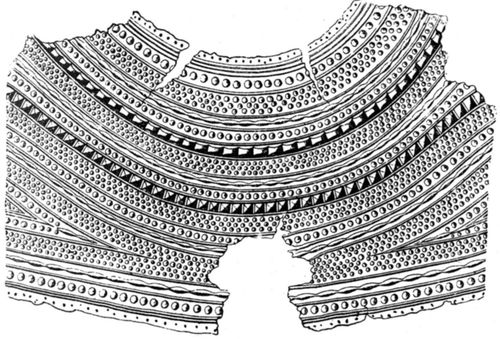
Part of a British gold corselet found at Mold.
9. Culture and War.—Though there were other states in Britain, the tribes which have been named had the advantage of being situated on the south-eastern part of the island, and therefore of being in commercial communication with the continental Gauls of their own race and language. Trade increased, and brought with it the introduction of some things which the Britons would not have invented for themselves. For instance, the inhabitants of the south-east of Britain began to use gold coins and decorations in imitation of those which were then common in Gaul. Yet, in spite of these improvements, even the most civilised Britons were still in a rude and barbarous condition. They had no towns, but dwelt in scattered huts. When they were hard pressed by an enemy they took refuge in an open space cleared in the woods, and surrounded by a high earthwork crowned by a palisade and guarded by felled trees. When they went out to battle they dyed their faces in order to terrify their enemies. Their warriors made use of chariots, dashing in them along the front of the enemy's line till they espied an opening in his ranks. They then leapt down and charged on foot into the gap. Their charioteers in the (p. 010) meanwhile drove off the horses to a safe distance, so as to be ready to take up their comrades if the battle went against them.
10. Religion of the Britons.—The Celtic races worshipped many gods. In Gaul, the Druids, who were the ministers of religion, taught the doctrine of the transmigration of souls, and even gave moral instruction to the young. In Ireland, and perhaps in Britain, they were conjurers and wizards. Both in Gaul and Britain they kept up the traditional belief which had once been prevalent in all parts of the world, that the gods could only be appeased by human sacrifices. It was supposed that they needed either to drink human blood or to be supplied with human slaves, and that the only way to give them what they wanted was to despatch as many human beings as possible into the other world. The favourite way of doing this was to construct a huge wicker basket in the shape of a man, to cram it with men and women, and to set it on fire. At other times a Druid would cut open a single human victim, and would imagine that he could foretell the future by inspecting the size and appearance of the entrails.

Julius Cæsar. (From a bust in the British Museum.)
11. The Romans in Gaul. B.C. 55.—In the year 55 B.C. the Celts of south-eastern Britain first came in contact with a Roman army. The Romans were a civilised people, and had been engaged for some centuries in conquering the peoples living round the Mediterranean. They possessed disciplined armies, and a regular government. By the beginning of the year the Roman general, Gaius Julius Cæsar, had made himself master of Gaul. Then, after driving back with enormous slaughter two German tribes which had invaded Gaul, he crossed the Rhine, not because he wished to conquer Germany, but because he wished to strike (p. 011) terror into the Germans in order to render them unwilling to renew their attack. This march into Germany seems to have suggested to Cæsar the idea of invading Britain. It is most unlikely that he thought of conquering the island, as he had quite enough to do in Gaul. What he really wanted was to prevent the Britons from coming to the help of their kindred whom he had just subdued, and he would accomplish this object best by landing on their shores and showing them how formidable a Roman army was.
12. Cæsar's First Invasion. B.C. 55.—Accordingly, towards the end of August, Cæsar crossed the straits with about 10,000 men. There is some uncertainty about the place of his landing, but he probably first appeared off the spot at which Dover now stands, and then, being alarmed at the number of the Britons who had crowded to defend the coast, made his way by sea to the site of the modern Deal. There, too, his landing was opposed, but he managed to reach the shore with his army. He soon found, however, that the season was too advanced to enable him to accomplish anything. A storm having damaged his shipping and driven off the transports on which was embarked his cavalry, he returned to Gaul.
13. Cæsar's Second Invasion. B.C. 54—Cæsar had hitherto failed to strike terror into the Britons. In the following year he started in July, so as to have many weeks of fine weather before him, taking with him as many as 25,000 foot and 2,000 horse. After effecting a landing he pushed inland to the Kentish Stour, where he defeated the natives and captured one of their stockades. Good soldiers as the Romans were, they were never quite at home on the sea, and Cæsar was recalled to the coast by the news that the waves had dashed to pieces a large number of his ships. As soon as he had repaired the damage he resumed his march. His principal opponent was Cassivelaunus, the chief of the tribe of the Catuvellauni, who had subdued many of the neighbouring tribes, and whose stronghold was a stockade near the modern St. Albans. This chief and his followers harassed the march of the Romans with the rush of their chariots. If Cassivelaunus could have counted upon the continued support of all his warriors, he might perhaps have succeeded in forcing Cæsar to retreat, as the country was covered with wood and difficult to penetrate. Many of the tribes, however, which now served under him longed to free themselves from his rule. First, the Trinobantes and then four other tribes broke away from him and sought the protection of Cæsar. Cæsar, thus encouraged, dashed at his stockade and (p. 012) carried it by storm. Cassivelaunus abandoned the struggle, gave hostages to Cæsar, and promised to pay a yearly tribute. On this Cæsar returned to Gaul. Though the tribute was never paid, he had gained his object. He had sufficiently frightened the British tribes to make it unlikely that they would give him any annoyance in Gaul.
14. South-eastern Britain after Cæsar's Departure. B.C. 54—A.D. 43.—For nearly a century after Cæsar's departure Britain was left to itself. The Catuvellauni recovered the predominance which they had lost. Their chieftain, Cunobelin, the original of Shakspere's Cymbeline, is thought to have been a grandson of Cassivelaunus. He established his power over the Trinobantes as well as over his own people, and made Camulodunum, the modern Colchester, his headquarters. Other tribes submitted to him as they had submitted to his grandfather. The prosperity of the inhabitants of south-eastern Britain increased more rapidly than the prosperity of their ancestors had increased before Cæsar's invasion. Traders continued to flock over from Gaul, bringing with them a knowledge of the arts and refinements of civilised life, and those arts and refinements were far greater now that Gaul was under Roman rule than they had been when its Celtic tribes were still independent. Yet, in spite of the growth of trade, Britain was still a rude and barbarous country. Its exports were but cattle and hides, corn, slaves, and hunting dogs, together with a few dusky pearls.
15. The Roman Empire.—The Roman state was now a monarchy. The Emperor was the head of the army, as well as the head of the state. Though he was often a cruel oppressor of the wealthy personages who lived in Rome itself, and whose rivalry he feared, he, for the most part, sought to establish his power by giving justice to the provinces which had once been conquered by Rome, but were now admitted to share in the advantages of good government which the Empire had to give. One consequence of the conquest of nations by Rome was that there was now an end to cruel wars between hostile tribes. An army was stationed on the frontier of the Empire to defend it against barbarian attacks. In the interior the Roman peace, as it was called, prevailed, and there was hardly any need of soldiers to keep order and to maintain obedience.
16. The Invasion of Aulus Plautius. A.D. 43.—One question which each Emperor had to ask himself was whether he would attempt to enlarge the limits of the Empire or not. For a time each Emperor had resolved to be content with the frontier which Cæsar (p. 013) had left. There had consequently for many years been no thought of again invading Britain. At last the Emperor Claudius reversed this policy. There is reason to suppose that some of the British chiefs had made an attack upon the coasts of Gaul. However this may have been, Claudius in 43 sent Aulus Plautius against Togidumnus and Caratacus, the sons of Cunobelin, who were now ruling in their father's stead. Where one tribe has gained supremacy over others, it is always easy for a civilised power to gain allies amongst the tribes which have been subdued. Cæsar had overpowered Cassivelaunus by enlisting on his side the revolted Trinobantes, and Aulus Plautius now enlisted on his side the Regni, who dwelt in the present Sussex, and the Iceni, who dwelt in the present Norfolk and Suffolk. With their aid, Aulus Plautius, at the head of 40,000 men, defeated the sons of Cunobelin. Togidumnus was slain, and Caratacus driven into exile. The Romans then took possession of their lands, and, stepping into their place, established over the tribes chieftains who were now dependent on the Emperor instead of on Togidumnus and Caratacus. Claudius himself came for a brief visit to receive the congratulations of the army on the victory which his lieutenant had won. Aulus Plautius remained in Britain till 47. Before he left it the whole of the country to the south of a line drawn from the Wash to some point on the Severn had been subjugated. The mines of the Mendips and of the western peninsula were too tempting to be left unconquered, and it is probably their attraction which explains the extension of Roman power at so early a date over the hilly country in the west.
17. The Colony of Camulodunum.—In 47 Aulus Plautius was succeeded by Ostorius Scapula. He disarmed the tribes dwelling to the west of the Trent, whilst he attempted to establish the Roman authority more firmly over those whose territory lay to the east of that river. Amongst these later were the Iceni, who had been hitherto allowed to preserve their native government in dependence on the Roman power. The consequence was that they rose in arms. Ostorius overpowered them, and then sought to strengthen his hold upon the south-east of Britain by founding (51) a Roman colony at Camulodunum, which had formerly been the headquarters of Cunobelin. Roman settlers—for the most part discharged soldiers—established themselves in the new city, bringing with them all that belonged to Roman life with all its conveniences and luxuries. Roman temples, theatres, and baths quickly rose, and Ostorius might fairly expect that in Britain, as in Gaul, the native chiefs (p. 014) would learn to copy the easy life of the new citizens, and would settle their quarrels in Roman courts of law instead of taking arms on their own behalf.
18. The Conquests of Ostorius Scapula.—Ostorius, however, was soon involved in fresh troubles. Nothing is more difficult for a civilised power than to guard a frontier against barbarous tribes. Such tribes are accustomed to plunder one another, and they are quick to perceive that the order and peace which a civilised power establishes offers them a richer booty than is to be found elsewhere. The tribes beyond the line which Ostorius held were constantly breaking through to plunder the Roman territory, and he soon found that he must either allow the lands of Roman subjects to be plundered, or must carry war amongst the hostile tribes. He naturally chose the latter alternative, and the last years of his government were spent in wars with the Ordovices of Central Wales, and with the Silures of Southern Wales. The Silures were not only a most warlike people, but they were led by Caratacus, who had taken refuge with them after his defeat by Aulus Plautius in the east. The mountainous region which these two tribes defended made it difficult to subdue them, and though Caratacus was defeated (50), and ultimately captured and sent as a prisoner to Rome, Ostorius did not succeed in effectually mastering his hardy followers. The proof of his comparative failure lies in the fact that he established strong garrison towns along the frontier of the hilly region, which he would not have done unless he had considered it necessary to have a large number of soldiers ready to check any possible rising. At the northern end of the line was Deva (Chester), at the southern was Isca Silurum (Caerleon upon Usk) and in each of which was placed a whole legion, about 5,000 men. Between them was the smaller post of Uriconium, or more properly Viriconium (Wroxeter), the city of the Wrekin.
19. Government of Suetonius Paullinus. 58.—When Suetonius Paullinus arrived to take up the government, he resolved to complete the conquest of the west by an attack on Mona (Anglesey). In Mona was a sacred place of the Druids, who gave encouragement to the still independent Britons by their murderous sacrifices and their soothsayings. When Suetonius attempted to land (61), a rabble of women, waving torches and shrieking defiance, rushed to meet him on the shore. Behind them the Druids stood calling down on the intruders the vengeance of the gods. At first the soldiers were terrified and shrunk back. Then they recovered courage, and put to the sword or thrust into the flames the priests (p. 015) and their female rout. The Romans were tolerant of the religion of the peoples whom they subdued, but they could not put up with the continuance of a cruel superstition whose upholders preached resistance to the Roman government.
20. Boadicea's Insurrection. 61.—At the very moment of success Suetonius was recalled hurriedly to the east. Roman officers and traders had misused the power which had been given them by the valour of Roman soldiers. Might had been taken for right, and the natives were stripped of their lands and property at the caprice of the conquerors. Those of the natives to whom anything was left were called upon to pay a taxation far too heavy for their means. When money was not to be found to satisfy the tax-gatherer, a Roman usurer was always at hand to proffer the required sum at enormous interest, after which the unhappy borrower who accepted the proposal soon found himself unable to pay the debt, and was stripped of all that he possessed to satisfy the cravings of the lender. Those who resisted this oppression were treated as the meanest criminals. Boadicea, the widow of Prasutagus, who had been the chief of the Iceni, was publicly flogged, and her two daughters were subjected to the vilest outrage. She called upon the whole Celtic population of the east and south to rise against the foreign tyrants. Thousands answered to her call, and the angry host rushed to take vengeance upon the colonists of Camulodunum. The colonists had neglected to fortify their city, and the insurgents, bursting in, slew by the sword or by torture men and women alike. The massacre spread wherever Romans were to be found. A Roman legion hastening to the rescue was routed, and the small force of cavalry attached to it alone succeeded in making its escape. Every one of the foot soldiers was slaughtered on the spot. It is said that 70,000 Romans perished in the course of a few days.
21. The Vengeance of Suetonius.—Suetonius was no mean general, and he hastened back to the scene of destruction. He called on the commander of the legion at Isca Silurum to come to his help. Cowardice was rare in a Roman army, but this officer was so unnerved by terror that he refused to obey the orders of his general, and Suetonius had to march without him. He won a decisive victory at some unknown spot, probably not far from Camulodunum, and 80,000 Britons are reported to have been slain by the triumphant soldiery. Boadicea committed suicide by poison. The commander of the legion at Isca Silurum also put an end to his own life, in order to escape the punishment which he deserved. (p. 016) Suetonius had restored the Roman authority in Britain, but it was to his failure to control his subordinates that the insurrection had been due, and he was therefore promptly recalled by the Emperor Nero. From that time no more is heard of the injustice of the Roman government.
22. Agricola in Britain. 78—84.—Agricola, who arrived as governor in 78, took care to deal fairly with all sorts of men, and to make the natives thoroughly satisfied with his rule. He completed the conquest of the country afterwards known as Wales, and thereby pushed the western frontier of Roman Britain to the sea. Yet from the fact that he found it necessary still to leave garrisons at Deva and Isca Silurum, it may be gathered that the tribes occupying the hill country were not so thoroughly subdued as to cease to be dangerous. Although the idea entertained by Ostorius of making a frontier on land towards the west had thus been abandoned, it was still necessary to provide a frontier towards the north. Even before Agricola arrived it had been shown to be impossible to stop at the line between the Mersey and the Humber. Beyond that line was the territory of the Brigantes, who had for some time occupied the position which in the first years of the Roman conquest had been occupied by the Iceni—that is to say, they were in friendly dependence upon Rome, without being actually controlled by Roman authority. Before Agricola's coming disputes had arisen with them, and Roman soldiers had occupied their territory. Agricola finished the work of conquest. He now governed the whole of the country as far north as to the Solway and the Tyne, and he made Eboracum, the name of which changed in course of time into York, the centre of Roman power in the northern districts. A garrison was established there to watch for any danger which might come from the extreme north, as the garrisons of Deva and Isca Silurum watched for dangers which might come from the west.
23. Agricola's Conquests in the North.—Agricola thought that there would be no real peace unless the whole island was subdued. For seven years he carried on warfare with this object before him. He had comparatively little difficulty in reducing to obedience the country south of the narrow isthmus which separates the estuary of the Clyde from the estuary of the Forth. Before proceeding further he drew a line of forts across that isthmus to guard the conquered country from attack during his absence. He then made his way to the Tay, but he had not marched far up the valley of that river before he reached the edge of the Highlands. The Caledonians, as the Romans then called the (p. 017) inhabitants of those northern regions, were a savage race, and the mountains in the recesses of which they dwelt were rugged and inaccessible, offering but little means of support to a Roman army. In 84 the Caledonians, who, like all barbarians when they first come in contact with a civilised people, were ignorant of the strength of a disciplined army, came down from their fortresses in the mountains into the lower ground. A battle was fought near the Graupian Hill, which seems to have been situated at the junction of the Isla and the Tay. Agricola gained a complete victory, but he was unable to follow the fugitives into their narrow glens, and he contented himself with sending his fleet to circumnavigate the northern shores of the island, so as to mark out the limits of the land which he still hoped to conquer. Before the fleet returned, however, he was recalled by the Emperor Domitian. It has often been said that Domitian was jealous of his success; but it is possible that the Emperor really thought that the advantage to be gained by the conquest of rugged mountains would be more than counterbalanced by the losses which would certainly be incurred in consequence of the enormous difficulty of the task.
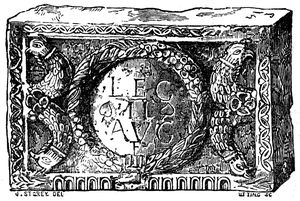
Commemorative tablet of the Second Legion found at Halton Chesters on the Roman Wall.
24. The Roman Walls.—Agricola, in addition to his line of forts between the Forth and the Clyde, had erected detached forts at the mouth of the valleys which issue from the Highlands, in order to hinder the Caledonians from plundering the lower country. In 119 the Emperor Hadrian visited Britain. He was more disposed to defend the Empire than to extend it, and though he did not abandon Agricola's forts, he also built further south a continuous stone wall between the Solway and the Tyne. This wall, which, together with an earthwork of earlier date, formed a far stronger line of defence than the more northern forts, was intended to serve as a second barrier to keep out the wild Caledonians if they succeeded in breaking through the first. At a later time a lieutenant of the Emperor, Antoninus Pius, who afterwards (p. 019) became Emperor himself, connected Agricola's forts between the Forth and Clyde by a continuous earthwork. In 208 the Emperor Severus arrived in Britain, and after strengthening still further the earthwork between the Forth and Clyde, he attempted to carry out the plans of Agricola by conquering the land of the Caledonians. Severus, however, failed as completely as Agricola had failed before him, and he died soon after his return to Eboracum.
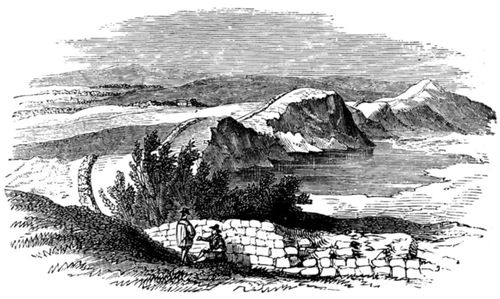
View of part of the Roman Wall.
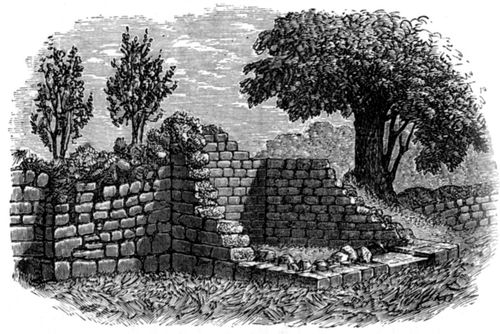
Ruins of a Turret on the Roman Wall.
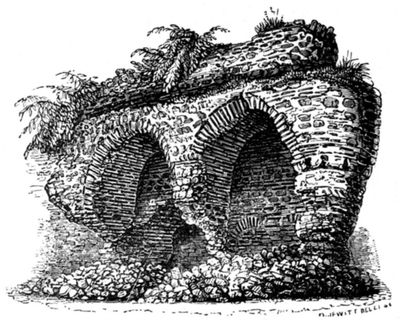
Part of the Roman Wall at Leicester.
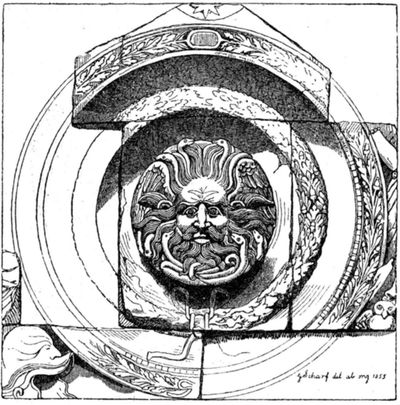
Pediment of a Roman temple found at Bath.
25. The Roman Province of Britain.—Very little is known of the history of the Roman province of Britain, except that it made considerable progress in civilisation. The Romans were great road-makers, and though their first object was to enable their soldiers to march easily from one part of the country to another, they thereby encouraged commercial intercourse. Forests were to some extent cleared away by the sides of the new roads, and fresh ground was thrown open to tillage. Mines were worked and country houses built, the remains of which are in some places still to be seen, and bear testimony to the increased well-being of a population which, excepting in the south-eastern part of the island, had at the arrival of the Romans been little removed from savagery. Cities sprang up in great numbers. Some of them were at first garrison towns, like Eboracum, Deva, and Isca Silurum. Others, like Verulamium, near the present St. Albans, occupied the sites of the old stockades once used as places of refuge by the Celts, (p. 020) or, like Lindum, on the top of the hill on which Lincoln Cathedral now stands, were placed in strongly defensible positions. Aquæ Sulis, the modern Bath, owes its existence to its warm medicinal springs. The chief port of commerce was Londinium, the modern London. Attempts which have been made to explain its name by the Celtic language have failed, and it is therefore possible that an inhabited post existed there even before the Celts arrived. Its importance was, however, owing to its position, and that importance was not of a kind to tell before a settled system of commercial intercourse sprang up. London was situated on the hill on which St. Paul's now stands. There first, after the Thames narrowed into a river, the merchant found close to the stream hard ground on which he could land his goods. The valley for some distance above and below it was then filled with a wide marsh or an expanse of water. An old track raised above the marsh crossed the river by a ford at Lambeth, but, as London grew in importance, a ferry was established where London Bridge now stands, and the Romans, in course of time, superseded the ferry by a bridge. It is, therefore, (p. 021) no wonder that the Roman roads both from the north and from the south converged upon London. Just as Eboracum was a fitting centre for military operations directed to the defence of the northern frontier, London was the fitting centre of a trade carried on with the Continent, and the place would increase in importance in proportion to the increase of that trade.
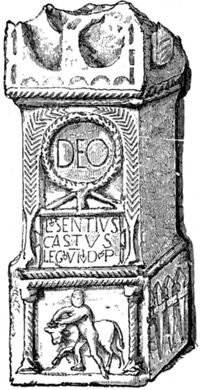
Roman altar from Rutchester.
26. Extinction of Tribal Antagonism.—The improvement of communications and the growth of trade and industry could not fail to influence the mind of the population. Wars between tribes, which before the coming of the Romans had been the main employment of the young and hardy, were now things of the past. The mutual hatred which had grown out of them had died away, and even the very names of Trinobantes and Brigantes were almost forgotten. Men who lived in the valley of the Severn came to look upon themselves as belonging to the same people as men who lived in the valleys of the Trent or the Thames. The active and enterprising young men were attracted to the cities, at first by the novelty of the luxurious habits in which they were taught to indulge, but afterwards because they were allowed to take part in the management of local business. In the time of the Emperor Caracalla, the son of Severus, every freeman born in the Empire was declared to be a Roman citizen, and long before that a large number of natives had been admitted to citizenship. In each district a council was formed of the wealthier and more prominent inhabitants, and this council had to provide for the building of temples, the holding of festivals, the erection of fortifications, and the laying out of streets. Justice was done between man and man according to the Roman law, which was the best law that the world had seen, and the higher Roman officials, who were appointed by the Emperor, took care that justice was done between city and city. No one (p. 022) therefore, wished to oppose the Roman government or to bring back the old times of barbarism.
27. Want of National Feeling.—Great as was the progress made, there was something still wanting. A people is never at its best unless those who compose it have some object for which they can sacrifice themselves, and for which, if necessary, they will die. The Briton had ceased to be called upon to die for his tribe, and he was not expected to die for Britain. Britain had become a more comfortable country to live in, but it was not the business of its own inhabitants to guard it. It was a mere part of the vast Roman Empire, and it was the duty of the Emperors to see that the frontier was safely kept. They were so much afraid lest any particular province should wish to set up for itself and to break away from the Empire, that they took care not to employ soldiers born in that province for its protection. They sent British recruits to guard the Danube or the Euphrates, and Gauls, Spaniards, or Africans to guard the wall between the Solway and the Tyne, and the entrenchment between the Forth and the Clyde. Britons, therefore, looked on their own defence as something to be done for them by the Emperors, not as something to be done by themselves. They lived on friendly terms with one another, but they had nothing of what we now call patriotism.
28. Carausius and Allectus. 288—296.—In 288 Carausius, with the help of some pirates, seized on the government of Britain and threw off the authority of the Emperor. He was succeeded by Allectus, yet neither Carausius nor Allectus thought of making himself the head of a British nation. They called themselves Emperors and ruled over Britain alone, merely because they could not get more to rule over.
29. Constantius and Constantine. 296—337.—Allectus was overthrown and slain by Constantius, who, however, did not rule, as Carausius and Allectus had done, by mere right of military superiority. The Emperor Diocletian (285—305) discovered that the whole Empire, stretching from the Euphrates to the Atlantic, was too extensive for one man to govern, and he therefore decreed that there should in future be four governors, two principal ones named Emperors (Augusti), and two subordinate ones named Cæsars. Constantius was first a Cæsar and afterwards an Emperor. He was set to govern Spain, Gaul, and Britain, but he afterwards became Emperor himself, and for some time established himself at Eboracum (York). Upon his death (306), his son Constantine, after much fighting, made himself sole Emperor (325), overthrowing the system of Diocletian. (p. 023) Yet in one respect he kept up Diocletian's arrangements. He placed Spain, Gaul, and Britain together under a great officer called a Vicar, who received orders from himself and who gave orders to the officers who governed each of the three countries. Under the new system, as under the old, Britain was not treated as an independent country. It had still to look for protection to an officer who lived on the Continent, and was therefore apt to be more interested in Gaul and Spain than he was in Britain.
30. Christianity in Britain.—When the Romans put down the Druids and their bloody sacrifices, they called the old Celtic gods by Roman names, but made no further alteration in religious usages. Gradually, however, Christianity spread amongst the Romans on the Continent, and merchants or soldiers who came from the Continent introduced it into Britain. Scarcely anything is known of its progress in the island. Alban is said to have been martyred at Verulamium, and Julius and Aaron at Isca Silurum. In 314 three British bishops attended a council held at Arles in Gaul. Little more than these few facts have been handed down, but there is no doubt that there was a settled Church established in the island. The Emperor Constantine acknowledged Christianity as the religion of the whole Empire. The remains of a church of this period have recently been discovered at Silchester.
31. Weakness of the Empire.—The Roman Empire in the time of Constantine had the appearance rather than the reality of strength. Its taxation was very heavy, and there was no national enthusiasm to lead men to sacrifice themselves in its defence. Roman citizens became more and more unwilling to become soldiers at all, and the Roman armies were now mostly composed of barbarians. At the same time the barbarians outside the Empire were growing stronger, as the tribes often coalesced into wide confederacies for the purpose of attacking the Empire.
32. The Picts and Scots.—The assailants of Britain on the north and the west were the Picts and Scots. The Picts were the same as the Caledonians of the time of Agricola. We do not know why they had ceased to be called Caledonians. The usual derivation of their name from the Latin Pictus, said to have been given them because they painted their bodies, is inaccurate. Opinions differ whether they were Goidels with a strong Iberian strain, or Iberians with a Goidelic admixture. They were probably Iberians, and at all events they were more savage than the Britons had been before they were influenced by Roman civilisation. The Scots, who afterwards settled in what is (p. 024) now known as Scotland, at that time dwelt in Ireland. Whilst the Picts, therefore, assailed the Roman province by land, and strove, not always unsuccessfully, to break through the walls which defended its northern frontier, the Scots crossed the Irish Sea in light boats to plunder and slay before armed assistance could arrive.
33. The Saxons.—The Saxons, who were no less deadly enemies of the Roman government, were as fierce and restless as the Picts and Scots, and were better equipped and better armed. At a later time they established themselves in Britain as conquerors and settlers, and became the founders of the English nation; but at first they were only known as cruel and merciless pirates. In their long flat-bottomed vessels they swooped down upon some undefended part of the coast and carried off not only the property of wealthy Romans, but even men and women to be sold in the slave-market. The provincials who escaped related with peculiar horror how the Saxons were accustomed to torture to death one out of every ten of their captives as a sacrifice to their gods.
34. Origin of the Saxons.—The Saxons were the more dangerous because it was impossible for the Romans to reach them in their homes. They were men of Teutonic race, speaking one of the languages, afterwards known as Low German, which were once spoken in the whole of North Germany. The Saxon pirates were probably drawn from the whole of the sea coast stretching from the north of the peninsula of Jutland to the mouth of the Ems, and if so, there were amongst them Jutes, whose homes were in Jutland itself; Angles, who inhabited Schleswig and Holstein; and Saxons, properly so called, who dwelt about the mouth of the Elbe and further to the west. All these peoples afterwards took part in the conquest of southern Britain, and it is not unlikely that they all shared in the original piratical attacks. Whether this was the case or not, the pirates came from creeks and inlets outside the Roman Empire, whose boundary was the Rhine, and they could therefore only be successfully repressed by a power with a good fleet, able to seek out the aggressors in their own homes and to stop the mischief at its source.
35. The Roman Defence.—The Romans had always been weak at sea, and they were weaker now than they had been in earlier days. They were therefore obliged to content themselves with standing on the defensive. Since the time of Severus, Britain had been divided, for purposes of defence, into Upper and Lower Britain. Though there is no absolute certainty about the matter, (p. 025) it is probable that Upper Britain comprised the hill country of the west and north, and that Lower Britain was the south-eastern part of the island, marked off by a line drawn irregularly from the Humber to the Severn.[1] Lower Britain in the early days of the Roman conquest had been in no special need of military protection. In the fourth century it was exposed more than the rest of the island to the attacks of the Saxon pirates. Fortresses were erected between the Wash and Beachy Head at every point at which an inlet of the sea afforded an opening to an invader. The whole of this part of the coast became known as the Saxon Shore, because it was subjected to attacks from the Saxons, and a special officer known as the Count of the Saxon Shore was appointed to take charge of it. An officer known as the Duke of the Britains (Dux Britanniarum) commanded the armies of Upper Britain; whilst a third, who was a civilian, and superior in rank over the other two, was the Count of Britain, and had a general supervision of the whole country.
36. End of the Roman Government. 383—410.—In 383 Maximus, who was probably the Duke of the Britains, was proclaimed Emperor by his soldiers. If he could have contented himself with defending Britain, it would have mattered little whether he chose to call himself an Emperor or a Duke. Unhappily for the inhabitants of the island, not only did every successful soldier want to be an Emperor, but every Emperor wanted to govern the whole Empire. Maximus, therefore, instead of remaining in Britain, carried a great part of his army across the sea to attempt a conquest of Gaul and Spain. Neither he nor his soldiers ever returned, and in consequence the Roman garrison in the island was deplorably weakened. Early in the fifth century an irruption of barbarians gave full employment to the army which defended Gaul, so that it was impossible to replace the forces which had followed Maximus by fresh troops from the Continent. The Roman Empire was in fact breaking up. The defence of Britain was left to the soldiers who remained in the island, and in 409 they proclaimed a certain Constantine Emperor. Constantine, like Maximus, carried his soldiers across the Channel in pursuit of a wider empire than he could find in Britain. He was himself murdered, and his soldiers, like those of Maximus, did not return. In 410 the Britons implored the Emperor Honorius to send them help. Honorius had enough (p. 026) to do to ward off the attacks of barbarians nearer Rome, and announced to the Britons that they must provide for their own defence. From this time Britain ceased to form part of the Roman Empire.[Back to Contents]
LEADING DATES
1. Britain after the Departure of the Romans. 410—449?—After the departure of the Romans, the Picts from the north and the Scots from Ireland continued their ravages, but though they caused terrible misery by slaughtering or dragging into slavery the inhabitants of many parts of the country, they did not succeed in making any permanent conquests. The Britons were not without a government and an armed force; and their later history shows that they were capable of carrying on war for a long time against enemies more formidable than the Picts and Scots. Their rulers were known by the British title Gwledig, and probably held power in different parts of the island as the successors of the Roman Duke of the Britains and of the Roman Count of the Saxon Shore. Their power of resistance to the Picts and the Scots was, however, weakened by the impossibility of turning their undivided attention to these marauders, as at the same time that they had, to defend the Roman Wall and the western coast against the Picts and Scots, they were exposed on the eastern coast to the attacks of the Saxon pirates.
2. The Groans of the Britons.—In their misery the thoughts of the Britons turned to those Roman legions who had defended their fathers so well. In 446 they appealed to Aëtius, the commander of the Roman armies, to deliver them from their destroyers. "The groans of the Britons" was the title which they gave to their appeal to him. "The barbarians," they wrote, "drive us to the sea; the sea drives us back to the barbarians; between them we are (p. 027) exposed to two sorts of death: we are either slain or drowned." Aëtius had no men to spare, and he sent no help to the Britons. Before long the whole of Western Europe was overrun by barbarian tribes, the title of Emperor being retained only by the Roman Emperor who ruled from Constantinople over the East, his authority over the barbarians of the West being no more than nominal.
3. The Conquest of Kent. 449?—It had been the custom of the Roman Empire to employ barbarians as soldiers in their armies, and Vortigern, the British ruler, now followed that bad example. In or about 449 a band of Jutish sea-rovers landed at Ebbsfleet, in the Isle of Thanet. According to tradition their leaders were Hengist and Horsa, names signifying the horse and the mare, which were not very likely to have been borne by real warriors. Whatever may have been the names of the chiefs, Vortigern took them into his service against the Picts, giving them the Isle of Thanet as a dwelling-place for themselves. With their help he defeated the Picts, but afterwards found himself unable to defend himself against his fierce auxiliaries. Thanet was still cut off from the mainland by an arm of the sea, and the Jutes were strong enough to hold it against all assailants. Their numbers rapidly increased as shiploads of their fellows landed, and they crossed the strait to win fresh lands from the Britons on the mainland of Kent. In several battles Vortigern was overpowered. His rival and successor, Ambrosius Aurelianus, whose name makes it probable that he was an upholder of the old Roman discipline, drove back the Jutes in turn. He did not long keep the upper hand, and in 465 he was routed utterly. The defeat of the British army was followed by an attack upon the great fortresses which had been erected along the Saxon Shore in the Roman times. The Jutes had no means of carrying them by assault, but they starved them out one by one, and some twenty-three years after their first landing, the whole of the coast of Kent was in their hands.
4. The South Saxons. 477.—The conquests of the Jutes stopped at the inlet of the sea now filled by Romney Marsh. To the south and west was the impenetrable Andred's Wood, which covered what is now known as the Weald. At its eastern extremity stood by the sea the strong fortified town of Anderida, which gave its name to the wood, the most westerly of the fortresses of the Saxon Shore still unconquered by the Jutes. It was at last endangered by a fresh pirate band—not of Jutes but of Saxons—which landed near Selsey, and fought its way eastwards, conquering the South Downs and the flat land between the South Downs and the sea, till it reached (p. 028) Anderida. Anderida was starved out after a long blockade, and the Saxons, bursting in, 'slew all that dwelt therein, nor was there henceforth one Briton left.' To this day the Roman walls of Anderida stand round the site of the desolated city near the modern Pevensey. Its Saxon conquerors came to be known as the South Saxons, and their land as Sussex.
5. The West Saxons and the East Saxons.—Another swarm also of Saxons, called Gewissas, landed on the shore of Southampton Water. After a time they were reinforced by a body of Jutes, and though the Jutes formed settlements of their own in the Isle of Wight and on the mainland, the difference of race and language between them and the Gewissas was not enough to prevent the two tribes from coalescing. Ultimately Gewissas and Jutes became known as West Saxons, and established themselves in a district roughly corresponding with the modern Hampshire. Then, having attempted to penetrate further west, they were defeated at Mount Badon, probably Badbury Rings in Dorsetshire. Their overthrow was so complete as to check their advance for more than thirty years. Whilst the coast line from the inlet of the sea now filled by Romney Marsh to the western edge of Hampshire had thus been mastered by Saxons, others of the same stock, known as East Saxons, seized upon the low coast to the north of the Thames. From them the land was called Essex. Neither Saxons nor Jutes, however, were as yet able to penetrate far up the valley of the Thames, as the Roman settlement of London, surrounded by marshes, still blocked the way.
6. The Anglian Settlements.—The coast-line to the north of the East Saxons was seized at some unascertained dates by different groups of Angles. The land between the Stour and the great fen which in those days stretched far inland from the Wash was occupied by two of these groups, known as the North folk and the South folk. They gave their names to Norfolk and Suffolk, and at some later time combined under the name of East Anglians. North of the Wash were the Lindiswara—that is to say, the settlers about the Roman Lindum, the modern Lincoln, and beyond them, stretching to the Humber, were the Gainas, from whom is derived the name of the modern Gainsborough. To the north of the Humber the coast was fringed by Angle settlements which had not yet coalesced into one.
7. Nature of the Conquest.—The three peoples who effected this conquest were afterwards known amongst themselves by the common name of English, a name which was originally equivalent (p. 029) to Angle, whilst amongst the whole of the remaining Celtic population they were only known as Saxons. The mode in which the English treated the Britons was very different from that of the Romans, who were a civilised people and aimed at governing a conquered race. The new-comers drove out the Britons in order to find homes for themselves, and they preferred to settle in the country rather than in a town. No Englishman had ever lived in a town in his German home, or was able to appreciate the advantages of the commerce and manufacture by which towns are supported. Nor were they inclined to allow the inhabitants of the Roman towns to remain unmolested in their midst. When Anderida was captured not a Briton escaped alive, and there is good reason to believe that many of the other towns fared no better, especially as the remains of some of them still show marks of the fire by which they were consumed. What took place in the country cannot be certainly known. Many of the British were no doubt killed. Many took refuge in fens or woods, or fled to those portions of the island in which their countrymen were still independent. It is difficult to decide to what extent the men who remained behind were spared, but it is impossible to doubt that a considerable number of women were preserved from slaughter. The conquerors, at their landing, must have been for the most part young men, and when they wanted wives, it would be far easier for them to seize the daughters of slain Britons than to fetch women from the banks of the Elbe.
8. The Cultivators of the Soil.—When the new-comers planted themselves on British soil, each group of families united by kinship fixed its home in a separate village or township, to which was given the name of the kindred followed by 'ham' or 'tun,' the first word meaning the home or dwelling, the second the earthen mound which formed the defence of the community. Thus Wokingham is the home of the Wokings, and Wellington the 'tun' of the Wellings. Each man had a homestead of his own, with a strip or strips of arable land in an open field. Beyond the arable land was pasture and wood, common to the whole township, every villager being entitled to drive his cattle or pigs into them according to rules laid down by the whole township.
9. Eorls, Ceorls, Gesiths.—The population was divided into Eorls and Ceorls. The Eorl was hereditarily distinguished by birth, and the Ceorl was a simple freeman without any such distinction. How the difference arose we do not know, but we do know that the Eorl had privileges which the Ceorl had not. Below (p. 030) the Ceorls were slaves taken in war or condemned to slavery as criminals. There were also men known as Gesiths, a word which means 'followers,' who were the followers of the chiefs or Ealdormen (Eldermen) who led the conquerors. The Gesiths formed the war-band of the chief. They were probably all of them Eorls, so that though every settler was either an Eorl or a Ceorl, some Eorls were also Gesiths. This war-band of Gesiths was composed of young men who attached themselves to the chief by a tie of personal devotion. It was the highest glory of the Gesith to die to save his chief's life. Of one Gesith it is told that, when he saw a murderer aiming a dagger at his chief, he, not having time to seize the assassin, threw his body between the blow and his chief, and perished rather than allow him to be killed. It was even held to be disgraceful for a Gesith to return from battle alive if his chief had been slain. The word by which the chief was known was Hlaford (Lord), which means a giver of bread, because the Gesiths ate his bread. They not only ate his bread, but they shared in the booty which he brought home. They slept in his hall, and were clothed in the garments woven by his wife and her maidens. A continental writer tells how a body of Gesiths once approached their lord with a petition that he should take a wife, because as long as he remained unmarried there was no one to make new clothes for them or to mend their old ones.
10. The Gesiths and the Villagers.—At the time of the English settlement, therefore, there were two sorts of warriors amongst the invaders. The Ceorls, having been accustomed to till land at home, were quite ready to till the lands which they had newly acquired in Britain. They were, however, ready to defend themselves and their lands if they were attacked, and they were under the obligation of appearing in arms when needed for defence. This general army of the villagers was called the Fyrd. On the other hand, the Gesiths had not been accustomed to till land at home, but had made fighting their business. War, in short, which was an unwelcome accident to the Ceorl, was the business of life to the Gesith. The exact relationship between the Gesiths and the Ceorls cannot be ascertained with certainty. It is not improbable that the Gesiths, being the best warriors amongst their countrymen, sometimes obtained land granted them by their chiefs, and were expected in consequence to be specially ready to serve the chief whom they had followed from their home. It was from their relation to their chief that they were called Gesiths, a name gradually abandoned for that of Thegns, or servants, when they—as was soon the case—ceased (p. 031) to live with their chief and had houses and lands of their own, though they were still bound to military service. How these Thegns cultivated their lands is a question to which there is no certain answer. In later days they made use of a class of men known as bondmen or villeins. These bondmen were not, like slaves, the property of their masters. They had land of their own which they were allowed to cultivate for themselves on condition of spending part of their time in cultivating the land of their lords. It has been supposed by some writers that the Thegns employed bondmen from the earliest times of the conquest. If, however, this was the case, there arises a further question whether the bondmen were Englishmen or Britons. The whole subject is under investigation, and the evidence which exists is excessively scanty. It is at least certain that the further the conquest progressed westwards, the greater was the number of Britons preserved alive.
11. English and Welsh.—The bulk of the population on the eastern and southern coasts was undoubtedly English. English institutions and English language took firm root. The conquerors looked on the Britons with the utmost contempt, naming them Welsh, a name which no Briton thought of giving to himself, but which Germans had been in the habit of applying somewhat contemptuously to the Celts on the Continent. So far as British words have entered into the English language at all, they have been words such as gown or curd, which are likely to have been used by women, or words such as cart or pony, which are likely to have been used by agricultural labourers, and the evidence of language may therefore be adduced in favour of the view that many women and many agricultural labourers were spared by the conquerors.
12. The Township and the Hundred.—The smallest political community of the new settlers was the village, or, as it is commonly called, the township, which is still represented by the parish, the parish being merely a township in which ecclesiastical institutions have been maintained whilst political institutions have ceased to exist. The freemen of the township met to settle small questions between themselves, under the presidency of their reeve or headman. More important cases were brought before the hundred-moot, or meeting of the hundred, a district which had been inhabited, or was supposed to have been inhabited, either by a hundred kindred groups of the original settlers or by the families of a hundred warriors. This hundred-moot was held once a month, and was (p. 032) attended by four men and the reeve from every township, and also by the Eorls and Thegns living in the hundred. It not only settled disputes about property, but gave judgment in criminal cases as well.
13. Weregild.—In early days, long before the English had left their lands beyond the sea, it was not considered to be the business of the community to punish crime. If any one was murdered, it was the duty of the kinsmen of the slain man to put to death the murderer. In course of time men got tired of the continual slaughter produced by this arrangement, and there sprang up a system according to which the murderer might offer to the kinsmen a sum of money known as weregild, or the value of a man, and if this money was accepted, then peace was made and all thought of vengeance was at an end. At a later time, at all events after the arrival of the English in this country, charges of murder were brought before the hundred-moot whenever the alleged murderer and his victim lived in the same hundred. If the accused person did not dispute the fact the moot sentenced him to pay a weregild, the amount of which differed in proportion to the rank of the slain man, not in proportion to the heinousness of the offence. As there was a weregild for murder, so there was also a graduated scale of payments for lesser offences. One who struck off a hand or a foot could buy off vengeance at a fixed rate.
14. Compurgation and Ordeal.—A new difficulty was introduced when a person who was charged with crime denied his guilt. As there were no trained lawyers and there was no knowledge of the principles of evidence, the accused person was required to bring twelve men to be his compurgators—that is to say, to hear him swear to his own innocence, and then to swear in turn that his oath was true. If he could not find men willing to be his compurgators he could appeal to the judgment of the gods, which was known as the Ordeal. If he could walk blindfold over red-hot ploughshares, or plunge his arm into boiling water, and show at the end of a fixed number of days that he had received no harm, it was thought that the gods bore witness to his innocency and had as it were become his compurgators when men had failed him. It is quite possible that all or most of those who tried the ordeal failed, but as nobody would try the ordeal who could get compurgators, those who did not succeed must have been regarded as persons of bad character, so that no surprise would be expressed at their failure.
15. Punishments.—When a man had failed in the ordeal there was a choice of punishments. If his offence was a slight one, a (p. 033) fine was deemed sufficient. If it was a very disgraceful one, such as secret murder, he was put to death or was degraded to slavery, in most cases he was declared to be a 'wolf's-head'—that is to say, he was outlawed and driven into the woods, where, as the protection of the community was withdrawn from him, anyone might kill him without fear of punishment.
16. The Folk-moot.—As the hundred-moot did justice between those who lived in the hundred, so the folk-moot did justice between those who lived in different hundreds, or were too important to be judged in the hundred-moot. The folk-moot was the meeting of the whole folk or tribe, which consisted of several hundreds. It was attended, like the hundred-moot, by four men and the reeve from each township, and it met twice a year, and was presided over by the chief or Ealdorman. The folk-moot met in arms, because it was a muster as well as a council and a court. The vote as to war and peace was taken in it, and while the chief alone spoke, the warriors signified their assent by clashing their swords against their shields.
17. The Kingship.—How many folks or tribes settled in the island it is impossible to say, but there is little doubt that many of them soon combined. The resistance of the Britons was desperate, and it was only by joining together that the settlers could hope to overcome it. The causes which produced this amalgamation of the folks produced the king. It was necessary to find a man always ready to take the command of the united folks, and this man was called King, a name which signifies the man of the kinship or race at the head of which he stood. His authority was greater than the Ealdorman's, and his warriors were more numerous than those which the Ealdorman had led. He must come of a royal family—that is, of one supposed to be descended from the god Woden. As it was necessary that he should be capable of leading an army, it was impossible that a child could be king, and therefore no law of hereditary succession prevailed. On the death of a king the folk-moot chose his successor out of the kingly family. If his eldest son was a grown man of repute, the choice would almost certainly fall upon him. If he was a child or an invalid, some other kinsman of the late king would be selected.
18. The Legend of Arthur.—Thirty-two years passed away after the defeat of the West Saxons at Mount Badon in 520 (see p. 28) before they made any further conquests. Welsh legends represent this period as that of the reign of Arthur. Some modern inquirers have argued that Arthur's kingdom was in the north, whilst others have argued that it was in the south. It is quite (p. 034) possible that the name was given by legend to more than one champion; at all events, there was a time when an Ambrosius, probably a descendant of Ambrosius Aurelianus (see p. 27), protected the southern Britons. This stronghold was at Sorbiodunum, the hill fort now a grassy space known as Old Sarum, and his great church and monastery, where Christian priests encouraged the Christian Britons in their struggle against the heathen Saxons, was at the neighbouring Ambresbyrig (the fortress of Ambrosius), now modernised into Amesbury. Thirty-two years after the battle of Mount Badon the kingdom of Ambrosius had been divided amongst his successors, who were plunged in vice and were quarrelling with one another.
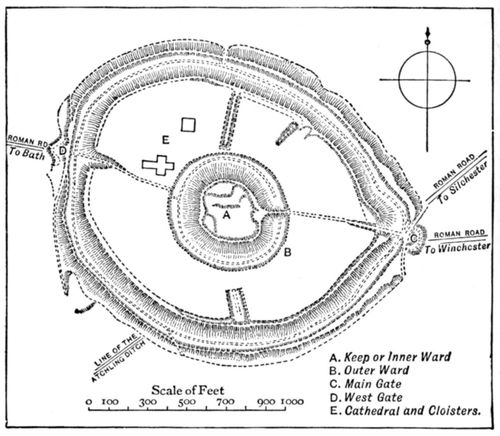
Plan of the city of Old Sarum, the ancient Sorbiodunum. The Cathedral is of later date.
19. The West Saxon Advance.—In 552 Cynric, the West Saxon king, attacked the divided Britons, captured Sorbiodunum, and made himself master of Salisbury Plain. Step by step he fought his way to the valley of the Thames, and when he had reached it, he turned eastwards to descend the river to its mouth. (p. 035) Here, however, he found himself anticipated by the East Saxons, who had captured London, and had settled a branch of their people under the name of the Middle Saxons in Middlesex. The Jutes of Kent had pushed westwards through the Surrey hills, but in 568 the West Saxons defeated them and drove them back. After this battle, the first in which the conquerors strove with one another, the West Saxons turned northwards, defeated the Britons in 571 at Bedford, and occupied the valleys of the Thame and Cherwell and the upper valley of the Ouse. They are next heard of much further west, and it has been supposed that they turned in that direction because they found the lower Ouse already held by Angle tribes. However this may have been, they crossed the Cotswolds in 577 under two brothers, Ceawlin and Cutha, and at Deorham defeated and slew three kings who ruled over the cities of Glevum (Gloucester), Corinium (Cirencester), and Aquæ Sulis (Bath). They seized on the fertile valley of the Severn, and during the next few years they pressed gradually northwards. In 584 they destroyed and sacked the old Roman station of Viriconium. This was their last victory for many a year. They attempted to reach Chester, but were defeated at Faddiley by the Britons, who slew Cutha in the battle.
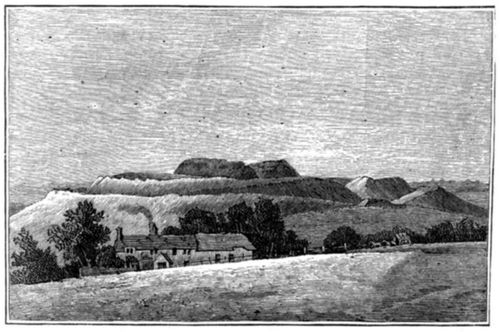
Old Sarum from an engraving published in 1843, showing mound. (It is now obscured by trees from this point of view.)
20. Repulse of the West Saxons.—After the defeat at Faddiley the West Saxons split up into two peoples. Those of them who (p. 036) settled in the lower Severn valley took the name of Hwiccan, and joined the Britons against their own kindred. This alliance could hardly have taken place if the Hwiccan, in settling in the Severn valley, had destroyed the whole, or even a considerable part, of the Celtic population, though there can be little doubt that there was still slaughter when a battle was fought or a town taken by storm; as it is known that the magnificent Roman buildings at Bath were standing in ruins and the city untenanted many years after the capture of the city. At all events, the Britons, now allied with the Hwiccan, defeated Ceawlin at Wanborough. After this disaster, though the West Saxon kingdom retained its independence, it was independent within smaller limits than those which Ceawlin had wished to give to it. If he had seized Chester he would have been on the way to gain the mastery over all England, but he had tried to do too much in a short time. His people can hardly have been numerous enough to occupy in force a territory reaching from Southampton Water to Bedford on one side and to Chester on another.
21. The Advance of the Angles.—Whilst the West Saxons were enlarging their boundaries in the south, the Angles were gradually spreading in the centre and the north. The East Anglians were stopped on their way to the west by the great fen, but either a branch of the Lindiswara or some new-comers made their way up the Trent, and established themselves first at Nottingham and then at Leicester, and called themselves the Middle English. Another body, known as the Mercians, or men of the mark or border-land, seized on the upper valley of the Trent. North of the Humber the advance was still slower. In 547, five years before the West Saxons attacked Sorbiodunum, Ida, a chieftain of one of the scattered settlements on the coast, was accepted as king by all those which lay between the Tees and the Forth. His new kingdom was called Bernicia, and his principal fortress was on a rock by the sea at Bamborough. During the next fifty years he and his successors enlarged their borders till they reached that central ridge of moorland hill which is sometimes known as the Pennine range. The Angles between the Tees and the Humber called their country Deira, but though they also united under a king, their progress was as slow as that of the Bernicians. Bernicia and Deira together were known as North-humberland, the land north of the Humber, a much larger territory than that of the modern county of Northumberland.
22. The Kymry.—It is probable that the cause of the slow advance of the northern Angles lay in the existence of a strong (p. 037) Celtic state in front. Welsh tradition speaks of a ruler named Cunedda, who after the departure of the Roman legions governed the territory from the Clyde to the south of Wales, which formed the greater part of what had once been known as Upper Britain. (See p. 25.) This territory was inhabited by a mixed population of Britons and Goidels, with an isolated body of Picts in Galloway. A common danger from the English fused them together, and as a sign of the wearing out of old distinctions, they took the name of Kymry, or Comrades, the name by which the Welsh are known amongst one another to this day, and which is also preserved in the name of Cumberland, though the Celtic language is no longer spoken there.
23. Britain at the End of the Sixth Century.—During the sixth century the Kymry ceased to be governed by one ruler, but the chieftains of the various territories all acknowledged the supremacy of a descendant of Cunedda. For purposes of war they combined together, and as the country which they occupied was hilly and easily defended, the northern English discovered that they too must unite amongst themselves if they were to overpower the united resistance of the Kymry.[Back to Contents]
LEADING DATES
1. England and the Continent.—Whatever may be the exact truth about the numbers of Britons saved alive by the English conquerors, there can be no doubt that English speech and English customs prevailed wherever the English settled. In Gaul, where the German Franks made themselves masters of the country, a different state of things prevailed. Roman officials continued to govern the country under Frankish kings, Roman bishops converted (p. 038) the conquerors to Christianity, and Roman cities maintained, as far as they could, the old standard of civilisation. All commercial intercourse between Gaul, still comparatively rich and prosperous, and Britain was for some time cut off by the irruption of the English, who were at first too rude and too much engaged in fighting to need the products of a more advanced race. Gradually, however, as the English settled down into peaceful industry along the south-eastern shores of the island, trade again sprang up, as it had sprung up in the wild times preceding the landing of Cæsar. The Gaulish merchants who crossed the straits found themselves in Kent, and during the years in which the West Saxon Ceawlin was struggling with the Britons the communications between Kent and the Continent had become so friendly that in 584, or a little later, Æthelberht, king of Kent, took to wife Bertha, the daughter of a Frankish king, Charibert. Bertha was a Christian, and brought with her a Christian bishop. She begged of her husband a forsaken Roman church for her own use. This church, now known as St. Martin's, stood outside the walls of the deserted city of Durovernum, the buildings of which were in ruins, except where a group of rude dwellings rose in a corner of the old fortifications. In these dwellings Æthelberht and his followers lived, and to them had been given the new name of Cantwarabyrig or Canterbury (the dwelling of the men of Kent). The English were heathen, but their heathenism was not intolerant.
2. Æthelberht's Supremacy.—Æthelberht's authority reached far beyond his native Kent. Within a few years after his marriage he had gained a supremacy over most of the other kings to the south of the Humber. There is no tradition of any war between Æthelberht and these kings, and he certainly did not thrust them out from the leadership of their own peoples. The exact nature of his supremacy is, however, unknown to us, though it is possible that they were bound to follow him if he went to war with peoples not acknowledging his supremacy, in which case his position towards them was something of the same kind as that of a lord to his gesiths.
3. Gregory and the English.—Æthelberht's position as the over-lord of so many kings and as the husband of a Christian wife drew upon him the attention of Gregory, the Bishop of Rome, or Pope. Many years before, as a deacon, he had been attracted by the fair faces of some boys from Deira exposed for sale in the Roman slave-market. He was told that the children were Angles. "Not Angles, but angels," he replied. "Who," he asked, "is their (p. 039) king?" Hearing that his name was Ælla, he continued to play upon the words. "Alleluia," he said, "shall be sung in the land of Ælla." Busy years kept him from seeking to fulfil his hopes, but at last the time came when he could do something to carry out his intentions, not in the land of Ælla, but in the land of Æthelberht. He became Pope. In those days the Pope had far less authority over the Churches of Western Europe than he afterwards acquired, but he offered the only centre round which they could rally, now that the Empire had broken up into many states ruled over by different barbarian kings. The general habit of looking to Rome for authority, which had been diffused over the whole Empire whilst Rome was still the seat of the Emperors, made men look to the Roman Bishop for advice and help as they had once looked to the Roman Emperor. Gregory, who united to the tenderheartedness of the Christian the strength of will and firmness of purpose which had marked out the best of the Emperors, now sent Augustine to England as the leader of a band of missionaries.
4. Augustine's Mission. 597.—Augustine with his companions landed at Ebbsfleet, in Thanet, where Æthelberht's forefathers had landed nearly a century and a half before. After a while Æthelberht arrived. Singing a litany, and bearing aloft a painting of the Saviour, the missionaries appeared before him. He had already learned from his Christian wife to respect Christians, but he was not prepared to forsake his own religion. He welcomed the new-comers, and told them that they were free to convert those who would willingly accept their doctrine. A place was assigned to them in Canterbury, and they were allowed to use Bertha's church. In the end Æthelberht himself, together with thousands of the Kentish men, received baptism. It was more by their example than by their teaching that Augustine's band won converts. The missionaries lived 'after the model of the primitive Church, giving themselves to frequent prayers, watchings, and fastings; preaching to all who were within their reach, disregarding all worldly things as matters with which they had nothing to do, accepting from those whom they taught just what seemed necessary for livelihood, living themselves altogether in accordance with what they taught, and with hearts prepared to suffer every adversity, or even to die, for that truth which they preached.'
5. Monastic Christianity.—These missionaries were monks as well as preachers. The Christians of those days considered the monastic life to be the highest. In the early days of the Church, when the world was full of vice and cruelty, it seemed hardly (p. 040) possible to live in the world without being dragged down to its wickedness. Men and women, therefore, who wished to keep themselves pure, withdrew to hermitages or monasteries, where they might be removed from temptation, and might fit themselves for heaven by prayer and fasting. In the fifth century Benedict of Nursia had organised in Italy a system of life for the monastery which he governed, and the Benedictine rule, as it was called, was soon accepted in almost all the monasteries of Western Europe. The special feature of this rule was that it encouraged labour as well as prayer. It was a saying of Benedict himself that 'to labour is to pray.' He did not mean that labour was good in itself, but that monks who worked during some hours of the day would guard their minds against evil thoughts better than if they tried to pray all day long. Augustine and his companions were Benedictine monks, and their quietness and contentedness attracted the population amidst which they had settled. The religion of the heathen English was a religion which favoured bravery and endurance, counting the warrior who slaughtered most enemies as most highly favoured by the gods. The religion of Augustine was one of peace and self-denial. Its symbol was the cross, to be borne in the heart of the believer. The message brought by Augustine was very hard to learn. If Augustine had expected the whole English population to forsake entirely its evil ways and to walk in paths of peace, he would probably have been rejected at once. It was perhaps because he was a monk that he did not expect so much. A monk was accustomed to judge laymen by a lower standard of self-denial than that by which he judged himself. He would, therefore, not ask too much of the new converts. They must forsake the heathen temples and sacrifices, and must give up some particularly evil habits. The rest must be left to time and the example of the monks.
6. The Archbishopric of Canterbury.—After a short stay Augustine revisited Gaul and came back as Archbishop of the English. Æthelberht gave to him a ruined church at Canterbury, and that poor church was named Christ Church, and became the mother church of England. From that day the Archbishop's See has been fixed at Canterbury. If Augustine in his character of monk led men by example, in his character of Archbishop he had to organise the Church. With Æthelberht's help he set up a bishopric at Rochester and another in London. London was now again an important trading city, which, though not in Æthelberht's own kingdom of Kent, formed part of the kingdom of Essex, which was dependent on Kent. More than these three Sees Augustine was (p. 041) unable to establish. An attempt to obtain the friendly co-operation of the Welsh bishops broke down because Augustine insisted on their adoption of Roman customs; and Lawrence, who succeeded to the archbishopric after Augustine's death, could do no more than his predecessor had done.
7. Death of Æthelberht. 616.—In 616 Æthelberht died. The over-lordship of the kings of Kent ended with him, and Augustine's church, which had largely depended upon his influence, very nearly ended as well. Essex relapsed into heathenism, and it was only by terrifying Æthelberht's son with the vengeance of St. Peter that Lawrence kept him from relapsing also. On the other hand, Rædwald, king of the East Anglians, who succeeded to much of Æthelberht's authority, so far accepted Christianity as to worship Christ amongst his other gods.
8. The Three Kingdoms opposed to the Welsh.—Augustine's Church was weak, because it depended on the kings, and had not had time to root itself in the affections of the people. Æthelberht's supremacy was also weak. The greater part of the small states which still existed—Sussex, Kent, Essex, East Anglia, and most of the small kingdoms of central England—were no longer bordered by a Celtic population. For them the war of conquest and defence was at an end. If any one of the kingdoms was to rise to permanent supremacy it must be one of those engaged in strenuous warfare, and as yet strenuous warfare was only carried on with the Welsh. The kingdoms which had the Welsh on their borders were three—Wessex, Mercia, and North-humberland, and neither Wessex nor Mercia was as yet very strong. Wessex was too distracted by conflicts amongst members of the kingly family, and Mercia was as yet too small to be of much account. North-humberland was therefore the first of the three to rise to the foremost place. Till the death of Ælla, the king of Deira, from whose land had been carried off the slave-boys whose faces had charmed Gregory at Rome, Deira and Bernicia had been as separate as Kent and Essex. Then in 588 Æthelric of Bernicia drove out Ælla's son and seized his kingdom of Deira, thus joining the two kingdoms of Deira and Bernicia (see p. 36) into one, under the new name of North-humberland.[2]
9. Æthelfrith and the Kymry.—In 593, four years before the landing of Augustine, Æthelric was succeeded by his son Æthelfrith. Æthelfrith began a fresh struggle with the Welsh. We (p. 042) know little of the internal history of the Welsh population, but what we do know shows that towards the end of the sixth century there was an improvement in their religious and political existence. The monasteries were thronged, especially the great monastery of Bangor-iscoed, in the modern Flintshire, which contained 2,000 monks. St. David and other bishops gave examples of piety. In fighting against Æthelfrith the warriors of the Britons were fighting for their last chance of independence. They still held the west from the Clyde to the Channel. Unhappily for them, the Severn, the Dee, and the Solway Firth divided their land into four portions, and if an enemy coming from the east could seize upon the heads of the inlets into which those rivers flowed he could prevent the defenders of the west from aiding one another. Already in 577, by the victory of Deorham (see p. 35), the West Saxons had seized on the mouth of the Severn, and had split off the West Welsh of the south-western peninsula. Æthelfrith had to do with the Kymry, whose territories stretched from the Bristol Channel to the Clyde, and who held an outlying wedge of land then known as Loidis and Elmet, which now together form the West Riding of Yorkshire.
10. Æthelfrith's Victories.—The long range of barren hills which separated Æthelfrith's kingdom from the Kymry made it difficult for either side to strike a serious blow at the other. In the extreme north, where a low valley joins the Firths of Clyde and Forth, it was easier for them to meet. Here the Kymry found an ally outside their own borders. Towards the end of the fifth century a colony of Irish Scots had driven out the Picts from the modern Argyle. In 603 their king, Aedan, bringing with him a vast army, in which Picts and the Kymry appear to have taken part, invaded the northern part of Æthelfrith's country. Æthelfrith defeated him at Degsastan, which was probably (p. 043) Dawstone, near Jedburgh. 'From that time no king of the Scots durst come into Britain to make war upon the English.' Having freed himself from the Scots in the north, Æthelfrith turned upon the Kymry. After a succession of struggles of which no record remains, he forced his way in 613 to the western sea near Chester. The Kymry had brought with them the 2,000 monks of their great monastery Bangor-iscoed, to pray for victory whilst their warriors were engaged in battle. Æthelfrith bade his men to slay them all. 'Whether they bear arms or no,' he said, 'they fight against us when they cry against us to their God.' The monks were slain to a man. Their countrymen were routed, and Chester fell into the hands of the English. The capture of Chester split the Kymric kingdom in two, as the battle of Deorham thirty-five years before had split that kingdom off from the West Welsh of the south-western peninsula. The Southern Kymry, in what is now called Wales, could no longer give help to the Northern Kymry between the Clyde and the Ribble, who grouped themselves into the kingdom of Strathclyde, the capital of which was Alcluyd, the modern Dumbarton. Three weak Celtic states, unable to assist one another, would not long be able to resist their invaders.
11. The Greatness of Eadwine.—Powerful as Æthelfrith was, he was jealous of young Eadwine, a son of his father's rival, Ælla of Deira. For some years Eadwine had been in hiding, at one time with Welsh princes, at another time with English kings. In 617 he took refuge with Rædwald, the king of the East Angles. Æthelfrith demanded the surrender of the fugitive. Rædwald hesitated, but at last refused. Æthelfrith attacked him, but was defeated and slain near the river Idle, at some point near Retford. Eadwine the Deiran then became king over the united North-humberland in the place of Æthelfrith the Bernician, whose sons fled for safety to the Picts beyond the Forth. Eadwine completed and consolidated the conquests of his predecessors. He placed a fortress, named after himself Eadwinesburh, or Edinburgh, on a rocky height near the Forth, to guard his land against a fresh irruption of Scots and Picts, such as that which had been turned back at Degsastan. He conquered from the Kymry Loidis and Elmet, and he launched a fleet at Chester which added to his dominions the Isle of Man and the greater island which was henceforth known as Anglesea, the island of the Angles. Eadwine assumed unwonted state. Wherever he went a standard was borne before him, as well as a spear decorated with a tuft of feathers, the ancient sign of Roman authority. It has been thought by some that his meaning was that (p. 044) he, rather than any Welshman, was the true Gwledig, the successor of the Duke of the Britains (Dux Britanniarum), and that the name of Bretwalda, or ruler of the Britons, which he is said to have borne, was only a translation of the Welsh Gwledig. It is true that the title of Bretwalda is given to other powerful kings before and after Eadwine, some of whom were in no sense rulers over Britons; but it is possible that it was taken to signify a ruler over a large part of Britain, though the men over whom he ruled were English, and not Britons.
12. Eadwine's Supremacy.—Eadwine's immediate kingship did not reach further south than the Humber and the Dee. But before 625 he had brought the East Angles and the kingdoms of central England to submit to his over-lordship, and he hoped to make himself over-lord of the south as well, and thus to reduce all England to dependence on himself. In 625 he planned an attack upon the West Saxons, and with the object of winning Kent to his side, he married Æthelburh, a sister of the Kentish king. Kent was still the only Christian kingdom, and Eadwine was obliged to promise to his wife protection for her Christian worship. He was now free to attack the West Saxons. In 626, before he set out, ambassadors arrived from their king. As Eadwine was listening to them, one of their number rushed forward to stab him. His life was saved by the devotion of Lilla, one of his thegns, who threw his body in the way of the assassin, and was slain by the stroke intended for his lord. After this Eadwine marched against the West Saxons. He defeated them in battle and forced them to acknowledge him as their over-lord. He was now over-lord of all the English states except Kent, and Kent had become his ally in consequence of his marriage.
13. Character of the later Conquests.—Eadwine's over-lordship had been gained with as little difficulty as Æthelberht's had been. The ease with which each of them carried out their purpose can only be explained by the change which had taken place in the condition of the English. The small bodies of conquerors which had landed at different parts of the coast had been interested to a man in the defence of the lands which they had seized. Every freeman had been ready to come forward to defend the soil which his tribe had gained. After tribe had been joined to tribe, and still more after kingdom had been joined to kingdom, there were large numbers who ceased to have any interest in resisting the Welsh on what was, as far as they were concerned, a distant frontier. Thus, when Ceawlin was fighting to extend the West Saxon frontiers (p. 045) in the valley of the Severn, it mattered little to a man whose own allotted land lay on the banks of the Southampton Water whether or not his English kinsmen won lands from the Welsh near Bath or Gloucester. The first result of this change was that the king's war-band formed a far greater proportion of his military force than it had formed originally. There was still the obligation upon the whole body of the freemen to take arms, but it was an obligation which had become more difficult to fulfil, and it must often have happened that very few freemen took part in a battle except the local levies concerned in defending their own immediate neighbourhood. A military change of this kind would account for the undoubted fact that the further the English conquest penetrated to the west the less destructive it was of British life. The thegns, or warriors personally attached to the king, did not want to plough and reap with their own hands. They would be far better pleased to spare the lives of the conquered and to compel them to labour. Every step in advance was marked by a proportionately larger Welsh element in the population.
14. Political Changes.—The character of the kingship was as much affected by the change as the character of the population. The old folk-moots still remained as the local courts of the smaller kingdoms, or of the districts out of which the larger kingdoms were composed, and continued to meet under the presidency of ealdormen appointed or approved by the king. Four men and a reeve, all of them humble cultivators, could not, however, be expected to walk up to York from the shores of the Forth, or even from the banks of the Tyne, whenever Eadwine needed their counsel. Their place in the larger kingdoms was therefore taken by the Witenagemot (The moot of the wise men), composed of the ealdormen and the chief thegns, together with the priests attached to the king's service in the time of heathendom, and, in the time of Christianity, the bishop or bishops of his kingdom. In one way the king was the stronger for the change. His counsellors, like his fighting force, were more dependent on himself than before. He was able to plan greater designs, and to carry out military enterprises at a greater distance. In another way he was the weaker for the change. He had less support from the bulk of his people, and was more likely to undertake enterprises in which they had no interest. The over-lordships of Æthelberht and Eadwine appear very imposing, but no real tie united the men of the centre of England to those of Kent at one time, or to those of North-humberland at another. Eadwine was (p. 046) supreme over the other kings because he had a better war-band than they had. If another king appeared whose war-band was better than his, his supremacy would disappear.
15. Eadwine's Conversion and Fall.—In 627 Eadwine, moved by his wife's entreaties and the urgency of her chaplain, Paulinus, called upon his Witan to accept Christianity. Coifi, the priest, declared that he had long served his gods for naught, and would try a change of masters. 'The present life of man, O king,' said a thegn, 'seems to me in comparison of that time which is unknown to us like to the swift flight of a sparrow through the room wherein you sit at supper in winter, with your ealdormen and thegns, and a good fire in the midst, and storms of rain and snow without.... So this life of man appears for a short space, but of what went before or what is to follow we are utterly ignorant. If therefore this new doctrine contains something more certain, it seems justly to deserve to be followed.' On this recommendation Christianity was accepted. Paulinus was acknowledged as Bishop of York. The new See, which had been originally intended by Pope Gregory to be an archbishopric, was ultimately acknowledged as such, but as yet it was but a missionary station. Paulinus converted thousands in Deira, but the men of Bernicia were unaffected by his pleadings. Christianity, like the extension of all better teaching, brought at first not peace but the sword. The new religion was contemptible in the eyes of warriors. The supremacy of Eadwine was shaken. The men of East Anglia slew their king, who had followed his over-lord's example by accepting Christianity. The worst blow came from Mercia. Hitherto it had been only a little state on the Welsh border. Its king, Penda, the stoutest warrior of his day, now gathered under him all the central states, and founded a new Mercia which stretched from the Severn to the Fens. He first turned on the West Saxons, defeated them at Cirencester, and in 628 brought the territory of the Hwiccas under Mercian sway. On the other hand, East Anglia accepted Eadwine's supremacy and Christianity. Penda called to his aid Cædwalla, the king of Gwynnedd, the Snowdonian region of Wales. That he should have done so shows how completely Æthelfrith's victory at Chester, by cutting the Kymric realm in two, had put an end to all fears that the Kymry could ever make head against England as a whole. The alliance was too strong for Eadwine, and in 633, at the battle of Heathfield—the modern Hatfield, in Yorkshire—the great king was slain and his army routed.
(p. 047) 16. Oswald's Victory at Heavenfield.—Penda was content to split up Bernicia and Deira into separate kingdoms, and to join East Anglia to his subject states. Cædwalla had all the wrongs of his race to avenge. He remained in North-humberland burning and destroying till 635, when Oswald, who was a son of Æthelfrith and of Eadwine's sister, and therefore united the claims of the rival families, gathered the men of Bernicia round him, overthrew Cædwalla at Heavenfield, near the Roman Wall, and was gratefully accepted as king by the whole of North-humberland.
17. Oswald and Aidan.—In the days of Eadwine, Oswald, as the heir of the rival house of Bernicia, had passed his youth in exile, and had been converted to Christianity in the monastery of Hii, the island now known as Iona. The monastery had been founded by Columba, an Irish Scot. Christianity had been introduced into Ireland by Patrick early in the fifth century. Ireland was a land of constant and cruel war between its tribes, and all who wished to be Christians in more than name withdrew themselves into monasteries, where they lived an even stricter and more ascetic life than the monks did in other parts of Western Europe. Bishops were retained in the monasteries to ordain priests, but they were entirely powerless. Columba's monastery at Hii sent its missionaries abroad, and brought Picts as well as Scots under the influence of Christianity. Oswald now requested its abbot, the successor of Columba, to send a missionary to preach the faith to the men of North-humberland in the place of Paulinus, who had fled when Eadwine was slain. The first who was sent came back reporting that the people were too stubborn to be converted. "Was it their stubbornness or your harshness?" asked the monk Aidan. "Did you forget to give them the milk first and then the meat?" Aidan was chosen to take the place of the brother who had failed. He established himself, not in an inland town, but in Holy Island. His life was spent in wandering amongst the men of the valleys opposite, winning them over by his gentleness and his self-denying energy. Oswald, warrior as he was, had almost all the gentleness and piety of Aidan. 'By reason of his constant habit of praying or giving thanks to the Lord he was wont whenever he sat to hold his hands upturned on his knees.' On one occasion when he sat down to a feast with Aidan by his side, he sent both the dainties before him and the silver dish on which they had been served to be divided amongst the poor. "May this hand," exclaimed the delighted Aidan, "never grow old!"
18. Oswald's Greatness and Overthrow.—As a king Oswald (p. 048) based his power on the acknowledgment of his over-lordship by all the kingdoms which were hostile to Penda. In 635 Wessex accepted Christianity, and the acceptance of Christianity brought with it the acceptance of Oswald's supremacy. Penda was thus surrounded by enemies, but his courage did not fail him, and in 642 at the battle of Maserfield he defeated Oswald. Oswald fell in the battle, begging with his last words for God's mercy on the souls of his enemies.
19. Penda's Overthrow.—After Oswald's fall Bernicia was ruled by his brother Oswiu. Deira, again divided from it, was governed first by Eadwine's cousin Osric, and then by Osric's son, Oswini, who acknowledged Penda as his over-lord. Oswini was a man after Aidan's own heart. Once he gave a horse to Aidan to carry him on his mission journeys. Aidan gave it away to the first beggar he met. "Is that son of a mare," answered Aidan to the reproaches of the king, "worth more in your eyes than that son of God?" Oswini fell at the bishop's feet and entreated his pardon. Aidan wept. "I am sure," he cried, "the king will not live long. I never till now saw a king humble." Aidan was right. In 651 Oswini was slain by the order of King Oswiu of Bernicia, who had long engaged in a struggle with Penda. Penda had for some years been burning and slaughtering in Bernicia, till he had turned a quarrel between himself and Oswiu into a national strife. Oswiu rescued Bernicia from destruction, and after Oswini's murder joined once more the two kingdoms together. Oswini was the last heir of Ælla's house, and from that time there was but one North-humberland. In 655 Oswiu and Penda met to fight, as it seemed for supremacy over the whole of England, by the river Winwæd, near the present Leeds. The heathen Penda was defeated and slain.
20. The Three Kingdoms and the Welsh.—For a moment it seemed as if England would be brought together under the rule of Oswiu. After Penda's death Mercia accepted Christianity, and the newly united Mercia was split up into its original parts ruled by several kings. The supremacy of Oswiu was, however, as little to be borne by the Mercians as the supremacy of Penda had been borne by the men of North-humberland. Under Wulfhere the Mercians rose in 659 against Oswiu. All hope of uniting England was for the present at an end. For about a century and a half longer there remained three larger kingdoms—North-humberland, Mercia, and Wessex, whilst four smaller ones—East Anglia, Essex, Kent, and Sussex—were usually attached either to Mercia or to Wessex. The failure of North-humberland to maintain the power (p. 049) was no doubt, in the first place owing to the absence of any common danger, the fear of which would bind together its populations in self-defence. The northern Kymry of Strathclyde were no longer formidable, and they grew less formidable as years passed on. The southern Kymry of Wales were too weak to threaten Mercia, and the Welsh of the south-western peninsula were too weak to threaten Wessex. It was most unlikely that any permanent union of the English states would be brought about till some enemy arose who was more terrible to them than the Welsh could any longer be.
21. The English Missionaries.—Some preparation might, however, be made for the day of union by the steady growth of the Church. The South Saxons, secluded between the forest and the sea, were the last to be converted, but with them English heathenism came to an end as an avowed religion, though it still continued to influence the multitude in the form of a belief in fairies and witchcraft. Monasteries and nunneries sprang up on all sides. Missionaries spread over the country. In their mouths, and still more in their lives, Christianity taught what the fierce English warrior most wanted to learn, the duty of restraining his evil passions, and above all his cruelty. Nowhere in all Europe did the missionaries appeal so exclusively as they did in England to higher and purer motives. Nowhere but in England were to be found kings like Oswald and Oswini, who bowed their souls to the lesson of the Cross, and learned that they were not their own, but were placed in power that they might use their strength in helping the poor and needy.
22. Dispute between Wilfrid and Colman. 664.—The lesson was all the better taught because those who taught it were monks. Monasticism brought with it an extravagant view of the life of self-denial, but those who had to be instructed needed to have the lesson written plainly so that a child might read it. The rough warrior or the rough peasant was more likely to abstain from drunkenness, if he had learned to look up to men who ate and drank barely enough to enable them to live; and he was more likely to treat women with gentleness and honour, if he had learned to look up to some women who separated themselves from the joys of married life that they might give themselves to fasting and prayer. Yet, great as the influence of the clergy was, it was in danger of being lessened through internal disputes amongst themselves. A very large part of England had been converted by the Celtic missionaries, and the Celtic missionaries, though their life and teaching was in the main the same as that of the Church of Canterbury and of the Churches of the Continent, differed from them in the shape of (p. 050) the tonsure and in the time at which they kept their Easter. These things were themselves unimportant, but it was of great importance that the young English Church should not be separated from the Churches of more civilised countries which had preserved much of the learning and art of the old Roman Empire. One of those who felt strongly the evil which would follow on such a separation was Wilfrid. He was scornful and self-satisfied, but he had travelled to Rome, and had been impressed with the ecclesiastical memories of the great city, and with the fervour and learning of its clergy. He came back resolved to bring the customs of England into conformity with those of the churches of the Continent. On his arrival, Oswiu, in 664, gathered an assembly of the clergy of the north headed by Colman, Aidan's successor, to discuss the point. Learned arguments were poured forth on either side. Oswiu listened in a puzzled way. Wilfrid boasted that his mode of keeping Easter was derived from Peter, and that Christ had given to Peter the keys of the kingdom of heaven. Oswiu at once decided to follow Peter, lest when he came to the gate of that kingdom Peter, who held the keys, should lock him out. Wilfrid triumphed, and the English Church was in all outward matters regulated in conformity with that of Rome.
23. Archbishop Theodore and the Penitential System.—In 668, four years after Oswiu's decision was taken, Theodore of Tarsus was consecrated Archbishop of Canterbury at Rome by the Pope himself. When he arrived in England the time had come for the purely missionary stage of the English Church to come to an end. Hitherto the bishops had been few, only seven in all England. Their number was now increased, and they were set to work no longer merely to convert the heathen, but to see that the clergy did their duty amongst those who had been already converted. Gradually, under these bishops, a parochial clergy came into existence. Sometimes the freemen of a hamlet, or of two or three hamlets together, would demand the constant residence of a priest. Sometimes a lord would settle a priest to teach his serfs. The parish clergy attacked violence and looseness of life in a way different from that of the monks. The monks had given examples of extreme self-denial. Theodore introduced the penitential system of the Roman Church, and ordered that those who had committed sin should be excluded from sharing in the rites of the Church until they had done penance. They were to fast, or to repeat prayers, sometimes for many years, before they were readmitted to communion. Many centuries afterwards good men objected that these penances were only bodily actions, and (p. 051) did not necessarily bring with them any real repentance. In the seventh century the greater part of the population could only be reached by such bodily actions. They had never had any thought that a murder, for instance, was anything more than a dangerous action which might bring down on the murderer the vengeance of the relations of the murdered man, which might be bought off with the payment of a weregild of a few shillings. The murderer who was required by the Church to do penance was being taught that a murder was a sin against God and against himself, as well as an offence against his fellow-men. Gradually—very gradually—men would learn from the example of the monks and from the discipline of penance that they were to live for something higher than the gratification of their own passions.
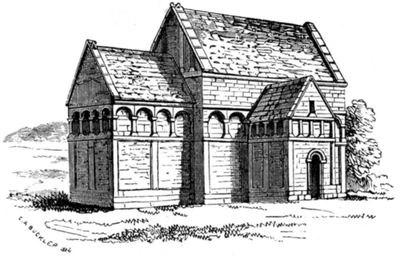
Saxon church at Bradford-on-Avon, Wilts.
24. Ealdhelm and Cædmon.—When a change is good in itself, it usually bears fruit in unexpected ways. Theodore was a scholar as well as a bishop. Under his care a school grew up at Canterbury, full of all the learning of the Roman world. That which distinguished this school and others founded in imitation of it was that the scholars did not keep their learning to themselves, but strove to make it helpful to the ignorant and the poor. They learnt architecture on the Continent in order to raise churches of stone in the place of churches of wood. One of these churches is still standing at Bradford-on-Avon. Its builder was Ealdhelm, the abbot of Malmesbury, a teacher of all the knowledge of the time. Ealdhelm, learned as he was, let his heart go forth to the unlearned. Finding that his neighbours would not listen to his sermons, he sang to them (p. 052) on a bridge to win them to higher things. Like all people who cannot read, the English of those days loved a song. In the north, Cædmon, a rude herdsman on the lands of the abbey which in later days was known as Whitby, was vexed with himself because he could not sing. When at ale-drinkings his comrades pressed him to sing a song, he would leave his supper unfinished and return home ashamed. One night in a dream he heard a voice bidding him sing of the Creation. In his sleep the words came to him, and they remained with him when he woke. He had become a poet—a rude poet, it is true, but still a poet. The gift which Cædmon had acquired never left him. He sang of the Creation and of the whole course of God's providence. To the end he was unable to compose any songs which were not religious.
25. Bede. 673—735.—Of all the English scholars of the time Bæda, usually known as 'the venerable Bede,' was the most remarkable. He was a monk of Jarrow on the Tyne. From his youth up he was a writer on all subjects embraced by the knowledge of his day. One subject he made his own. He was the first English historian. The title of his greatest work was the Ecclesiastical History of the English Nation. He told how that nation had been converted, and of the fortunes of its Church; but for him the Church included the whole nation, and he told of the doings of kings and people, as well as of priests and monks. In this he was a true interpreter of the spirit of the English Church. Its clergy did not stand aloof from the rulers of the state, but worked with them as well as for them. The bishops stepped into the place of the heathen priests in the Witenagemots of the kings, and counselled them in matters of state as well as in matters of religion.
26. Church Councils.—Bede recognised in the title of his book that there was such a thing as an English nation long before there was any political unity. Whilst kingdom was fighting against kingdom, Theodore in 673 assembled the first English Church council at Hertford. From that time such councils of the bishops and principal clergy of all England met whenever any ecclesiastical question required them to deliberate in common. The clergy at least did not meet as West Saxons or as Mercians. They met on behalf of the whole English Church, and their united consultations must have done much to spread the idea that, in spite of the strife between the kings, the English nation was really one.
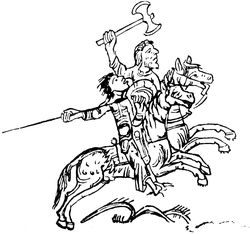
Saxon horsemen (Harl. MS. 603.)
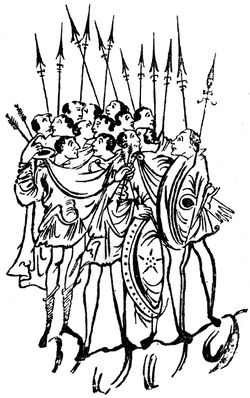
Group of Saxon warriors. (Harl. MS. 603.)
27. Struggle between Mercia and Wessex.—Many years passed away before the kingdoms could be brought under one king. North-humberland stood apart from southern England, and during (p. 053) the latter half of the seventh century Wessex grew in power. Wessex had been weak because it was seldom thoroughly united. Each district was presided over by an Ætheling, or chief of royal blood, and it was only occasionally that these Æthelings submitted to the king. From time to time a strong king compelled the obedience of the Æthelings and carried on the old struggle with the western Welsh. It was not till 710 that Ine succeeded in driving the Welsh out of Somerset, and about the same time a body of the West Saxons advancing through Dorset reached Exeter. They took possession of half the city for themselves, and left the remainder to the Welsh. Ine was, however, checked by fresh outbreaks of the subordinate Æthelings, and in 726 he gave up the struggle and went on a pilgrimage to Rome. Æthelbald, king of the Mercians, took the opportunity to invade Wessex, and made himself master of the country and over-lord of all the other kingdoms south of the Humber. In 754 the West Saxons rose against him and defeated him at Burford. After a few years his successor, Offa, once more took up the task of making the Mercian king over-lord of southern England. In 775, after a long struggle, he brought Kent as well as Essex under his sway. In 779 he defeated the West Saxons at Bensington, and pushed the Mercian frontier to the Thames. Further than that Offa did not venture to go, and, great as he was, the West Saxons within their shrunken (p. 054) limits continued to be independent of him. He turned his arms upon the Welsh, and drove them back from the Severn to the embankment which is known from his name as Offa's Dyke. The West Saxons, being freed from attack on the side of Mercia, overran Devon. Then there was a contest for the West Saxon crown between Beorhtric and Ecgberht. Beorhtric gained the upper hand, and entered into alliance with Offa by taking his daughter to wife. Ecgberht fled to the Continent.
28. Mohammedanism and the Carolingian Empire.—A great change had passed over Europe since the days when a Frankish princess, by her marriage with the Kentish Ethelberht, had smoothed the way for the introduction of Christianity into England. In the first part of the seventh century Mohammed had preached a new religion in Arabia. He taught that there was one God, and that Mohammed was his prophet. After his death his Arab followers spread as conquerors over the neighbouring countries. Before the end of the century they had subdued Persia, Syria, and Egypt, and were pushing westwards along the north coast of Africa. In 711 they crossed the Straits of Gibraltar. All Spain, with the exception of a hilly district in the north, soon fell into their hands, and in 717 they crossed the Pyrenees. There can be little doubt that, if they had subdued Gaul, Mohammedanism and not Christianity would for a long time have been the prevailing religion in Europe. From this Europe was saved by a great Frankish warrior, Charles Martel (the Hammer), who in 732 drove the invaders back at a great battle between Tours and Poitiers. Charles's son, Pippin, dethroned the reigning family and became king of the Franks. Pippin's son was Charles the Great, who before he died ruled over the whole of Gaul and Germany, over the north and centre of Italy, and the north-east of Spain. His rule was favoured both by the Frankish warriors and by the clergy, who were glad to see so strong a bulwark erected against the attacks of the Mohammedans. At that time the Roman Empire, which had never ceased to exist at Constantinople, fell into the hands of Irene, the murderess of her son. In 800 the Pope, refusing to acknowledge that the Empire could have so unworthy a head, placed the Imperial crown on the head of Charles as the successor of the old Roman Emperors.
29. Ecgberht's Rule. 802—839.—Though Charles did not directly govern England, he made his influence felt there. Offa had claimed his protection, and Ecgberht took refuge at his court. Ecgberht doubtless learned something of the art of ruling from him, and in 802 he returned to England. Beorhtric was by this time dead, (p. 055) and Ecgberht was accepted as king by the West Saxons. Before he died, in 839, he had made himself the over-lord of all the other kingdoms. He was never, indeed, directly king of all England. Kent, Sussex, and Essex were governed by rulers of his own family appointed by himself. Mercia, East Anglia, and North-humberland retained their own kings, ruling under Ecgberht as their over-lord. Towards the west Ecgberht's direct government did not reach beyond the Tamar, though the Cornish Celts acknowledged his authority, as did the Celts of Wales. The Celts of Strathclyde and the Picts and Scots remained entirely independent.[Back to Contents]
LEADING DATES
1. The West Saxon Supremacy.—It was quite possible that the power founded by Ecgberht might pass away as completely as did the power which had been founded by Æthelfrith of North-humberland or by Penda of Mercia. To some extent the danger was averted by the unusual strength of character which for six generations showed itself in the family of Ecgberht. For nearly a century and a half after Ecgberht's death no ruler arose from his line who had not great qualities as a warrior or as a ruler. It was no less important that these successive kings, with scarcely an exception, kept up a good understanding with the clergy, and especially with the Archbishops of Canterbury, so that the whole of the influence of the Church was thrown in favour of the political unity of England under the West Saxon line. The clergy wished to see the establishment of a strong national government for the protection of the national Church. Yet it was difficult to establish such a government unless other causes than the goodwill of the clergy had contributed to its maintenance. Peoples who have had little intercourse except by fighting with one another rarely unite (p. 056) heartily unless they have some common enemy to ward off, and some common leader to look up to in the conduct of their defence.[3]
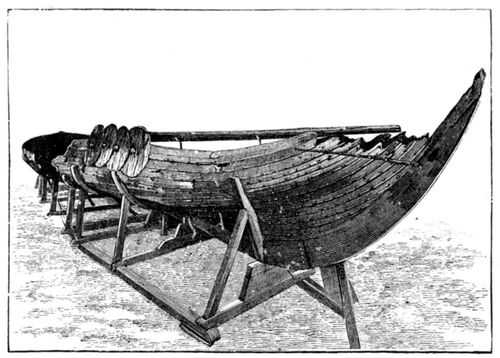
Remains of a Viking ship, from a cairn at Gokstad. (Now in the University at Christiania.)
2. The Coming of the Northmen.—The common enemy came from the north. At the end of the eighth century the inhabitants (p. 057) of Norway and Denmark resembled the Angles and Saxons three or four centuries before. They swarmed over the sea as pirates to plunder wherever they could find stored-up wealth along the coasts of Western Europe. The Northmen were heathen still and their religion was the old religion of force. They loved battle even more than they loved plunder. They held that the warrior who was slain in fight was received by the god Odin in Valhalla, where immortal heroes spent their days in cutting one another to pieces, and were healed of their wounds in the evening that they might join in the nightly feast, and be able to fight again on the morrow. He that died in bed was condemned to a chilly and dreary existence in the abode of the goddess Hela, whose name is the Norse equivalent of Hell.
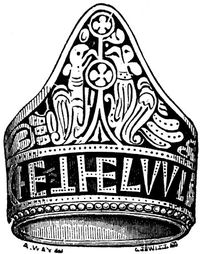
Gold ring of Æthelwulf.
3. The English Coast Plundered.—Since Englishmen had settled in England they had lost the art of seamanship. The Northmen therefore were often able to plunder and sail away. They could only be attacked on land, and some time would pass before the Ealdorman who ruled the district could gather together not only his own war-band, but the fyrd, or levy of all men of fighting age. When at last he arrived at the spot on the coast where the pirates had been plundering, he often found that they were already gone. Yet, as time went on, the Northmen took courage, and pushed far enough into the interior to be attacked before they could regain the coast. Their first landing had been in 787, before the time of Ecgberht. In Ecgberht's reign their attacks upon Wessex were so persistent that Ecgberht had to bring his own war-band to the succour of his Ealdormen. His son and successor, Æthelwulf, had a still harder struggle. The pirates spread their attacks over the whole of the southern and the eastern coast, and ventured to remain long enough on shore to fight a succession of battles. In 851 they were strong enough to remain during the whole winter in Thanet. The crews of no less than 350 ships landed in the mouth of the Thames sacked Canterbury and London. They were finally defeated by Æthelwulf at Aclea (Ockley), in Surrey. In 858 Æthelwulf died. Four of his sons wore the crown in succession; the two eldest, Æthelbald and Æthelberht, ruling only a short time.
4. The Danes in the North.—The task of the third brother, (p. 058) Æthelred, who succeeded in 866, was harder than his father's. Hitherto the Northmen had come for plunder, and had departed sooner or later. A fresh swarm of Danes now arrived from Denmark to settle on the land as conquerors. Though they did not themselves fight on horseback, they seized horses to betake themselves rapidly from one part of England to the other. Their first attack was made on the north, where there was no great affection for the West Saxon kings. They overcame the greater part of North-humberland. They beat down the resistance of East Anglia, and, fastening its king, Eadmund, to a tree, shot him to death with arrows. His countrymen counted him a saint, and a great monastery arose at Bury St. Edmunds in his honour. Everywhere the Danes plundered and burnt the monasteries, because the monks were weak, and their houses were rich with jewelled service books and golden plate. They next turned upon Mercia, and forced the Mercian under-king to pay tribute to them. Only Wessex, to which the smaller eastern states of Kent and Sussex had by this time been completely annexed, retained its independence.
5. Ælfred's Struggle in Wessex. 871—878.—In Wessex Æthelred strove hard against the invaders. He won a great victory at Æscesdun (Ashdown, near Reading), on the northern slope of the Berkshire Downs. After a succession of battles he was slain in 871. Though he left sons of his own, he was succeeded by Ælfred, his youngest brother. It was not the English custom to give the crown to the child of a king if there was any one of the kingly family more fitted to wear it. Ælfred was no common man. In his childhood he had visited Rome, and had been hallowed as king by Pope Leo IV., though the ceremony could have had no weight in England. He had early shown a love of letters, and the story goes that when his mother offered a book with bright illuminations to the one of her children who could first learn to read it, the prize was won by Ælfred. During Æthelred's reign he had little time to give to learning. He fought nobly by his brother's side in the battles of the day, and after he succeeded him he fought nobly as king at the head of his people. In 878 the Danish host, under its king, Guthrum, beat down all resistance. Ælfred was no longer able to keep in the open country, and took refuge with a few chosen warriors in the little island of Athelney, in Somerset, then surrounded by the waters of the fen country through which the Parret flowed. After a few weeks he came forth, and with the levies of Somerset and Wilts and of part of Hants he utterly defeated Guthrum at Ethandun (? Edington, in Wiltshire), and stormed his camp.
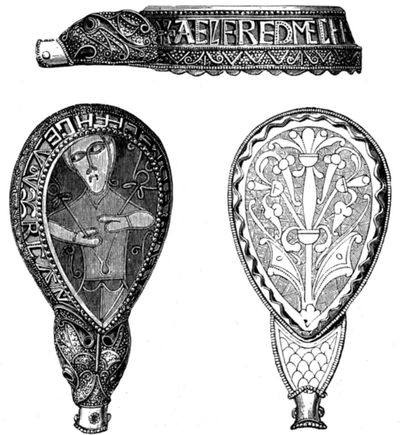
Gold jewel of Ælfred found at Athelney. (Now in the Ashmolean Museum, Oxford.)
(p. 059) 6. The Treaty of Chippenham, and its Results. 878.—After this defeat Guthrum and the Danes swore to a peace with Ælfred at Chippenham. They were afterwards baptised in a body at Aller, not far from Athelney. Guthrum with a few of his companions then visited Ælfred at Wedmore, a village near the southern foot of the Mendips, from which is taken the name by which the treaty is usually but wrongly known. By this treaty Ælfred retained no more than Wessex, with its dependencies, Sussex and Kent, and the western half of Mercia. The remainder of England as far north as the Tees was surrendered to the Danes, and became known as the Danelaw, because Danish and not Saxon law prevailed in it. Beyond the Tees Bernicia maintained its independence under an English king. Though the English people never again had to struggle for its very existence as a political body, yet, in 886, after a successful war, Ælfred wrung from Guthrum a fresh treaty by which the Danes surrendered London and the surrounding district. Yet, even after this second treaty, it might seem as if Ælfred, who only ruled over (p. 060) a part of England, was worse off than his grandfather, Ecgberht, who had ruled over the whole. In reality he was better off. In the larger kingdom it would have been almost impossible to produce the national spirit which alone could have permanently kept the whole together. In the smaller kingdom it was possible, especially as there was a strong West Saxon element in the south-west of Mercia in consequence of its original settlement by a West Saxon king after the battle of Deorham (see p. 35). Moreover, Ælfred, taking care not to offend the old feeling of local independence which still existed in Mercia, appointed his son-in-law, Æthelred, who was a Mercian, to govern it as an ealdorman under himself.
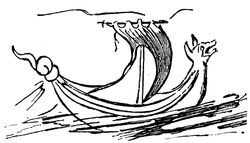
An English vessel. (Harl. MS. 603.)
7. Ælfred's Military Work.—Ælfred would hardly have been able to do so much unless his own character had been singularly attractive. Other men have been greater warriors or legislators or scholars than Ælfred was, but no man has ever combined in his own person so much excellence in war, in legislation, and in scholarship. As to war, he was not only a daring and resolute commander, but he was an organiser of the military forces of his people. One chief cause of the defeats of the English had been the difficulty of bringing together in a short time the 'fyrd,' or general levy of the male population, or of keeping it long together when men were needed at home to till the fields. Ælfred did his best to overcome this difficulty by ordering that half the men of each shire should be always ready to fight, whilst half remained at home. This new half-army, like his new half-kingdom, was stronger than the whole one had been before. To an improved army Ælfred added a navy, and he was the first English king who defeated the Danes at sea.
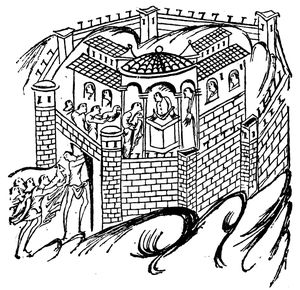
A Saxon house. (Harl. MS. 603.)
8. His Laws and Scholarship.—Ælfred was too great a man to want to make every one conform to some ideal of his own choosing. It was enough for him to take men as they were, and to help them to become better. He took the old laws and customs, and then, suggesting a few improvements, submitted them to the approval of his Witenagemot, the assembly of his bishops and warriors. He knew also that men's conduct is influenced more by what they think than by what they are commanded to do. His whole land was steeped in ignorance. The monasteries had been the schools of learning; and many of them had been sacked by the Danes, their books (p. 061) burnt, and their inmates scattered, whilst others were deserted, ceasing to receive new inmates because the first duty of Englishmen had been to defend their homes rather than to devote themselves to a life of piety. Latin was the language in which the services of the Church were read, and in which books like Bede's Ecclesiastical History were written. Without a knowledge of Latin there could be no intercourse with the learned men of the Continent, who used that language still amongst themselves. Yet when the Danes departed from Ælfred's kingdom, there were but very few priests who could read a page of Latin. Ælfred did his best to remedy the evil. He called learned men to him wherever they could be found. Some of these were English; others, like Asser, who wrote Ælfred's life, were Welsh; others again were Germans from beyond the sea. Yet Ælfred was not content. It was a great thing that there should be again schools in England for those who could write and speak Latin, the language of the learned, but his heart yearned for those who could not speak anything but their own native tongue. He set himself to be the teacher of these. He himself translated Latin books for them, with the object of imparting knowledge, not of giving, as a modern translator would do, the exact sense of the author. When, therefore, he knew anything which was not in the books, but which he thought it good for Englishmen to read, he added it to his translation. Even with this he was not content. The books of Latin writers which he translated taught men about the history and geography of the Continent. They taught nothing about the history of England itself, of the deeds and words of the men who had ruled the English nation. That these things might not be forgotten, he bade his learned men bring together all that was known of the history of his people since the day when they first landed as pirates on the coast of Kent. The Chronicle, as it is called, is the earliest history which any European nation possesses in its own tongue. (p. 062) Yet, after all, such a man as Ælfred is greater for what he was than for what he did. No other king ever showed forth so well in his own person the truth of the saying, 'He that would be first among you, let him be the servant of all.'
9. Eadward the Elder. 899—925.—In 899 Ælfred died. He had already fortified London as an outpost against the Danes, and he left to his son, Eadward, a small but strong and consolidated kingdom. The Danes on the other side of the frontier were not united. Guthrum's kingdom stretched over the old Essex and East Anglia, as well as over the south-eastern part of the old Mercia. The land from the Humber to the Nen was under the rule of Danes settled in the towns known to the English as the Five boroughs of Derby, Leicester, Lincoln, Stamford, and Nottingham. In the old Deira or modern Yorkshire was a separate Danish kingdom. Danes, in short, settled wherever we now find the place-names, such as Derby and Whitby, ending in the Danish termination 'by' instead of in the English terminations 'ton' or 'ham,' as in Luton and Chippenham. Yet even in these parts the bulk of the population was usually English, and the English population would everywhere welcome an English conqueror. A century earlier a Mercian or a North-humbrian had preferred independence to submission to a West Saxon king. They now preferred a West Saxon king to a Danish master, especially as the old royal houses were extinct, and there was no one but the West Saxon king to lead them against the Danes.
10. Eadward's Conquests.—Eadward was not, like his father, a legislator or a scholar, but he was a great warrior. In a series of campaigns he subdued the Danish parts of England as far north as the Humber. He was aided by his brother-in-law, Æthelred, and after Æthelred's death by his own sister, Æthelred's widow, Æthelflæd, the Lady of the Mercians, one of the few warrior-women of the world. Step by step the brother and sister won their way, not contenting themselves with victories in the open country, but securing each district as they advanced by the erection of 'burhs' or fortifications. Some of these 'burhs' were placed in desolate Roman strongholds, such as Chester. Others were raised, like that of Warwick, on the mounds piled up in past times by a still earlier race. Others again, like that of Stafford, were placed where no fortress had been before. Towns, small at first, grew up in and around the 'burhs,' and were guarded by the courage of the townsmen themselves. Eadward, after his sister's death, took into his own hands the government of Mercia, and from that time all (p. 063) southern and central England was united under him. In 922 the Welsh kings acknowledged his supremacy.
11. Eadward and the Scots.—Tradition assigns to Eadward a wider rule shortly before his death. In the middle of the ninth century the Picts and the intruding Scots (see p. 42) had been amalgamated under Keneth MacAlpin, the king of the Scots, and the new kingdom had since been welded together, just as Mercia and Wessex were being welded together by the attacks of the Danes. It is said that in 925 the king of the Scots, together with other northern rulers, chose Eadward 'to father and lord.' Probably this statement only covers some act of alliance formed by the English king with the king of Scots and other lesser rulers. Nothing was more natural than that the Scottish king, Constantine, should wish to obtain the support of Eadward against his enemies; and it was also natural that if Eadward agreed to support him, he would require some acknowledgment of the superiority of the English king; but what was the precise form of the acknowledgment must remain uncertain. In 925 Eadward died.
12. Æthelstan. 925—940.—Three sons of Eadward reigned in succession. The eldest, of illegitimate birth, was Æthelstan. Sihtric, the Danish king at York, owned him as over-lord, and on Sihtric's death in 926, Æthelstan took Danish North-humberland under his direct rule. The Welsh kings were reduced to make a fuller acknowledgment of his supremacy than they had made to his father. He drove the Welsh out of the half of Exeter which had been left to them, and confined them to the modern Cornwall beyond the Tamar. Great rulers on the Continent sought his alliance. The empire of Charles the Great had broken up. One of Æthelstan's sisters was given to Charles the Simple, the king of the Western Franks; another to Hugh the Great, Duke of the French and lord of Paris, who, though nominally the vassal of the king, was equal in power to his lord, and whose son was afterwards the first king of modern France. A third sister was given to Otto, the son of Henry, the king of the Eastern Franks, from whom, in due time, sprang a new line of Emperors. Æthelstan's greatness drew upon him the jealousy of the king of the Scots and of all the northern kings. In 937 he defeated them all in a great battle at Brunanburh, of which the site is unknown. His victory was celebrated in a splendid war-song.
13. Eadmund (940-946) and Eadred (946-955).—Æthelstan died in 940. He was succeeded by his young brother, Eadmund, who had fought bravely at Brunanburh. Eadmund had to meet a (p. 064) general rising of the Danes of Mercia as well as of those of the north. After he had suppressed the rising he showed himself to be a great statesman as well as a great warrior. The relations between the king of the English and the king of the Scots had for some time been very uncertain. Little is definitely known about them but it looks as if they joined the English whenever they were afraid of the Danes, and joined the Danes whenever they were afraid of the English. Eadmund took an opportunity of making it to be the interest of the Scottish king permanently to join the English. The southern part of the kingdom of Strathclyde had for some time been under the English kings. In 945 Eadmund overran the remainder, but gave it to Malcolm on condition that he should be his fellow-worker by sea and land. The king of Scots thus entered into a position of dependent alliance towards Eadmund. A great step was thus taken in the direction in which the inhabitants of Britain afterwards walked. The dominant powers in the island were to be English and Scots, not English and Danes. Eadmund thought it worth while to conciliate the Scottish Celts rather than to endeavour to conquer them. The result of Eadmund's statesmanship was soon made manifest. He himself did not live to gather its fruits. In 946 an outlaw who had taken his seat at a feast in his hall slew him as he was attempting to drag him out by the hair. The next king, Eadred, the last of Eadward's sons, though sickly, had all the spirit of his race. He had another sharp struggle with the Danes, but in 954 he made himself their master. North-humberland was now thoroughly amalgamated with the English kingdom, and was to be governed by an Englishman, Oswulf, with the title of Earl, an old Danish title equivalent to the English Ealdorman, having nothing to do, except philologically, with the old English word Eorl.
14. Danes and English.—In 955 Eadred died, having completed the work which Ælfred had begun, and which had been carried on by his son and his three grandsons. England, from the Forth to the Channel, was under one ruler. Even the contrast between Englishmen and Danes was soon, for the most part, wiped out. They were both of the same Teutonic stock, and therefore their languages were akin to one another and their institutions very similar. The Danes of the north were for some time fiercer and less easily controlled than the English of the south, but there was little national distinction between them, and what little there was gradually passed away.
15. Eadwig. 955—959.—Eadred was succeeded by Eadwig, the (p. 065) eldest son of his brother Eadmund. Eadwig was hardly more than fifteen years old, and it would be difficult for a boy to keep order amongst the great ealdormen and earls. At his coronation feast he gave deep offence by leaving his place to amuse himself with a young kinswoman, Ælfgifu, in her mother's room, whence he was followed and dragged back by two ecclesiastics, one of whom was Dunstan, Abbot of Glastonbury.
16. Dunstan.—Dunstan in his boyhood had been attached to Eadmund's court, but he had been driven off by the rivalry of other youths. He was in no way fitted to be a warrior. He loved art and song, and preferred a book to a sword. For such youths there was no place amongst the fighting laymen, and Dunstan early found the peace which he sought as a monk at Glastonbury. Eadmund made him abbot, but Dunstan had almost to create his monastery before he could rule it. Monasteries had nearly vanished from England in the time of the Danish plunderings, and the few monks who remained had very little that was monastic about them. Dunstan brought the old monks into order, and attracted new ones, but to the end of his days he was conspicuous rather as a scholar than as an ascetic. From Glastonbury he carried on the work of teaching an ignorant generation, just as Ælfred had done in an earlier time. Ælfred, however, was a warrior and a ruler first, and then a teacher. Dunstan was a teacher first, and then a ruler. Eadred took counsel with him, and Dunstan became thus the first example of a class of men which afterwards rose to power—that, namely, of ecclesiastical statesmen. Up to that time all who had governed had been warriors.
17. Archbishop Oda.—Another side of the Church's work, the maintenance of a high standard of morality, was, in the time of Eadred, represented by Oda, Archbishop of Canterbury. The accepted standard of morality differs in different ages, and, for many reasons, it was held by the purer minds in the tenth century that celibacy was nobler than marriage. If our opinion is changed now, it is because many things have changed. No one then thought of teaching a girl anything, except to sew and to look after the house, and an ignorant and untrained wife could only be a burden to a man who was intent upon the growth of the spiritual or intellectual life in himself and in others. At all times the monks, who were often called the regular clergy, because they lived according to a certain rule, had been unmarried, and attempts had frequently been made by councils of the Church to compel the parish priests, or secular clergy, to follow their example. In England, however, (p. 067) and on the Continent as well, these orders were seldom heeded, and a married clergy was everywhere to be found. Of late, however, there had sprung up in the monastery of Cluny, in Burgundy, a zeal for the establishment of universal clerical celibacy, and this zeal was shared by Archbishop Oda, though he found it impossible to overcome the stubborn resistance of the secular clergy.
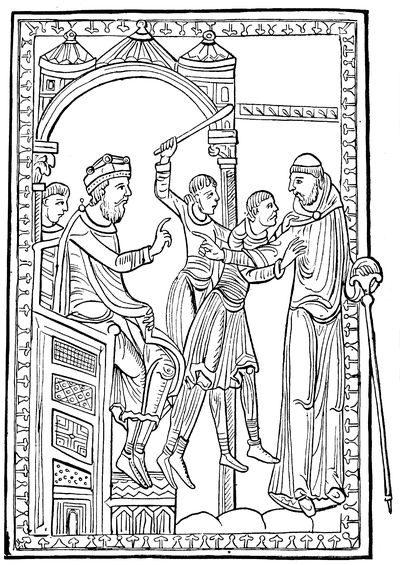
A monk driven out of the King's presence.
(From a
drawing belonging to the Society of Antiquaries.)
18. Eadwig's Marriage.—In its eagerness to set up a pure standard of morality, the Church had made rules against the marriage of even distant relations. Eadwig offended against these rules by marrying his kinswoman, Ælfgifu. A quarrel arose on this account between Dunstan and the young king, and Dunstan was driven into banishment. Such a quarrel was sure to weaken the king, because the support of the bishops was usually given to him, for the sake of the maintenance of peace and order. The dispute came at a bad time, because there was also a quarrel among the ealdormen and other great men. At last the ealdormen of the north and centre of England revolted and set up the king's brother, Eadgar, to be king of all England north of the Thames. Upon this, Oda, taking courage, declared Eadwig and his young wife to be separated as too near of kin, and even seized her and had her carried beyond sea. In 959 Eadwig died, and Eadgar succeeded to the whole kingdom.[Back to Contents]
1. Eadgar and Dunstan. 959—975.—Eadgar was known as the Peaceful King. He had the advantage, which Eadwig had not, of having the Church on his side. He maintained order, with the help of Dunstan as his principal adviser. Not long after his accession Dunstan became Archbishop of Canterbury. His policy was that of a man who knows that he cannot do everything and is content to do what he can. The Danes were to keep their own laws, and not to have English laws forced upon them. The great ealdormen were to be conciliated, not to be repressed. Everything was to be done to raise the standard of morality and knowledge. Foreign teachers were brought in to set up schools. More than this Dunstan did not attempt. It is true that in his time an effort was (p. 068) made to found monasteries, which should be filled with monks living after the stricter rule of which the example had been set at Cluny, but the man who did most to establish monasteries again in England was not Dunstan, but Æthelwold, Bishop of Winchester. Æthelwold, however, was not content with founding monasteries. He also drove out the secular canons from his own cathedral of Winchester and filled their places with monks. His example was followed by Oswald, Bishop of Worcester. Dunstan did not introduce monks even into his own cathedrals at Worcester and Canterbury. As far as it is now possible to understand the matter, the change, though it provoked great hostility, was for the better. The secular canons were often married, connected with the laity of the neighbourhood, and living an easy life. The monks were celibate, living according to a strict rule, and conforming themselves to what, according to the standard of the age, was the highest ideal of religion. By a life of complete self-denial they were able to act as examples to a generation which needed teaching by example more than by word. How completely monasticism was associated with learning is shown by the fact that the monks now established at Worcester took up the work of continuing the Chronicle which had been begun under Ælfred (see p. 61).
2. The Cession of Lothian.—It is said that Eadgar was once rowed by six kings on the river Dee. The story, though probably untrue, sets forth his power not only over his own immediate subjects but over the whole island. His title of Peaceful shows that at least he lived on good terms with his neighbours. There is reason to believe that he was able to do this because he followed out the policy of Eadmund in singling out the king of Scots as the ruler whom it was most worth his while to conciliate. Eadmund had given over Strathclyde to one king of Scots. Eadgar, it is said—and probably with truth—gave over Lothian to another. Lothian was then the name of the whole of the northern part of Bernicia stretching from the Cheviots to the Forth. In Eadred's time the Scots had occupied Eadwinesburh (Edinburgh), the northern border fortress of Bernicia (see p. 43), and after this the land to the south of that fortress must have been difficult to defend against them. It is therefore likely that the story is true that Eadgar ceded Lothian to Kenneth, who was then king of the Scots, especially as it would account for the peaceful character of his reign. Kenneth in accepting the gift no doubt engaged to be faithful to Eadgar, though it is impossible to say what was the exact nature of his obligation. It is of more importance that a Celtic king ruled thenceforward over an (p. 069) English people as well as over his own Celtic Scots, and that ultimately his descendants became more English than Celtic in character, through the attraction exercised upon them by their English subjects.
3. Changes in English Institutions.—The long struggle with the Danes could not fail to leave its mark upon English society. The history of the changes which took place is difficult to trace; in the first place because our information is scanty, in the second because things happened in one part of the country which did not happen in another. Yet there were two changes which were widely felt: the growth of the king's authority, and the acceleration of the process which was reducing to bondage the ceorl, or simple freeman.
4. Growth of the King's Power.—In the early days of the English conquest the kings and other great men had around them their war-bands, composed of gesiths or thegns, personally attached to themselves, and ready, if need were, to die on their lord's behalf. Very early these thegns were rewarded by grants of land on condition of continuing military service. Every extension of the king's power over fresh territory made their services more important. It had always been difficult to bring together the fyrd, or general army of the freemen, even of a small district, and it was quite impossible to bring together the fyrd of a kingdom reaching from the Channel to the Firth of Forth. Ælfred's division of the fyrd into two parts, one to fight and the other to stay at home, may have served when all the fighting had to be done in the western part of Wessex. Æthelstan or Eadmund could not possibly make even half of the men of Devonshire or Essex fight in his battles north of the Humber. The kings therefore had to rely more and more upon their thegns, who in turn had thegns of their own whom they could bring with them; and thus was formed an army ready for military service in any part of the kingdom. A king who could command such an army was even more powerful than one who could command the whole of the forces of a smaller territory.
5. Conversion of the Freemen into Serfs.—It is impossible to give a certain account of the changes which passed over the English freemen, but there can be little doubt that a process had been for some time going on which converted them into bondmen, and that this process was greatly accelerated by the Danish wars. When a district was being plundered the peasant holders of the strips of village land suffered most, and needed the protection of the neighbouring thegn, who was better skilled in war than themselves, (p. 072) and this protection they could only obtain on condition of becoming bondmen themselves—that is to say, of giving certain days in the week to work on the special estate of the lord. A bondman differed both from a slave and from a modern farmer. Though he was bound to the soil and could not go away if he wished to do so, yet he could not be sold as though he were a slave; nor, on the other hand, could he, like a farmer, be turned out of his holding so long as he fulfilled his obligation of cultivating his lord's demesne. The lord was almost invariably a thegn, either of the king or of some superior thegn, and there thus arose in England, as there arose about the same time on the Continent, a chain of personal relationships. The king was no longer merely the head of the whole people. He was the personal lord of his own thegns, and they again were the lords of other thegns. The serfs cultivated their lands, and thereby set them free to fight for the king on behalf of the whole nation. It seems at first sight as if the English people had fallen into a worse condition. An organisation, partly military and partly servile, was substituted for an organisation of free men. Yet only in this way could the whole of England be amalgamated. The nation gained in unity what it lost in freedom.
6. The Hundred-moot and the Lord's Court.—In another way the condition of the peasants was altered for the worse by the growth of the king's power. In former days land was held as 'folkland,' granted by the people at the original conquest, passing to the kinsmen of the holder if he died without children. Afterwards the clergy introduced a system by which the owner could grant the 'bookland,' held by book or charter, setting at nought the claim of his kinsmen, and in order to give validity to the arrangement, obtained the consent of the king and his Witenagemot (see p. 45). In time, the king and the Witenagemot granted charters in other cases, and the new 'bookland' to a great extent superseded the old 'folkland,' accompanied by a grant of the right of holding special courts. In this manner the old hundred-moots became neglected, people seeking for justice in the courts of the lords. Yet those who lived on the lord's land attended his court, appeared as compurgators, and directed the ordeal just as they had once done in the hundred-moot.
7. The Towns.—The towns had grown up in various ways. Some were of old Roman foundation, such as Lincoln and Gloucester. Others, like Nottingham and Bristol, had come into existence since the English settlement. Others again gathered round monasteries, like Bury St. Edmunds and Peterborough. The (p. 073) inhabitants met to consult about their own affairs, sometimes in dependence on a lord. Where there was no lord they held a court which was composed in the same way as the hundred-moots outside. The townsmen had the right of holding a market. Every sale had to take place in the presence of witnesses who could prove, if called upon to do so, that the sale had really taken place, and markets were therefore usually to be found in towns, because it was there that witnesses could most easily be found.
8. The Origin of the Shires.—Shires, which were divisions larger than the hundreds, and smaller than the larger kingdoms, originated in various ways. In the south, and on the east coast as far north as the Wash, they were either old kingdoms like Kent and Essex, or settlements forming part of old kingdoms, as Norfolk (the north folk) formed part of East Anglia, and Dorset or Somerset, the lands of the Dorsætan or the Somersætan, formed part of the kingdom of Wessex. In the centre and north they were of more recent origin, and were probably formed as those parts of England were gradually reconquered from the Danes. The fact that most of these shires are named from towns—as Derbyshire from Derby, and Warwickshire from Warwick—shows that they came into existence after towns had become of importance.
9. The Shire-moot.—Whilst the hundred-moot decayed, the folk-moot continued to flourish under a new name, as the shire-moot. This moot was still attended by the freemen of the shire though the thegns were more numerous and the simple freemen less numerous than they had once been. Still the continued existence of the shire-moot kept up the custom of self-government more than anything else in England. The ordeals were witnessed, the weregild inflicted, and rights to land adjudged, not by an officer of the king, but by the landowners of the shire assembled for the purpose. These meetings were ordinarily presided over by the ealdorman, who appeared as the military commander and the official head of the shire, and by the bishop, who represented the Church. Another most important personage was the sheriff, or shire-reeve, whose business it was to see that the king had all his rights, to preside over the shire-moot when it sat as a judicial court, and to take care that its sentences were put in execution.
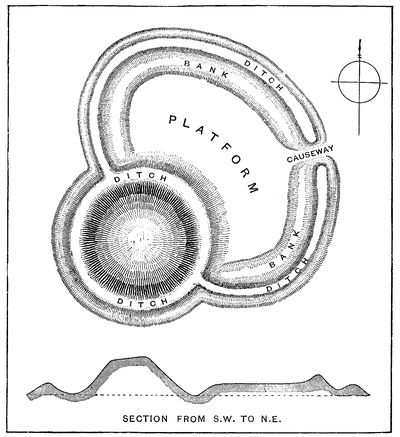
Walker & Boutallse.
Plan and section of a burh of the eleventh century at Laughton-en-Le-Morthen, Yorks.
10. The Ealdormen and the Witenagemot.—During the long fight with the Danes commanders were needed who could lead the forces of more than a single shire. Before the end of Eadred's reign there were ealdormen who ruled over many shires. One of them for instance, Æthelstan, Ealdorman of East Anglia, and of (p. 074) the shires immediately to the west of East Anglia, was so powerful that he was popularly known as the Half-King. Such ealdormen had great influence in their own districts, and they also were very powerful about the king. The king could not perform any important act without the consent of the Witenagemot, which was made up of three classes—the Ealdormen, the Bishops, and the greater Thegns. When a king died the Witenagemot chose his successor out of the kingly family; its members appeared as witnesses whenever the king 'booked' land to any one; and it even, on rare occasions, deposed a king who was unfit for his post. In (p. 075) the days of a great warrior king like Eadward or Eadmund, members of the Witenagemot were but instruments in his hands, but if a weak king came upon the throne, each member usually took his own way and pursued his own interest rather than that of the king and kingdom.
11. The Land.—The cultivated land was surrounded either by wood or by pasture and open commons. Every cottager kept his hive of bees, to produce the honey which was then used as we now use sugar, and drove his swine into the woods to fatten on the acorns and beech nuts which strewed the ground in the autumn. Sheep and cattle were fed on the pastures, and horses were so abundant that when the Danish pirates landed they found it easy to set every man on horseback. Yet neither the Danes nor the English ever learnt to fight on horseback. They rode to battle, but as soon as they approached the enemy they dismounted to fight on foot.
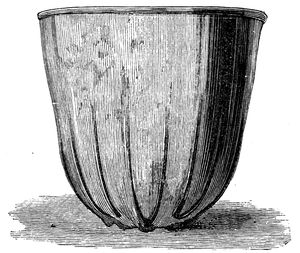
Glass tumbler. (British Museum.)
12. Domestic Life.—The huts of the villagers clustered round the house of the lord. His abode was built in a yard surrounded for protection by a mound and fence, whilst very great men often established themselves in burhs, surrounded by earthworks, either of their own raising or the work of earlier times. Its principal feature was the hall, in which the whole family with the guests and the thegns of the lord met for their meals. The walls were covered with curtains worked in patterns of bright colours. The fire was lighted on the hearth, a broad stone in the middle, over which was a hole in the roof through which the smoke of the hall escaped. The windows were narrow, and were either unclosed holes in the wall, or covered with oiled linen which would admit a certain amount of light.
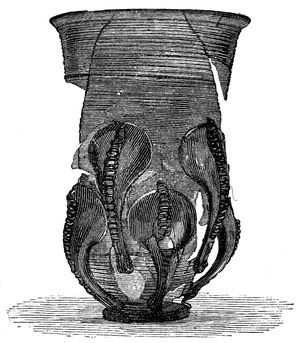
Drinking glass. (British Museum.)
13. Food and Drink.—In a great house at meal-time boards were brought forward and placed on tressels. Bread was to be had in plenty, and salt butter. Meat too, in winter, was always salted, as turnips and other roots upon which cattle are now fed in winter were wholly unknown, and it was therefore necessary to kill large numbers of sheep and oxen when the cold weather set in. There were dishes, but neither plates nor forks. Each man took the meat in his fingers and either bit off a piece or cut it off with a knife. The master of the house sat at the head of the table, and the lady handed round the drink, and afterwards sat down by her husband's side. She, however, with any other ladies who might be present, soon departed to the chamber which was their own apartment. The men continued drinking long. The cups or (p. 076) glasses which they used were often made with the bottoms rounded so as to force the guests to keep them in their hands till they were empty. The usual drink was mead, that is to say, fermented honey, or ale brewed from malt alone, as hops were not introduced till many centuries later. In wealthy houses imported wine was to be had. English wine was not unknown, but it was (p. 077) so sour that it had to be sweetened with honey. It was held to be disgraceful to leave the company as long as the drinking lasted, and drunkenness and quarrels were not unfrequent. Wandering minstrels who could play and sing or tell stories were always welcome, especially if they were jugglers as well, and could amuse the company by throwing knives in the air and catching them as they fell, or could dance on their hands with their legs in the air. When the feast was over, the guests and dependents slept on the floor on rugs or straw, each man taking care to hang his weapons close to his head on the wall, to defend himself in case of an attack by robbers in the night. The lord retired to his chamber, whilst the unmarried ladies occupied bowers, or small rooms, each with a separate door opening on to the yard. Their only beds were bags of straw. Neither men nor women wore night-dresses of any kind, but if they took off their clothes at all, wrapped themselves in rugs.[Back to Contents]
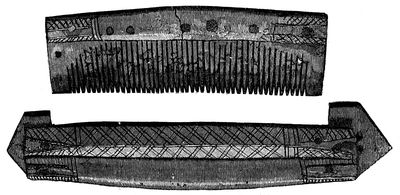
Comb and case of Scandinavian type, found at York.
(Now
in the British Museum.)
LEADING DATES
1. Eadward the Martyr. 975—979.—Eadgar died in 975, leaving two boys, Eadward and Æthelred.[4] On his death a quarrel broke out amongst the ealdormen, some declaring for the succession of Eadward and others for the succession of Æthelred. The political quarrel was complicated by an ecclesiastical quarrel. The supporters of Eadward were the friends of the secular clergy; the supporters of Æthelred were the friends of the monks. Dunstan, with his usual moderation, gave his voice for the eldest son, and Eadward was chosen king and crowned. Not only had he a strong party opposed to him, but he had a dissatisfied step-mother in Ælfthryth, the mother of Æthelred, whilst his own mother, who had probably been married to Eadgar without full marriage rites, had been long since dead. After reigning for four years Eadward was (p. 079) murdered near Corfe by some of the opposite party, and, as was commonly supposed, by his step-mother's directions.
2. Æthelred's Early Years. 979—988.—Æthelred, now a boy of ten, became king in 979. The epithet the Unready, which is usually assigned to him, is a mistranslation of a word which properly means the Rede-less, or the man without counsel. He was entirely without the qualities which befit a king. Eadmund had kept the great chieftains in subordination to himself because he was a successful leader. Eadgar had kept them in subordination because he treated them with respect. Æthelred could neither lead nor show respect. He was always picking quarrels when he ought to have been making peace, and always making peace when he ought to have been fighting. What he tried to do was to lessen the power of the great ealdormen, and bring the whole country more directly under his own authority. In 985 he drove out Ælfric, the Ealdorman of the Mercians. In 988 Dunstan died, and Æthelred had no longer a wise adviser by his side.
3. The Return of the Danes. 984.—It would have been difficult for Æthelred to overpower the ealdormen even if he had had no other enemies to deal with. Unluckily for him, new swarms of Danes and Norwegians had already appeared in England. They began by plundering the country, without attempting to settle in it. In 991 Brihtnoth, Ealdorman of the East Saxons, was defeated and slain by them at Maldon. Æthelred could think of no better counsel than to pay them 10,000l., a sum of money which was then of much greater value than it is now, to abstain from plundering. It was not necessarily a bad thing to do. One of the greatest of the kings of the Germans, Henry the Fowler, had paid money for a truce to barbarians whom he was not strong enough to fight. But when the truce had been bought Henry took care to make himself strong enough to destroy them when they came again. Æthelred was never ready to fight the Danes and Norwegians at any time. In 994 Olaf Trygvasson, who had been driven from the kingship of Norway, and Svend, who had been driven from the kingship of Denmark, joined forces to attack London. The London citizens fought better than the English king, and the two chieftains failed to take the town. 'They went thence, and wrought the greatest evil that ever any army could do, in burning, and harrying, and in man-slaying, as in Essex, and in Kent, and in Sussex, and in Hampshire. And at last they took their horses and rode as far as they could, and did unspeakable evil.' The plunderers were now known as 'the army,' moving about where they would. Æthelred this time (p. 080) gave them 16,000l. He got rid of Olaf, who sailed away and was slain by his enemies, but he could not permanently get rid of Svend. Svend, about the year 1000, recovered his kingship in Denmark, and was more formidable than he had been before. Plunderings went on as usual, and Æthelred had no resource but to pay money to the plunderers to buy a short respite. He then looked across the sea for an ally, and hoped to find one by connecting himself with the Duke of the Normans.
4. The Norman Dukes. 912—1002.—The country which lies on both sides of the lower course of the Seine formed, at the beginning of the tenth century, part of the dominions of Charles the Simple, king of the West Franks, who had inherited so much of the dominions of Charles the Great as lay west of a line roughly drawn from the Scheldt to the Mediterranean through the lower course of the Rhone. Danes and Norwegians, known on the Continent as Normans, plundered Charles's dominions as they had plundered England, and at last settled in them as they had settled in parts of England. In 912 Charles the Simple ceded to their leader, Hrolf, a territory of which the capital was Rouen, and which became known as Normandy—the land of the Normans. Hrolf became the first Duke of the Normans, but his men were fierce and rugged, and for some time their southern neighbours scornfully called him and his descendants Dukes of the Pirates. In process of time a change took place which affected both Normandy and other countries as well. The West Frankish kings were descended from Charles the Great; but they had failed to defend their subjects from the Normans, and they thereby lost hold upon their people. One of their dependent nobles, the Duke of the French, whose chief city, Paris, formed a bulwark against the Normans advancing up the Seine, grew more powerful than themselves. At the same time the Normans were becoming more and more French in their speech and customs. At last an alliance was made between Hugh Capet, the son of Hugh the Great, Duke of the French (see p. 63), and Richard the Fearless, Duke of the Normans. The race of Charles the Great was dethroned, and Hugh became king of the French. In name he was king over all the territory which had been governed by Charles the Simple. In reality that happened in France which Æthelred had been trying to prevent in England. Hugh ruled directly over his own duchy of France, a patch of land of which Paris was the capital. The great vassals of the crown, who answered to the English ealdormen, only obeyed him when it was their interest to do so. The most (p. 081) powerful of these vassals was the Duke of the Normans. In 1002 the duke was Richard II.—the Good—the son of Richard the Fearless. In that year Æthelred, who was a widower, married Richard's sister, Emma. It was the beginning of a connection with Normandy which never ceased till a Norman duke made himself by conquest king of the English.
5. Political Contrast between Normandy and England.—The causes which were making the English thegnhood a military aristocracy acted with still greater force in Normandy. The tillers of the soil, sprung from the old inhabitants of the land, were kept by their Norman lords in even harsher bondage than the English serfs. The Norman warriors held their land by military service, each one being bound to fight for his lord, and the lord in turn being bound, together with his dependents, to fight for a higher lord, and all at last for the Duke himself. In England, though, in theory, the relations between the king and his ealdormen were not very different from those existing between the Norman duke and his immediate vassals, the connection between them was far looser. The kingdom as a whole had no general unity. The king could not control the ealdormen, and the ealdormen could not control the king. Even when ealdormen, bishops, and thegns met in the Witenagemot they could not speak in the name of the nation. A nation in any true sense hardly existed at all, and they were not chosen as representatives of any part of it. Each one stood for himself, and it was only natural that men who during the greater part of the year were ruling in their own districts like little kings should think more of keeping up their own almost independent power at home than of the common interests of all England, which they had to consider when they met—and that for a few days only at a time—in the Witenagemot. Æthelred at least was not the man to keep them united.
6. Svend's Conquest. 1002—1013.—Æthelred, having failed to buy off the Danes, tried to murder them. In 1002, on St. Brice's Day, there was a general massacre of all the Danes—not of the old inhabitants of Danish blood who had settled in Ælfred's time—but of the new-comers. Svend returned to avenge his countrymen. Æthelred had in an earlier part of his reign levied a land-tax known as the Danegeld to pay off the Danes—the first instance of a general tax in England. He now called on all the shires to furnish ships for a fleet; but he could not trust his ealdormen. Some of the stories told of these times may be exaggerated, and some may be merely idle tales, but we know enough to be sure that England was (p. 082) a kingdom divided against itself. Svend, ravaging as he went, beat down resistance everywhere. In 1012 the Danes seized Ælfheah, Archbishop of Canterbury, and offered to set him free if he would pay a ransom for his life. He refused to do so, lest he should have to wring money from the poor in order to pay it. The drunken Danes pelted him with bones till one of the number clave his skull with an axe. He was soon counted as a martyr. Long afterwards one of the most famous of his successors, the Norman Lanfranc, doubted whether he was really a martyr, as he had not died for the faith. 'He that dies for righteousness,' answered the gentle Anselm, 'dies for the faith,' and to this day the name of Ælfheah is retained as St. Alphege in the list of English saints. In 1013 Svend appeared no longer as a plunderer but as a conqueror. First the old Danish districts of the north and east, and then the Anglo-Saxon realm of Ælfred—Mercia and Wessex—submitted to him to avoid destruction. In 1013 Æthelred fled to Normandy.
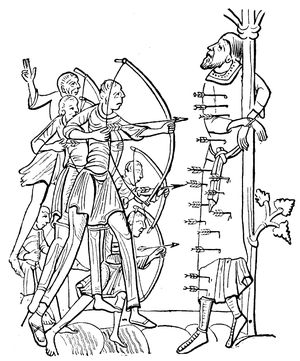
Martyrdom of St. Edmund by the Danes.
(From a drawing
belonging to the Society of Antiquaries.)
7. Æthelred Restored. 1014—1016.—In 1014 Svend died suddenly as he was riding at the head of his troops to the attack of the monastery of Bury St. Edmunds. A legend soon arose as to the manner of his death. St. Edmund himself, the East Anglian king Eadmund who had once been martyred by Danes (see p. 58), now appeared, it was said, to protect the monastery founded in his honour. 'Help, fellow soldiers!' cried Svend, as he caught sight of the saint. 'St. Edmund is coming to slay me.' St. Edmund, we are told, ran his spear through the body of the aggressor, and (p. 083) Svend died that night in torments. His Danish warriors chose his son Cnut king of England.[5] The English Witenagemot sent for Æthelred to return. At last, in 1016, Æthelred died before he had conquered Cnut or Cnut conquered him.
8. Eadmund Ironside. 1016.—Æthelred's eldest son—not the son of Emma—Eadmund Ironside, succeeded him. He did all that could be done to restore the English kingship by his vigour. In a single year he fought six battles; but the treachery of the ealdormen was not at an end, and at Assandun (? Ashington), in Essex, he was completely overthrown. He and Cnut agreed to divide the kingdom, but before the end of the year the heroic Eadmund died, and Cnut the Dane became king of England without a rival.
9. Cnut and the Earldoms. 1016—1035.—Cnut was one of those rulers who, like the Emperor Augustus, shrink from no barbarity in gaining power, but when once they have acquired it exercise their authority with moderation and gentleness. He began by outlawing or putting to death men whom he considered dangerous, but when this had once been done he ruled as a thoroughly English king of the best type. The Danes who had hitherto fought for him had come not as settlers, but as an army, and soon after Eadmund's death he sent most of them home, retaining a force, variously stated as 3,000 or 6,000, warriors known as his House-carls (House-men), who formed a small standing army depending entirely on himself. They were not enough to keep down a general rising of the whole of England, but they were quite enough to prevent any single great man from rebelling against him. Cnut therefore was, what Æthelred had wished to be, really master of his kingdom. Under him ruled the ealdormen, who from this time were known as Earls, from the Danish title of Jarl (see p. 64), and of these Earls the principal were the three who governed Mercia, North-humberland, and Wessex, the last named now including the old kingdoms of Kent and Sussex. There was a fourth in East Anglia, but the limits of this earldom varied from time to time, and (p. 084) there were sometimes other earldoms set up in the neighbouring shires, whereas the first-named three remained as they were for some time after Cnut's death. It is characteristic of Cnut that the one of the Earls to whom he gave his greatest confidence was Godwine, an Englishman, who was Earl of the West Saxons. Another Englishman, Leofwine, became Earl of the Mercians. A Dane obtained the earldom of the North-humbrians, but the land was barbarous, and its Earls were frequently murdered. Sometimes there was one Earl of the whole territory, sometimes two. It was not till after the end of Cnut's reign that Siward became Earl of Deira, and at a later time of all North-humberland as far as the Tweed. The descendants of two of these Earls, Godwine and Leofwine, leave their mark on the history for some time to come.
10. Cnut's Empire.—Beyond the Tweed Malcolm, king of the Scots, ruled. He defeated the North-humbrians at Carham, and Cnut ceded Lothian to him, either doing so for the first time or repeating the act of Eadgar, if the story of Eadgar's cession is true. At all events the king of the Scots from this time ruled as far south as the Tweed, and acknowledged Cnut's superiority. Cnut also became king of Denmark by his brother's death, and king of Norway by conquest. He entered into friendly relations with Richard II., Duke of the Normans, by marrying his sister Emma, the widow of Æthelred.[6]
11. Cnut's Government.—Cnut had thus made himself master of a great empire, and yet, Dane as he was, though he treated Englishmen and Danes as equals, he gave his special favour to Englishmen. He restored, as men said, the laws of Eadgar—that is to say, he kept peace and restored order as in the days of Eadgar. He (p. 085) reverenced monks, and once as he was rowing on the waters of the fens, he heard the monks of Ely singing. He bade the boatmen row him to the shore that he might listen to the song of praise and prayer. He even went on a pilgrimage to Rome, to humble himself in that city which contained the burial places of the Apostles Peter and Paul. From Rome he sent a letter to his subjects. 'I have vowed to God,' he wrote, 'to live a right life in all things; to rule justly and piously my realms and subjects, and to administer just judgment to all. If heretofore I have done aught beyond what is just, through headiness or negligence of youth, I am ready, with God's help, to amend it utterly.' With Cnut these were not mere words. It is not likely that there is any truth in the story how his flattering courtiers told him to sit by the sea-shore and bade the inflowing tide refrain from wetting his feet, and how when the waves rose over the spot on which his chair was placed he refused to wear his crown again, because that honour belonged to God alone, the true Ruler of the world. Yet the story would not have been invented except of one who was believed to have been clothed with real humility.
12. The Sons of Cnut. 1035—1042.—Cnut died in 1035. Godwine and the West Saxons chose Harthacnut, the son of Cnut and Emma to take his father's place, whilst the north and centre, headed by Leofwine's son, Leofric,[7] Earl of the Mercians, chose Harold, the son of Cnut by an earlier wife or concubine. Godwine perhaps hoped that Harthacnut would make the West Saxon earldom the centre of the empire which had been his father's. Cnut's empire was, however, breaking up. The Norwegians chose Magnus, a king of their own race, and Harthacnut remained in Denmark to defend it against the attacks of Magnus. In Normandy there were two English Ethelings, Ælfred and Eadward, the sons of Æthelred by Emma, who seem to have thought that the absence of Harthacnut gave them a chance of returning to England. Ælfred landed, but was seized by Harold. He was blinded with such (p. 086) cruelty that he died. His death was, truly or falsely, attributed to Godwine. As Harthacnut still remained in Denmark, the West Saxons deposed him and gave themselves to Harold, since which time England has never been divided. In 1040 Harold died, and Harthacnut came at last to England to claim the crown. He brought with him a Danish fleet, and with his sailors and his house-carls he ruled England as a conquered land. He raised a Danegeld to satisfy his men, and sent his house-carls to force the people to pay the heavy tax. Two of them were killed at Worcester, and he burnt Worcester to the ground. In 1042 he died 'as he stood at his drink' at a bridal.
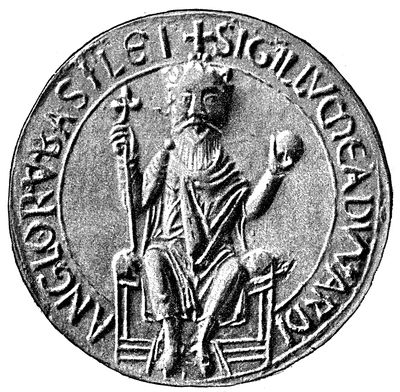
First Great Seal of Eadward the Confessor (obverse).
13. Eadward the Confessor and Earl Godwine. 1042—1051.—The English were tired of foreign rulers. 'All folk chose Eadward king.' Eadward, the son of Æthelred and the brother of the murdered Ælfred, though an Englishman on his father's side, was also the son of the Norman Emma, and had been brought up in Normandy from his childhood. The Normans were now men of French speech, and they were more polite and cultivated than Englishmen. (p. 087) Eadward filled his court with Normans. He disliked the roughness of the English, but instead of attempting to improve them as the great Ælfred had formerly done, he stood entirely aloof from them. The name of the Confessor by which he was afterwards known was given him on account of his piety, but his piety was not of that sort which is associated with active usefulness. He was fond of hunting, but was not active in any other way, and he left others to govern rather than himself. For some years the real governor of England was Earl Godwine, who kept his own earldom of Wessex, and managed to procure other smaller earldoms for his sons. As the Mercia over which Leofric ruled was only the north-western part of the old kingdom, and as Siward (see p. 84) had enough to do to keep the fierce men of North-humberland in order, Godwine had as yet no competitor to fear. In 1045 he became the king's father-in-law by the marriage of Eadward with his daughter, Eadgyth. Eadward, however, did his best for his Norman favourites, and appointed one of them, Robert of Jumièges, to the bishopric of London, and afterwards raised him to the Archbishopric of Canterbury. Between Godwine and the Normans there was no goodwill, and though Godwine was himself of fair repute, his eldest son, Swegen, a young man of brutal nature, alienated the goodwill of his countrymen by seducing the Abbess of Leominster, and by murdering his cousin Beorn. Godwine, in his blind family affection, clung to his wicked son and insisted on his being allowed to retain his earldom.

Hunting. (From the Bayeux Tapestry.)
14. The Banishment of Godwine. 1051.—At last, in 1051, the strife between the king and the Earl broke out openly. Eadward's brother-in-law, Eustace, Count of Boulogne, visited England. On his return his men made a disturbance at Dover, and in the riot which ensued some of the townsmen as well as some of his own men were slain. Eadward called on Godwine, in whose earldom Dover was, to punish the townsmen. Godwine refused, and Eadward summoned him to Gloucester to account for his refusal. He came attended by an armed host, but Leofric and Siward, who were jealous of Godwine's power, came with their armed followers to support the king. Leofric mediated, and it was arranged that the (p. 088) question should be settled at a Witenagemot to be held in London. In the end Godwine was outlawed and banished with all his family. Swegen went on a pilgrimage to Jerusalem and died on the way back.
15. Visit of Duke William. 1051.—In Godwine's absence Eadward received a visit from the Duke of the Normans, William, the bastard son of Duke Robert and the daughter of a tanner of Falaise. Robert was a son of Richard II., and William was thus the grandson of the brother of Eadward's mother, Emma. Such a relationship gave him no title whatever to the English throne, as Emma was not descended from the English kings, and as, even if she had been, no one could be lawfully king in England who was not chosen by the Witenagemot. Eadward, however, had no children or brothers, and though he had no right to give away the crown, he now promised William that he should succeed him. William, indeed, was just the man to attract one whose character was as weak as Eadward's. Since he received the dukedom he had beaten down the opposition of a fierce and discontented nobility at Val-ès-dunes (1047). From that day peace and order prevailed in Normandy. Law in Normandy did not come as in England from the traditions of the shire-moot or the Witenagemot, where men met to consult together. It was the Duke's law, and if the Duke was a strong man he kept peace in the land. If he was a weak man, the lords fought against one another and plundered and oppressed the poor. William was strong and wily, and it was this combination of strength and wiliness which enabled him to bear down all opposition.
16. William and the Norman Church.—An Englishman, who saw much of William in after-life, declared that, severe as he was, he was mild to good men who loved God. The Church was in his days assuming a new place in Europe. The monastic revival which had originated at Cluny (see p. 67) had led to a revival of the Papacy. In 1049, for the first time, a Pope, Leo IX., travelled through Western Europe, holding councils and inflicting punishments upon the married clergy and upon priests who took arms and shed blood. With this improvement in discipline came a voluntary turning of the better clergy to an ascetic life, and increased devotion was accompanied, as it always was in the middle ages, with an increase of learning. William, who by the strength of his will brought peace into the state, also brought men of devotion and learning into the high places of the Church. His chief confidant was Lanfranc, an Italian who had taken refuge in (p. 089) the abbey of Bec, and, having become its prior, had made it the central school of Normandy and the parts around. With the improvement of learning came the improvement of art, and churches arose in Normandy, as in other parts of Western Europe, which still preserved the old round arch derived from the Romans, though both the arches themselves and the columns on which they were borne were lighter and more graceful than the heavy work which had hitherto been employed. Of all this Englishmen as yet knew nothing. They went on in their old ways, cut off from the European influences of the time. It was no wonder that Eadward yearned after the splendour and the culture of the land in which he had been brought up, or even that, in defiance of English law, he now promised to Duke William the succession to the English crown.
17. The Return and Death of Godwine. 1052—1053.—After William had departed Englishmen became discontented at Eadward's increasing favour to the Norman strangers. In 1052 Godwine and his sons—Swegen only excepted—returned from exile. They sailed up the Thames and landed at Southwark. The foreigners hastily fled, and Eadward was unable to resist the popular feeling. Godwine was restored to his earldom, and an Englishman, Stigand, was made Archbishop of Canterbury in the place of Robert of Jumièges, who escaped to the Continent. As it was the law of the Church that a bishop once appointed could not be deposed except by the ecclesiastical authorities, offence was in this way given to the Pope. Godwine did not long outlive his restoration. He was struck down by apoplexy at the king's table in 1053. Harold, who, after Swegen's death, was his eldest son, succeeded to his earldom of Wessex, and practically managed the affairs of the kingdom in Eadward's name.[8]
18. Harold's Greatness. 1053—1066.—Harold was a brave and energetic man, but Eadward preferred his brother Tostig, and on the death of Siward appointed him Earl of North-humberland. A little later Gyrth, another brother of Harold, became Earl of East Anglia, together with Bedfordshire and Oxfordshire, and a (p. 090) fourth brother, Leofwine, Earl of a district formed of the eastern shires on either side of the Thames. All the richest and most thickly populated part of England was governed by Harold and his brothers. Mercia was the only large earldom not under their rule. It was now under Ælfgar, the son of Leofric, who had lately died.
19. Harold and Eadward. 1057—1065.—It became necessary to arrange for the succession to the throne, as Eadward was childless, and as Englishmen were not likely to acquiesce in his bequest to William. In 1057 the Ætheling Eadward, a son of Eadmund Ironside, was fetched back from Hungary, where he had long lived in exile, and was accepted as the heir. Eadward, however, died almost immediately after his arrival. He left but one son, Eadgar the Ætheling (see genealogy at p. 78), who was far too young to be accepted as a king for many years to come. Naturally the thought arose of looking on Harold as Eadward's successor. It was contrary to all custom to give the throne to any one not of the royal line, but the custom had been necessarily broken in favour of Cnut, the Danish conqueror, and it might be better to break it in favour of an English earl rather than to place a child on the throne, when danger threatened from Normandy. During the remainder of Eadward's reign Harold showed himself a warrior worthy of the crown. In 1063 he invaded Wales and reduced it to submission. About the same time Ælfgar died, and was succeeded by his son, Eadwine, in the earldom of the Mercians. In 1065 the men of North-humberland revolted against Tostig, who had governed them harshly, and who was probably unpopular as a West Saxon amongst a population of Danes and Angles. The North-humbrians chose Eadwine's brother, Morkere, as his successor, and Harold advised Eadward to acquiesce in what they had done. Northamptonshire and Huntingdonshire were committed to Waltheof, a son of Siward (see p. 84), and the modern Northumberland was committed to a native ruler, Oswulf.
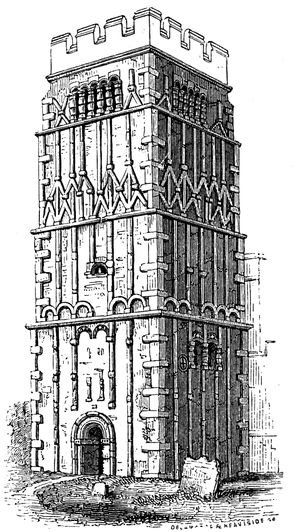
Tower in the earlier style. Church at Earl's Barton.
(The battlements are much later.)
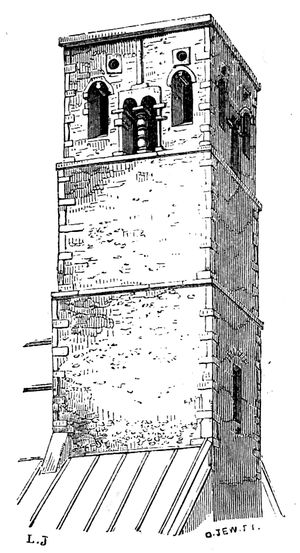
Tower in the earlier style. St Benet's Church, Cambridge.
20. Death of Eadward. 1066.—England was therefore ruled by two great families. Eadwine and Morkere, the grandsons of Leofric, governed the Midlands and almost the whole of North-humberland. Harold and his brothers, the sons of Godwine, governed the south and the east. The two houses had long been rivals, and after Eadward's death there would be no one in the country to whom they could even nominally submit. Eadward, whose life was almost at an end, was filled with gloomy forebodings. His thoughts, however, turned aside from the contemplation of earthly things, and he was only anxious that the great abbey church (p. 091) of Westminster, which he had been building hard by his own new palace on what was then a lonely place outside London, should be consecrated before his death. The church, afterwards superseded by the structure which now stands there, was built in the new and lighter form of round-arched architecture which Eadward had learned to admire from his Norman friends. It was consecrated on December 28, 1065, but the king was too ill to be present, and on January 5, 1066, he died, and was buried in the church which he had founded. Harold was at once chosen king, and crowned at Westminster.
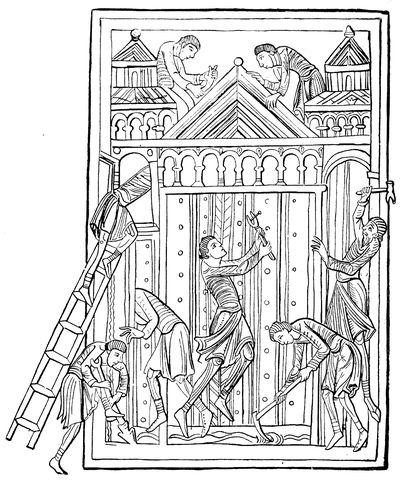
Building a church in the later style.
(From a drawing
belonging to the Society of Antiquaries.)
21. Harold and William. 1066.—William, as soon as he heard of his rival's coronation, claimed the crown. He was now even mightier than he had been when he visited Eadward. In 1063 he had conquered Maine, and, secure on his southern frontier, he was able to turn his undivided attention to England. According (p. 092) to the principles accepted in England, he had no right to it whatever; but he contrived to put together a good many reasons which seemed, in the eyes of those who were not Englishmen, to give him a good case. In the first place he had been selected by Eadward as his heir. In the second place the deprivation of Robert of Jumièges was an offence against the Church law of the Continent, and William was therefore able to obtain from the Pope a consecrated banner, and to speak of an attack upon (p. 093) England as an attempt to uphold the righteous laws of the Church. In the third place, Harold had at some former time been wrecked upon the French coast, and had been delivered up to William, who had refused to let him go till he had sworn solemnly, placing his hand on a chest which contained the relics of the most holy Norman saints, to do some act, the nature of which is diversely related, but which Harold never did. Consequently William could speak of himself as going to take vengeance on a perjurer. With some difficulty William persuaded the Norman barons to follow him, and he attracted a mixed multitude of adventurers from all the neighbouring nations by promising them the plunder of England, an argument which every one could understand. During the whole of the spring and the summer ships for the invasion of England were being built in the Norman harbours.
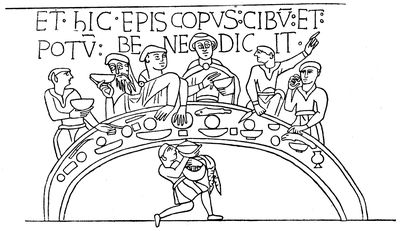
Normans feasting; with Odo, Bishop of Bayeux, saying
grace.
(From the Bayeux Tapestry.)
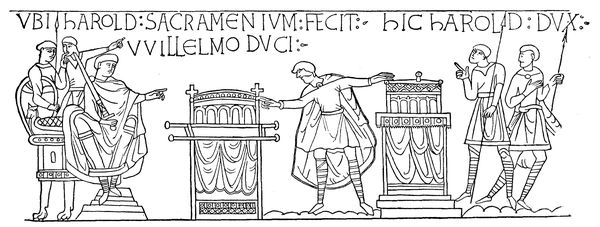
Harold swearing upon the Relics.
(From the Bayeux
Tapestry.)
22. Stamford Bridge. 1066.—All through the summer Harold was watching for his rival's coming. The military organisation of England, however, was inferior to that of Normandy. The Norman barons and their vassals were always ready for war, and they could support on their estates the foreign adventurers who were placed under their orders till the time of battle came. Harold had his house-carls, the constant guard of picked troops which had been instituted by Cnut, and his thegns, who, like the Norman (p. 094) barons, were bound to serve their lord in war. The greater part of his force, however, was composed of the peasants of the fyrd, and when September came they must needs be sent home to attend to their harvest, which seems to have been late this year. Scarcely were they gone when Harold received news that his brother Tostig, angry with him for having consented to his deposition from the North-humbrian earldom, had allied himself to Harold Hardrada, the fierce sea-rover, who was king of Norway, and that the two, with a mighty host, after wasting the Yorkshire coast, had sailed up the Humber. The two Northern Earls, Eadwine and Morkere, were hard pressed. Harold had not long before married their sister, and, whatever might be the risk, he was bound as the king of all England to aid them. Marching swiftly northwards with his house-carls and the thegns who joined him on the way, he hastened to their succour. On (p. 095) the way worse tidings reached him. The Earls had been defeated, and York had agreed to submit to the Norsemen. Harold hurried on the faster, and came upon the invaders unawares as they lay heedlessly on both sides of the Derwent at Stamford Bridge. Those on the western side, unprepared as they were, were soon overpowered. One brave Norseman, like Horatius and his comrades in the Roman legend, kept the narrow bridge against the army, till an Englishman crept under it and stabbed him from below through a gap in the woodwork. The battle rolled across the Derwent, and (p. 096) when evening came Harold Hardrada, and Tostig himself, with the bulk of the invaders, had been slain. For the last time an English king overthrew a foreign host in battle on English soil.
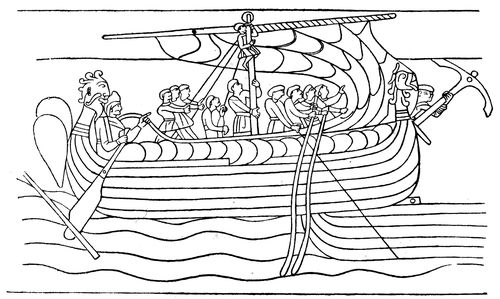
A Norman ship.
(From the Bayeux Tapestry.)
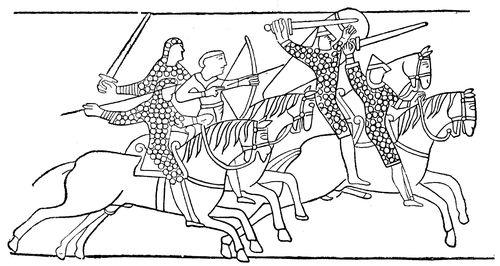
Norman soldiers mounted.
(From the Bayeux Tapestry.)
23. The Landing of William. 1066.—Harold had shown what an English king could do, who fought not for this or that part of the country, but for all England. It was the lack of this national spirit in Englishmen which caused his ruin. As Harold was feasting at York in celebration of his victory, a messenger told him of the landing of the Norman host at Pevensey. He had saved Eadwine and Morkere from destruction, but Eadwine and Morkere gave him no help in return. He had to hurry back to defend Sussex without a single man from the north or the Midlands, except those whom he collected on his line of march. The House of Leofric bore no goodwill to the House of Godwine. England was a kingdom divided against itself.
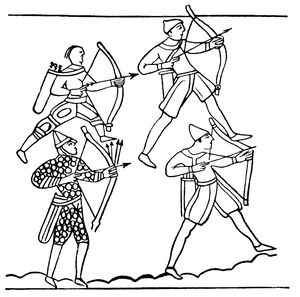
Group of archers on foot.
(From the Bayeux Tapestry.)
24. The Battle of Senlac. 1066.—Harold, as soon as he reached the point of danger, drew up his army on the long hill of Senlac on which Battle Abbey now stands. On October 14 William marched forth to attack him. The military equipment of the Normans was better than that of the English. Where the weapons on either side are unlike, battles are decided by the momentum—that is to say, by the combined weight and speed of the weapons employed. The English fought on foot mostly with two-handed axes; the Normans fought not only on horseback with lances, but also with infantry, some of them being archers. A horse, the principal weapon of a horseman, has more momentum than an armed footman, whilst an arrow can reach the object at which it is aimed long before a horse. Harold, however, had in his favour the slope of the hill up which the Normans would have to ride, and (p. 097) he took advantage of the lie of the ground by posting his men with their shields before them on the edge of the hill. The position was a strong one for purposes of defence, but it was not one that made it easy for Harold to change his arrangements as the fortunes of the day might need. William, on the other hand, had not only a better armed force, but a more flexible one. He had to attack, and, versed as he was in all the operations of war, he could move his men from place to place and make use of each opportunity as it arrived. The English were brave enough, but William was a more intelligent leader than Harold, and his men were better under control. Twice after the battle had begun the Norman horsemen charged up the hill only to be driven back. The wily William, finding that the hill was not to be stormed by a direct attack, met the difficulty by galling the English with a shower of arrows and ordering his left wing to turn and fly. The stratagem was successful. Some of the English rushed down the hill in pursuit. The fugitives faced round and charged the pursuers, following them up the slope. The English on the height were thus thrown into confusion; but they held out stoutly, and as the Norman horsemen now in occupation of one end of the hill charged fiercely along its crest, they locked their shields together and fought desperately for life, if no longer for victory. Slowly and steadily the Normans pressed on, till they reached the spot where Harold, surrounded by his house-carls, fought beneath his standard. There all their attacks were in vain, till William, calling for his bowmen, bade them shoot their arrows into the air. Down came the arrows in showers upon the heads of the English warriors, and (p. 098) one of them pierced Harold's eye, stretching him lifeless on the ground. In a series of representations in worsted work, known as the Bayeux Tapestry, which was wrought by the needle of some unknown woman and is now exhibited in the museum of that city, the scenes of the battle and the events preceding it are pictorially recorded.
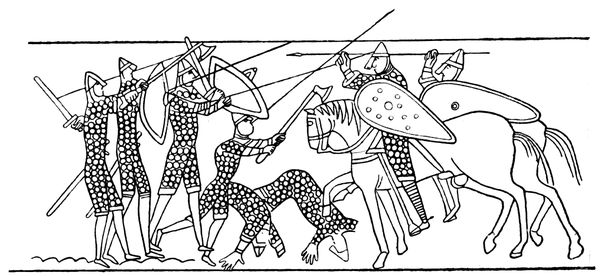
Men fighting with axes.
(From the Bayeux Tapestry.)
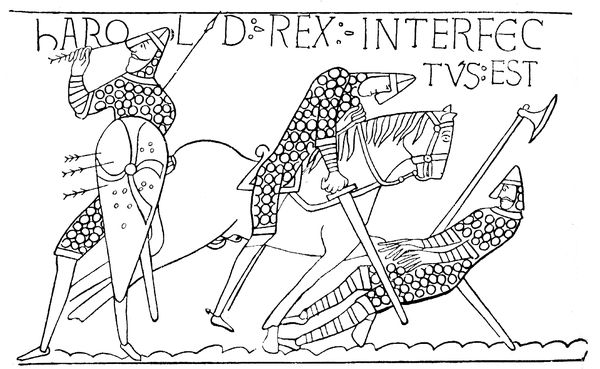
Death of Harold, who is attempting to pull the arrow
from his eye.
(From the Bayeux Tapestry.)
25. William's Coronation. 1066.—William had destroyed both the English king and the English army. It is possible that England, if united, might still have resisted. The great men at London chose for their king Eadgar the Ætheling, the grandson of Eadmund Ironside. Eadwine and Morkere were present at the election, but left London as soon as it was over. They would look after their own earldoms; they would not join others, as Harold had done, in defending England as a whole. Divided England would sooner or later be a prey to William. He wanted, however, not merely to reign as a conqueror, but to be lawfully elected as king, that he might have on his side law as well as force. He first struck terror into Kent and Sussex by ravaging the lands of all who held out against him. Then he marched to the Thames and burnt Southwark. He did not, however, try to force his way into London, as he wanted to induce the citizens to submit voluntarily to him, or at least in a way which might seem voluntary. He therefore marched westwards, crossed the Thames at Wallingford, and wheeled round to Berkhampstead. His presence there made (p. 100) the Londoners feel utterly isolated. Even if Eadwine and Morkere wished to do anything for them, they could not come from the north or north-west without meeting William's victorious army. The great men and citizens alike gave up all thought of resistance, abandoned Eadgar, and promised to take William for their king. On Christmas Day, 1066, William was chosen with acclamation in Eadward's abbey at Westminster, where Harold had been chosen less than a year before. The Normans outside mistook the shouts of applause for a tumult against their Duke, and set fire to the houses around. The English rushed out to save their property, and William, frightened for the only time in his life, was left alone with the priests. Not knowing what was next to follow, he was crowned king of the English by Ealdred, Archbishop of York, in an empty church, amidst the crackling of flames and the shouts of men striving for the mastery.
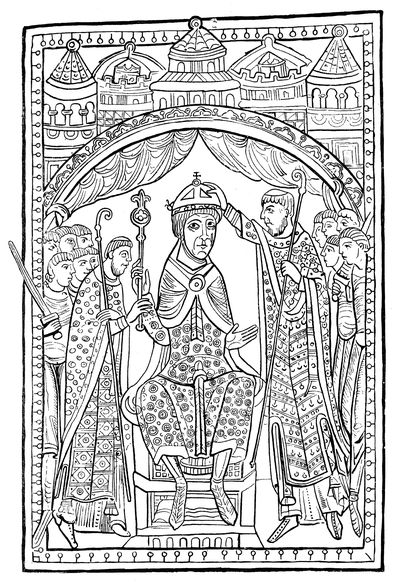
Coronation of a king, temp. William the Conqueror.
(From a drawing in the possession of the Society of Antiquaries.)
Books recommended for further study of Part I.
Dawkins, W. Boyd. Early Man in Britain.
Rhys, J. Early Britain.
Elton, C. J. Origins of English History.
Guest, E. Origines Celticæ. Vol. ii. pp. 121-408.
Freeman. History of the Norman Conquest. Vols. i.-iii.
Green, J. R. The Making of England.
—— The Conquest of England.
—— History of the English People. Vol. i. pp. 1-114.
Bright, W. Chapters of English Church History.
Stubbs, W. The Constitutional History of England. Chaps. I.-IX.
Cunningham, W. The Growth of English Industry and Commerce during the Early and Middle Ages. pp. 1-128.
Hodgkin, T. The Political History of England. Vol i. From the Earliest Times to 1066.[Back to Contents]
LEADING DATES
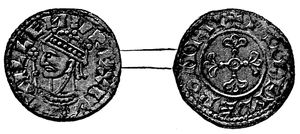
A silver penny of William the Conqueror, struck at Romney.
1. The First Months of the Conquest. 1066—1067.—Though at the time when William was crowned he had gained actual possession of no more than the south-eastern part of England, he claimed a right to rule the whole as lawful king of the English, not merely by Eadward's bequest, but by election and coronation. In reality, he came as a conqueror, whilst the Normans by whose aid he gained the victory at Senlac left their homes not merely to turn their Duke into a king, but also to acquire lands and wealth for themselves. William could not act justly and kindly to his new subjects even if he wished. What he did was to clothe real violence with the appearance of law. He gave out that as he had been the lawful king of the English ever since Eadward's death, Harold and all who fought under him at Senlac had forfeited their lands by their treason to himself as their lawful king. These lands he distributed amongst his Normans. The English indeed were not entirely (p. 102) dispossessed. Sometimes the son of a warrior who had been slain was allowed to retain a small portion of his father's land. Sometimes the daughter or the widow of one of Harold's comrades was compelled to marry a Norman whom William wished to favour. Yet, for all that, a vast number of estates in the southern and eastern counties passed from English into Norman hands. The bulk of the population, the serfs—or, as they were now called by a Norman name, the villeins—were not affected by the change, except so far as they found a foreign lord less willing than a native one to hearken to their complaints. The changes which took place were limited as yet to a small part of England. In three months after his coronation William was still without authority beyond an irregular line running from the Wash to the western border of Hampshire, except that he held some outlying posts in Herefordshire. It is true that Eadwine and Morkere had acknowledged him as king, but they were still practically independent. Even where William actually ruled he allowed all Englishmen who had not fought on Harold's side to keep their lands, though he made them redeem them by the payment of a fine, on the principle that all lands in the country, except those of the Church, were the king's lands, and that it was right to fine those who had not come to Senlac to help him as their proper lord.
2. The Conquest of the West and North. 1067—1069.—In March 1067 William returned to Normandy. In his absence the Normans left behind in England oppressed the English, and were supported in their oppression by the two regents appointed to govern in William's name, his half-brother, Odo, Bishop of Bayeux, whom he had made Earl of Kent, and William Fitz-Osbern, Earl of Hereford. In some parts the English rose in rebellion. In December William returned, and after putting down resistance in the south-eastern counties, set himself to conquer the rest of England. It took him more than two years to complete his task. Perhaps he would have failed even then if the whole of the unconquered part of the country had risen against him at the same time. Each district, however, resisted separately, and he was strong enough to beat them down one by one. In the spring of 1068 he besieged and took Exeter, and subdued the West to the Land's End. When this had been accomplished he turned northwards against Eadwine and Morkere, who had declared against him. William soon frightened them into submission, and seized on York and all the country to the south of York on the eastern side of England. In 1069 the English of the North rose once more and summoned to (p. 103) their aid Svend, king of Denmark, a nephew of the great Cnut. Svend sent a Danish fleet, and the Danes were joined by Eadgar the Ætheling and by other English chiefs. They burnt and plundered York, but could do no more. Their great host melted away. The Danes went off with their booty to their ships, and the English returned to their homes. William found no army to oppose him, and he not only regained the lands which he had occupied the year before, but added to them the whole country up to the Tweed.
3. The Completion of the Conquest. 1070.—William was never cruel without an object, but there was no cruelty which he would not commit if it would serve his purpose. He resolved to make all further resistance impossible. The Vale of York, a long and wide stretch of fertile ground running northwards from the city to the Tees, was laid waste by William's orders. The men who had joined in the revolt were slain. The stored-up crops, the ploughs, the carts, the oxen and sheep were destroyed by fire. Men, women, and children dropped dead of starvation, and their corpses lay unburied in the wasted fields. Some prolonged life by feeding on the flesh of horses, or even of men. Others sold themselves into slavery, bowing their heads, as was said, in the evil days for meat. "Waste! waste! waste!" was the account given long afterwards of field after field in what had once been one of the most fertile districts in England. William's work of conquest was almost over. Early in 1070 he crossed the hills amidst frost and snow, and descended upon Chester. Chester submitted, and with it the shires on the Welsh border. The whole of England was at last subdued.
4. Hereward's Revolt and the Homage of Malcolm. 1070—1072.—Only one serious attempt to revolt was afterwards made, but this was no more than a local rising. The Isle of Ely was in those days a real island in the midst of the waters of the fens. Hereward, with a band of followers, threw himself into the island, and it was only after a year's attack that he was driven out. When the revolt was at its height, Eadwine and Morkere fled from William's court to join the insurgents. Eadwine was murdered by his own attendants. Morkere reached Ely, and when resistance was at an end was banished to Normandy. No man ever deserved less pity than these two brothers. They had never sought any one's advantage but their own, and they had been faithless to every cause which they had pretended to adopt. Before Hereward was overpowered, Malcolm, king of the Scots, ravaged northern England, carrying off with him droves of English slaves. In 1072 William, (p. 104) who had by that time subdued Hereward, marched into Scotland as far as the Tay. Malcolm submitted to him at Abernethy, and acknowledged him to be his lord. Malcolm's acknowledgment was only a repetition of the acknowledgment made by his predecessors the Scottish kings, to Eadward and Cnut (see pp. 63, 84); but William was more powerful than Eadward or Cnut had been, and was likely to construe the obligation more strictly.
5. How William kept down the English.—William, having conquered England, had now to govern it. His first object was to keep the English in subjection.
(a) The Confiscation of Land.—In the first place he continued to treat all who had resisted him as rebels, confiscating their land and giving it to some Norman follower. In almost every district there was at least one Norman landowner, who was on the watch against any attempt of his English neighbours to revolt, and who knew that he would lose his land if William lost his crown.
(b) Building Castles.—In the second place William built a castle in every town of importance, which he garrisoned with his own men. The most notable example of these castles is the Tower of London.
(c) The Feudal Army.—In the third place, though the diffusion of Norman landowners and of William's castles made a general revolt of the English difficult, it did not make it impossible, and William took care to have an army always ready to put down a revolt if it occurred. No king in those days could have a constantly paid army, such as exists in all European countries at the present day, because there was not much money anywhere. Some men had land and some men had bodily strength, and they bartered one for the other. The villein gave his strength to plough and reap for his lord, in return for the land which he held from him. The fighting man gave his strength to his lord, to serve him with his horse and his spear, in return for the land which he held from him. This system, which is known as feudal, had been growing up in England before the Conquest, but it was perfected on the Continent, and William brought it with him in its perfected shape. The warrior who served on horseback was called a knight, and when a knight received land from a lord on military tenure—that is to say, on condition of military service—he was called the vassal of his lord. When he became a vassal he knelt, and, placing his hands between those of his lord, swore to be his man. This act was called doing homage. The land which he received as sufficient to maintain him was called a knight's fee. After this homage the vassal was (p. 105) bound to serve his lord in arms, this service being the rent payable for his land. If the vassal broke his oath and fought against his lord, he was regarded as a traitor, or a betrayer of his trust, and could be turned out of his land. The whole land of England being regarded as the king's, all land was held from the king. Sometimes the knights held their fees directly from the king and did homage to him. These knights were known as tenants in chief (in capite), however small their estates might be. Usually, however, the tenants in chief were large landowners, to whom the king had granted vast estates; and these when they did homage engaged not merely to fight for him in person, but to bring some hundreds of knights with them. To enable them to do this they had to give out portions of their land to sub-tenants, each engaging to bring himself and a specified number of knights. There might thus be a regular chain of sub-tenants, A engaging to serve under B, B under C, C under D, and so on till the tenant-in-chief was reached, who engaged to bring them all to serve the king. Almost all the larger tenants-in-chief were Normans, though Englishmen were still to be found amongst the sub-tenants, and even amongst the smaller tenants-in-chief. The whole body, however, was preponderantly Norman, and William could therefore depend upon it to serve him as an army in the field in case of an English rising.
6. How William kept down the Normans.—William was not afraid only of the English. He had cause to fear lest the feudal army, which was to keep down the English, might be strong enough to be turned against himself, and that the barons—as the greater tenants-in-chief were usually called—might set him at naught as Eadwine and Morkere had set Harold at naught, and as the Dukes of Normandy had set at naught the kings of France. To prevent this he adopted various contrivances.
(a) Abolition of the great Earldoms.—In the first place he abolished the great earldoms. In most counties there were to be no earls at all, and no one was to be earl of more than one county. There was never again to be an Earl of the West Saxons like Godwine, or an Earl of the Mercians like Leofric.
(b) The Estates of the Barons scattered.—- Not only did William diminish the official authority of the earls, he also weakened the territorial authority of the barons. Even when he granted to one man estates so numerous that if they had been close together they would have extended at least over a whole county, he took care to scatter them over England, allowing only a few to be held by a single owner in any one county. If, therefore, a great baron took (p. 106) it into his head to levy war against the king, he would have to collect his vassals from the most distant counties, and his intentions would thus be known before they could be put in practice.
(c) The Fyrd kept in readiness.—Still more important was William's resolution to be the real head of the English nation. He had weakened it enough to fear it no longer, but he kept it strong enough to use it, if need came, against the Norman barons. He won Englishmen to his side by the knowledge that he was ready to do them justice whenever they were wronged, and he could therefore venture to summon the fyrd whenever he needed support, without having cause to fear that it would turn against him.
7. Ecclesiastical Organisation.—Before the Conquest the English Church had been altogether national. Its bishops had sat side by side with the ealdormen or earls in the shire-moots, and in the Witenagemot itself. They had been named, like the ealdormen or earls, by the king with the consent of the Witenagemot. Ecclesiastical questions had been decided and ecclesiastical offences punished not by any special ecclesiastical court, but by the shire-moot or Witenagemot, in which the laity and the clergy were both to be found. William resolved to change all this. The bishops and abbots whom he found were Englishmen, and he replaced most of them by Normans. The new Norman bishops and abbots were dependent on the king. They looked on the English as barbarians, and would certainly not support them in any revolt, as their English predecessors might have done. Thurstan, indeed, the Norman Abbot of Glastonbury, was so angry with his English monks because they refused to change their style of music that he called in Norman archers to shoot them down on the steps of the altar. Such brutality, however, was exceptional, and, as a rule, even Norman bishops and abbots were well disposed towards their English neighbours, all the more because they were not very friendly with the Norman nobles, who often attempted to encroach on the lands of the Church. Many a king in William's position would have been content to fill the sees with creatures of his own, who would have done what they were bidden and have thought of no one's interest but his. William knew, as he had already shown in Normandy, that he would be far better served if the clergy were not only dependent on himself but deserving the respect of others. He made his old friend Lanfranc (see p. 88) Archbishop of Canterbury. Lanfranc had, like William, the mind of a ruler, and under him bishops and abbots were appointed who enforced discipline. The monks were compelled to keep the rules of their (p. 107) order, the canons of cathedrals were forced to send away their wives, and though the married clergy in the country were allowed to keep theirs, orders were given that in future no priest should marry. Everywhere the Church gave signs of new vigour. The monasteries became again the seats of study and learning. The sees of bishops were transferred from villages to populous towns, as when the Bishop of Dorchester, in Oxfordshire, migrated to Lincoln, and the Bishop of Thetford to Norwich. New churches were built and old ones restored after the new Continental style, which is known in England as Norman, and which Eadward had introduced in his abbey of Westminster. The Church, though made dependent on William, was independent, so far as its spiritual rights were concerned, of the civil courts. Ecclesiastical matters were discussed, not in the Witenagemot, but in a Church synod, and, in course of time, punishments were inflicted by Church courts on ecclesiastical offenders. The power of William was strengthened by the change. That power rested on three supports—the Norman conquerors, the English nation, and the Church, and each one of these three had reason to distrust the other two.
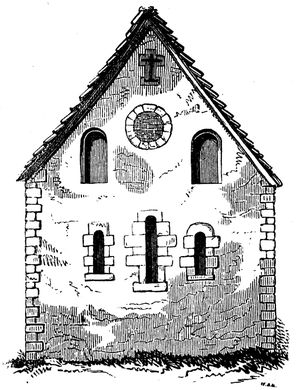
East end of Darenth Church, Kent. Built about 1080.
8. Pope Gregory VII.—The strength which William had acquired showed itself in his bearing towards the Pope. In 1073 Archdeacon Hildebrand, who for some years had been more powerful at Rome than the Popes themselves, himself became Pope under the name of Gregory VII. Gregory was as stern a ruler of the Church as William was of the State. He was an uncompromising champion of the Cluniac reforms (see p. 67). His object was to moderate the cruelty and sinfulness of the feudal warriors of Europe by making the Church a light to guide the world to piety and self-denial. As matters stood on the Continent, it had been impossible for the Church to attain to so high a standard. The clergy bought their places and fought and killed like the (p. 108) laymen around them. The Cluniac monks, therefore, thought it best to separate the clergy entirely from the world. In the first place they were to be celibate, that they might not be entangled in the cares of life. In the second place they were to refrain from simony, or the purchase of ecclesiastical preferment, that they might not be dependent on the great men of the world. A third demand was added later, that bishops and abbots should not receive from laymen the ring and staff which were the signs of their authority—the ring as the symbol of marriage to their churches; the staff or crozier, in the shape of a shepherd's crook, as the symbol of their pastoral authority. The Church, in fact, was to be governed by its own laws in perfect independence, that it might become more pure itself, and thus capable of setting a better example to the laity. As might have been expected, though the internal condition of the Church was greatly improved, yet when Gregory attempted entirely to free ecclesiastics from the influence and authority of the State, he found himself involved in endless quarrels. Clergy and laity alike resisted him, and they were supported by the Emperor Henry IV., whose rule extended over Germany and the greater part of Italy. Gregory next claimed the right of excommunicating kings and emperors, and of deposing them if they did not repent after excommunication. The State, he declared, was as the moon, receiving light from the Church, which shone like the sun in heaven. The whole of the remainder of Gregory's life was spent in a struggle with the Emperor, and the struggle was carried on by the successors of both.
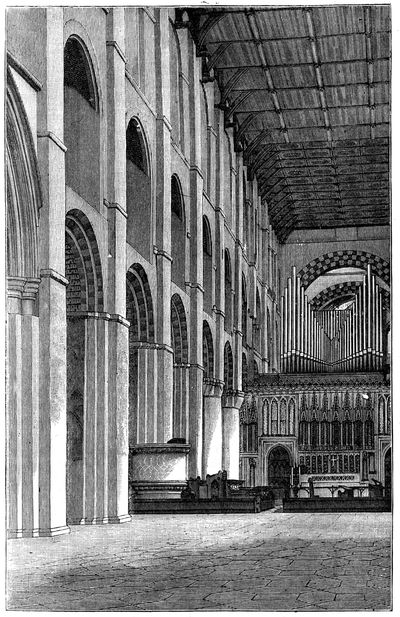
Part of the nave of St. Alban's Abbey Church.
Built by
Abbot Paul between 1077 and 1093.
9. William and Gregory VII.—It is remarkable that such a Pope as Gregory never came into conflict with William. William appointed bishops and abbots by giving them investiture, as the presenting of the ring and staff was called. He declared that no Pope should be obeyed in England who was not acknowledged by himself, that no papal bulls or letters should have any force till he had allowed them, and that the decrees of an ecclesiastical synod should bind no one till he had confirmed them. When, at a later time, Gregory required William to do homage to the see of Rome, William refused, on the ground that homage had never been rendered by his predecessors. To all this Gregory submitted. No doubt Gregory was prudent in not provoking William's anger; but that he should have refrained from even finding fault with William may perhaps be set down to the credit of his honesty. He claimed to make himself the master of kings because as a rule they did not care to advance the purity of the Church. William did care to (p. 110) advance it. He chose virtuous and learned bishops, and defended the clergy against aggression from without and corruption within. Gregory may well have been content to leave power over the Church in the hands of a king who ruled it in such a fashion.
10. The Rising of the Earls. 1075.—Of the three classes of men over which William ruled, the great Norman barons imagined themselves to be the strongest, and were most inclined to throw off his yoke. The chief feature of the reigns of William and of his successors for three generations was the struggle which scarcely ever ceased between the Norman barons on the one side, and the king supported by the English and the clergy on the other. It was to the advantage of the king that he had not to contend against the whole of the Normans. Normans with small estates clung for support, like their English neighbours, to the crown. The first of many risings of the barons took place in 1075. Roger, Earl of Hereford, in spite of William's prohibition, gave his sister in marriage to Ralph of Wader, Earl of Norfolk, who, though of English birth on his father's side, had fought for William at Senlac, and may practically be counted as a Norman. As the chronicler expressed it:
There was that bride-ale
To many men's bale.
The two earls plotted a rising against William and the revivals of the old independent earldoms. They took arms and were beaten. Ralph fled the country, and Roger was condemned to perpetual imprisonment. His followers were blinded or had their feet cut off. It was the Norman custom not to put criminals to death. To this rule, however, William made one exception. Waltheof, the last earl of purely English race, had been present at the fatal bride-ale, but though he had listened to the plottings of the conspirators, he had revealed all that he knew to William. His wife, Judith, a niece of the Conqueror, accused him of actual treason, and he was beheaded at Winchester. By the English he was regarded as a martyr, and it was probably his popularity amongst them which made William resolve upon his death.
11. The New Forest.—Only once did William cause misery amongst his subjects for the sake of his own enjoyment. Many kings before him had taken pleasure in hunting, but William was the first who claimed the right of hunting over large tracts of country exclusively for himself. He made, as the chronicler says, 'mickle deer-frith'—a tract, that is to say, in which the deer might (p. 111) have peace—'and laid laws therewith that he who slew hart or hind that man should blind him.... In sooth he loved the high deer as though he were their father.' He forbade, in short, all men, except those to whom he gave permission, to hunt within the limits of the royal forests. In the south-west of Hampshire, near his favourite abode at Winchester, he enlarged the New Forest. The soil is poor, and it can never have been covered by cultivated fields, but here and there, by the sides of streams, there were scattered hamlets, and these were destroyed and the dwellers in them driven off by William's orders, that there might be a 'mickle deer-frith.' We may be sure that there was not nearly as much misery caused by the making of the New Forest as was caused by the harrying of the Vale of York, but popular tradition rightly held in more abhorrence the lesser cruelty for the sake of pleasure than the greater cruelty for the sake of policy. It told how the New Forest was accursed for William's family. In his own lifetime a son and a grandson of his were cut off within it by unknown hands, probably falling before the vengeance of some who had lost home and substance through the creation of the Forest, and in due time another son, who succeeded him on the throne, was to meet with a similar fate.
12. Domesday Book. 1085—1086.—It was to William's credit that his government was a strong one. In William's days life and property and female honour were under the protection of a king who knew how to make himself obeyed. Strong government, however, is always expensive, and William and his officers were always ready with an excuse for getting money. "The king and the headmen loved much and overmuch covetousness on gold and on silver, and they recked not how sinfully it was gotten, if only it came to them.... They reared up unright tolls, and many other unright things they did that are hard to reckon." Other men, in short, must observe the law; William's government was a law to itself. It was, however, a law, and not a mere scramble for money. Though there were no Danish invaders now, William continued to levy the Danegeld, and he had rents and payments due to him in many quarters which had been due to his predecessors. In order to make his exactions more complete and more regular, he resolved to have set down the amount of taxable property in the realm that his full rights might be known, and in 1085, "He sent over all England into ilk shire his men, and let them find out how many hundred hides were in the shire, or what the king himself had of land or cattle in the land, or whilk rights he ought to have.... Eke he let write how mickle of land his archbishops had, and his bishops, (p. 112) and his abbots and his earls, and what or how mickle ilk man had that landholder was in England in land and in cattle, and how mickle fee it was worth. So very narrowly he let speer it out that there was not a single hide nor a yard of land, nor so much as—it is a shame to tell, though he thought it no shame to do—an ox nor a cow nor a swine was left that was not set in his writ." The chronicler who wrote these words was an English monk of Peterborough. Englishmen were shocked by the new regularity of taxation. They could hardly be expected to understand the advantages of a government strong enough through regular taxation to put down the resistance of rebellious earls at home and to defy invasion from abroad. The result of the inquiries of the king's commissioners was embodied in Domesday Book, so called because it was no more possible to appeal from it than from the Last Judgment.
13. William's Great Councils.—Though William was himself (p. 113) the true ruler of England, he kept up the practice of his predecessors in summoning the Witenagemot from time to time. In his days, however, the name of the Witenagemot was changed into that of the Great Council, and, to a slight extent, it changed its nature with its name. The members of the Witenagemot had attended because they were officially connected with the king, being ealdormen or bishops or thegns serving in some way under him. Members of the Great Council attended because they held land in chief from the king. The difference, however, was greater in appearance than in reality. No doubt men who held very small estates in chief might, if they pleased, come to the Great Council, and if they had done so the Great Council would have been much more numerously attended than the Witenagemot had been. The poorer tenants-in-chief, however, found that it was not only too troublesome and expensive to make the journey at a time when all long journeys had to be made on horseback, but that when they arrived their wishes were disregarded. They therefore stayed at home, so that the Great Council was regularly attended only by the bishops, the abbots of the larger abbeys, and certain great landowners who were known as barons. In this way the Great Council became a council of the wealthy landowners, as the Witenagemot had been, though the two assemblies were formed on different principles.
14. The Gemot at Salisbury. 1086.—In 1086, after Domesday Book had been finished, William summoned an unusually numerous assembly, known as the Great Gemot, to meet at Salisbury. At this not only the tenants-in-chief appeared, but also all those who held lands from them as sub-tenants. "There came to him," wrote the chronicler, "... all the landowning men there were over all England, whose soever men they were, and all bowed down before him and became his men, and swore oaths of fealty to him, that they would be faithful to him against all other men." It was this oath which marked the difference between English and Continental feudalism, though they were now in other respects alike. On the Continent each tenant swore to be faithful to his lord, but only the lords who held directly from the crown swore to be faithful to the king. The consequence was that when a lord rebelled against the king, his tenants followed their lord and not the king. In England the tenants swore to forsake their lord and to serve the king against him if he forsook his duty to the king. Nor was this all. Many men break their oaths. William, however, was strong enough in England to punish those who broke their (p. 114) oaths to him, whilst the king of France was seldom strong enough to punish those who broke their oaths to him.
15. William's Death. 1087.—The oath taken at Salisbury was the completion of William's work in England. To contemporaries he appeared as a foreign conqueror, and often as a harsh and despotic ruler. Later generations could recognise that his supreme merit was that he made England one. He did not die in England. In 1087 he fought with his lord, the king of France, Philip I. In anger at a jest of Philip's he set fire to Mantes. As he rode amidst the burning houses his horse shied and threw him forward on the pommel of his saddle. He was now corpulent and the injury proved fatal. On September 9 he died. When the body was carried to Caen for burial in the abbey of St. Stephen, which William himself had reared, a knight stepped forward and claimed as his own the ground in which the grave had been dug. It had been taken, he said, by William from his father. "In the name of God," he cried, "I forbid that the body of the robber be covered with my mould, or that he be buried within the bounds of my inheritance." The bystanders acknowledged the truth of his accusation, and paid the price demanded.[Back to Contents]
LEADING DATES
1. The Accession of the Red King. 1087.—In Normandy the Conqueror was succeeded by his eldest son, Robert. Robert was sluggish and incapable, and his father had expressed a wish that England, newly conquered and hard to control, should be ruled by his more energetic second son, William. To the third son, Henry, he gave a sum of money. There was as yet no settled rule of succession to the English crown, and William at once crossed the sea and was crowned king of the English at Westminster, by Lanfranc. (p. 115) William Rufus, or the Red King, as men called him, feared not God nor regarded man. Yet the English rallied round him, because they knew that he was strong-willed, and because they needed a king who would keep the Norman barons from oppressing them. For that very reason the more turbulent of the Norman barons declared for Robert, who would be too lazy to keep them in order. In the spring of 1088 they broke into rebellion in his name. William called the English people to his help. He would not, he said, wring money from his subjects or exercise cruelty in defence of his hunting grounds. On this the English rallied round him. At the head of a great army he marched to attack the rebels, and finally laid siege to Rochester, which was held against him by his uncle Odo, Bishop of Bayeux, whom he had released from the imprisonment in which the Conqueror had kept him. William called upon yet greater numbers of the English to come to his help. Every one, he declared, who failed him now should be known for ever by the shameful name of Nithing, or worthless. The English came in crowds. When at last Odo surrendered, the English pleaded that no mercy should be shown him. "Halters, bring halters!" they cried; "hang up the traitor bishop and his accomplices on the gibbet." William, however, spared him, but banished him for ever from England.
2. The Wickedness of the Red King.—William had crushed the Norman rebels with English aid. When the victory was won he turned against those who had helped him. It was not that he oppressed the English because they were English, but that he oppressed English and Normans alike, though the English, being the weaker, felt his cruelty most. He broke all his promises. He gathered round him mercenary soldiers from all lands to enforce his will. He hanged murderers and robbers, but he himself was the worst of robbers. When he moved about the country with the ruffians who attended him, the inhabitants fled to the woods, leaving their houses to be pillaged. William allowed no law to be pleaded against his own will. His life, and the life of his courtiers, was passed in the foulest vice. He was as irreligious as he was vicious. It was in especial defiance of the Christian sentiment of the time that he encouraged the Jews, who had begun to come into England in his father's days, to come in greater numbers. They grew rich as money-lenders, and William protected them against their debtors, exacting a high price for his protection. Once, it is said, he invited the Jewish rabbis to argue in his presence with the bishops on the merits of their respective creeds, and promised to become (p. 116) a Jew if the rabbis had the better of the argument. His own mouth was filled with outrageous blasphemies. "God," he said, "shall never see me a good man. I have suffered too much at His hands."
3. Ranulf Flambard.—The chief minister of the Red King was Ranulf Flambard, whom he ultimately made Bishop of Durham. He was one of the clerks of the king's chapel. The word 'clerk' properly signified a member of the clergy. The only way in which men could work with their brains instead of with their hands was by becoming clerks, the majority of whom, however, only entered the lower orders, without any intention of becoming priests or even deacons. Few, except clerks, could read or write, and whatever work demanded intelligence naturally fell into their hands. They acted as physicians or lawyers, kept accounts, and wrote letters. The clerks of the king's chapel were the king's secretaries and men of business. These ready writers had taken a leading part in the compilation of Domesday Book, and they were always active in bringing in money. Under the Conqueror they were expected to observe at least something of the rules of justice. Under the Red King they were expected to disregard them entirely. Of all the clerks Ranulf Flambard was the most unscrupulous; therefore he rose into the greatest favour. The first William had appointed high officers, known as Justiciars, to act in his name from time to time when he was absent from England, or was from any cause unable to be present when important business was transacted. Flambard was appointed Justiciar by the second William, and in his hands the office became permanent. The Justiciar was now the king's chief minister, acting in his name whether he was present or absent. Flambard used his power to gather wealth for the king on every side. "He drave the king's gemots," we are told, "over all England;" that is to say, he forced the reluctant courts to exact the money which he claimed for the king.
4. Feudal Dues.—It was Flambard who systematised, if he did not invent, the doctrine that the king was to profit by his position as supreme landlord. In practice this meant that he exacted to the full the consequences of feudal tenure. If a man died who held land by knight service from the crown, leaving a son who was a minor, the boy became the ward of the king, who took the profits of his lands till he was twenty-one, and forced him to pay a relief or fine for taking them into his own hands when he attained his majority. If the land (p. 117) fell to an heiress the king claimed the right of marrying her to whom he would, or of requiring of her a sum of money for permission to take a husband at her own choice, or, as was usually the case, at the choice of her relations. Under special circumstances the king exacted aids from his tenants-in-chief. If he were taken prisoner they had to pay to ransom him from captivity. When he knighted his eldest son or married his eldest daughter they had to contribute to the expense. It is true that this was in accordance with the principle of feudality. Neither a boy nor a woman could render service in the field, and it was therefore only fair that the king should hold the lands at times when no service was rendered to him for them; and it was also fair that the dependents should come to their lord's help in times of special need, especially as all that the king took from them they in turn took from their own sub-tenants. Flambard, however, did not content himself with a moderately harsh exaction of these feudal dues. The grievance against him was that he made the king 'to be every man's heir, whether he were in orders or a layman,' that is to say, that Flambard so stripped and exhausted the land belonging to the king's wards as to make it almost worthless, and then demanded reliefs so enormous that when the estate had at last been restored, all its value had passed into the hands of the king. When a bishop or an abbot died, the king appointed no successor, and appropriated the revenues of the vacant see or monastery till some one chose to buy the office from him. The king alone grew rich, whilst his vassals were impoverished.
5. Archbishop Anselm.—In 1089 Lanfranc died, and the archbishopric of Canterbury was then left vacant for nearly four years. The Archbishop of Canterbury was more than the first of English bishops. He was not only the maintainer of ecclesiastical discipline, but also the mouthpiece of the English people when they had complaints to make to the king. Men turned their thoughts to Anselm, the Abbot of Bec. Anselm was a stranger from Aosta, on the Italian side of the Alps. He was the most learned man of the age, and had striven to justify the theology of the day by rational arguments. He was as righteous as he was learned, and as gentle as he was righteous. Tender to man and woman, he had what was in those days a rare tenderness to animals, and had caused astonishment by saving a hunted hare from its pursuers. In 1092 the king's vassals assembled in the Great Council urged William to choose a successor to Lanfranc, and asked him to allow prayers to be offered in the churches that God might move his heart to select a worthy (p. 118) chief pastor. "Pray as you will," said the king, scornfully. "I shall do as I think good; no man's prayers will do anything to shake my will!" In the spring of 1093 William fell sick. Believing himself to be a dying man, he promised to amend his life, and named Anselm archbishop. On his refusal to accept the nomination, Anselm was dragged to the king's bedside, and the pastoral staff, the symbol of the pastoral office of a bishop, was forced into his hands by the bystanders.
6. The Council of Rockingham. 1095.—To this well-meant violence Anselm submitted unwillingly. He was, he said, a weak old sheep to be yoked with an untamed bull to draw the plough of the English Church. Yet, gentle as he was, he was possessed of indomitable courage in resistance to evil. William recovered, and returned to his blasphemy and his tyranny. In vain Anselm warned him against his sins. A fresh object of dispute soon arose between the king and the new archbishop. Two Popes claimed the obedience of Christendom. Urban II. was the Pope acknowledged by the greater part of the Church. Clement III. was the Pope supported by the Emperor. Anselm declared that Urban was the true Pope, and that he would obey none other. William asserted that his father had laid down a rule that no Pope should be acknowledged in England without the king's assent, and he proposed to act upon it by acknowledging neither Clement nor Urban. His object was, perhaps, to prevent the enforcement of ecclesiastical discipline by temporarily getting rid of the papal authority. Anselm wanted the authority of the Pope to check vice and disorder. The question was set aside for a time, but in 1095 Anselm, tired of witnessing William's wicked actions, asked leave to go to Rome to fetch from Urban the pallium, a kind of scarf given by the Pope to archbishops in recognition of their office. William replied that he did not acknowledge Urban as Pope. A Great Council was summoned to Rockingham to discuss the question. The lay barons, who liked to see the king resisted, were on Anselm's side. The bishops, many of whom were creatures of William, appointed from amongst his clerks, took the side of the king. Anselm stated his case firmly and moderately, and then, caring nothing for the angry king, retired into the chapel and went quietly to sleep. The king, finding that the barons would give him no support, was unable to punish Anselm. Two years later, in 1097, Anselm betook himself to Rome, and William at once seized on his estates.
7. William II. and his Brothers.—Normandy under Robert was even worse off than England under William. William was (p. 119) himself a tyrant, but in Normandy there were at least a hundred tyrants because Robert was too easy-tempered to bring any one to justice. The land was full of violence. Each baron made war on his neighbour, and, as usual, the peasant suffered most. Robert's own life was vicious and wasteful, and he was soon in debt. He sold the Cotentin and the territory of Avranches to his youngest brother, Henry. Henry was cool-headed and prudent, and he kept order in his new possession better than either of his elder brothers would have done. The brothers coveted the well-ordered land, and in 1091, two years before Anselm became archbishop, they marched together against Henry. Henry was besieged on St. Michael's Mount, a rocky island surrounded by the sea at high water. After a time water ran short. The easy-tempered Robert sent in a supply. "Shall we let our brother die of thirst?" he said to William. Henry was in the end forced to surrender, and the land which he had purchased was lost to him for a time. In 1095 Henry was again in Normandy. Robert of Bellême, the lord of Domfront, was the most cruel of the cruel barons. Once he had torn out with his own hands the eyes of his godson, merely because the child's father had displeased him. The people of Domfront called on Henry to deliver them from such a monster. Henry seized Domfront, ruled its people with justice, and soon recovered the possessions from which his brothers had driven him.
8. William and Scotland. 1093—1094.—William's attention was at this time drawn to the North. Early in his reign he annexed Cumberland, and had secured it against the Scots by fortifying Carlisle, which had been desolate since the Danish invasion in the reign of Ælfred. Malcolm, king of the Scots, was a rude warrior who had been tamed into an outward show of piety by his saintly wife, Margaret, the sister of Eadgar the Ætheling. Though he could not read her books of devotion, he liked to look at the pictures in them and to kiss the relics which she honoured. Margaret gathered Englishmen round her, and spread abroad something of southern piety and civilisation amongst the fierce Celtic warriors of her husband. She could not teach them to change their natures. In 1093 Malcolm burst into Northumberland, plundering and burning, till an Englishman slew him at Alnwick. Queen Margaret died broken-hearted at the news, and was before long counted as a saint. For the moment the Scottish Celts were weary of the English queen and her English ways. They set up Malcolm's brother, Donald Bane, as their king, refusing to be (p. 120) governed by any of Margaret's sons. Donald at once 'drave out all the English that before were with King Malcolm.' In 1094 Duncan, Margaret's step-son, gained the crown from Donald with the aid of a troop of English and Norman followers. The Celts soon drove out his followers, and after a while they slew him and restored Donald.
9. Mowbray's Rebellion. 1095.—William had as yet too much to do at home to interfere further in Scotland. The Norman barons hated him, and in 1095 Robert of Mowbray, Earl of Northumberland—the name was now confined to the land between the Tweed and the Tyne—refused obedience. William at once marched against him, and took from him the new castle which he had built in 1080, and which has ever since been known as Newcastle-on-Tyne. Robert held out long in his stronger fortress of Bamborough, which was only taken at last by fraud. He was condemned to a lifelong imprisonment, and it is even said that the Pope, seeing his case hopeless, allowed his wife to marry again as though her husband had been dead. Mowbray's rebellion, like the conspiracy of the Earls against the Conqueror, shows how eagerly the Norman barons longed to shake off the yoke of the king, and how readily Englishmen and the less powerful Normans supported even a tyrannical king rather than allow the barons to have their way.
10. The First Crusade. 1095—1099.—These petty wars were interrupted by a call to arms from the Pope. For centuries Christians had made pilgrimages to Bethlehem and Jerusalem, the holy places where their Lord had been born and had been crucified. When the Arabs conquered the Holy Land, Mohammedans as they were, they gave protection to the pilgrims from the West. The Turks, who were also Mohammedans, had lately obtained the mastery over the Arabs, and had secured dominion over the Holy Land. They were fierce warriors, ignorant and cruel, who either put the pilgrims to death or subjected them to torture and ill-usage. In 1095 Pope Urban II. came to Clermont to appeal to the Christians of the West to set out on a Crusade—a war of the Cross—to deliver the Holy City from the infidel. After he had spoken the multitude burst out with the cry, "It is the will of God!" Men of every rank placed on their garments a cross, as the sign of their devotion to the service of Christ. In 1096 a huge multitude set forth under Peter the Hermit, who had been active in urging men to take part in the Crusade. They believed it to be unnecessary to take money or food, trusting that God would supply His warriors. (p. 121) All these perished on the way. A better-equipped body of knights and nobles set out later under Godfrey of Bouillon. They fought their way through Asia Minor and Syria to Jerusalem, and in 1099 the Holy City was taken by storm. Godfrey, though he became its first Christian king, refused to be crowned. "I will not," he said, "wear a crown of gold where my Saviour wore a crown of thorns." The piety of the Christian warriors was not accompanied by mercy to the vanquished. Holding Mohammedans to be the special enemies of God, they treated them as no better than savage beasts. There was a terrible butchery when Jerusalem was taken, and Christian men fancied that they did God service by dashing out the brains of Mohammedan babes against the walls.
11. Normandy in Pledge. 1096.—Robert was amongst the Crusaders. To raise money for his expedition he pledged Normandy to his brother William. William had no wish to take part in a holy war, but he was ready to make profit out of those who did. Normandy was the better for the change. It is true that William oppressed it himself, but he saved the people from the worse oppression of the barons.
12. The Last Years of the Red King.—The remaining years of William's reign were years of varying success. An English force set up Eadgar, the son of Malcolm and Margaret, as king of the Scots, and Eadgar consented to hold his crown as William's vassal. William's attempts to reduce the Welsh to submission ended in failure, and he was obliged to content himself with hemming them in with castles. In 1098 the wicked Robert of Bellême succeeded his brother as earl of Shrewsbury. Robert robbed and tortured Englishmen as he had robbed and tortured Normans. He was a great builder of castles, and at Bridgenorth he raised a fortress as the centre of a group of strong places which could defy the Welsh and form the basis of his operations against them. In the same year William captured Le Mans, the capital of Maine, which had recovered its independence from Robert, which was held against him by Helie de la Flêche, one of the few unselfish men of the day. Unlike his father, the Red King often began enterprises which he did not finish. In 1099 he had all his work to do over again. He was hunting in the New Forest when he heard that Helie had regained Le Mans. He rode hard to Southampton, and, leaping on board a vessel, bade the sailors put to sea. A storm was raging, and the sailors prayed him to wait till the wind fell. "I never heard," he answered, "of a king being drowned." The next morning he was in Normandy. He (p. 122) recovered Le Mans, but returned to England without conquering Maine.
13. The Death of the Red King. 1100.—On August 2, 1100, the Red King went out to hunt in the New Forest. In the evening his body was found pierced by an arrow. Who his slayer was is unknown. The blow may have been accidental. It is more likely to have been intentional. In every part of England were men who had good cause to hate William, and nowhere were his enemies in greater numbers than round the New Forest. Whoever was his slayer, the body of the tyrant was borne to the cathedral of Winchester and buried as the corpse of a wild beast, without funeral rites or weeping eyes. When, after a few years had passed, the tower above the unhallowed tomb fell in, men said that it had fallen because so foul a body lay beneath it.[Back to Contents]
LEADING DATES
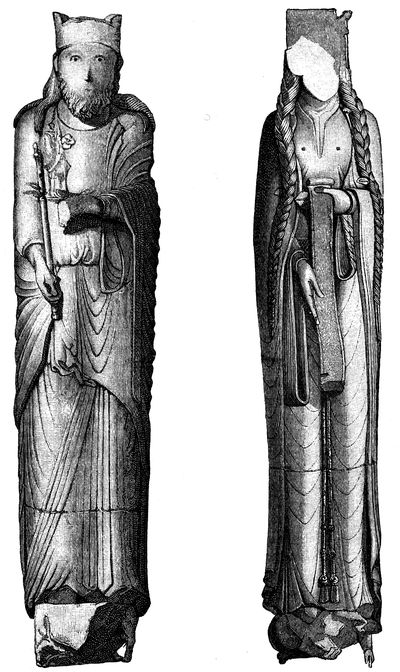
Henry I. and his queen Matilda.
(From the west front of
Rochester Cathedral.)
1. The Accession of Henry I. 1100.—When the news spread that the Red King had been slain in the New Forest, his younger brother, Henry, hastened to Winchester, where he was chosen king by the barons who happened to be there. At his coronation at Westminster he swore to undo all the evil of his brother's reign. The name by which he came to be known—the Lion of Justice—shows how well he kept his promise. He maintained order as his father had done, and his brother had not done. Flambard, the wicked minister of the Red King, was imprisoned in the Tower, and Anselm, the good archbishop, recalled to England. Henry's chief strength lay in the support of the English. To please them he married Eadgyth, the daughter of Malcolm and Margaret, the descendant through her mother of the old English kings. Through (p. 123) Eadgyth the blood of Alfred and Ecgberht was transmitted to the later kings. It was, however, necessary that she should take another (p. 124) name. Every one at Henry's court talked French, and 'Eadgyth' was unpronounceable in French. The new queen was therefore known as Matilda, or Maud. The English called her the good queen. The Normans mocked her husband and herself by giving them the English nicknames of Godric and Godgifu.
2. Invasion of Robert. 1101.—One danger at least Henry had to face. The Norman barons yearned after the weak rule of Robert, who was again in possession of Normandy. Once, we are told, he had to stay in bed till noon, because his favourites had carried off his clothes, and he had no others to put on. A duke who could not keep his own clothes was not likely to be able to rule his duchy, and Normandy was again the scene of fightings and plunderings which he made no effort to suppress. Flambard, having escaped from prison, fled to Normandy, and urged Robert to claim England as the heritage of the eldest son of the Conqueror. Robert listened to the tempter and sailed for England. When he landed at Porchester he found that the Church and the English had rallied to Henry. Robert's position was hopeless, and he made a treaty with his brother, abandoning all claim to the crown.
3. Revolt of Robert of Bellême. 1102.—Henry knew that the great barons wished well to Robert, and on one pretext or another he stripped most of them of power. Robert of Bellême, the strongest and wickedest of them all, rose in revolt. After capturing many of his castles, Henry laid siege to his great fortress at Bridgenorth. The barons who served under Henry urged him to spare a rebel who was one of their own class. The Englishmen and the inferior Norman knights thought otherwise. "Lord King Henry," they cried, "trust not those traitors. They do but strive to deceive you, and to take away from you the strength of kingly justice.... Behold, we all stand by you faithfully; we are ready to serve and help you in all things. Attack the castle vigorously; shut in the traitor on all sides, and make no peace with him till you have him alive or dead in your hands." Bridgenorth was taken, and Robert of Bellême, having been stripped of his English land, was sent off to Normandy. Henry was now, in very truth, king of the English. "Rejoice, King Henry," ran a popular song, "and give thanks to the Lord God, because thou art a free king since thou hast overthrown Robert of Bellême, and hast driven him from the borders of thy kingdom." Never again during Henry's reign did the great Norman lords dare to lift hand against him.
4. The Battle of Tinchebrai. 1106.—It was impossible for Henry to avoid interference in Normandy. Many of his vassals in (p. 125) England possessed lands in Normandy as well, where they were exposed to the violence of Robert of Bellême and of others who had been expelled from England. The Duke of the Normans would do nothing to keep the peace, and Henry crossed the sea to protect his own injured subjects. Duke Robert naturally resisted him, and at last, in 1106, a great battle was fought at Tinchebrai, in which Robert was utterly defeated. Duke Robert was kept for the remainder of his life a prisoner in Cardiff Castle, where he died after an imprisonment of twenty-eight years. Henry became Duke of the Normans as well as king of the English, and all Normandy was the better for the change. Robert of Bellême was thrown into prison, and the cruel oppressor thus shared the fate of the weak ruler whose remissness had made his oppressions possible.
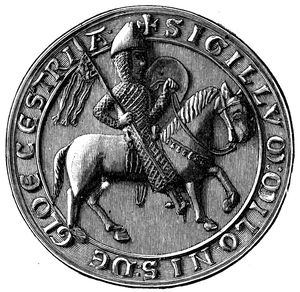
Seal of Milo of Gloucester, showing mounted armed figure in the reign of Henry I.
5. Henry and Anselm. 1100—1107.—Though Anselm had done everything in his power to support Henry against Robert of Bellême, he was himself engaged in a dispute with the king which lasted for some years. A bishop in Anselm's time was not only a great Church officer, whose duty it was to maintain a high standard of religion and morality amongst the clergy. He was also one of the king's barons, because he was possessed of large estates, and was therefore bound like any other baron to send knights to the king when they were needed. Consequently, when Anselm became archbishop he had not only received investiture from William II. by accepting from him the ring and the staff which were the signs of ecclesiastical authority, but also did homage, thus acknowledging himself to be the king's man, and obliging himself, not indeed to fight for him in person, but to send knights to fight under his orders. When, however, Henry came to the throne, and asked Anselm to repeat the homage which he had done to William, (p. 126) Anselm not only refused himself to comply with the king's request, but also refused to consecrate newly-chosen bishops who had received investiture from Henry. During the time of his exile Anselm had taken part in a council of the Church, in which bishops and abbots had been forbidden by the Pope and the council either to receive investiture from laymen or to do homage to them. These decrees had not been issued merely to serve the purpose of papal ambition. At that time all zealous ecclesiastics thought that the only way to stop the violence of kings in their dealings with the Church was to make the Church entirely independent. Anselm's experience of the Red King's wickedness must have made him ready to concur with this new view, and there can be no doubt that it was from the most conscientious motives that he refused to do homage to Henry. On the other hand, Henry, wishing to rule justly, thought it very hard that the archbishop should insist upon the independence of the bishops, especially as in consequence of their large estates they had so many knights to send into the field. Though the dispute was a hot one, it was carried on without any of the violence which had characterised the dispute between Anselm and the Red King, and it ended in a compromise. Henry abandoned all claim to give the ring and the pastoral staff which were the signs of a bishop's or an abbot's spiritual jurisdiction, whilst Anselm consented to allow the new bishop or abbot to render the homage which was the sign of his readiness to employ all his temporal wealth and power on the king's behalf. The bishop was to be chosen by the chapter of his cathedral, the abbot by the monks of his abbey, but the election was to take place in the king's presence, thus giving him influence over their choice. Whether this settlement would work in favour of the king or the clergy depended on the character of the kings and the clergy. If the kings were as riotous as the Red King and the clergy as self-denying as Anselm, the clergy would grow strong in spite of these arrangements. If the kings were as just and wise as Henry, and the clergy as wicked as Ralph Flambard, all advantage would be on the side of the king.
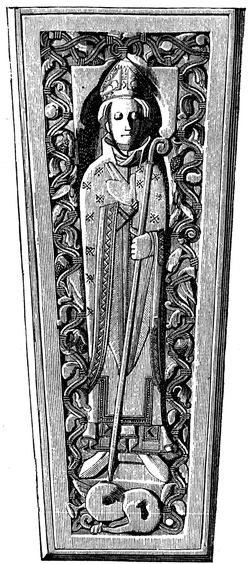
Monument of Roger, Bishop of Salisbury (died 1139), in his cathedral church.
6. Roger of Salisbury.—After the defeat of the Norman barons the Great Council ceased for a time to have any important influence on the government. Henry was practically an absolute king, and it was well that he should be so, as the country wanted order more than discussion. Henry, however, loved to exercise absolute power in an orderly way, and he chose for his chief minister Roger, whom he made Bishop of Salisbury. Roger had first attracted his notice when he was going out hunting, by saying mass in a shorter time (p. 127) than any other priest, but he retained his favour by the order and system which he introduced into the government. A special body of officials and councillors was selected by the king—perhaps a similar body had been selected by his predecessor—to sit in judgment over cases in which tenants-in-chief were concerned, as well as over other cases which were, for one reason or another, transferred to it from the Baronial Courts. This council or committee was called the Curia Regis (the King's Court). The members of this Curia Regis met also in the Exchequer, so called from the chequered cloth which covered the table at which they sat. They were then known as Barons of the Exchequer, and controlled the receipts and outgoings of the treasury. The Justiciar presided in both the Curia Regis and the Exchequer. Amongst those who took part in these proceedings was the Chancellor, who was then a secretary and not a judge, as well as other superior officers of the king. A regular system of finance was introduced, and a regular system of justice accompanied it. At last the king determined to send some of the judges of his court to go on circuit into distant parts of the kingdom. These itinerant Justices (Justitiarii errantes) brought the royal power into connection with the local courts. Their business was of a very miscellaneous character. They not only heard the cases in which the king was concerned—the pleas of the crown, as they were called—but they made assessments for purposes of taxation, listened to complaints, and conveyed the king's wishes to his people.
7. Growth of Trade.—Though Henry's severe discipline was not liked, yet the law and order which he maintained told on the prosperity of the country, and the trade of London flourished so (p. 128) much as to attract citizens from Normandy to settle in it. Flemings too, trained in habits of industry, came in crowds, and with the view of providing a bulwark against the Welsh, Henry settled a colony of them in South Pembrokeshire, which has since been known as Little England beyond Wales. The foreigners were not popular, but the Jews, to whom Henry continued the protection which William had given them, were more unpopular still.
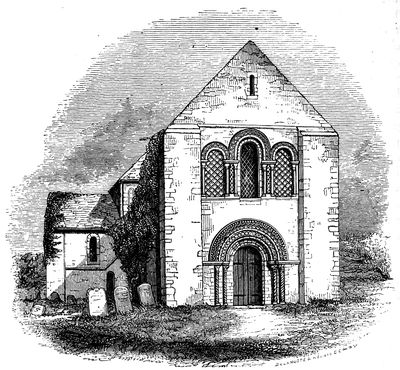
Porchester Church, Hampshire. Built about 1135.
8. The Benedictines.—In the midst of this busy life the Benedictine monasteries were still harbours of refuge for all who did not care to fight or trade. They were now indeed wealthier than they had once been, as gifts, usually of land, had been made to the monks by those who reverenced their piety. Sometimes these gifts took a shape which afterwards caused no little evil. Landowners who had churches on their lands often gave to a monastery the tithes which had hitherto been paid for the support of the parish priest, and the monastery stepped into the place of the parish priest, (p. 129) sending a vicar to act for it in the performance of its new duties. As the monks themselves grew richer they grew less ascetic. Their life, however, was not spent in idleness. They cared for the poor, kept a school for the children, and managed their own property. Some of their number studied and wrote, and our knowledge of the history of these times is mainly owing to monastic writers. When Henry I. came to the throne the Chronicle was still being written in the English tongue by the monks of Worcester, and for some years after his death was still carried on at Peterborough. The best historical compositions were, however, in Latin, the language understood by the clergy over all Western Europe. Amongst the authors of these Latin works, the foremost was William of Malmesbury.
9. The Cistercians.—Useful as the Benedictines were, there were some monks who complained that the extreme self-denial of their founder, St. Benedict, was no longer to be met with, and the complainants had lately originated a new order, called the Cistercian, from Cîteaux, in Burgundy, the site of their first abbey. The Cistercians made their appearance in England in 1128. Their buildings and churches were simpler than those of the Benedictines, and their life more austere. They refused to receive gifts of tithes lest they should impoverish the parish clergy. They loved to make their homes in solitary places far from the haunts of men, and some of the most beautiful of the abbeys which remain in ruins—those, for instance, of Fountains and Tintern—were Cistercian abbeys. They are beautiful, not because the Cistercians loved pleasant places, but because they loved solitude, whilst the Benedictines had either planted themselves in towns or had allowed towns to grow up round their monasteries.
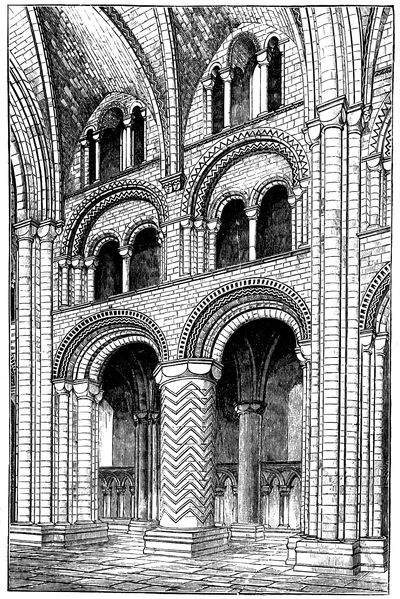
Part of the nave of Durham Cathedral.
Built about
1130.
10. The White Ship.—Henry, in consequence of the possession of Normandy, had been frequently involved in war with France. Robert's son, William Clito, claimed Normandy, and his claim was supported by Louis VI. the Fat, who was styled king of France, though the territory which he actually ruled was no larger than Normandy. In these wars Henry was usually successful, and at last, in 1127, William was killed, and Henry freed from danger. His own son, also named William, had already been drowned on the voyage between Normandy and England in 1120. The ship in which he sailed ran upon a rock, and the young man was placed in a boat, and might have escaped if he had not returned to save his half-sister, the Countess of Perche, who was still on board. As soon as he approached the sailors and passengers crowded into the boat and swamped it. Only one man, a butcher, was saved, by clinging (p. 130) to the mast of the ship when it sank. The captain, who was with him on the mast, threw himself off as soon as he learned that the king's son had been drowned, and perished in the water. It is said (p. 131) that no man dared to tell Henry that his son was drowned, and that at last a little child was sent to inform him of his misfortune.
11. The Last Years of Henry I.—Henry had many illegitimate children, but after William's death the only lawful child left to him was Matilda. She had been married as a child to the Emperor Henry V., but her husband had died before she was grown up, and she then returned to her father, as the Empress Matilda. There had never been a queen in England, and it would have been very hard for a woman to rule in those times of constant war and bloodshed. Yet Henry persuaded the barons to swear to accept her as their future sovereign. He then married her to Geoffrey, Count of Anjou, who came of a brave and active race, and whose lands, which lay to the south of Normandy, would enlarge the French possessions of Henry's descendants. In 1135 Henry died. The great merit of his English government was that he forsook his brother's evil ways of violence, and maintained peace by erecting a regular administrative system, which kept down the outrages of the barons. One of the English chroniclers in recording his death prayed that God might give him the peace that he loved.[9]
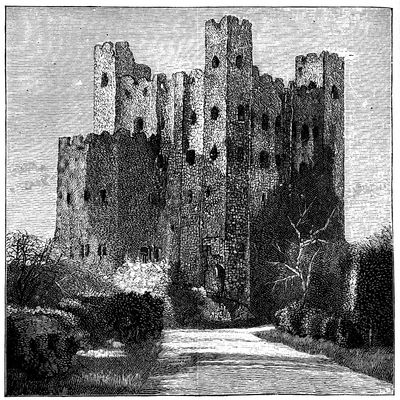
Keep of Rochester Castle. Built between 1126 and 1139.
12. Stephen's Accession. 1135.—Among the barons who had sworn to obey Matilda was Stephen of Blois, a son of the Conqueror's daughter Adela, and a nephew of Henry I. As soon as Henry's death was known Stephen made his way to London, where he was joyfully received as king. The London citizens felt that their chief interest lay in the maintenance of peace, and they thought that a man would be more likely than a woman to secure order. The barons chose Stephen king at Winchester, where his brother, Henry of Blois, was the bishop. Shortly afterwards some of these very barons rose against him, but their insurrection was soon repressed. More formidable was the hostility of David, (p. 132) king of the Scots. David was closely connected with the family of Henry I., his sister having been Henry's wife, the Empress Matilda being consequently his niece. He also held in right of his own wife the earldom of Huntingdon. Under the pretext of taking up Matilda's cause he broke into the north of England. Though he himself carried on the work of introducing English civilisation into Scotland, his Celtic followers were still savage, and massacred women and infants. In 1137 Stephen drove David back. In 1138 David reappeared, and this time the aged Thurstan, Archbishop of York, sent the levies of the North against him. In the midst of the English army was a cart bearing a standard, at the top of which the banners of the three great churches of St. Peter's of York, St. John of Beverley, and St. Wilfrid of Ripon, waved round (p. 133) the consecrated Host. The battle which ensued, near Northallerton, has consequently been known as the battle of the Standard. The Scots were completely defeated, but Stephen, in spite of the victory gained for him, found himself obliged to buy peace at a heavy price. He agreed that David's son, Henry, should hold Northumberland, with the exception of the fortresses of Bamborough and of Newcastle, as a fief of the English Crown. David himself was also allowed to keep Cumberland without doing homage.
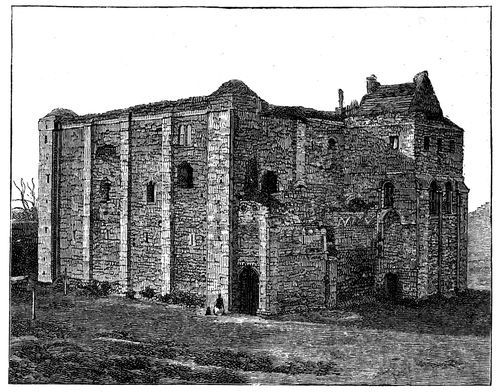
Keep of Castle Rising. Built about 1140-50.
13. Civil War.—It would have been well for Stephen if he had learnt from the men of the North that his strength lay in rallying the English people round him against the great barons, as the Red King and Henry I. had done when their right to the crown had been challenged by Robert. Instead of this, he brought over mercenaries from Flanders, and squandered treasure and lands upon his favourites so as to have little left for the hour of need. He made friends easily, but he made enemies no less easily. One of the most powerful of the barons was Robert, Earl of Gloucester, an illegitimate son of Henry I., who held the strong fortress of (p. 134) Bristol, and whose power extended over both sides of the lower course of the Severn. In 1138 Stephen, who distrusted him, ordered his castles to be seized. Robert at once declared his half-sister Matilda to be the lawful queen, and a terrible civil war began. Robert's garrison at Bristol was a terror to all the country round. He, too, gathered foreign mercenaries, who knew not what pity was. Other barons imitated Robert's example, fighting only for themselves whether they nominally took the part of Stephen or of Matilda, and the southern and midland counties of England were preyed upon by the garrisons of their castles.
14. Stephen's Quarrel with the Clergy. 1139.—Evil as were the men who fought on either side, it was to Stephen and not to Matilda and Robert that men as yet looked to restore order. The port towns, London, Yarmouth, and Lynn, clung to him to the last. Unfortunately Stephen did not know how to make good use of his advantages. The clergy, like the traders, had always been in favour of order. Some of them, with the Justiciar, Roger, Bishop of Salisbury, at their head, had organised the Exchequer of Henry I., had gathered in the payments due to the Crown, or had acted as judges. Yet with all their zeal in the service of the Crown, they had not omitted to provide for their own interests. Roger in particular had been insatiable in the pursuit of wealth for himself and of promotion for his family. One of his nephews, Nigel, Bishop of Ely, was Treasurer, whilst another, Alexander, was Bishop of Lincoln, and his own illegitimate son, Roger, was Chancellor. In 1139 Stephen, rightly or wrongly, threw him into prison with his son and Alexander of Lincoln. The other nephew, Nigel, escaped to his uncle's castle at Devizes, in which was the younger Roger's mother, Matilda of Ramsbury. Stephen brought her son before the castle, and put a rope round his neck to hang him unless the castle was surrendered. The unhappy mother could not bear the sight, and opened the gates to Stephen. It might have been wise to deprive a too ambitious bishop of his castle, but it was not wise personally to maltreat the clergy. Every priest in England turned against Stephen. His own brother, Henry, Bishop of Winchester, declared against him, and Stephen was obliged to do penance for his offence. The administration of the Exchequer was shattered, and though it was not altogether destroyed, and money was brought to it for the king's use even in the worst times, Stephen's financial resources were from henceforth sadly diminished.
15. Anarchy. 1139.—The war now lapsed into sheer anarchy. The barons on either side broke loose from all restraint. "They (p. 135) fought amongst themselves with deadly hatred; they spoiled the fairest lands with fire and rapine; in what had been the most fertile of counties they destroyed almost all the provision of bread." All goods and money they carried off, and if they suspected any man to have concealed treasure they tortured him to oblige him to confess where it was. "They hanged up men by the feet and smoked them with foul smoke; some were hanged up by their thumbs, others by their head, and coats of mail were hung on to their feet. They put knotted strings about men's heads, and twisted them till they went to the brain. They put men into prisons where adders and snakes and toads were crawling; and so they tormented them. Some they put into a chest, short and narrow and not deep, and that had sharp stones within; and forced men therein, so that they broke all their limbs. In many of the castles were hateful and grim things called neckties, which two or three men had enough to do to carry. This instrument of torture was thus made: it was fastened to a beam, and had a sharp iron to go about a man's neck and throat, so that he might no way sit or lie or sleep, but he bore all the iron. Many thousands they starved with hunger.... Men said openly that Christ and His saints were asleep."
16. The End of the War. 1141—1148.—In the autumn of 1139, Matilda appeared in England, and in 1141 there was a battle at Lincoln, in which Stephen was taken prisoner. Henry of Winchester (see p. 131) acknowledged Matilda as queen, and all England submitted to her, London giving way most reluctantly. Her rule did not last long. She was as much too harsh as Stephen was too good-natured. She seized the lands of the Church, and ordered the Londoners to pay a heavy fine for having supported Stephen. On this the Londoners rang their bells, and the citizens in arms swarmed out of their houses 'like bees out of a hive.' Matilda fled to Winchester before them. Bishop Henry then turned against her. Robert of Gloucester was taken prisoner, and after a while Matilda was obliged to set free King Stephen in exchange for her brother. Fighting continued for some time. On all sides men were longing for peace. The fields were untilled because no man could tell who would reap the harvest. Thousands perished of starvation. If peace there was to be, it could only come by Stephen's victory. It was now known that Matilda was even less fit to govern than Stephen. Stephen took one castle after another. In 1147 Earl Robert died, and in 1148 Matilda gave up the struggle and left England.
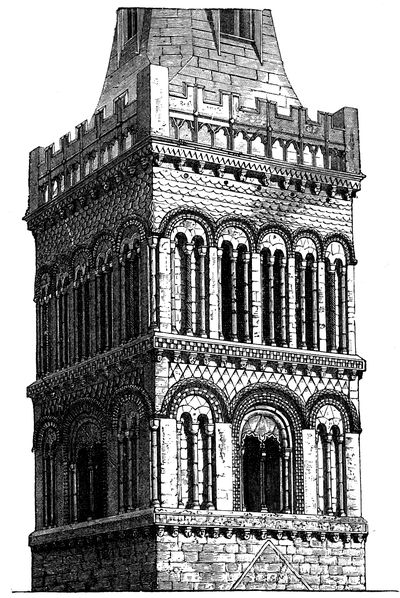
Tower of Castor Church, Northamptonshire.
Built about
1145. (The parapet and spire are later.)
(p. 136) 17. Henry, Duke of the Normans. 1149.—Whilst Matilda had been losing England her husband had been conquering Normandy, and for a little while it seemed possible that England and Normandy would be separated; England remaining under Stephen and his (p. 137) heirs, and Normandy united with Anjou under the Angevin Geoffrey and his descendants. That the separation did not yet take place was partly owing to the different character of the two heirs. Stephen's son, Eustace, was rough and overbearing. Geoffrey's son, Henry, was shrewd and prudent. Henry had already been in England when he was still quite young, and had learnt something of English affairs from his uncle, Robert of Gloucester. He returned to his father in 1147, and in 1149 Geoffrey gave up to him the duchy of Normandy. He was then sent to try his fortune in England in his mother's stead, but he was only a boy of sixteen, and too young to cope with Stephen. In 1150 he abandoned the struggle for a time. In his absence Stephen had still rebels to put down and castles to besiege, but he had the greater part of the kingdom at his back, and if Henry had continued to leave him alone he would probably have reduced all his enemies to submission.
18. The Last Days of Stephen. 1153—1154.—In 1150 Geoffrey died, and Henry became Count of Anjou as well as Duke of Normandy. Before long he acquired a much wider territory than either Anjou or Normandy. Louis VII. of France had to wife Eleanor, the Duchess of Aquitaine, and through her had added to his own scanty dominions the whole of the lands between the Loire and the Pyrenees. Louis, believing that she was unfaithful to him, had divorced her on the pretext that she was too near of kin. Henry was not squeamish about the character of so great an heiress, and in 1152 married the Duchess of Aquitaine for the sake of her lands. Thus strengthened, he again returned to England. He was now a young man of nineteen; his vigour was as great as that of Stephen, and his skill greater. He won fortress after fortress. Before the end of 1153 Eustace died, and Stephen had no motive for prolonging the strife if his personal interests could be saved. It was arranged by the treaty of Wallingford that Stephen should retain the crown for life, and that Henry should be his heir. The castles which had sprung up during the civil war without the licence of the king—the 'adulterine castles,' as they were called—and there were no less than 365[10] of them—were to be destroyed, and order and good government were to return. For five months Henry remained in England. The robber barons could not hold out against the two rivals now united. Many of the castles were demolished, and 'such good peace as never was here' was established. In 1154 Stephen died, and young Henry ruled England in his own name.[Back to Contents]
LEADING DATES
1. Henry's Accession. 1154.—Henry II. was but twenty-one when he returned, after Stephen's death, to govern England. He had before him the difficult task of establishing order where anarchy had prevailed, but it was a task for which he was specially suited. His frame was strong and thick-set, and he was as active as he was strong. His restlessness was the dismay of his courtiers. Eager to see everything for himself, and having to rule a territory extending from the Pyrenees to the Scottish border, he was always on the move. His followers were not allowed to know till he started in the morning where he intended to sleep at night, and he frequently changed his mind even after he had set out. He was as busy with his mind as he was with his body, as fond of a book as of a horse, and ready to chat with any one of whatever rank. Even when he was at mass he either drew pictures to amuse himself or conversed in whispers with his neighbours. His ceaseless energy was combined with a strong will, a clear perception of the limits beyond which action would be unwise, a good eye for ability in others, and a power of utilising their ability in his own service. On the Continent his sagacity appeared in his resolution to be content with the dominions which he had acquired without making further conquests. In England his main object was the same as that of his predecessors, to establish the king's authority over the great barons. What especially distinguished him was his clear perception of the truth that he could only succeed by securing, not merely the passive goodwill, but the active co-operation of those who, whether they were of Norman or of English descent, were inferior in wealth and position to the great barons.
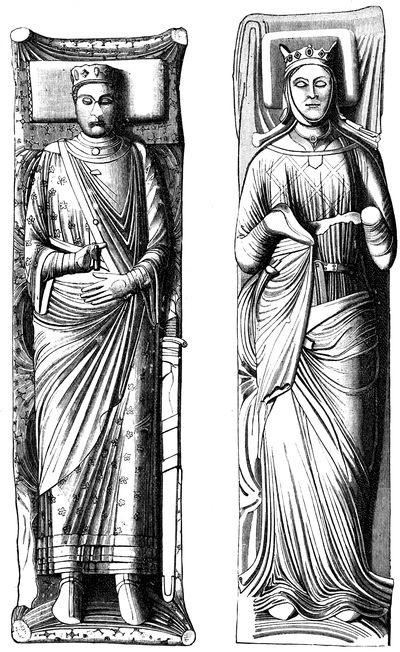
Effigies of Henry II. and Queen Eleanor at Fontevrault.
2. Pacification of England.—Henry's first year was spent in completing the work which he had begun after the treaty of Wallingford. He sent Stephen's mercenaries over the sea and (p. 140) completed the destruction of the 'adulterine castles.' One great rebel after another was forced to submit and have his strong walls pulled down. There were to be no more dens of robbers in England, but all men were to obey the king and the law. What castles remained were the king's, and as long as they were his rebellions would not be likely to be successful. Henry even regained from Malcolm IV., king of the Scots, Northumberland and Cumberland, which had been surrendered by Stephen (see p. 133). In his government Henry did his best to carry out the plans of his grandfather, Henry I. It was perhaps because he was afraid that one Justiciar would be too powerful, that he appointed two, Richard de Lucy and the Earl of Leicester, to see that justice was executed and the government maintained whether the king were absent or present. The old Bishop Nigel of Ely was reappointed Treasurer, and presided over the Exchequer at Westminster. Thomas of London, known in later times by the name of Becket,[11] an active and vigorous man, fifteen years older than the king, who had been ordained a deacon, but had nothing clerical about him except the name, was made Chancellor. Thomas was the king's chosen friend, and the two together delighted in the work of restoring order. Thomas liked sumptuous living, and the magnificence of his housekeeping and of his feasts was the talk of the whole country. Yet though he laughed and jested in the midst of his grandeur, he kept himself from every kind of vice. Henry was fond of horseplay, and once on a bitter winter's day, when he was riding with Thomas, he snatched at a fine new scarlet mantle from the Chancellor's neck to throw to a beggar. Thomas struggled hard, and the two men nearly pulled one another off their horses, but in the end the beggar got the mantle.
3. Henry and Feudality.—It was principally with Thomas the Chancellor that Henry consulted as to the best means of establishing his authority. He resolved not only to renew but to extend the administrative system of Henry I. The danger which threatened him came from the great barons, and as the great barons were as dangerous to the lesser ones and to the bulk of the people as they were to the king, Henry was able to strengthen himself by winning the affections of the people. Feudality in itself was only a method of owning land; but it was always threatening to pass into a method of government. In France the great feudal (p. 141) lords ruled their own territories with very little regard for the wishes of the king, and the smaller feudal lords had their own courts in which they hanged and imprisoned their villeins. In Stephen's time an attempt had been made to introduce this system into England, with evil consequences both to king and people. Before the Conquest great landowners had often received permission from the king to exercise criminal jurisdiction in the Manor Courts on their own estates, whilst the vast extent of their landed property gave them a preponderant voice in the proceedings of the shire-moots, now known by the Normans as County Courts. Henry resolved to attack the evil at both ends: in the first place to make the barons support the king's government instead of setting up their own; in the second place, to weaken the Manor and County Courts and to strengthen courts directly proceeding from himself.
4. The Great Council and the Curia Regis.—Henry in the early years of his reign revived the importance of the Great Council, taking care that it should be attended not only by the great barons, but by vassals holding smaller estates, and therefore more dependent on himself. He summoned the Great Council oftener than his predecessors had done. In this way even the greater barons got the habit of sharing in the government of England as a whole, instead of seeking to split up the country, as France was split up, into different districts, each of which might be governed by one of themselves. It was in consequence of the increasing habit of consulting with the king that the Great Council, after many changes, ultimately grew into the modern Parliament. It was of no less importance that Henry II. strengthened the Curia Regis, which had been established in the reign of Henry I. (see p. 127) to collect the king's revenue, to give him political advice, and to judge as many questions as it could possibly get hold of. It was especially by doing justice that the Curia Regis was likely to acquire strength, and the strength of the Curia Regis was in reality the strength of the king.
5. Scutage.—If Henry was to carry out justice everywhere it would be necessary for him to weaken still further the power of the barons. He reintroduced a plan which had been first adopted by his grandfather, which had the double merit of strengthening the king upon the Continent and of weakening the barons in England. Henry needed an army to defend his Continental possessions against the king of France. The fyrd, or general levy of Englishmen, was not bound to fight except at home, and though the feudal vassals were liable to serve abroad, they could only be (p. 142) made to serve for forty days in the year, which was too short a time for Henry's purposes. He accordingly came to an agreement with his vassals. The owner of every knight's fee was to pay a sum of money known as scutage (shield-money) in lieu of service. Both parties gained by the arrangement. The king got money with which he paid mercenaries abroad, who would fight for him all the year round, and the vassal escaped the onerous duty of fighting in quarrels in which he took no interest. Indirectly the change weakened the feudal vassals, because they had now less opportunity than before of acquiring a military training in actual war.
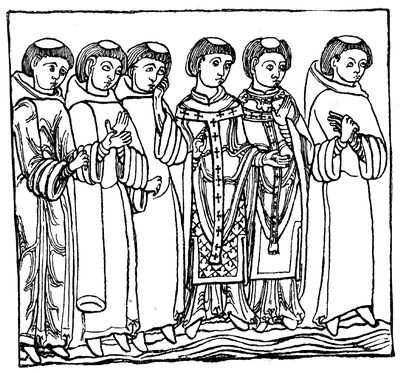
Ecclesiastical costume in the twelfth century.
6. Archbishop Thomas. 1162.—Henry, who meditated great judicial reforms, foresaw that the clergy would be an obstacle in his way. He was eager to establish one law for his whole kingdom, and the clergy, having been exempted by the Conqueror from the jurisdiction of the ordinary law courts in all ecclesiastical matters, had, during the anarchy of Stephen's reign, encroached on the royal authority, and claimed to be responsible, even in criminal cases, only to the ecclesiastical courts, which were unable to inflict the penalty of death, so that a clerk who committed a murder could not be hanged like other murderers. As large numbers of clerks were only in the lower orders, and as many of them had only taken those orders to escape from the hardships of lay life, their morals were often no better than those of their lay neighbours. A (p. 143) vacancy occurring in the Archbishopric of Canterbury, Henry, who wished to make these clerks punishable by his own courts, thought that the arrangement would easily be effected if Thomas, who had hitherto been active as a reformer in his service, were Archbishop as well as Chancellor. It was in vain that Thomas remonstrated. "I warn you," he said to Henry, "that, if such a thing should be, our friendship would soon turn to bitter hate." Henry persisted in spite of the warning, and Thomas became Archbishop.
7. Breach between Henry and Thomas.—The first act of the new Archbishop was to surrender his Chancellorship. He was unable, he said, to serve two masters. It is not difficult to understand his motives. The Church, as the best men of the twelfth century believed, was divinely instituted for the guidance of the world. It was but a short step for the nobler spirits amongst the clergy to hold it necessary that, in order to secure the due performance of such exalted duties, the clergy should be exempted from the so-called justice of laymen, which was often only another name for tyranny, even if the exemption led to the infliction upon wicked clerks of lesser punishments than were meet. In this way the clergy would unconsciously fall into the frame of mind which might lead them to imagine it more to the honour of God that a wicked clerk should be insufficiently punished than that he should be punished by a layman. Of all men Archbishop Thomas was the most likely to fall into this mistake. He was, as Chancellor, prone to magnify his office, and to think more of being the originator of great reforms than of the great reforms themselves. As Archbishop he would also be sure to magnify his office, and to think less, as Anselm would have thought, of reconciling the true interests of the kingdom with the true interests of the Church, than of making the Archbishop's authority the centre of stirring movement, and of raising the Church, of which he was the highest embodiment in England, to a position above the power of the king. All this he would do with a great, if not a complete, sincerity. He would feel that he was himself the greater man because he believed that he was fighting in the cause of God.
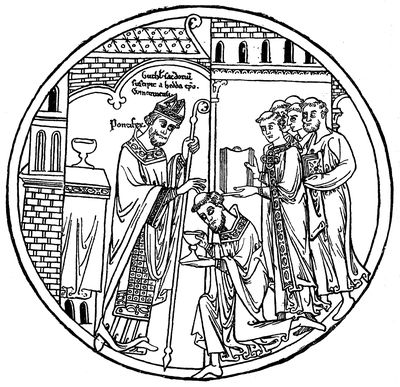
A bishop ordaining a priest.
(From a MS. of the latter
part of the twelfth century.)
8. The Constitutions of Clarendon. 1164.—Between a king eager to assert the rights of the crown and an archbishop eager to assert the rights of the clergy a quarrel could not be long deferred. Thomas's first stand, however, was on behalf of the whole country. At a Great Council at Woodstock he resisted the king's resolution to levy the old tax of Danegeld, and in consequence Danegeld was never levied again. Henry had for some time been displeased (p. 144) because, without consulting him, the Archbishop had seized on lands which he claimed as the property of the see of Canterbury, and had excommunicated one of the king's tenants. Then a clerk who had committed a rape and a murder had been acquitted in an ecclesiastical court. On this, Henry called on the bishops to promise to obey the customs of the realm. Thomas, being told that the king merely wanted a verbal promise to save his dignity, with some reluctance consented. He soon found that he had been tricked. In 1164 Henry summoned a Great Council to meet at Clarendon, and directed some of the oldest of his barons to set down in writing the customs observed by his grandfather. Their report was intended to settle all disputed points between the king and the clergy, and was drawn up under sixteen heads known as the Constitutions of Clarendon. The most important of them declared (p. 145) that beneficed clergy should not leave the realm without the king's leave; that no tenant-in-chief of the king should be excommunicated without the king's knowledge; that no villein should be ordained without his lord's consent; that a criminous clerk should be sent to the ecclesiastical court for trial, and that after he had been there convicted or had pleaded guilty the Church should deprive him and leave him to the lay court for further punishment. It was for the Curia Regis to determine what matters were properly to be decided by the ecclesiastical courts; and no appeal to Rome was to be allowed without its permission. To all this Thomas was violently opposed, maintaining that the sentence of deprivation, which was all that an ecclesiastical court was empowered to inflict, was so terrible, that one who had incurred it ought not to be sentenced to any further penalty by a lay court. After six days' struggle he left the Council, refusing to assent to the Constitutions.
9. The Persecution of Archbishop Thomas. 1164.—Unluckily for himself, Henry could not be content firmly and quietly to enforce the law as it had been declared at Clarendon. He had in his character much of the orderly spirit of his grandfather, Henry I., but he had also something of the violence of his great-uncle, William II. A certain John the Marshal had a suit against the archbishop, and when the archbishop refused to plead in a lay court, the king's council sentenced him to a fine of 500l. Then Henry summoned the archbishop to his castle at Northampton to give an account of all the money which, when he was Chancellor, he had received from the king—a claim which is said to have amounted to 30,000l., a sum equal in the money of these days to not much less than 400,000l. now. Thomas, with the crucifix in his hand, awaited in the hall the decision of Henry, who with the council was discussing his fate in an upper chamber. When the Justiciar came out to tell him that he had been declared a traitor he refused to listen, and placed himself under the Pope's protection. Hot words were bandied on either side as he walked out of the hall. "This is a fearful day," said one of his attendants. "The Day of Judgment," replied Thomas, "will be more fearful." Thomas made his way to the coast and fled to France. Henry in his wrath banished no less than four hundred of the archbishop's kinsmen and friends. Thomas found less help in France than he had expected. There were once more two rival Popes—Alexander III., who was acknowledged by the greater part of the clergy and by the kings of England and France, and Calixtus III., who had been set up by the Emperor Frederick Barbarossa. Alexander was too much afraid (p. 146) lest Henry should take the part of Calixtus to be very eager in supporting Thomas. He therefore did his best to effect a reconciliation between Henry and Thomas, but for some years his efforts were of no avail.
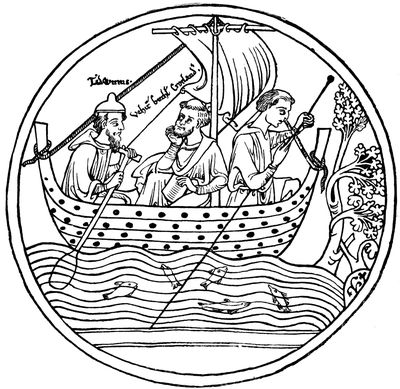
Small ship of the latter part of the twelfth century.
10. The Assize of Clarendon. 1166.—Henry, being temporarily disembarrassed of Thomas's rivalry, was able to devote his time to carrying out still further the judicial organisation of the country. In 1166 he held a Great Council at Clarendon, and with its approval issued a set of decrees known as the Assize of Clarendon. By this assize full force was given to a change which had for some time been growing in the judicial system. The old English way of dealing with criminals had been by calling on an accused person to swear to his own innocence and to bring compurgators to swear that his oath was true. If the accused failed to find compurgators he was sent to the ordeal. According to the new way there was to (p. 147) be in each county juries consisting of twelve men of the hundred and of four from each township in it to present offences—felonies, murders, and robberies—and to accuse persons on common report. They were sworn to speak the truth, so that their charges were known as verdicts (verè dicta). No compurgators were allowed, but the accused, after his offence had been presented, had to go to the ordeal, and even if he succeeded in this he was, if his character was notoriously bad, to abjure the realm—that is to say, to be banished, swearing never to return. If he came back he was held to be an outlaw, and might be put to death without mercy by any one.
11. Recognitions.—A very similar system to that which was thus adopted in criminal cases had already in the early part of Henry's reign been widely extended in civil cases. When, before the Conquest, disputes occurred amongst the English as to the possession of property, each party swore to the justice of his own case, brought compurgators, and summoned witnesses to declare in his favour. There was, however, no method of cross-examination, and if the hundred or shire court was still unsatisfied, it had recourse to the ordeal. The Normans introduced the system of trial by battle, under the belief that God would intervene to give victory to the litigant whose cause was just. This latter system, however, had never been popular with the English, and Henry favoured another which had been in existence in Normandy before the Conquest, and was fairly suited to English habits. This was the system of recognitions. Any freeholder who had been dispossessed of his land might apply to the Curia Regis, and the Curia Regis ordered the sheriff of the county in which was the land in dispute to select four knights of that county, by whom twelve knights were chosen to serve as Recognitors. It was the business of these Recognitors to find out either by their own knowledge or by private inquiry the truth of the matter. If they were unanimous their verdict was accepted as final. If not, other knights were added to them, and when at last twelve were found agreeing, their agreement was held to settle the question.
12. The Germ of the Jury.—Thus, whilst in criminal cases the local knowledge of sworn accusers was treated as satisfactory evidence of guilt, in civil cases a system was growing up in which is to be traced the germ of the modern jury. The Recognitors did not indeed hear evidence in public or become judges of the fact, like the modern jury; they were rather sworn witnesses, allowed to form an opinion not merely, like modern witnesses, on what they (p. 148) had actually seen or heard, but also on what they could gather by private inquiry.
13. The Itinerant Justices Revived.—To carry out this system Henry renewed his grandfather's experiment of sending members of the Curia Regis as itinerant justices visiting the counties. They held what were called the pleas of the crown—that is to say, trials which were brought before the king's judges instead of being tried either in the county courts or the manorial courts. Both these judges and the king had every interest in getting as much business before their courts as possible. Offenders were fined and suitors had to pay fees, and the best chance of increasing these profits was to attract suitors by administering justice better than the local courts. The more thronged were the king's courts, the more rich and powerful he became. The consequent growth of the influence of the itinerant justices was no doubt offensive to the lords of the manor, and especially to the greater landowners, as diminishing their importance, and calling them to account whenever they attempted to encroach on their less powerful neighbours.
14. The Inquisition of the Sheriffs. 1170.—It was not long before Henry discovered another way of diminishing the power of the barons. In the early part of his reign the sheriffs of the counties were still selected from the great landowners, and the sheriff was not merely the collector of the king's revenue in his county, but had, since the Conquest, assumed a new importance in the county court, over which in the older times the ealdorman or earl and the bishop had presided. Since the Conquest the bishop, having a court of his own for ecclesiastical matters, had ceased to take part in its proceedings, and the earl's authority, which had been much lessened after the Conquest, had now disappeared. The sheriff, therefore, was left alone at the head of the county court, and when the new system of trial grew up he as well as the itinerant justices was allowed to receive the presentments of juries. When, in the spring of 1170, the king returned to England after an absence of four years, he held a strict inquiry into the conduct of them all, and deposed twenty of them. In many cases, no doubt, the sheriffs had done things to displease Henry, but there can be no doubt that the blow thus struck at the sheriffs was, in the main, aimed at the great nobility. The successors of those turned out were of lower rank, and therefore more submissive. From this time it was accepted by the kings of England as a principle of government that no great noble should serve as sheriff.
(p. 149) 15. The Nobles and the Church.—Henry knew well that the great nobles were indignant, and that it was possible that they might rise against him, as at one time or another they had risen against every king since the Conquest. He knew too that his predecessors had found their strongest support against the nobles in the Church, and that the Church was no longer unanimously on his side. He could indeed count upon all the bishops save one. Bishops who were or had been his officials, bishops envious of Thomas or afraid of himself, were all at his disposal, but they brought him no popular strength. Thomas alone amongst them had a hold on the imagination of the people through his austerities and his daring. Moreover, as the champion of the clergy, he was regarded as being also the champion of the people, from whose ranks the clergy were recruited.
16. The Coronation of Young Henry. 1170.—At the moment of Henry's return to England he had special need of the Church. He wished the kingdom of England to pass at his death to his eldest son, Henry, and since the Conquest no eldest son had ever succeeded his father on the throne. He therefore determined to adopt a plan which had succeeded with the kings of France, of having the young Henry chosen and crowned in his own lifetime, so that when he died he might be ready to step into his father's place. Young Henry was chosen, and on June 14, 1170, he was crowned by Roger, Archbishop of York; but on the day before the coronation Roger received from Thomas a notice of his excommunication of all bishops taking part in the ceremony, on the ground that it belonged only to an Archbishop of Canterbury to crown a king, and this excommunication had been ratified by the Pope. It was therefore possible that the whole ceremony might go for nothing.
17. The Return of Archbishop Thomas. 1170.—To obviate this danger Henry again sought to make peace with Thomas. An agreement was come to on the vague terms that the past should be forgotten on both sides. Henry perhaps hoped that when Thomas was once again in England he would be too wise to rake up the question of his claim to crown the king. If it was so he was soon disappointed. On December 1, 1170, Thomas landed at Sandwich and rode to Canterbury amidst the shouts of the people. He refused to release from excommunication the bishops who had taken part in young Henry's coronation unless they would first give him satisfaction for the wrong done to the see of Canterbury, thus showing that he had forgotten nothing.
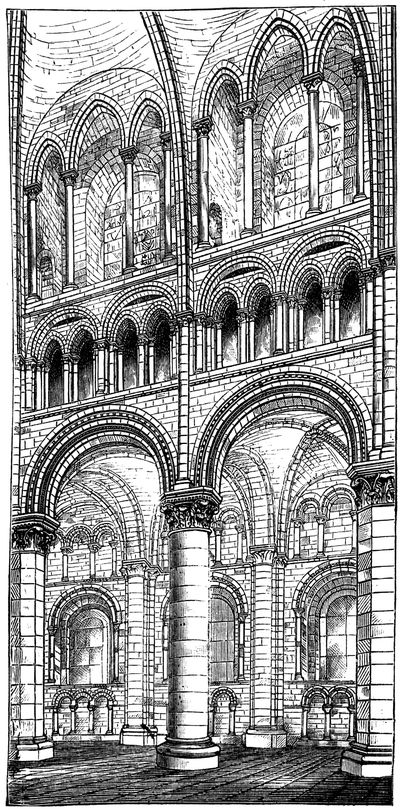
Part of the choir of Canterbury Cathedral
(in building
from 1175-1184).
18. Murder of Archbishop Thomas. 1170.—The aggrieved (p. 150) bishops at once crossed the sea to lay their complaint before Henry. "What a parcel of fools and dastards," cried Henry impatiently, "have I nourished in my house, that none of them can be found to (p. 151) avenge me on one upstart clerk!" Four of his knights took him at his word, and started in all haste for Canterbury. The Archbishop before their arrival had given fresh offence in a cause more righteous than that of his quarrel with the bishops. Ranulf de Broc and others who had had the custody of his lands in his absence refused to surrender them, robbed him of his goods, and maltreated his followers. On Christmas Day he excommunicated them and repeated the excommunication of the bishops. On December 29 the four knights sought him out. They do not seem at first to have intended to do him bodily harm. The excommunication of the king's servants before the king had been consulted was a breach of the Constitutions of Clarendon, and they bade him, in the king's name, to leave the kingdom. After a hot altercation the knights retired to arm themselves. The archbishop was persuaded by his followers to take refuge in the church. In rushed the knights crying, "Where is the traitor? Where is the archbishop?" "Behold me," replied Thomas, "no traitor, but a priest of God." The assailants strove to lay hands upon him. He struggled and cast forth angry words upon them. In the madness of their wrath they struck him to the ground and slew him as he lay.
19. Popular Indignation. 1171.—Archbishop Thomas did not die as a martyr for any high or sacred cause. He was not a martyr for the faith, like those who had been thrown to the lions by the Roman emperors. He was not a martyr for righteousness, like Archbishop Ælfheah. He was a martyr for the privileges of his order and of his see. Yet if he sank below the level of the great martyrs, he did not sink to that lowest stage at which men cry out for the preservation of their own privileges, after those privileges have ceased to benefit any but themselves. The sympathy of the mass of the population shows the persistence of a widespread belief that in maintaining the privileges of the clergy Thomas was maintaining the rights of the protectors of the poor. This sentiment was only strengthened by his murder. All through Europe the news was received with a burst of indignation. Of that indignation the Pope made himself the mouthpiece. In the summer of 1171 two Papal legates appeared in Normandy to excommunicate Henry unless he was able to convince them that he was guiltless of the murder. Henry was too cautious to abide their coming. He crossed first to England and then to Ireland, resolved to have something to offer the Pope which might put him in a better humour.
20. State of Ireland.—In the domain of art, Ireland was inferior to no European nation. In metal-work, in sculpture, and in the (p. 152) skilful illumination of manuscripts it surpassed them all. It had no mean school of music and song. In political development it lagged far behind. Ireland was still in the tribal stage, and had never been welded into unity by foreign conquerors, as Gaul had been welded into unity by the Romans, and as England had been welded into unity by the Normans. Tribe warred with tribe and chief with chief. The efforts of chiefs to attain supremacy over the whole island had always ended in partial or complete failure. The Danes had made settlements in Dublin, Wexford, Waterford, Cork, and Limerick, but though the native Celtic population was not strong enough to expel them, neither were they strong enough to conquer the Celts. The Church was as disorganised as the State, and there was little discipline exercised outside the monasteries. For some time the Popes and the Archbishops of Canterbury had been anxious to establish a better regulated Church system, and in 1154 Adrian IV.—the only Englishman who was ever Pope—hoping that Henry would bring the Irish Church under Papal order, had made him a present of Ireland, on the ground that all islands belonged to the Pope.
21. Partial Conquest of Ireland. 1166—1172.—Henry, however, had too much to do during the earlier years of his reign to think of conquering Ireland. In 1166 Dermot, king or chief of Leinster, having been driven out of his dominions, appealed to Henry for aid. Henry gave him leave to carry over to Ireland any English knights whom he could persuade to help him. On this a number of knights from South Wales, of whom the most important was Richard de Clare, afterwards known as Strongbow, flocked across the Irish Sea (1169—1170). They fought and conquered, and Strongbow, who married Dermot's daughter, gave himself the title of Earl of Leinster. The rule of these knights was a rule of cruelty and violence, and, what was more, it might well become dangerous to Henry himself. If feudal nobles established themselves in Ireland, they might soon be holding out a hand to help the feudal nobles who were Henry's worst enemies in England. When Henry landed in Ireland in 1171 he set himself to restore order. The Irish welcomed him because he alone could bridle the invaders, and the invaders submitted to him because they dared not resist him. He gathered a synod of the clergy at Cashel, and arranged for the future discipline of the Church. Unhappily he could not remain long in Ireland, and when he left it the old anarchy and violence blazed up again. Though Henry had not served Ireland, he had gained his own personal ends. He had frightened Strongbow and his followers, and had (p. 153) shown the Pope, by his proceedings at Cashel, that his friendship was worth having.
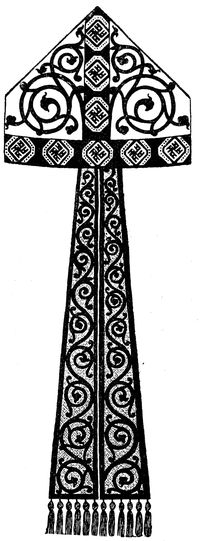
Mitre of Archbishop Thomas of Canterbury
preserved at
Sens.
22. Young Henry's Coronation and the Revolt of the Barons. 1172—1174.—In the spring of 1172 Henry was back in Normandy. The English barons were longing to take advantage of his quarrel with the Church, and his only chance of resisting them was to propitiate the Church. He met the Papal legates at Avranches, swore that he was innocent of the death of Thomas, and renounced the Constitutions of Clarendon. He then proceeded to pacify Louis VII., whose daughter was married to the younger Henry, by having the boy recrowned in due form. Young Henry was a foolish lad, and took it into his head that because he had been crowned his father's reign was at an end. In 1173 he fled for support to his father-in-law and persuaded him to take up his cause. "Your master," said Louis to the ambassadors of the father, "is king no longer. Here stands the king of the English." These words were the signal for a general attack on the elder king. Headed by Louis, his neighbours and discontented subjects took arms against him, and it was not till September that he prevailed over them. In July the great English barons of the north and centre rose in insurrection, and William the Lion, king of the Scots, joined them. De Lucy, the Justiciar, stood up for Henry; but, though he gained ground, the war was still raging in the following year, 1174. In the spring of that year the rebels were gaining the upper hand, and the younger Henry was preparing to come to their help. In July the elder Henry landed in England. For the first and only time in his life he brought to England the mercenaries who were paid with the scutage money. At Canterbury he visited the tomb of Thomas, now acknowledged (p. 154) as a martyr, spent the whole night in prayer and tears, and on the next morning was, at his own request, scourged by the monks as a token of his penitence. That night he was awakened by a messenger with good news. Ranulf de Glanvile had won for him a great victory at Alnwick, had dispersed the barons' host, and had taken prisoner the Scottish king. About the same time the fleet which was to bring his son over was dispersed by a storm. Within a few weeks the whole rebellion was at an end. It was the last time that the barons ventured to strive with the king till the time came when they had the people and the Church on their side. William the Lion was carried to Normandy, where, by the treaty of Falaise, he acknowledged himself the vassal of the king of England for the whole of Scotland.
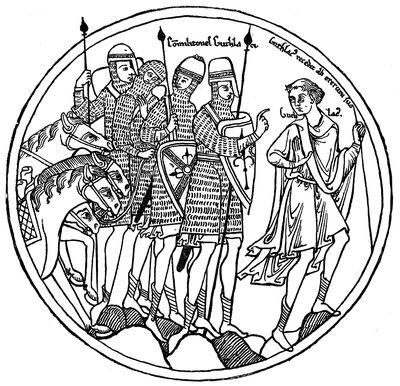
Military and civil costume of the latter part of the twelfth century.
23. The Assize of Arms. 1181.—In September 1174 there was a general peace. In 1181 Henry issued the Assize of Arms, (p. 155) organising the old fyrd in a more serviceable way. Every English freeman was bound by it to find arms of a kind suitable to his property, that he might be ready to defend the realm against rebels or invaders. The Assize of Arms is the strongest possible evidence as to the real nature of Henry's government. He had long ago sent back to the Continent the mercenaries whom he had brought with him in the peril of 1174, and he now entrusted himself not to a paid standing army, but to the whole body of English freemen. He was, in truth, king of the English not merely because he ruled over them, but because they were ready to rally round him in arms against those barons whose ancestors had worked such evil in the days of Stephen. England was not to be given over either to baronial anarchy or to military despotism.
24. Henry II. and his Sons.—In England Henry ruled as a national king over a nation which, at least, preferred his government to that of the barons. The old division between English and Norman was dying out, and though the upper classes, for the most part, still spoke French, intermarriages had been so frequent that there were few amongst them who had not some English ancestress and who did not understand the English language. Henry was even strong enough to regain much that he had surrendered when he abandoned the Constitutions of Clarendon. In his Continental possessions there was no such unity. The inhabitants of each province were tenacious of their own laws and customs, and this was especially the case with the men of Aquitaine, the country south of the Loire, who differed in habits, and even in language, from the Frenchmen of Normandy and Anjou. They therefore found it difficult to give a share of the allegiance which they owed to their own duchess, Eleanor, to her Angevin husband, the king of England. Henry in 1172 having appointed his eldest son, Henry, as the future ruler of Normandy and Anjou as well as of England, thought it wise to recognise this feeling by giving to his second son, Richard, the immediate possession of Eleanor's duchy of Aquitaine. In 1181 he provided for his third son, Geoffrey, by a marriage with Constance, the heiress of Brittany, over which country he claimed a feudal superiority as Duke of the Normans. Yet, though he gave away so much to his sons, he wished to keep the actual control over them all. The arrangement did not turn out well. He had set no good example of domestic peace. His sons knew that he had married their mother for the sake of her lands, that he had subsequently thrown her into prison and had been faithless to her with a succession of mistresses. Besides this, they were (p. 156) torn away from him by the influence of the men whom they were set to rule. Richard was dragged away from his father by the interests and feelings of the men of Aquitaine, Geoffrey by the interests and feelings of the men of Brittany. John, the fourth son, who was named Lackland from having no territory assigned to him, was, as yet, too young to be troublesome.[12] Both Richard and Geoffrey had taken part with their brother Henry in the great revolt of 1173. In 1177 they were again quarrelling with their father and with each other. "Dost thou not know," was the message which Geoffrey sent to his father, "that it is our proper nature, planted in us by inheritance from our ancestors, that none of us should love the other, but that ever brother should strive with brother and son against father? I would not that thou shouldst deprive us of our hereditary right nor vainly seek to rob us of our nature." Henry loved his children, and could never bring himself to make war very seriously against them. Henry died young in 1183, and Geoffrey in 1185. Richard was now the heir of all his father's lands, from the Tweed to the Pyrenees. Henry made an effort to provide for John in Ireland, and in 1185 he sent the youth—now eighteen years old—to Dublin to rule as king of Ireland. John soon showed his incompetence. He was rude to the English barons, and still ruder to the Irish chiefs, amusing himself by laughing at their dress and pulling the hairs out of their beards. Before the end of the year his father was obliged to recall him.
25. The Fall of the Kingdom of Jerusalem. 1187.—The divisions in Henry's family were stirred up afresh by the new king of France, Philip II., who had succeeded his father, Louis VII., in 1179. Philip was resolved to enlarge his narrow dominions at the expense of Henry. He was Henry's feudal lord, and he was crafty enough to know that by assisting Henry's sons he might be able to convert his nominal lordship into a real power. News, however, arrived in the midst of the strife which for a little time put an end to the discords (p. 157) of men and peoples. The Latin kingdom of Jerusalem, which had been established after the first crusade, had only maintained itself because the Mahommedan rulers of Egypt were the rivals and enemies of the Mahommedan rulers of Syria. Yet even with the advantage of divisions amongst their enemies, the Christians had only defended themselves with difficulty. A second crusade which had gone out to relieve them in Stephen's reign, under the Emperor Conrad III. and Louis VII. of France, had accomplished nothing. Their real defenders were two bodies of soldiers, known as the Knights Templars and the Knights of St. John, who were bound, like monks, to vows of celibacy, so that they might always be free to defend Jerusalem. At last a great Mahommedan warrior, Saladin, arose, who ruled both Egypt and Syria, and was therefore able to bring the united forces of the two countries against the Christian colony. In 1187 he destroyed the Christian army at Tiberias, and in the same year took Jerusalem and almost every city still held by the Christians in the East. Tyre alone held out, and that, too, would be lost unless help came speedily.
26. The Last Years of Henry II. 1188—1189.—For a moment the rulers of the West were shocked at the tidings from the East. In 1188 Philip, Henry, and Richard had taken the cross as the sign of their resolution to recover the Holy City from the infidel. To enable him to meet the expenses of a war in the East, Henry imposed upon England a new tax of a tenth part of all movable property, which is known as the Saladin tithe, but in a few months those who were pledged to go on the crusade were fighting with one another—first Henry and Richard against Philip, and then Philip and Richard against Henry. At last, in 1189, Henry, beaten in war, was forced to submit to Philip's terms, receiving in return a list of those of his own barons who had engaged to support Richard against his father. The list reached him when he was at Chinon, ill and worn out. The first name on it was that of his favourite son John. The old man turned his face to the wall. "Let things go now as they will," he cried bitterly. "I care no more for myself or for the world." After a few days of suffering he died. The last words which passed his lips were, "Shame, shame upon a conquered king."
27. The Work of Henry II.—The wisest and most powerful ruler can only assist the forces of nature; he cannot work against them. Those who merely glance at a map in which the political divisions of France are marked as they existed in Henry's reign, cannot but wonder that Henry did not make himself master of the (p. 158) small territory which was directly governed, in turn, by Louis VII. and Philip II. A careful study of the political conditions of his reign shows, however, that he was not really strong enough to do anything of the kind. His own power on the Continent was purely feudal, and he held authority over his vassals there because they had personally done homage to him. Henry, however, had also done homage to the king of France, and did not venture, even if he made war upon his lord, the king of France, to push matters to extremities against him, lest his sons as his own vassals might push matters to extremities against himself. He could not, in short, expel the king of France from Paris, lest he should provoke his own vassals to follow his example of insubordination and expel him from Bordeaux or Rouen. Moreover, Henry had too much to do in England to give himself heart and soul to Continental affairs, whilst the king of France, on the contrary, who had no foreign possessions, and was always at his post, would be the first to profit by a national French feeling whenever such a feeling arose. England under Henry II. was already growing more united and more national. The crown which Henry derived from the Conqueror was national as well as feudal. Henry, like his predecessors, had two strings to his bow. On the one hand he could call upon his vassals to be faithful to him because they had sworn homage to him, whilst he himself, as far as England was concerned, had sworn homage to no one. On the other hand, he could rally round him the national forces. To do this he must do justice and gain the goodwill of the people at large. It was this that he had attempted to do, by sending judges round the country and by improving the law, by establishing scutage to weaken the power of the barons, and by strengthening the national forces by the Assize of Arms. No doubt he had little thanks for his pains. Men could feel the weight of his arm and could complain of the heavy fines exacted in his courts of justice. It was only a later generation, which enjoyed the benefits of his hard discipline, which understood how much England owed to him.[Back to Contents]
LEADING DATES
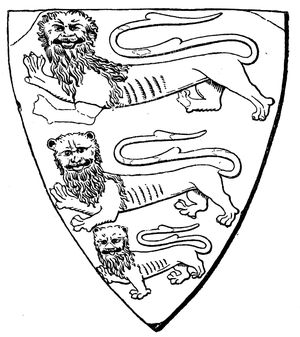
Royal arms of England from Richard I. to Edward III.
(From the wall arcade, south aisle of nave,
Westminster Abbey.)
1. Richard in England. 1189.—Richard was accepted without dispute as the master of the whole of the Angevin dominions. He was a warrior, not a statesman. Impulsive in his generosity, he was also impulsive in his passions. Having determined to embark on the crusade, he came to England eager to raise money for its expenses. With this object he not only sold offices to those who wished to buy them, and the right of leaving office to those who wished to retire, but also, with the Pope's consent, sold leave to remain at home to those who had taken the cross. Regardless of the distant future, he abandoned for money to William the Lion the treaty of Falaise, in which William had engaged to do homage to the English king.
2. William of Longchamps. 1189—1191.—To secure order during his absence Richard appointed two Justiciars—Hugh of Puiset, Bishop of Durham, and William of Longchamps, Bishop of Ely. At the same time he attempted to conciliate all who were likely to be dangerous by making them lavish grants of land, especially giving what was practically royal authority over five shires to his brother John. Such an arrangement (p. 160) was not likely to last. Before the end of 1189 Richard crossed to the Continent. Scarcely was he gone when the populace in many towns turned savagely on the Jews and massacred them in crowds. The Jews lived by money-lending, and money-lenders are never popular. In York they took refuge in the castle, and when all hope of defending themselves failed, slew their wives and children, set fire to the castle, and perished in the flames. The Justiciars were too much occupied with their own quarrels to heed such matters. Hugh was a stately and magnificent prelate. William was lame (p. 161) and misshapen, quick of wit and unscrupulous. In a few weeks he had deprived his rival of all authority. His own power did not last long. He had a sharp tongue, and did not hesitate to let all men, great and small, know how meanly he thought of them. Those whom he despised found a leader in John, who was anxious to succeed his brother, and thought that it might some day be useful to have made himself popular in England. In the autumn of 1191 William of Longchamps was driven out of the country.
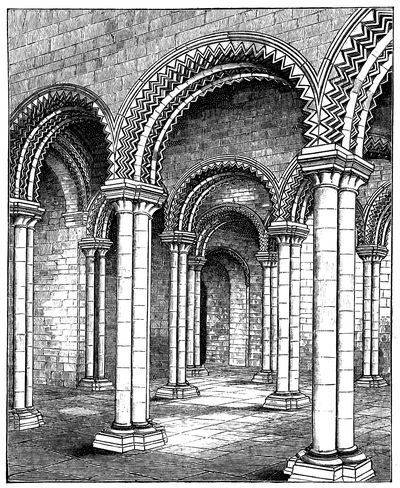
The Galilee or Lady Chapel, Durham Cathedral.
Built by
Bishop Hugh of Puiset between 1180 and 1197.
3. The Third Crusade. 1189—1192.—Richard threw his whole heart—his lion's heart, as men called it—into the crusade. Alike by sea and by land, he knew better than any other leader of his age how to direct the operations of war. He was too impetuous to guard himself against the intrigues and personal rancour of his fellow-Crusaders. At Messina he quarrelled with the wily Philip II. of France, while he gave offence to all Germans by upholding the claims of Tancred to the crown of Sicily, which was also claimed by the German king, who afterwards became the Emperor Henry VI. In the spring of 1191 Richard sailed from Sicily for the Holy Land, conquering Cyprus on the way, where he married Berengaria of Navarre. Passing on to the coast of Syria, he found the Crusaders besieging Acre, and his own vigour greatly contributed to its fall. When Acre was taken Philip slipped home to plot against Richard, and Richard found every French Crusader and every German Crusader banded together against him. When he advocated the right of Guy of Lusignan to the crown of Jerusalem, they advocated the claim of Conrad of Montferrat. Jerusalem was not to be had for either of them. Twice Richard brought the Crusading host within a few miles of the Holy City. Each time he was driven to retreat by the failure of the Crusaders to support him. The last time his comrades invited him at least to reach a spot from which a view of the city could be gained. Richard refused. If he was not worthy, he said, to regain the city, he was not worthy to look on it.
4. The Return of Richard. 1192—1194.—In 1192 there was nothing for it but to return home. Enemies were watching for him on every shore. Landing at the head of the Adriatic, he attempted to make his way in disguise through Germany. With characteristic want of reflection, he roasted his meat at a village inn near Vienna with a jewelled ring on his finger. Attention was aroused, and he was arrested and delivered up to Leopold, Duke of Austria, who had been his bitter antagonist in the Holy Land, and Leopold delivered him up to his own feudal superior, the Emperor, Henry VI.
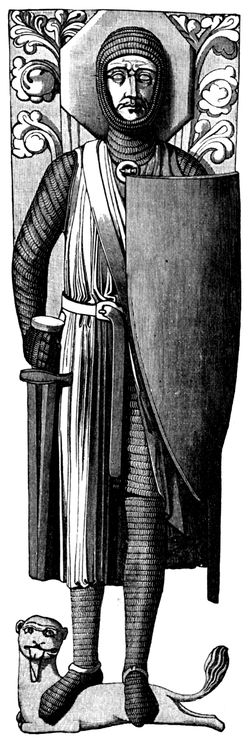
Effigy of a knight in the Temple Church, London, showing armour of the end of the twelfth century.
(p. 162) The imprisonment of Richard was joyful news to Philip and John. John did his best to get into his hands all the English and Continental dominions of his brother. His meanness was, however, by this time well known, and he was repelled on all sides. At last in 1193 the Emperor consented to let Richard go on payment of what was then the enormous ransom of 150,000 marks, or 100,000l. "Beware," wrote Philip to John when he heard that the Emperor's consent had been given; "the devil is loose again," Philip and John tried to bribe the Emperor to keep his prisoner, but in February 1194 Richard was liberated, and set out for England.
5. Heavy taxation.—Before Richard reappeared in England each tenant-in-chief had to pay the aid which was due to deliver his lord from prison (see p. 117), but this was far from being enough. Besides all kinds of irregular expedients the Danegeld had been practically revived, and to it was now given the name of carucage, a tax of two shillings on every plough-land. Another tax of a fourth part of all movable goods had also been imposed, for which a precedent had been set by Henry II. when he levied the Saladin tithe (see p. 157). Richard had now to gather in what was left unpaid of these (p. 163) charges. Yet so hated was John that Richard was welcomed with every appearance of joy, and John thought it prudent to submit to his brother. Philip, however, was still an open enemy, and as soon as Richard had gathered in all the money that he could raise in England he left the country never to return. On the Continent he could best defend himself against Philip, and, besides this, Richard was at home in sunny Aquitaine, and had no liking for his English realm.
6. The Administration of Hubert Walter. 1194—1198.—For four years the administration of England was in the hands of a new Justiciar, the Archbishop of Canterbury, Hubert Walter. He was a statesman of the school of Henry II., and he carried the jury system yet farther than Henry had done. The immense increase of taxation rendered it the more necessary to guard against unfairness, and Hubert Walter placed the selection of the juries of presentment (see p. 147) in the hands of four knights in every shire, who, as is probable, were chosen by the freeholders in the County Court, instead of being named by the sheriff. This was a further step in the direction of allowing the counties to manage their own affairs, and a still greater one was taken by the frequent employment of juries in the assessment of the taxes paid within the county, so as to enable them to take a prominent part in its financial as well as in its judicial business. In 1198 there was taken a new survey of England for taxable purposes, and again elected juries were employed to make the returns. In this year Archbishop Hubert retired from the Justiciarship, and was succeeded by Geoffrey Fitz-Peter. Archbishop Hubert's administration marks a great advance in constitutional progress, though it is probable that his motive was only to raise money more readily. The main constitutional problem of the Norman and Angevin reigns was how to bring the national organisation of the king's officials into close and constant intercourse with the local organisation of the counties. Henry I. and Henry II. had attacked the problem on one side by sending the judges round the country to carry the king's wishes and commands to each separate county. It still remained to devise a scheme by which the wishes and complaints of the counties could be brought to the king. Hubert Walter did not contrive that this should be done, but he made it easy to be done in the next generation, because before he left office he had increased the powers of the juries in each county and had accustomed them to deal independently with all the local matters in which the king and the county were both interested. It only remained to bring these juries together in one place where they might join in making the king aware of the (p. 165) wishes and complaints of all counties alike. When this had been accomplished there would, for the first time, be a representative assembly in England.

Richard I. From his tomb at Fontevrault.

Berengaria. From her tomb at Espan.
7. Death of Richard. 1199.—It was not only Richard's love for his old home which fixed him on the Continent. He knew that the weakest part of his dominions was there. His lands beyond sea had no natural unity. Normans did not love Angevins, neither did Angevins love the men of Poitou or Guienne. Philip was willingly obeyed in his own dominions, and he had all the advantage which his title of king of the French could give him. Richard fought desperately, and for the most part successfully, against the French king, and formed alliances with all who were opposed to him. He built on a rock overhanging the Seine above Les Andelys a mighty fortress—the Château Gaillard, or Saucy Castle, as he called it in jest. With characteristic haste he completed the building in a few months. "How fair a child is mine!" he called to his followers, "this child but a twelvemonth old." Other child he had none, and he had but the miserable John to look to to hold his dominions after he was gone. He did not live long enough to see whether his new castle could stand a siege. A peasant dug up a treasure on the land of the lord of Châlus in the Limousin. Richard claimed it as his right because he was the over-lord. On the refusal of the lord to surrender it he laid siege to Châlus. An arrow from the castle struck him on the shoulder. The wound rankled, and mortification followed. As Richard lay dying the castle surrendered, and the man who had aimed the fatal shot was brought before him. "What have I done to thee," asked Richard, "that thou shouldest slay me?" "Thou hast slain my father and two of my brothers with thy own hand," said the prisoner, "and thou wouldest fain have killed me too. Avenge thyself upon me as thou wilt. I will gladly endure the greatest torments thou canst devise, since I have seen thee on thy deathbed." Richard, generous to the last, bade his attendants set the prisoner free. They kept him till Richard was dead, and then tortured him to death.
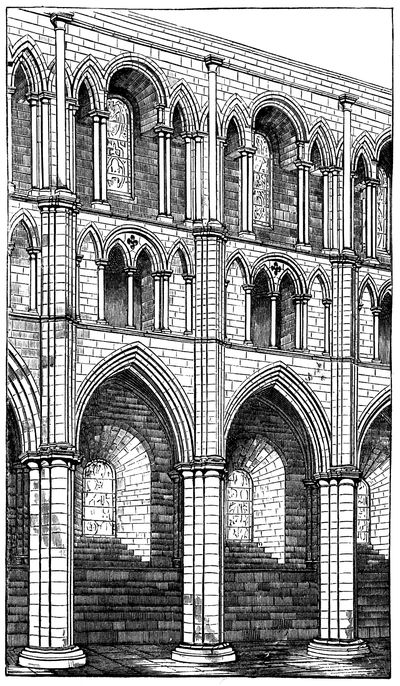
Part of the choir of Ripon Cathedral: built during the last quarter of the twelfth century.
8. Church and State under the Angevin Kings.—During the forty-five years of the reigns of Richard and his father the chief feature of English history is the growth of the power of the state. There was more justice and order, and also more taxation, at the end of the period than at the beginning. During the same period the influence of the Church grew less. The character of Thomas's resistance to the king was lower than that of Anselm, and not long (p. 166) after Thomas's murder Henry indirectly regained the power which he had lost, and filled the sees with officials and dependents who cared little for the higher aims of religion. The evil consequences (p. 167) of making the Church dependent on the king were at least as great as those of freeing the political and social life of the clergy from the control of the State. Even monasticism ceased to afford a strong example of self-denial. The very Cistercians, who had begun so well, had fallen from their original purity. They were now owners of immense tracts of pasture-land, and their keenness in money-making had become notorious. They exercised great influence, but it was the influence of great landlords, not the influence of ascetics.
9. Growth of Learning.—The decay of asceticism was to some extent brought about by the opening of new careers into which energetic men might throw themselves. They were needed as judges, as administrators, as councillors. A vigorous literature sprung up in the reign of Henry II., but at the end of the reign most of it was connected with the court rather than with the monasteries. Henry's Justiciar, Ranulf de Glanvile, wrote the first English law-book. His Treasurer, Richard Fitz-Nigel, set forth in the Dialogus de Scaccario the methods of his financial administration, and also produced 'The Deeds of King Henry and King Richard.' William of Newburgh, indeed, the best historian of these reigns, wrote in a small Yorkshire monastery, but Roger of Hoveden and Ralph de Diceto pursued their historical work under the influence of the court. Still more striking is the universality of the intellectual inquisitiveness of Walter Map. On the one hand, in his De Nugis Curialium he chattered over the manners of his contemporaries, and in his satirical poems scourged the greed and vices of the clergy, whilst on the other hand he took a principal part in spreading a knowledge of the legend of the high-souled King Arthur and of the quest of the Holy Grail. Giraldus Cambrensis again, or Gerald of Wales, wrote on all sorts of subjects with shrewd humour and extensive knowledge.
10. The University of Oxford.—There was already in England a place where learning was cherished for its own sake. For some time there had been growing up on the Continent gatherings for the increase of learning, which ultimately were known as universities, or corporations of teachers and scholars. One at Bologna had devoted itself to the study of the civil or Roman law. Another at Paris gave itself to the spread of all the knowledge of the time. In these early universities there were no colleges. Lads, very poor for the most part, flocked to the teachers and lodged themselves as best they could. Such a university, though the name was not used till later, had been gradually forming at Oxford. Its origin and (p. 168) early history is obscure, but in 1186 Giraldus, wishing to find a cultivated audience for his new book on the topography of Ireland, read it aloud at Oxford, where, as he tells us, 'the clergy in England chiefly flourished and excelled in clerkly lore.' It appears that there were already separate faculties or branches of study, and persons recognised as doctors or teachers in all of them.
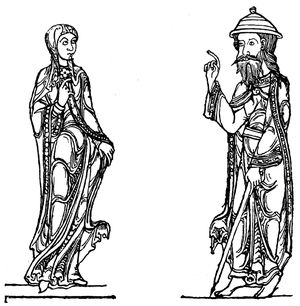
Lay costumes in the twelfth century.
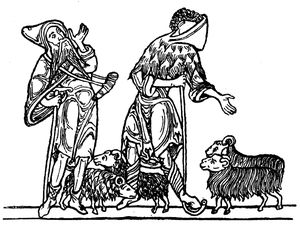
Costume of shepherds in the twelfth century.
11. Country and Town.—Intellectual progress was accompanied by material progress. In the country the old system of cultivation by the labour service of villein-tenants still prevailed, but in many parts the service had been commuted, either for a money payment or for payments in kind, such as payments of a fixed number of eggs or fowls, or of a fixed quantity of honey or straw. Greater progress was made in the towns. At the time of the Conquest there were about eighty towns in England, most of them no larger than villages. The largest towns after London were Winchester, Bristol, Norwich, York, and Lincoln, but even these had not a population much above 7,000 apiece. In the smaller towns trade was sufficiently provided for by the establishment of a market to which country people brought their grain or their cattle, and where they provided themselves in turn with such rude household necessaries as they required. Even before the Conquest port towns had grown up on (p. 169) the coast, but foreign trade was slight, imports being almost entirely confined to luxuries for the rich. The order introduced by the Normans and the connection between England and the king's Continental possessions was followed by an increase of trade, and there arose in each of the larger towns a corporation which was known as the Merchant Gild, and which was, in some instances at least, only a development of an older association existing in the times before the Conquest. No one except the brothers of the Merchant Gild was allowed to trade in any article except food, but any one living in the town might become a brother on payment of a settled fee. The first Merchant Gild known was constituted in 1093. A little later, Henry I. granted charters to some of the towns, conferring on them the right of managing their own affairs; and his example was followed, in far greater profusion, by Henry II. and Richard I. Though the organisation of the Merchant Gild was originally distinct from the organisation of the town, and the two were in theory kept apart, the Merchant Gild, to which most of the townsmen belonged, usually encroached upon the authorities of the town, regulated trade to its own advantage, and practically controlled the choice of officers, the principal officer being usually styled an Alderman, with power to keep order and generally to provide for the well-being of the place. In this way the tradesmen and merchants of the towns prepared themselves unconsciously for the time when they would be called on to take part in managing the affairs of the country. Even in these early times, however, the artisans in some of the trades attempted to combine together.
12. Condition of London.—Of all the towns London had been growing most rapidly in wealth and population, and during the troubles in which John had been pitted against William of Longchamps it had secured the right of being governed by a Mayor and Aldermen of its own, instead of being placed under the jurisdiction of the King's sheriff. The Mayor and Aldermen, however, did not represent all the townsmen. In London, though there is no evidence of the existence of a Merchant Gild, there was a corporation composed of the wealthier traders, by which the city was governed. The Mayor and Aldermen were chosen out of this corporation, as were the juries elected to assess the taxes. Artisans soon came to believe that these juries dealt unfairly with the poor. One of the Aldermen, William Longbeard, made himself the mouthpiece of their complaints and stirred them up against the rest. Hubert Walter sent a messenger to seize him, but William Longbeard slew the (p. 170) messenger and fled into the church of Mary-at-Bow. Here, according to the ideas of his age, he should have been safe, as every church was considered to be a sanctuary in which no criminal could be arrested. Hubert Walter, however, came in person to seize him, set the church on fire, and had him dragged out. William Longbeard was first stabbed, and then tried and hanged, and for the time the rich tradesmen had their way against the poorer artisans.
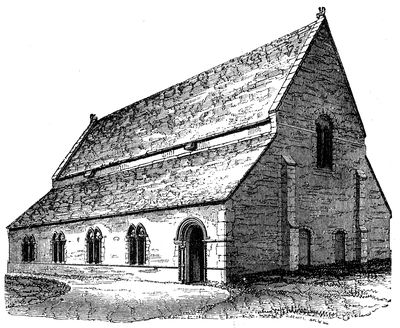
Hall of Oakham Castle, Rutland: built about 1185.
13. Architectural Changes.—Even in the most flourishing towns the houses were still mostly of wood or rubble covered with thatch, and only here and there was to be found a house of stone. So slight, indeed, were the ordinary buildings, that it was provided by the Assize of Clarendon that the houses of certain offenders should be carried outside the town and burnt. Here and there, however, as in the case of the so-called Jews' house at Lincoln, stone houses were erected. In the larger houses the arrangements were much as they had been before the Conquest, the large hall being still the most conspicuous part, though another apartment, known as the solar, to which an ascent was made by steps from the outside, and which served as a sitting-room for the master (p. 171) of the house, had usually been added. The castles reared by the king or the barons were built for defence alone, and it was in the great cathedrals and churches that the skill of the architect was shown. An enormous number of parish churches of stone were raised by Norman builders to supersede earlier buildings of wood. For some time the round-arched Norman architecture which had been introduced by Eadward the Confessor was alone followed, such as may be studied in the Galilee of Durham (see p. 160) the nave of St. Albans (see p. 109) and the tower of Castor (see p. 136). Gradually the pointed arch of Gothic architecture took its place, and after a period of transition, of which the nave of Durham, and the choirs of Canterbury and of Ripon afford examples (see pp. 130, 150, 166), the graceful style now known as Early English was first used on a large scale in 1192 in the choir of the cathedral of Lincoln.
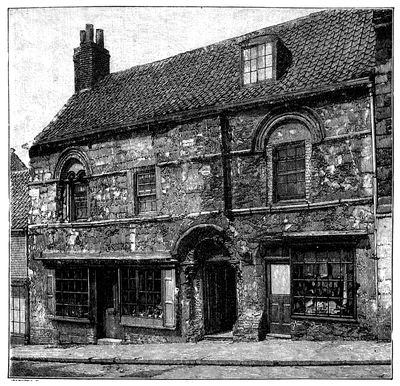
Norman House at Lincoln, called the Jews' House.
Built
about 1140. The square windows are of later date.
(p. 172) Books recommended for further study of Part II.
Stubbs, W. (Bishop of Oxford). Constitutional History of England. Vol i. chaps. ix.-xiii.
Freeman, E. A. History of the Norman Conquest. Vols. iv. and v. History of William Rufus.
Green, J. R. History of the English People. Vol. i. pp. 115-189.
Norgate, Miss K. England under the Angevin Kings. Vols. i. and ii. pp. 1-388.
Cunningham, W. Growth of English Industry and Commerce during the Early and Middle Ages, pp. 129-173.
Wakeman, H. O., and Hassall, A. Constitutional Essays.
Adams, G. B. The Political History of England. Vol. ii. From the Norman Conquest to the Death of John (1066-1216).[Back to Contents]
LEADING DATES
1. The Accession of John. 1199.—After Richard's death there were living but two descendants of Henry II. in the male line—John, Richard's only surviving brother, and Arthur, the young son of John's elder brother, Geoffrey. The English barons had to make their choice between uncle and nephew, and, as had been done in the days of Ælfred, they preferred the grown man to the child. It was the last time when that principle of election was confessedly acted on. Archbishop Hubert in announcing the result used words which seem strange now: "Forasmuch," he declared to the people assembled to witness John's coronation, "as we see him to be prudent and vigorous, we all, after invoking the Holy Spirit's grace, for his merits no less than his royal blood, have with one consent chosen him for our king." In reality, John was of all men most unworthy. He was without dispute the worst of the English kings. Like William II. he feared not God nor regarded man. Though William indeed was more vicious in his private life, John's violence and tyranny in public life was as great as William's, and he added a meanness and frivolity which sank him far below him.
2. John's First War with Philip II. 1199—1200.—On the Continent (p. 174) John had a difficult game to play. Normandy and Aquitaine submitted to him, but Anjou and its dependent territories declared for Arthur, who was Duke of Brittany in right of his mother. Philip II., who had long been the rival of Richard, now took the field in 1199 as the rival of John in support of Arthur; but for the moment he ruined his chance of success by keeping in his own hands the castles which he took from John instead of making them over to Arthur. Arthur's supporters took offence, and in 1200 Philip made peace with John. Philip acknowledged John as Richard's heir, but forced him in return to pay a heavy sum of money, and to make other concessions.
3. John's Misconduct in Poitou. 1200—1201.—John did not know how to make use of the time of rest which he had gained. Being tired of his wife, Avice of Gloucester, he persuaded some Aquitanian bishops to divorce him from her, though he took care to keep the lands which he had received from her at her marriage. He then married Isabella of Angoulême, though she was betrothed to a Poitevin noble, Hugh of Lusignan. Hugh was enraged, and, together with many of his neighbours, took arms against John. In 1201 John charged all the barons of Poitou with treason, and bade them clear their character by selecting champions to fight with an equal number of English and Norman knights.
4. The Loss of Normandy and Anjou. 1202—1204.—The Poitevin barons, instead of accepting the wager of battle, appealed to Philip as John's over-lord, and in 1202 Philip summoned John to answer their complaints before his peers. John not only did not appear, but made no excuse for his absence; and Philip afterwards pretended that the peers had condemned him to forfeit his lands. After this Philip, in alliance with Arthur, invaded Normandy. John's aged mother, Eleanor, who was far more able and energetic than her son, took up his cause against her grandson Arthur. She was besieged by Arthur at Mirebeau when John came to her help, and not only raised the siege, but carried off Arthur as a prisoner. Many of his vassals rose against him, and finding himself unable to meet them in the field he wreaked his vengeance on his helpless prisoner. A little before Easter 1203 Arthur ceased to live. How the boy died has never been known, but it was generally believed that he was drowned in the Seine near Rouen—some said by his uncle's own hands. The murderer was the first to suffer from the crime. Philip at once invaded Normandy. The Norman barons had long ceased to respect John, and very few of them would do anything to help him. Philip took castle after castle. John was indeed capable of a sudden outbreak of violence, (p. 176) but he was incapable of sustained effort. He now looked sluggishly on, feasting and amusing himself whilst Philip was conquering Normandy. "Let him alone," he lazily said; "I shall some day win back all that he is taking from me now." His best friends dropped off from him. The only fortress which made a long resistance was that Château Gaillard which Richard had built to guard the Seine. In 1204 it was at last taken, and before the end of that year Normandy, Maine, Anjou, and Touraine, together with part of Poitou, had submitted to Philip.
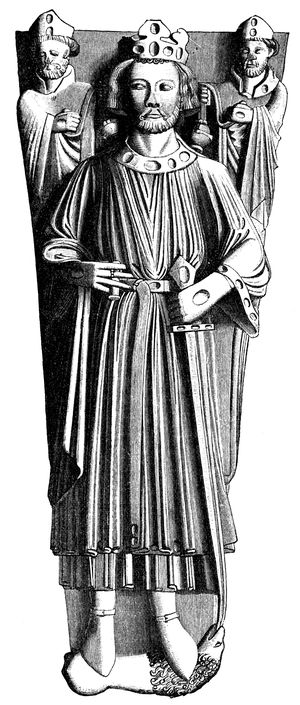
Effigy of King John on his monument in Worcester Cathedral.

Isabella, wife of King John. From her monument at Fontevrault.
5. Causes of Philip's Success.—It was not owing to John's vigour that Aquitaine was not lost as well as Normandy and Anjou. Philip had justified his attack on John as being John's feudal lord, and as being therefore bound to take the part of John's vassals whom he had injured. Hitherto the power of the king over his great vassals, which had been strong in England, had been weak in France. Philip made it strong in Normandy and Anjou because he had the support there of the vassals of John. That these vassals favoured him was owing partly to John's contemptible character, but also to the growth of national unity between the inhabitants of Normandy and Anjou on the one hand and those of Philip's French dominions on the other. Normans and Angevins both spoke the same language as the Frenchmen of Paris and its neighbourhood. Their manners and characters were very much the same, and the two peoples very soon blended with one another. They had been separated merely because their feudal organisation had been distinct, because the lord over one was John and over the other was Philip. In Aquitaine it was otherwise. The language and manners there, though much nearer to those of the French than they were to those of the English, differed considerably from the language and manners of the Frenchmen, Normans, and Angevins. What the men of Aquitaine really wanted was independence. They therefore now clung to John against Philip as they had clung to Richard against Henry II. They resisted Henry II. because Henry II. ruled in Anjou and Normandy, and they wished to be free from any connection with Anjou and Normandy. They resisted Philip because Philip now ruled in Anjou and Normandy. They were not afraid of John any longer, because they thought that now that England alone was left to him, he would be too far off to interfere with them.
6. The Election of Stephen Langton to the Archbishopric of Canterbury. 1205.—In England John had caused much discontent by the heavy taxation which he imposed, not with the regularity of Henry II. and Hubert Walter, but with unfair inequality. In (p. 177) 1205 Archbishop Hubert Walter died. The right of choosing a new archbishop lay with the monks of the monastery of Christchurch at Canterbury, of which every archbishop, as the successor of St. Augustine, was the abbot. This right, however, had long been exercised only according to the wish of the king, who practically named the archbishop. This time the monks, without asking John's leave, hurriedly chose their sub-prior Reginald, and sent him off with a party of monks to Rome, to obtain the sanction of the Pope. Reginald was directed to say nothing of his election till he reached Rome; but he was a vain man, and had no sooner reached the Continent than he babbled about his own dignity as an archbishop. When John heard this he bade the monks choose the Bishop of Norwich, John de Grey, the king's treasurer; and the monks, thoroughly frightened, chose him as if they had not already made their election. John had, however, forgotten to consult the bishops of the province of Canterbury, who had always been consulted by his father and brother, and they too sent messengers to the Pope to complain of the king.
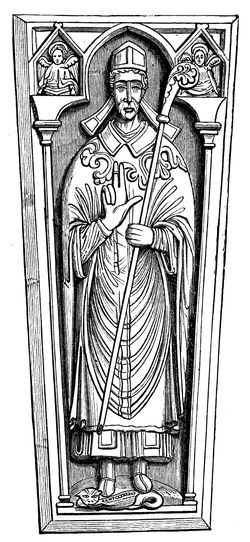
Bishop Marshall of Exeter, died 1206; from his tomb at Exeter, showing a bishop vested for mass.
7. Innocent III. and Stephen Langton. 1206.—The Pope was Innocent III., who at once determined that John must not name bishops whose only merit was that they were good state officials. Being an able man, he soon discovered that Reginald was a fool. He therefore in 1206 sent for a fresh deputation of monks, and, as soon as they arrived in Rome, bade them make a new choice in the name of their monastery. At Innocent's suggestion they chose Stephen Langton, one of the most pious and learned men of the day, whose greatness of character was hardly suspected by anyone at the time.
(p. 178) 8. John's Quarrel with the Church. 1206—1208.—The choice of an archbishop in opposition to the king was undoubtedly something new. The archbishopric of Canterbury was a great national office, and a king as skilful as Henry II. would probably have succeeded in refusing to allow it to be disposed of by the Pope and a small party of monks. John was unworthy to be the champion of any cause whatever. In 1207, after an angry correspondence with Innocent, he drove the monks of Christchurch out of the kingdom. Innocent in reply threatened England with an interdict, and in the spring of 1208 the interdict was published.
9. England under an Interdict. 1208.—An interdict carried with it the suppression of all the sacraments of the Church except those of baptism and extreme unction. Even these were only to be received in private. No words of solemn import were pronounced at the burial of the dead. The churches were all closed, and to the men of that time the closing of the church-doors was like the closing of the very gate of heaven. In the choice of the punishment inflicted there was some sign that the Papacy was hardly as strong in the thirteenth as it had been in the eleventh century. Gregory VII. had smitten down kings by personal excommunication; Innocent III. found it necessary to stir up resistance against the king by inflicting sufferings on the people. Yet there is no evidence of any indignation against the Pope. The clergy rallied almost as one man round Innocent, and songs proceeded from the monasteries which mocked the few official bishops who took John's side as money-makers who cared more for marks than for Mark, and more for lucre than for Luke, whilst John de Grey was branded with the title of 'that beast of Norwich.' John taking no heed of the popular feeling, seized the property of the clergy who obeyed the interdict. Yet he was not without fear lest the barons should join the clergy against him, and to keep them in obedience he compelled them to entrust to him their eldest sons as hostages. One lady to whom this order came replied that she would never give her son to a king who had murdered his nephew.
10. John Excommunicated. 1209.—In 1209 Innocent excommunicated John himself. John cared nothing for being excluded from the services of the Church, but he knew that if the excommunication were published in England few would venture to sit at table with him, or even to speak with him. For some time he kept it out of the country, but it became known that it had been pronounced at Rome, and even his own dependents began to avoid his company. He feared lest the barons whom he had wearied with heavy fines (p. 179) and taxes might turn against him, and he needed large sums of money to defend himself against them. First he turned on the Jews, threw them into prison, and after torturing those who refused to pay, wrung from them 40,000l. The abbots were next summoned before him and forced by threats to pay 100,000l. Besides this the wealthy Cistercians had to pay an additional fine, the amount of which is uncertain, but of which the lowest estimate is 27,000l. In 1211 some of the barons declared against John, but they were driven from the country, and those who remained were harshly treated. Some of their sons who had been taken as hostages were hanged or starved to death.
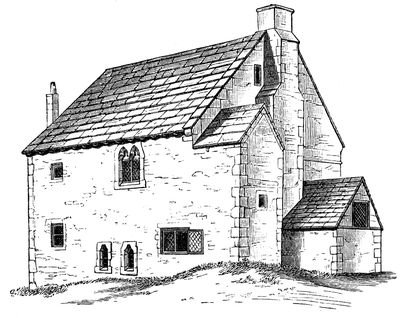
Parsonage house of early thirteenth-century date at West Dean, Sussex.
11. The Pope threatens John with Deposition. 1212—1213.—In 1212 Innocent's patience came to an end, and he announced that he would depose John if he still refused to give way, and would transfer his crown to his old enemy, Philip II. The English clergy and barons were not likely to oppose the change. Philip gathered a great army in France to make good the claim which he expected Innocent to give him. John, indeed, was not entirely without resource. The Emperor Otto IV. was John's sister's son, and as he too had been excommunicated by Innocent he made common cause with John against Philip. Early in 1213 John gathered an army of 60,000 men to resist Philip's landing, and if Otto with his (p. 180) Germans were to attack France from the east, a French army would hardly venture to cross into England, unless indeed it had no serious resistance to fear. John, however, knew well that he could not depend on his own army. Many men in the host hated him bitterly, and he feared deposition, and perhaps death, at the hands of those whom he had summoned to his help.
12. John's Submission. 1213.—Under these circumstances John preferred submission to the Pope to submission to Philip or his own barons. He invited Pandulf, the Pope's representative, to Dover. He swore to admit Stephen Langton as Archbishop of Canterbury, to restore to their rights all those of the clergy or laity whom he had banished, and to give back the money which he had wrongfully exacted. Two days later he knelt before Pandulf and did homage to the Pope for England and Ireland. He was no longer to be an independent king but the Pope's vassal. In token of his vassalage he agreed that he and his successors should pay to Innocent and his successors 1,000 marks a year, each mark being equal to 13s. 4d., or two-thirds of a pound. Innocent had reached his aim as far as John was concerned. In his eyes the Papacy was not merely the guide of the Church, it was an institution for controlling kings and forcing them to act in accordance with the orders of the Popes. It remained to be seen whether the Pope's orders would be always unselfish, and whether the English barons and clergy would submit to them as readily as did this most miserable of English kings.
13. The Resistance of the Barons and Clergy. 1213.—At first John seemed to have gained all that he wanted by submission. Pandulf bade Philip abandon all thought of invading England, and when Philip refused to obey, John's fleet fell upon the French fleet off the coast of Flanders and destroyed it. John even proposed to land with an army in Poitou and to reconquer Normandy and Anjou. His subjects thought that he ought to begin by fulfilling his engagements to them. John having received absolution, summoned four men from each county to meet at St. Albans to assess the damages of the clergy which he had bound himself to make good. The meeting thus summoned was the germ of the future House of Commons. It was not a national political assembly, but it was a national jury gathered together into one place. The exiled barons were recalled, and John now hoped that his vassals would follow him to Poitou. They refused to do so, alleging their poverty and the fact that they had already fulfilled their feudal obligation of forty days' service by attending him at Dover. They had, in (p. 181) fact, no interest in regaining Normandy and Anjou for John. Though the English barons still spoke French, and were proud of their Norman descent, they now thought of themselves as Englishmen and cared for England alone. John turned furiously on the barons, and was only hindered from attacking them by the new Archbishop, who threatened to excommunicate everyone who took arms against them. It was time for all Englishmen who loved order and law to resist John. Stephen Langton put himself at the head of the movement, and at a great assembly at St. Paul's produced a charter of Henry I., by which that king had promised to put an end to the tyranny of the Red King, and declared amidst general applause that it must be renewed by John. It was a memorable scene. Up to this time it had been necessary for the clergy and the people to support the king against the tyranny of the barons. Now the clergy and people offered their support to the barons against the tyranny of the king. John had merely the Pope on his side. Innocent's view of the situation was very simple. John was to obey the Pope, and all John's subjects were to obey John. A Papal legate arrived in England, fixed the sum which John was to pay to the clergy, and refused to listen to the complaints of those who thought themselves defrauded.
14. The Battle of Bouvines. 1214.—In 1214 John succeeded in carrying his barons and their vassals across the sea. With one army he landed at Rochelle, and recovered what had been lost to him on the south of the Loire, but failed to make any permanent conquests to the north of that river. Another army, under John's illegitimate brother, the Earl of Salisbury, joined the Emperor Otto in an attack on Philip from the north. The united force of Germans and English was, however, routed by Philip at Bouvines, in Flanders. "Since I have been reconciled to God," cried John, when he heard the news, "and submitted to the Roman Church, nothing has gone well with me." He made a truce with Philip, and temporarily renounced all claims to the lands to the north of the Loire.

Effigy of a knight in the Temple Church, London, showing armour worn between 1190 and 1225.
15. The Struggle between John and the Barons. 1214—1215. When John returned he called upon all his vassals who had remained at home to pay an exorbitant scutage. In reply they met at Bury St. Edmunds. The charter of Henry I., which had been produced at St. Paul's the year before, was again read, and all present swore to force John to accept it as the rule of his own government. John asked for delay, and attempted to divide his antagonists by offering to the clergy the right of free election to bishoprics and abbacies. Then he turned against the barons. Early (p. 182) in 1215 he brought over a large force of foreign mercenaries, and persuaded the Pope to threaten the barons with excommunication. His attempt was defeated by the constancy of Stephen Langton. The demands of the barons were placed in writing by the archbishop, and, on John's refusal to accept them, an army was formed to force them on the king. The army of God and the Holy Church, as it was called, grew rapidly. London admitted it within its walls, and the accession of London to the cause of the barons was a sign that the traders of England were of one mind with the barons and the clergy. John found that their force was superior to his own, and at Runnimede on June 15, 1215, confirmed with his hand and seal the articles of the barons, with the full intention of breaking his engagement as soon as he should be strong enough to do so.
16. Magna Carta. 1215.—Magna Carta, or the Great Charter, as the articles were called after John confirmed them, was won by a combination between all classes of freemen, and it gave rights to them all.
(a) Its Concessions.—The Church was to be free, its privileges were to be respected, and its right to free elections which John had granted earlier in the year was not to be infringed on. As for the laity, the tenants-in-chief were to pay only fixed reliefs when they entered on their estates. Heirs under age were to be the king's wards, but the king was to treat them fairly, and do (p. 183) nothing to injure their land whilst it was in his hands. The king might continue to find husbands for heiresses and wives for heirs, but only amongst those of their own class. The tenants-in-chief again were bound to pay aids to the king when he needed ransom from imprisonment, or money to enable him to bear the expenses of knighting his eldest son or of marrying his eldest daughter. For all other purposes the king could only demand supplies from his tenants-in-chief with the consent of the Common Council of the realm. As only the tenants-in-chief were concerned, this Common Council was the Great Council of tenants-in-chief, such as had met under the Norman and Angevin kings. A fresh attempt, however, was made to induce the smaller tenants-in-chief to attend, in addition to the bishops, abbots, and barons, by a direction that whilst these were to be summoned personally, the sheriffs should in each county issue a general summons to the smaller tenants-in-chief. Though the sub-tenants had no part in the Common Council of the realm, they were relieved by a direction that they should pay no more aids to their lords than their lords paid to the king, and by a general declaration that all that had been granted to their lords by the king should be allowed by their lords to them. The Londoners and other townsmen had their privileges assured to them; and all freemen were secured against heavy and irregular penalties if they committed an offence.
(b) Its Securities.—Such were the provisions of this truly national act, which Englishmen were for ages engaged in maintaining and developing. The immediate question was how to secure what had been gained. The first thing necessary for this purpose was to make the courts of law the arbitrators between the king and his subjects. In a series of articles it was declared that the sworn testimony of a man's peers should be used whenever fines or penalties were imposed, and this insistence on the employment of the jury system as it then existed was emphasised by the strong words to which John placed his seal: "No freeman may be taken, or imprisoned, or disseised, or outlawed, or banished, or in any way destroyed, nor will we go against him, or send against him, except by the lawful judgment of his peers, or by the law of the land. To none will we sell or deny or delay right or justice." It was a good security if it could be maintained, but it would avail nothing against a king who was willing and able to use force to set up the old tyranny once more. In the first place John must dismiss all his foreign mercenaries. So little, however, was John trusted that it was thought necessary in the second place to establish (p. 184) a body of twenty-five—twenty-four barons and the Mayor of London—which was to guard against any attempt of the king to break his word. If John infringed upon any of the articles of the Charter the twenty-five, with the assistance of the whole community of the kingdom, had the right of distraining upon the king's lands till enough was obtained to make up the loss to the person who had suffered wrong. In other words, there was to be a permanent organisation for making war upon the king.
17. War between John and the Barons. 1215—1216.—John waited for the moment of vengeance. Not only did he refuse to send his mercenaries away, but he sent to the Continent for large reinforcements. Pope Innocent declared the barons to be wicked rebels, and released John from his oath to the Great Charter. War soon broke out. John's mercenaries were too strong for the barons, and in the beginning of 1216 almost all England with the exception of London had been overrun by them. Though the Pope laid London under an interdict, neither the citizens nor the barons paid any attention to it. They sent to Louis, the eldest son of Philip of France, to invite him to come and be their king in John's stead. Louis was married to John's niece, and might thus be counted as a member of the English royal family. The time had not yet come when a man who spoke French was regarded as quite a foreigner amongst the English barons. On May 21, 1216, Louis landed with an army in the Isle of Thanet.
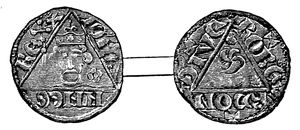
A silver penny of John, struck at Dublin.
18. Conflict between Louis and John. 1216.—John, in spite of his success, found himself without sufficient money to pay his mercenaries, and he therefore retreated to Winchester. Louis entered London in triumph, and afterwards drove John out of Winchester. Innocent indeed excommunicated Louis, but no one took heed of the excommunication. Yet John was not without support. The trading towns of the East, who probably regarded Louis as a foreigner, took his part, and many of his old officials, to whom the victory of the barons seemed likely to bring back the anarchy of (p. 185) Stephen's time, clung to him. One of these, a high-spirited and strong-willed man, Hubert de Burgh, held out for John in Dover Castle. John kept the field and even won some successes. As he was crossing the Wash the tide rose rapidly and swept away his baggage. He himself escaped with difficulty. Worn out in mind and body, he was carried on a litter to Newark, where on October 19, 1216, he died.[Back to Contents]
LEADING DATES
1. Henry III. and Louis. 1216—1217.—Henry III., the eldest son of John, was but nine years old at his father's death. Never before had it been useful for England that the king should be a child. As Henry had oppressed no one and had broken no oaths, those who dared not trust the father could rally to the son. The boy had two guardians, one of whom was Gualo, the legate of Pope Honorius III., a man gentler and less ambitious than Innocent III., whom he had just succeeded; the other was William the Marshal, Earl of Pembroke, who had been constant to John, not because he loved his evil deeds, but because, like many of the older officials, he feared that the victory of the barons would be followed by anarchy. These two had on their side the growing feeling on behalf of English nationality; whereas, as long as John lived, his opponents had argued that it was better to have a foreign king like Louis than to have a king like John, who tyrannised over the land by the help of foreign mercenaries. Henry's followers daily increased, and in 1217 Louis was defeated by the Marshal at Lincoln. Later in the year Hubert de Burgh, the Justiciar, sent out a fleet which defeated a French fleet off Dover. Louis then submitted and left the kingdom.

Effigy of Henry III. from his tomb in Westminster Abbey.
2. The Renewal of the Great Charter. 1216—1217.—The (p. 186) principles on which William the Marshal intended to govern were signified by the changes made in the Great Charter when it was renewed on the king's accession in 1216, and again on Louis's expulsion in 1217. Most of the clauses binding the king to avoid oppression were allowed to stand; but those which prohibited the raising of new taxation without the authority of the Great Council, and the stipulation which established a body of twenty-five to distrain on John's property in case of the breach of the Charter, were omitted. Probably it was thought that there was less danger from Henry than there had been from John; but the acceptance of the compromise was mainly due to the feeling that, whilst it was desirable that the king should govern with moderation, it would be a dangerous experiment to put the power to control him in the hands of the barons, who might use it for their own advantage rather than for the advantage of the nation. The whole history of England for many years was to turn on the difficulty of weakening the power of a bad king without producing anarchy.

Effigy of William Longespée, Earl of Salisbury (died 1227); from his tomb in Salisbury Cathedral: showing armour worn from about 1225 to 1250.
3. Administration of Hubert de Burgh. 1219-1232.—In 1219 William the Marshal died. For some years the government was mainly in the hands of Hubert de Burgh, who strenuously maintained the authority of the king over the barons, whilst at the same time he set himself distinctly at (p. 187) the head of the growing national feeling against the admission of foreigners to wealth and high position in England. As a result of the disturbances of John's reign many of the barons and of the leaders of the mercenaries had either fortified their own castles or had taken possession of those which belonged to the king. In 1220 Hubert demanded the surrender of these castles as Henry II. had done in the beginning of his reign. In 1221 the Earl of Aumale was forced to surrender his castles, and in 1224 Faukes de Breauté, one of the leaders of John's mercenaries who had received broad lands in England, was reduced to submission and was banished on his refusal to give up his great castle at Bedford. As long as Hubert ruled, England was to belong to the English. His power was endangered from the very quarter from which it ought to have received most support. In 1227 Henry declared himself of age. He was weak and untrustworthy, always ready to give his confidence to unworthy favourites. His present favourite was Peter des Roches, Bishop of Winchester. The bishop was a greedy and unscrupulous Poitevin, who regarded the king's favour as a means of enriching himself and his Poitevin relatives and friends. Henry was always short of money, and was persuaded by Peter that it was (p. 188) Hubert's fault. In 1232 Hubert was charged with a whole string of crimes and dismissed from office.
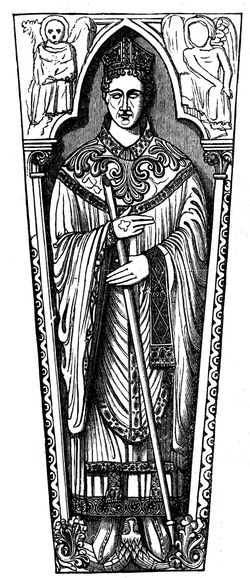
Simon, Bishop of Exeter (died 1223); from his tomb at Exeter, showing rich mass-vestments.
4. Administration of Peter des Roches. 1232-1234.—Henry was now entirely under the power of Peter des Roches. In 1233 he ordered Hubert to be seized. Though Hubert took sanctuary in a chapel, he was dragged out, and a smith was ordered to put him in fetters. The man refused to obey. "Is not this," he said, "that most faithful and high-souled Hubert who has so often saved England from the ravages of foreigners, and has given England back to the English?" Hubert was thrown into the Tower, and was never again employed in any office of state. As long as Peter des Roches ruled the king it would be hard to keep England for the English. Poitevins and Bretons flocked over from the Continent, and were appointed to all the influential posts which fell vacant. The barons had the national feeling behind them when they raised complaints against this policy. Their leader was Earl Richard the Marshal, the son of the Earl William who had governed England after the death of John. Without even the semblance of trial Henry declared Earl Richard and his chief supporters guilty of treason. At a Great Council held at Westminster some of the barons remonstrated. Peter des Roches replied saucily that there were no peers in England as in France, meaning that in England the barons had no rights against the king. Both Henry and Peter could, however, use their tongues better than their swords. They failed miserably in an attempt to overcome the men whom they had unjustly accused, till in 1234 Peter stirred up some of the English lords in Ireland to seize on Earl Richard's possessions there. The Earl hurried over to defend his estates. Amongst (p. 189) his followers were many of Peter's confidants, who, treacherously deserting him in the first battle, left him to be slain by his enemies. Peter at least gained nothing by his villainy. Edmund Rich, a saintly man, who had recently become Archbishop of Canterbury, protested against his misdeeds. All England was behind the Archbishop, and Henry was compelled to dismiss Peter and then to welcome back Peter's enemies and to restore them to their rights. It was of no slight importance that a man so devoted and unselfish as Edmund Rich had put himself at the head of the movement. It was a good thing, no doubt, to maintain that wealth should be in the hands (p. 190) rather of natives than of foreigners; but after all every contention for material wealth alone is of the earth, earthy. No object which appeals exclusively to the selfish instincts can, in the long run, be worth contending for. Edmund Rich's accession to the national cause was a guarantee that the claims of righteousness and mercy in the management of the national government would not altogether be forgotten, and fortunately there were new forces actively at work in the same direction. The friars, the followers of St. Francis and St. Dominic, had made good their footing in England.
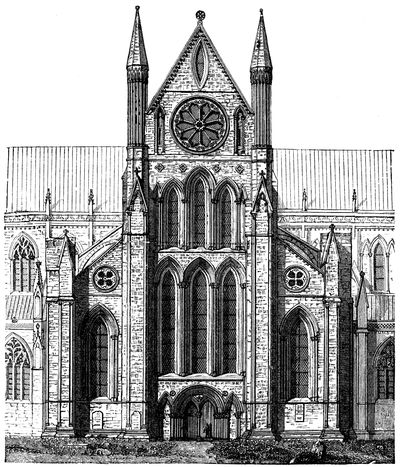
Beverley Minster, Yorkshire—the south transept; built about 1220-1230.
5. Francis of Assisi.—Francis, the son of a merchant in the Tuscan town of Assisi, threw aside the vanities of youth after a serious illness. He was wedded, he declared, to Poverty as his bride. He clothed himself in rags. When his father sent him with a horseload of goods to a neighbouring market, he sold both horse and goods, and offered the money to build a church. His father was enraged, and summoned him before the bishop that he might be deprived of the right of inheriting that which he knew not how to use. Francis stripped himself naked, renouncing even his clothes as his father's property. "I have now," he said, "but one Father, He that is in heaven." He wandered about as a beggar, subsisting on alms and devoting himself to the care of the sick and afflicted. In his heroism of self-denial he chose out the lepers, covered as they were with foul and infectious sores, as the main objects of his tending. Before long he gathered together a brotherhood of men like-minded with himself, who left all, to give not alms but themselves to the help of the poor and sorrowful of Christ's flock. In 1209 Innocent III. constituted them into a new order, not of monks but of Friars (Fratres or brethren). The special title of the new order, which after ages have known by the name of Franciscans, was that of Minorites (Fratres Minores), or the lesser brethren, because Francis in his humility declared them to be less than the least of Christ's servants. Like Francis, they were to be mendicants, begging their food from day to day. Having nothing themselves, they would be the better able to touch the hearts of those who had nothing. Yet it was not so much the humility of Francis as his loving heart which distinguished him amongst men. Not only all human beings but all created things were dear to him. Once he is said to have preached to birds. He called the sun and the wind his brethren, the moon and the water his sisters. When he died the last feeble words which he breathed were, "Welcome, sister Death!"
6. St. Dominic.—Another order arose about the same time in (p. 191) Spain. Dominic, a Spaniard, was appalled, not by the misery, but by the ignorance of mankind. The order which he instituted was to be called that of the Friars Preachers, though they have in later times usually been known as Dominicans. Like the Franciscans they were to be Friars, or brothers, because all teaching is vain, as much as all charitable acts are vain, unless brotherly kindness be at the root. Like the Franciscans they were to be mendicants, because so only could the world be convinced that they sought not their own good, but to win souls to Christ.
7. The Coming of the Friars. 1220-1224.—In 1220 the first Dominicans arrived in England. Four years later, in 1224, the first Franciscans followed them. Of the work of the early Dominicans in England little is known. They preached and taught, appealing to those whose intelligence was keen enough to appreciate the value of argument. The Franciscans had a different work before them. The misery of the dwellers on the outskirts of English towns was appalling. The townsmen had made provision for keeping good order amongst all who shared in the liberties,[13] or, as we should say, in the privileges of the town; but they made no provision for good order amongst the crowds who flocked to the town to pick up a scanty living as best they might. These poor wretches had to dwell in miserable hovels outside the walls by the side of fetid ditches into which the filth of the town was poured. Disease and starvation thinned their numbers. No man cared for their bodies or their souls. The priests who served in the churches within the town passed them by, nor had they any place in the charities with which the brethren of the gilds assuaged the misfortunes of their own members. It was amongst these that the Franciscans lived and laboured, sharing in their misery and their diseases, counting their lives well spent if they could bring comfort to a single human soul.
8. Monks and Friars.—The work of the friars was a new phase in the history of the Church. The monks had made it their object to save their own souls; the friars made it their object to save the bodies and souls of others. The friars, like the monks, taught by the example of self-denial; but the friars added active well-doing to the passive virtue of restraint. Such examples could not fail to be attended with consequences of which those who set (p. 192) them never dreamed, all the more because the two new orders worked harmoniously towards a common end. The Dominicans quickened the brain whilst the Franciscans touched the heart, and the whole nation was the better in consequence.
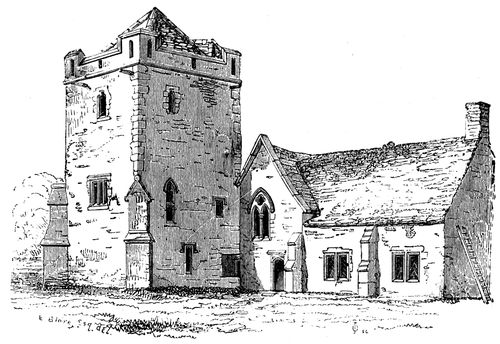
Longthorpe Manor House, Northampton;
built about 1235.
Some of the larger windows are later.
9. The King's Marriage. 1236.—In 1236 Henry married Eleanor, the daughter of the Count of Provence. The immediate consequence was the arrival of her four uncles with a stream of Provençals in their train. Amongst these uncles William, Bishop-elect of Valence, took the lead. Henry submitted his weak mind entirely to him, and distributed rank and wealth to the Provençals with as much profusion as he had distributed them to the Poitevins in the days of Peter des Roches. The barons, led now by the king's brother, Richard of Cornwall, remonstrated when they met in the Great Council, which was gradually acquiring the right of granting fresh taxes, though all reference to that right was dropped out of all editions of the Great Charter issued in the reign of Henry. For some time they granted the money which Henry continually asked for, coupling, however, with their grant the demand that Henry should confirm the Charter. The king never refused to confirm it. He had no difficulty in making promises, but he never troubled himself to keep those which he had made.
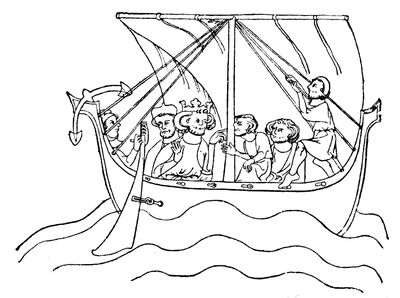
A ship in the reign of Henry III.
(p. 193) 10. The Early Career of Simon de Montfort. 1231—1243.—Strangely enough, Simon de Montfort, the man who was to be the chief opponent of Henry and his foreign favourites, was himself a foreigner. He was sprung from a family established in Normandy, and his father, the elder Simon de Montfort, had been the leader of a body of Crusaders from the north of France, who had poured over the south to crush a vast body of heretics, known by the name of Albigeois, from Albi, a town in which they swarmed. The elder Simon had been strict in his orthodoxy and unsparing in his cruelty to all who were unorthodox. From him the younger Simon inherited his unswerving religious zeal and his constancy of purpose. There was the same stern resolution in both, but in the younger man these qualities were coupled with a statesmanlike instinct, which was wanting to the father. Norman as he was, he had a claim to the earldom of Leicester through his grandmother, and in 1231 this claim was acknowledged by Henry. For some time Simon continued to live abroad, but in 1236 he returned to England to be present at the king's marriage. He was at once taken into favour, and in 1238 married the king's sister, Eleanor. His marriage was received by the barons and the people with a burst of indignation. It was one more instance, it was said, of Henry's preference for foreigners over his own countrymen. In 1239 Henry turned upon his brother-in-law, brought heavy charges against him, and drove him from his court. In 1240 Simon was outwardly reconciled to Henry, but he was never again able to repose confidence in one so fickle. In 1242 Henry resolved to undertake an expedition to France to (p. 194) recover Poitou, which had been gradually slipping out of his hands. At a Great Council held before he sailed, the barons, who had no sympathy with any attempt to recover lost possessions in France, not only rated him soundly for his folly, but, for the first time, absolutely refused to make him a grant of money. Simon told him to his face that the Frenchman was no lamb to be easily subdued. Simon's words proved true. Henry sailed for France, but in 1243 he surrendered all claims to Poitou, and returned discomfited. If he did not bring home victory he brought with him a new crowd of Poitevins, who were connected with his mother's second husband. All of them expected to receive advancement in England, and they seldom expected it in vain.
11. Papal Exactions. 1237—1243.—Disgusted as were the English landowners by the preference shown by the king to foreigners, the English clergy were no less disgusted by the exactions of the Pope. The claim of Innocent III. to regulate the proceedings of kings had been handed down to his successors and made them jealous of any ruler too powerful to be controlled. The Emperor Frederick II. had not only succeeded to the government of Germany, and to some influence over the north of Italy, but had inherited Naples and Sicily from his mother. The Pope thus found himself, as it were, between two fires. There was constant bickering between Frederick and Gregory IX., a fiery old man who became Pope in 1227, and in 1238 Gregory excommunicated Frederick, and called on all Europe to assist him against the man whom he stigmatised as the enemy of God and the Church. As the king of England was his vassal in consequence of John's surrender, he looked to him for aid more than to others, especially as England, enjoying internal peace more than other nations, was regarded as especially wealthy. In 1237, the year before Frederick's excommunication, Gregory sent Cardinal Otho as his legate to demand money from the English clergy. The clergy found a leader in Robert Grossetête, Bishop of Lincoln, a wise and practical reformer of clerical disorders; but though they grumbled, they could get no protection from the king, and were forced to pay. Otho left England in 1241, carrying immense sums of money with him, and the promise of the king to present three hundred Italian priests to English benefices before he presented a single Englishman. In 1243 Gregory IX. was succeeded by Innocent IV., who was even more grasping than his predecessor.
12. A Weak Parliamentary Opposition. 1244.—Against these evils the Great Council strove in vain to make head. It was now (p. 195) beginning to be known as Parliament, though no alteration was yet made in its composition. In 1244 clergy and barons joined in remonstrating with the king, and some of them even talked about restraining his power by the establishment of a Justiciar and Chancellor, together with four councillors, all six to be elected by the whole of the baronage. Without the consent of the Chancellor thus chosen no administrative act could be done. The scheme was a distinct advance upon that of the barons who, in 1215, forced the Great Charter upon John. The barons had then proposed to leave the appointment of executive officials to the king, and to appoint a committee of twenty-five, who were to have nothing to do with the government of the country, but were to compel the king by force to keep the promises which he had made. In 1244 they proposed to appoint the executive officials themselves. It was the beginning of a series of changes which ultimately led to that with which we are now familiar, the appointment of ministers responsible to Parliament. It was too great an innovation to be accepted at once, especially as it was demanded by the barons alone. The clergy, who were still afraid of the disorders which might ensue if power were lodged in the hands of the barons, refused to support it, and for a time it fell to the ground. At the same time Richard of Cornwall abandoned the baronial party. He had lately married the queen's sister, which may have drawn him over to the king; but it is also probable that his own position as the king's brother made him unwilling to consent to a scheme which would practically transfer the government from the king to the barons. On the other hand Earl Simon was found on the side of the barons. He held his earldom by inheritance from his English grandmother, and the barons were willing to forgive his descent from a foreign grandfather when they found him prepared to share their policy.
13. Growing Discontent. 1244—1254.—The clergy had to learn by bitter experience that it was only by a close alliance with the barons that they could preserve themselves from wrong. In 1244 a new envoy from the Pope, Master Martin, travelled over England wringing money from the clergy. Though he was driven out of the country in 1245, the Papal exactions did not cease. The Pope, moreover, continued to present his own nominees to English benefices, and in 1252 Grossetête complained that these nominees drew three times as much income from England as flowed into the royal exchequer. For a time even Henry made complaints, but in 1254 Innocent IV. won him over to his side. Frederick II. had died in 1250, and his illegitimate son, Manfred, a tried warrior and (p. 196) an able ruler, had succeeded him as king of Sicily and Naples. Innocent could not bear that that crown should be worn by the son of the man whom he had hated bitterly, and offered it to Edmund, the second son of Henry III. Henry lept at the offer, hoping that England would bear the expense of the undertaking. England was, however, in no mood to comply. Henry had been squandering money for years. He had recently employed Earl Simon in Gascony, where Simon had put down the resistance of the nobles with a heavy hand. The Gascons complained to Henry, and Henry quarrelled with Simon more bitterly than before. In 1254 Henry crossed the sea to restore order in person. To meet his expenses he borrowed a vast sum of money, and this loan, which he expected England to meet, was the only result of the expedition.
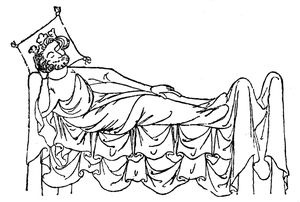
A bed in the reign of Henry III.
14. The Knights of the Shire in Parliament. 1254.—During the king's absence the queen and Earl Richard, who were left as regents, and who had to collect money as best they might, gathered a Great Council, to which, for the first time, representative knights, four from each shire, were summoned. They were merely called on to report what amount of aid their constituents were willing to give, and the regents were doubtless little aware of the importance of the step which they were taking. It was only, to all appearances, an adaptation of the summons calling on the united jury to meet at St. Albans to assess the damages of the clergy in the reign of John. It might seem as if the regents had only summoned a united jury to give evidence of their constituents' readiness to grant certain sums of money. In reality the new scheme was sure to take root, because it held out a hope of getting rid of a constitutional difficulty which had hitherto proved insoluble—the difficulty, that is to say, of weakening the king's power to do evil without establishing baronial anarchy in its place. It was certain that the representatives of the freeholders in the counties would not use their influence for the destruction of order.
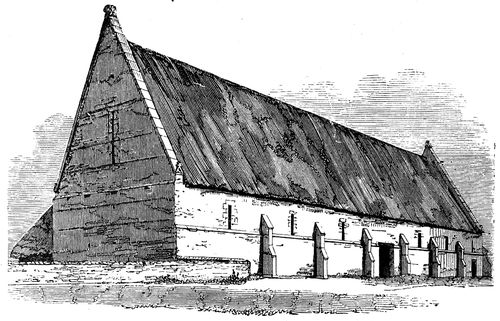
Barn of thirteenth-century date at Raunds, Northamptonshire.
15. Fresh Exactions. 1254-1257.—At the end of 1254 Henry returned to England. In 1255 a new Pope, Alexander IV., confirmed (p. 197) his predecessor's grant of the kingdom of Sicily to Edmund, on condition that Henry should give a large sum of money for the expenses of a war against Manfred. To make it easy for Henry to find the money, Alexander gave him a tenth of the revenues of the English clergy, on the plea that the clergy had always borne their share of the expenses of a crusade, and that to fight for the Pope against Manfred was equivalent to a crusade. Immense sums were wrung from the clergy, who were powerless to resist Pope and king combined. Their indignation was the greater, not only because they knew that religion was not at stake in the Pope's effort to secure his political power in Italy, but also because the Papal court was known to be hopelessly corrupt, it being a matter of common talk that all things were for sale at Rome. The clergy indeed were less than ever in a condition to resist the king without support. Grossetête was dead, and the Archbishop of Canterbury, the queen's uncle, Boniface of Savoy, whose duty it was to maintain the rights of the Church, was a man who cared nothing for England except on account of the money he drew from it. Other bishoprics as well were held by foreigners. The result of the weakness of the clergy was that they were now ready to unite with the barons, whom they had deserted in 1244 (see p. 195). Henry's misgovernment, in fact, had roused all classes against him, as the townsmen and the smaller landowners had been even worse treated than the greater (p. 198) barons. In 1257 one obstacle to reform was removed. Richard of Cornwall, the king's brother, who was formidable through his wealth and the numbers of his vassals, had for some time taken part against them. In 1257 he was chosen king of the Romans by the German electors, an election which would make him Emperor as soon as he had been crowned by the Pope. He at once left England to seek his fortunes in Germany, where he was well received as long as he had money to reward his followers, but was deserted as soon as his purse was empty.
16. The Provisions of Oxford. 1258.—The crisis in England came in 1258, whilst Richard was still abroad. Though thousands were dying of starvation in consequence of a bad harvest, Henry demanded for the Pope the monstrous sum of one-third of the revenue of all England. Then the storm burst. At a Parliament at Westminster the barons appeared in arms and demanded, first, the expulsion of all foreigners, and, secondly, the appointment of a committee of twenty-four—twelve from the king's party and twelve from that of the barons—to reform the realm. The king unwillingly consented, and the committee was appointed. Later in the year Parliament met again at Oxford to receive the report of the new committee. The Mad Parliament, as it was afterwards called in derision, was resolved to make good its claims. The scheme of reinforcing Parliament by the election of knights of the shire had indeed been suffered to fall into disuse since its introduction in 1254, yet every tenant-in-chief had of old the right of attending, and though the lesser tenants-in-chief had hitherto seldom or never exercised that right, they now trooped in arms to Oxford to support the barons. To this unwonted gathering the committee produced a set of proposals which have gone by the name of the Provisions of Oxford. There was to be a council of fifteen, without the advice of which the king could do no act, and in this council the baronial party had a majority. The offices of state were filled in accordance with the wishes of the twenty-four, and the barons thus entered into possession of the authority which had hitherto been the king's. The danger of the king's tyranny was averted, but it remained to be seen whether a greater tyranny would not be erected in its stead. One clause of the Provisions of Oxford was not reassuring. The old Parliaments, which every tenant-in-chief had at least the customary right of attending, were no longer to exist. Their place was to be taken by a body of twelve, to be chosen by the barons, which was to meet three times a year to discuss public affairs with the council of fifteen.
(p. 199) 17. The Expulsion of the Foreigners. 1258.—The first difficulty of the new government was to compel the foreigners to surrender their castles. William de Valence, the king's half-brother, headed the resistance of the foreigners. The barons swore that no danger should keep them back till they had cleared the land of foreigners and had obtained the good laws which they needed. Earl Simon set the example by surrendering his own castles at Kenilworth and Odiham. The national feeling was with Simon and the barons, and at last the foreigners were driven across the sea. For a time all went well. The committee of twenty-four continued its work and produced a further series of reforms. All persons in authority were called on to swear to be faithful to the Provisions of Oxford, and the king and his eldest son, Edward, complied with the demand.
18. Edward and the Barons. 1259.—Early in 1259 Richard came back to England, and gave satisfaction by swearing to the Provisions. Before long signs of danger appeared. The placing complete authority in the hands of the barons was not likely to be long popular, and Earl Simon was known to be in favour of a wider and more popular scheme. Hugh Bigod, who had been named Justiciar by the barons, gave offence by the way in which he exercised his office. Simon was hated by the king, and he knew that many of the barons did not love him. The sub-tenants—the Knights Bachelors of England as they called themselves—doubting his power to protect them, complained, not to Simon, but to Edward, the eldest son of the King, that the barons had obtained the redress of their own grievances, but had done nothing for the rest of the community. Edward was now a young man of twenty, hot-tempered and impatient of control, but keen-sighted enough to know, what his father had never known, that the royal power would be increased if it could establish itself in the affections of the classes whose interests were antagonistic to those of the barons. He therefore declared that he had sworn to the Provisions, and would keep his oath; but that if the barons did not fulfil their own promises, he would join the community in compelling them to do so. The warning was effectual, and the barons issued orders for the redress of the grievances of those who had found so high a patron.
19. The Breach amongst the Barons. 1259—1261.—Simon had no wish to be involved in a purely baronial policy. He had already fallen out with Richard de Clare, Earl of Gloucester, the leader of the barons who had resisted the full execution of the promises made at Oxford in the interest of the people at large. (p. 200) "With such fickle and faithless men," said Simon to him, "I care not to have ought to do. The things we are treating of now we have sworn to carry out. And thou, Sir Earl, the higher thou art the more art thou bound to keep such statutes as are wholesome for the land." The king fomented the rising quarrel, and in 1261 announced that the Pope had declared the Provisions to be null and void, and had released him from his oath to observe them.
20. Royalist Reaction and Civil War. 1261.—Henry now ruled again in his own fashion. Even the Earl of Gloucester discovered that if the king was to be resisted it must be by an appeal to a body of men more numerous than the barons alone. He joined Simon in inviting a Parliament to meet, at which three knights should appear for each county, thus throwing over the unfortunate narrowing of Parliament to a baronial committee of twelve, which had been the worst blot on the Provisions of Oxford. In the summer of 1262 the Earl of Gloucester died, and was succeeded by his son, Earl Gilbert, one of Simon's warmest personal admirers. In 1263 Simon, now the acknowledged head of the barons and of the nation, finding that the king could not be brought to keep the Provisions, took arms against him. He was a master in the art of war, and gained one fortified post after another. Henry, being, as usual, short of money, called on the Londoners for a loan. On their refusal Edward seized a sum of money which belonged to them, and so exasperated them that, on the queen's passing under London Bridge, the citizens reviled her and pelted her with stones. The war was carried on with doubtful results, and by the end of the year both parties agreed to submit to the arbitration of the king of France.
21. The Mise of Amiens. 1264.—The king of France Louis IX., afterwards known as St. Louis, was the justest and most unselfish of men. In 1259 he had surrendered to Henry a considerable amount of territory in France, which Henry had been unable to reconquer for himself; and was well satisfied to obtain from Henry in return a formal renunciation of the remainder of the lands which Philip II. had taken from John. Yet, well-intentioned as Louis was, he had no knowledge of England, and in France, where the feudal nobility was still excessively tyrannical, justice was only to be obtained by the maintenance of a strong royal power. He therefore thought that what was good for France was also good for England, and in the beginning of 1264 he relieved Henry from all the restrictions which his subjects had sought to place upon (p. 201) him. The decision thus taken was known as the Mise, or settlement, of Amiens, from the place at which it was issued.
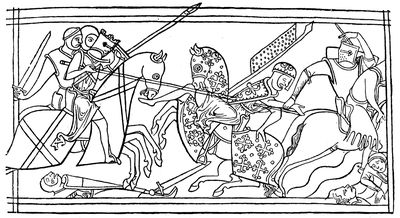
A fight between armed and mounted knights of the time of Henry III.
22. The Battle of Lewes. 1264.—The Mise of Amiens required an unconditional surrender of England to the king. The Londoners and the trading towns were the first to reject it. Simon put himself at the head of a united army of barons and citizens. In the early morning of May 14 he caught the king's army half asleep at Lewes. Edward charged at the Londoners, against whom he bore a grudge since they had ill-treated his mother, and cleared them off the field with enormous slaughter. When he returned the battle was lost. Henry himself was captured, and Richard, king of the Romans, was found hiding in a windmill. Edward, in spite of his success, had to give himself up as a prisoner.
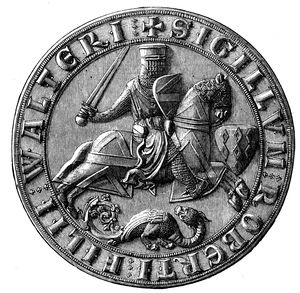
Seal of Robert Fitzwalter, showing a mounted knight in complete mail armour. Date, about 1265.

Effigy of a knight at Gosperton, showing armour worn from about 1250 to 1300. Date, about 1270.
23. Earl Simon's Government. 1264-1265.—Simon followed up his victory by an agreement called the Mise of Lewes, according to which all matters of dispute were again to be referred to arbitration. In the meantime there were to be three Electors, Earl Simon himself, the Earl of Gloucester, and the Bishop of Chichester. These were to elect nine councillors, who were to name the ministers of state. To keep these councillors within bounds a Parliament was called, in which with the barons, bishops, and abbots there sat not only chosen knights for each shire, but also for the first time two representatives of certain towns. This Parliament met in 1265. It was not, indeed, a full parliament, as only Simon's partisans amongst the barons were summoned, (p. 202) but it was the fullest representation of England as a whole which had yet met, and not a merely baronial committee like that proposed in 1258. The views of Simon were clearly indicated in an argumentative Latin poem written after the battle of Lewes by one of his supporters. In this poem the king's claim to do as he likes with his own is met by a demand that he shall rule according to law. Such a demand was made by others than the poet. "The king," a great lawyer of the day had said, "is not subject to any man, but to God and the law." The difficulty still remained of ascertaining what the law was. The poet did not, indeed, anticipate modern theories, and hold that the law was what the representatives of the people made it to be; but he held that the law consisted in the old customs, and that the people themselves must be appealed to as the witnesses of what those old customs were. "Therefore," he wrote, "let the community of the kingdom advise, and let it be known what the generality thinks, to whom their own laws are best known. Nor are all those of the country so ignorant that they do not know better than strangers the customs of their own kingdom which have been handed down to them by (p. 203) their ancestors."[14] The poet, in short, regarded the Parliament as a national jury, whose duty it was to give evidence on the laws and customs of the nation, in the same way that a local jury gave evidence on local matters.
24. The Battle of Evesham. 1265.—Simon's constitution was premature. Men wanted a patriotic king who could lead the nation instead of one who, like Henry, used it for his own ends. The new rulers were sure to quarrel with one another. If Simon was still Simon the Righteous, his sons acted tyrannically. The barons began again to distrust Simon himself, and the young Earl of Gloucester, like his father before him, put himself at the head of the dissatisfied barons, and went over to the king. Edward escaped from confinement, by urging his keepers to ride races with one another, and then galloping off when their horses were too tired to follow him. Edward and Gloucester combined forces, and, falling on Earl Simon at Evesham, defeated him utterly. Simon was slain in the fight and his body barbarously mutilated; but his memory was treasured, and he was counted as a saint by the people for whom he had worked. Verses have been preserved in which he is compared to (p. 204) Archbishop Thomas, who had given himself as a sacrifice for the Church, as Simon had given himself as a sacrifice for the nation.
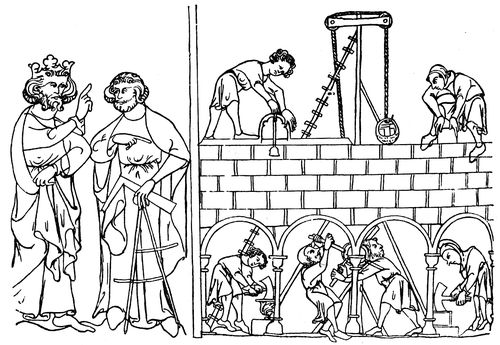
Building operations in the reign of Henry III., with the king giving directions to the architect.
25. The Last Years of Henry III. 1265—1272.—The storm which had been raised was some time in calming down. Some of Earl Simon's followers continued to hold out against the king. When at last they submitted, they were treated leniently, and in 1267, at a Parliament at Marlborough, a statute was enacted embodying most of the demands for the redress of grievances made by the earlier reformers. The kingdom settled down in peace, because Henry now allowed Edward to be the real head of the government. Edward, in short, carried on Earl Simon's work in ruling justly, with the advantage of being raised above jealousies by his position as heir to the throne. In 1270 England was so peaceful that Edward could embark on a crusade. At Acre he very nearly fell a victim to a fanatic belonging to a body which counted assassination a religious duty. His wife, Eleanor of Castile, who was tenderly attached to him, had to be led out of his tent, lest her bitter grief should distract him during an operation which the surgeons held to be necessary. In 1272 Henry III. died, and (p. 206) his son, though in a distant land, was quietly accepted as his successor.
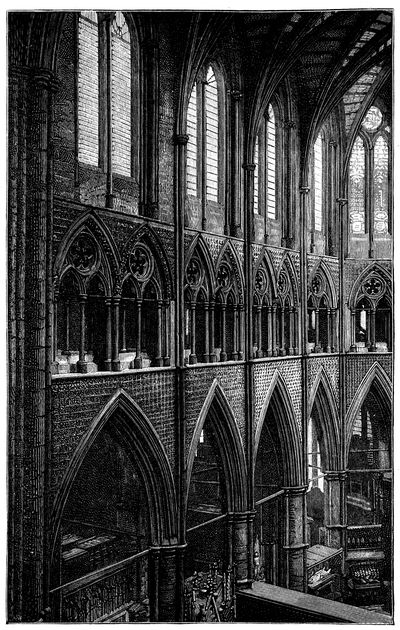
East end of Westminster Abbey Church: begun by Henry III. in 1245.
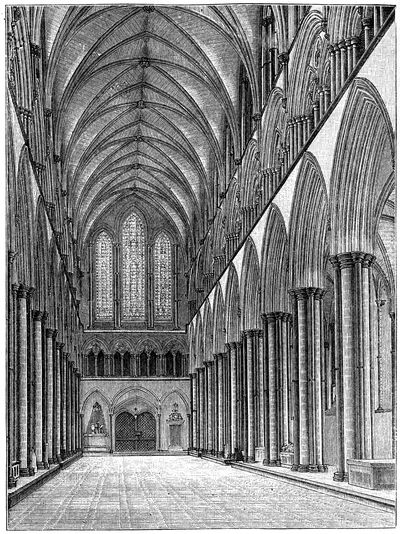
Nave of Salisbury Cathedral Church, looking west. Date, between 1240 and 1250.
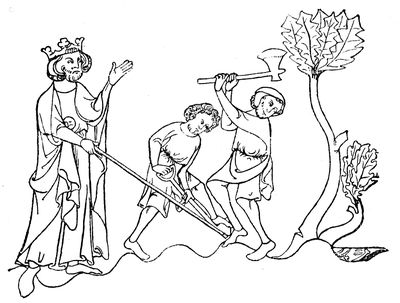
A king and labourers in the reign of Henry III.
26. General Progress of the Country.—In spite of the turmoils of Henry's reign the country made progress in many ways. Men busied themselves with replacing the old round-arched churches by (p. 207) large and more beautiful ones, in that Early English style of which Lincoln Cathedral was the first example on a large scale. In 1220 it was followed by Beverley Minster (see p. 189). The nave of Salisbury Cathedral was begun in 1240 (see p. 206), and a new Westminster Abbey grew piecemeal under Henry's own supervision during the greater part of the reign (see p. 205). Mental activity accompanied material activity. At Oxford there were reckoned 15,000 scholars. Most remarkable was the new departure taken by Walter de Merton, Henry's Chancellor. Hitherto each scholar had shifted for himself, lived where he could, and been subjected to little or no discipline. In founding Merton College, the first college which existed in the University, Merton proposed not only to erect a building in which the lads who studied might be boarded and placed under supervision, but to train them with a view to learning for its own sake, and not to prepare them for the priesthood. The eagerness to learn things difficult was accompanied by a desire to increase popular knowledge. For the first time since the Chronicle came to an end, which was soon after the accession of Henry II., a book—Layamon's Brut—appeared in the reign of John in the English language, and one at least of the songs which witness to the interest of the people in the great struggle with Henry III. was also written in the same language. Yet the great achievement of the fifty-six years of Henry's reign was—to use the language of the smith who refused to put fetters on the limbs of Hubert de Burgh (see p. 188)—the giving of England back to the English. (p. 208) In 1216 it was possible for Englishmen to prefer a French-born Louis as their king to an Angevin John. In 1272 England was indeed divided by class prejudices and conflicting interests, but it was nationally one. The greatest grievance suffered from Henry III. was his preference of foreigners over his own countrymen. In resistance to foreigners Englishmen had been welded together into a nation, and in their new king Edward they found a leader who would not only prove a wise and thoughtful ruler, but who was every inch an Englishman.
Genealogy of John's Sons and Grandsons.
| John, 1199-1216 | |||||||||||||||
| Henry III. 1216-1272 |
= | Eleanor of Provence | Richard, Earl of Cornwall and King of the Romans |
Eleanor | = | Simon de Montfort | |||||||||
| Edward I. 1272-1307 |
Edmund, titular King of Sicily[Back to Contents] | ||||||||||||||
LEADING DATES
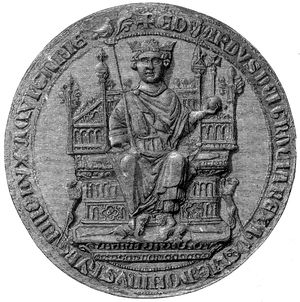
Great Seal of Edward I.
1. The First Years of Edward I. 1272—1279.—Edward I., though he inherited the crown in 1272, did not return to England till 1274, being able to move in a leisurely fashion across Europe without fear of disturbances at home. He fully accepted those articles of John's (p. 209) Great Charter which had been set aside at the beginning of the reign of Henry III., and which required that the king should only take scutages and aids with the consent of the Great Council or Parliament. The further requirement of the barons that they should name the ministers of the crown, was allowed to fall asleep. Edward was a capable ruler, and knew how to appoint better ministers than the barons were likely to choose for him. It was Edward's peculiar merit that he stood forward not only as a ruler but as a legislator. He succeeded in passing one law after another, because he thoroughly understood that useful legislation is only possible when the legislator on the one hand has an intelligent perception of the remedies needed to meet existing evils, and on the other hand is willing to content himself with such remedies as those who are to be benefited by them are (p. 210) ready to accept. The first condition was fulfilled by Edward's own skill as a lawyer, and by the skill of the great lawyers whom he employed. The second condition was fulfilled by his determination to authorise no new legislation without the counsel and consent of those who were most affected by it. He did not, indeed, till late in his reign call a whole Parliament together, as Earl Simon had done. But he called the barons together in any matter which affected the barons, and he called the representatives of the townsmen together in any matter which affected the townsmen, and so on with the other classes.
2. Edward I. and Wales. 1276—1284.—Outside England Edward's first difficulty was with the Welsh, who, though their Princes had long been regarded by the English Kings as vassals, had practically maintained their independence in the mountainous region of North Wales of which Snowdon is the centre. Between them and the English Lords Marchers, who had been established to keep order in the marches, or border-land, there was nothing but hostility. The Welshmen made forays and plundered the English lands, and the English retorted by slaughtering Welshmen whenever they could come up with them amongst the hills. Naturally the Welsh took the side of any enemy of the English kings with whom it was possible to ally themselves. Llewelyn, Prince of Wales, had joined Earl Simon against Henry III., and had only done homage to Henry after Simon had been defeated. After Henry's death he refused homage to Edward till 1276. In 1282 he and his brother David renewed the war, and Edward, determined to put an end to the independence of such troublesome neighbours, marched against them. Before the end of the year Llewelyn was slain, and David was captured and executed in 1283. Wales then came fully under the dominion of the English kings. Edward's second son, afterwards King Edward II., was born at Carnarvon in 1284, and soon afterwards, having become heir to the throne upon the death of his elder brother, was presented to the Welsh as Prince of Wales, a title from that day usually bestowed upon the king's eldest son. At the same time, though Edward built strong castles at Conway and Carnarvon to hold the Welsh in awe, he made submission easier by enacting suitable laws for them, under the name of the Statute of Wales, and by establishing a separate body of local officials to govern them, as well as by confirming them in the possession of their lands and goods.
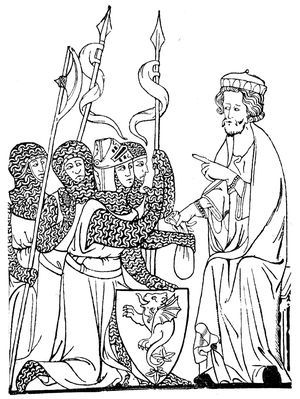
Group of armed knights, and a king in ordinary dress. Date, temp. Edward I.
3. Customs Duties. 1275.—Though Edward I. was by no means extravagant, he found it impossible to meet the expenses of government (p. 211) without an increase of taxation. In 1275 he obtained the consent of Parliament to the increase of the duties on exports and imports which had hitherto been levied without Parliamentary sanction. He was now to receive by a Parliamentary grant a fixed export duty of 6s. 8d. on every sack of wool sent out of the country, and of a corresponding duty on wool-fells and leather. Under ordinary circumstances it is useless for any government to attempt to gain a revenue by export duty, because such a duty only raises the price abroad of the products of its own country, and foreigners will therefore prefer to buy the articles which they need from some country which does not levy export duties, and where, therefore, the articles are to be had more cheaply. England, however, was, in Edward's time, and for many years afterwards, an exception to the rule. On the Continent men could not produce much wool or leather for sale, because private wars were constantly occurring, and the fighting men were in the habit of driving off the sheep and the cattle. In England there were no private wars, and under the king's protection sheep and cattle could be bred in safety. There were now growing up manufactures of cloth in the fortified towns of Flanders, and the manufacturers there were obliged to come to England for the greater part of the wool which they used. They could not help paying not only the price of the wool, but the king's export duty as well, because if they refused they could not get sufficient wool in any other country.
(p. 212) 4. Edward's Judicial Reforms. 1274—1290.—Every king of England since the Norman Conquest had exercised authority in a twofold capacity. On one hand he was the head of the nation, on the other hand he was the feudal lord of his vassals. Edward laid more stress than any former king upon his national headship. Early in his reign he organised the courts of law, completing the division of the Curia Regis into the three courts which existed till recent times: the Court of King's Bench, to deal with criminal offences reserved for the king's judgment, and with suits in which he was himself concerned; the Court of Exchequer, to deal with all matters touching the king's revenue; and the Court of Common Pleas, to deal with suits between subject and subject. Edward took care that the justice administered in these courts should as far as possible be real justice, and in 1289 he dismissed two Chief Justices and many other officials for corruption. In 1285 he improved the Assize of Arms of Henry II. (see p. 154), so as to be more sure of securing a national support for his government in time of danger.
5. Edward's Legislation. 1279—1290.—It was in accordance with the national feeling that Edward, in 1290, banished from England the Jews, whose presence was most profitable to himself, but who were regarded as cruel tyrants by their debtors. On the other hand, Edward took care to assert his rights as a feudal lord. In 1279, by the statute De religiosis, commonly known as the Statute of Mortmain, he forbade the gift of land to the clergy, because in their hands land was no longer liable to the feudal dues. In 1290, by another statute, Quia emptores, he forbade all new sub-infeudation. If from henceforth a vassal wished to part with his land, the new tenant was to hold it, not under the vassal who gave it up, but under that vassal's lord, whether the lord was the king or anyone else. The object of this law was to increase the number of tenants-in-chief, and thus to bring a larger number of landowners into direct relations with the king.
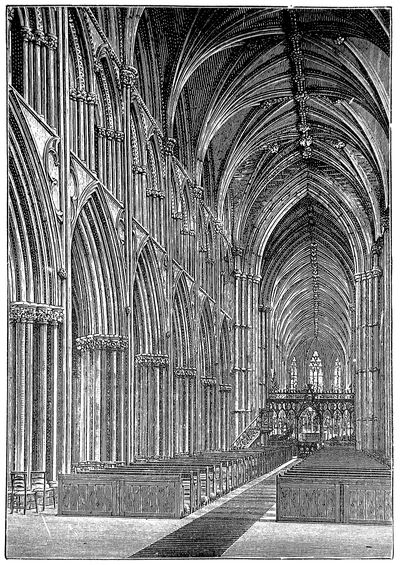
Nave of Lichfield Cathedral, looking east. Built about 1280.
6. Edward as a National and as a Feudal Ruler.—In his government of England Edward had sought chiefly to strengthen his position as the national king of the whole people, and to depress legally and without violence the power of the feudal nobility. He was, however, ambitious, with the ambition of a man conscious of great and beneficent aims, and he was quite ready to enforce even unduly his personal claims to feudal obedience whenever it served his purpose to do so. His favourite motto, 'Keep troth' (Pactum serva), revealed his sense of the inviolability of a personal engagement given or received, but his legal mind often led him into (p. 213) construing in his own favour engagements in which only the letter of the law was on his side, whilst its spirit was against him. It was chiefly in his relations with foreign peoples that he fell into (p. 214) this error, as it was here that he was most strongly tempted to lay stress upon the feudal tie which made for him, and to ignore the importance of a national resistance which made against him. In dealing with Wales, for instance, he sent David to a cruel death, because he had broken the feudal tie which bound him to the king of England, feeling no sympathy with him as standing up for the independence of his own people.
7. The Scottish Succession. 1285-1290.—In the earlier part of Edward's reign Alexander III. was king of Scotland. Alexander's ancestors, indeed, had done homage to Edward's ancestors, but in 1189 William the Lion had purchased from Richard I. the abandonment of all the claim to homage for the crown of Scotland which Henry II. had acquired by the treaty of Falaise (see pp. 154, 159). William's successors, however, held lands in England, and had done homage for them to the English kings. Edward would gladly have restored the old practice of homage for Scotland itself, but to this Alexander had never given way. To Edward there was something alluring in the prospect of being lord of the whole island, as it would not only strengthen his own personal position, but would bring two nations into peaceful union. Between the southern part of Scotland, indeed, and the northern part of England there was no great dissimilarity. On both sides of the border the bulk of the population was of the same Anglian stock, whilst, in consequence of the welcome offered by the Scottish kings to persons of Norman descent, the nobility was as completely Norman in Scotland as it was in England, many of the nobles indeed possessing lands on both sides of the border. A prospect of effecting a union by peaceful means offered itself to Edward in 1285, when Alexander III. was killed by a fall from his horse near Kinghorn. Alexander's only descendant was Margaret, a child of his daughter and of King Eric of Norway. In 1290 it was agreed that she should marry the Prince of Wales, but that the two kingdoms should remain absolutely independent of one another. Unfortunately, the Maid of Norway, as the child was called, died on her way to Scotland, and this plan for establishing friendly relations between the two countries came to naught. If it had succeeded three centuries of war and misery might possibly have been avoided.
8. Death of Eleanor of Castile. 1290.—Another death, which happened in the same year, brought sorrow into Edward's domestic life. His wife Eleanor died in November. The corpse was brought for burial from Lincoln to Westminster, and the (p. 215) bereaved husband ordered the erection of a memorial cross at each place where the body rested.

Effigy of Eleanor of Castile, queen of Edward I., in Westminster Abbey.
9. The Award of Norham. 1291—1292.—Edward, sorrowing as he was, was unable to neglect the affairs of State. On the death of the Maid of Norway there was a large number of claimants to the Scottish crown. The hereditary principle, which had long before been adopted in regard to the succession to landed property, was gradually being adopted in most kingdoms in regard to the succession to the crown. There were still, however, differences of opinion as to the manner in which hereditary succession ought to be reckoned, and there were now many claimants, of whom at least three could make out a plausible case. David, Earl of Huntingdon, a brother of William the Lion, had left three daughters. The grandson of the eldest daughter was John Balliol; the son of the second was Robert Bruce; the grandson of the third was John Hastings. Balliol maintained that he ought to succeed as being descended from the eldest: Bruce urged that the son of a younger daughter was nearer to the common ancestor, David, than the grandson of the elder: whilst Hastings asked that Scotland should be divided (p. 216) into three parts—according to a custom which prevailed in feudal estates in which the holder left only daughters—amongst the representatives of David's three daughters.[15] Every one of these three claimants was an English baron, and Bruce held large estates in both countries. The only escape from a desolating civil war seemed to be to appeal to Edward's arbitration, and in 1291 Edward summoned the Scots to meet him at Norham. He then demanded as the price of his arbitration the acknowledgment of his position as lord paramount of Scotland, in virtue of which the Scottish king, when he had once been chosen, was to do homage to himself as king of England. Edward, who might fairly have held that, in spite of the abandonment of the treaty of Falaise by Richard, he had a right to the old vague over-lordship of earlier kings, appears to have thought it right to take the opportunity of Scotland's weakness to renew the stricter relationship of homage which had been given up by Richard. At all events, the Scottish nobles and clergy accepted his demand, though the commonalty made some objection, the nature of which has not been recorded. Edward then investigated carefully the points at issue, and in 1292 decided in favour of Balliol. If he had been actuated by selfish motives he would certainly have adopted the suggestion of Hastings that Scotland ought to be divided into three kingdoms.
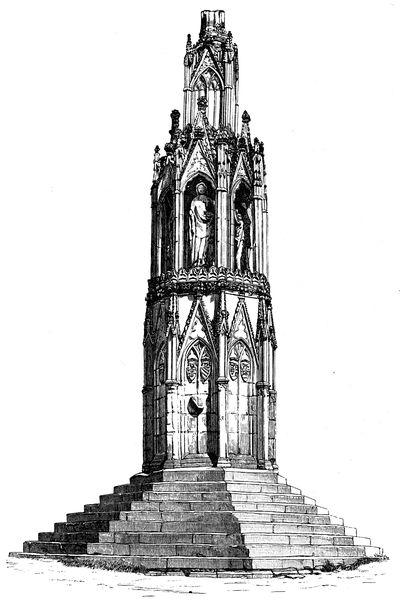
Cross erected near Northampton by Edward I. in memory of Queen Eleanor built between 1291 and 1294.
10. Disputes with Scotland and France. 1293—1295.—The new king of Scotland did homage to Edward for his whole kingdom. If Edward could have contented himself with enforcing the ordinary obligations of feudal superiority all might have gone well. Unfortunately for all parties, he attempted to stretch them by insisting in 1293 that appeals from the courts of the king of Scotland should lie (p. 218) to the courts of the king of England. Suitors found that their rights could not be ascertained till they had undertaken a long and costly journey to Westminster. A national feeling of resistance was roused amongst the Scots, and though Edward pressed his claims courteously, he continued to press them. A temper grew up in Scotland which might be dangerous to him if Scotland could find an ally, and an ally was not long in presenting himself. Philip IV. now king of France, was as wily and unscrupulous as Philip II. had been in the days of John. Edward was his vassal in Guienne and Gascony, and Philip knew how to turn the feudal relationship to account in France as well as Edward knew how to turn it to account in Scotland. The Cinque Ports[16] along the south-eastern shore of England swarmed with hardy and practised mariners, and there had often been sea-fights between French and English sailors quite independently of the two kings. In 1293 there was a great battle in which the French were worsted. Though Edward was ready to punish the offenders, Philip summoned him to appear as a vassal before his lord's court at Paris. In 1294, however, an agreement was made between the two kings. Edward was for mere form's sake to surrender his French fortresses to Philip in token of submission, and Philip was then to return them. Philip, having thus got the fortresses into his hands, refused to return them. In 1295 a league was made between France and Scotland, which lasted for more than three hundred years. Its permanence was owing to the fact that it was a league between nations more than a league between kings.
11. The Model Parliament. 1295.—Edward, attacked on two sides, threw himself for support on the English nation. Towards the end of 1295 he summoned a Parliament which was in most respects the model for all succeeding Parliaments. It was attended not only by bishops, abbots, earls, and barons, by two knights from every shire, and two burgesses from every borough, but also by representatives of the chapters of cathedrals and of the parochial clergy. It cannot be said with any approach to certainty, whether the Parliament thus collected met in one House or not. As, however, the barons and knights offered an eleventh of the value of their movable goods, the clergy a tenth, and the burgesses a seventh, it is not unlikely that there was a separation into what in modern times would be called three Houses, at least for purposes of taxation. At all events, (p. 219) the representatives of the clergy subsequently refused to sit in Parliament, preferring to vote money to the Crown in their own convocations.

Sir John d'Abernoun, died 1277: from his brass at Stoke Dabernon: showing armour worn from about 1250 to 1300.
12. The first Conquest of Scotland. 1296.—In 1296 Edward turned first upon Scotland. After he crossed the border Balliol sent to him renouncing his homage. "Has the felon fool done such folly?" said Edward. "If he will not come to us, we will go to him." He won a decisive victory over the Scots at Dunbar. Balliol surrendered his crown, and was carried off, never to reappear in Scotland. Edward set up no more vassal kings. He declared himself to be the immediate king of Scotland, Balliol having forfeited the crown by treason. The Scottish nobles did homage to him. On his return to England he left behind him the Earl of Surrey and Sir Hugh Cressingham as guardians of the kingdom, and he carried off from Scone the stone of destiny on which the Scottish kings had been crowned, and concerning which there had been an old prophecy to the effect that wherever that stone was Scottish kings should rule. The stone was placed, where it still remains, under the coronation-chair of the English kings in Westminster Abbey, and there were those long afterwards who deemed the prophecy fulfilled when the Scottish King (p. 220) James VI. came to take his seat on that chair as James I. of England.
13. The Resistance of Archbishop Winchelsey. 1296—1297.—The dispute with France and the conquest of Scotland cost much money, and Edward, finding his ordinary revenue insufficient, had been driven to increase it by unusual means. He gathered assemblies of the merchants, and persuaded them without the leave of Parliament to increase the export duties, and he also induced the clergy in the same way to grant him large sums. The clergy were the first to resist. In 1296 Boniface VIII., a Pope who pushed to the extreme the Papal claims to the independence of the Church, issued the Bull, Clericis laicos, in which he declared that the clergy were not to pay taxes without the Pope's consent; and when at the end of the year Edward called on his Parliament to grant him fresh sums, Winchelsey, the Archbishop of Canterbury, refused, on the ground of this Bull, to allow a penny to be levied from the clergy. Edward, instead of arguing with him, directed the chief justice of the King's Bench to announce that, as the clergy would pay no taxes, they would no longer be protected by the king. The clergy now found themselves in evil case. Anyone who pleased could rob them or beat them, and no redress was to be had. They soon therefore evaded their obligation to obey the Bull, and paid their taxes, under the pretence that they were making presents to the king, on which Edward again opened his courts to them. In the days of Henry I. or Henry II. it would not have been possible to treat the clergy in this fashion. The fact was, that the mass of the people now looked to the king instead of to the Church for protection, and therefore respected the clergy less than they had done in earlier days.
14. The 'Confirmatio Cartarum.' 1297.—In 1297 Edward, having subdued the Scots in the preceding year, resolved to conduct one army to Flanders, and to send another to Gascony to maintain his rights against Philip IV. He therefore called on his barons to take part in these enterprises. Amongst those ordered to go to Gascony were Roger Bigod, Earl of Norfolk, and Humfrey Bohun, Earl of Hereford. They declared that they were only bound to follow the king himself, and that as Edward was not going in person to Gascony they would not go. "By God, Sir Earl," said the king to one of them, "you shall either go or hang." "By God," was the reply, "I will neither go nor hang." The two earls soon found support. The barons were sore because Edward's reforms had diminished their authority. The clergy were sore because of their recent treatment. The merchants were sore because of the exactions (p. 221) to which they had been subjected. Archbishop Winchelsey bound the malcontents together by asking Edward to confirm Magna Carta and other charters granted by his predecessors, and by adding other articles now proposed for the first time, so as to preclude him from demanding taxes not granted by Parliament. Edward found that the new articles restricted his action more than it had been restricted by the older charters. He was deeply vexed, as he thought that he deserved to be trusted, and that, though he had exacted illegal payments, he had only done so out of necessity. He saw, however, that he must yield, but he could not bring himself to yield in person, and he therefore crossed the sea to Flanders, leaving the Prince of Wales to make the required concession. On October 10, 1297, the Confirmatio Cartarum, as it was called, was issued in the king's name. It differed from Magna Carta in this, that whereas John had only engaged not to exact feudal revenue from his vassals without consent of Parliament, Edward I. also engaged not to exact customs duties without a Parliamentary grant. From that time no general revenue could be taken from the whole realm without a breach of the law, though the king still continued for some time to raise tallages, or special payments, from the tenants of his own demesne lands.
15. Wallace's Rising. 1297—1304.—Whilst Edward was contending with his own people his officers had been oppressing the Scots. They had treated Scotland as a conquered land, not as a country joined to England by equal union. Resistance began in 1297, and a rising was headed by Wallace, a gentleman of moderate fortune in the western lowlands. Wallace's bold and vigorous attacks gained him the confidence of the lesser gentry and the people, though the nobles, mostly of Norman descent, supported the English government, and only joined Wallace when it was dangerous to stand aloof. In the autumn, an English army advancing into Scotland reached the south bank of the Forth near Stirling. Wallace, who showed on that day that he was skilful as well as brave, drew up his army on the north bank at some little distance from the narrow bridge over which the English must come if they were to attack him. When half of them had crossed, he fell upon that half before the troops in the rear could advance to its succour. Wallace's victory was complete, and he then invaded England, ravaging and slaughtering as far as Hexham.
16. The Second Conquest of Scotland. 1298—1304.—In 1298 Edward, who had been unsuccessful on the Continent, made a truce with Philip. Returning to England, he marched against Wallace, (p. 222) and came up with him at Falkirk. The battle which ensued, like William's victory at Senlac (see p. 96), was a triumph of inventive military skill over valour content to rest upon ancient methods. The Scots were hardy footmen, drawn up in three rings, and provided with long spears. Against such a force so armed the cavalry of the feudal array would dash itself in vain. Edward, however, had marked in his Welsh wars the superiority of the long-bow drawn to the ear—not, as in the case of the shorter bows of older times, to the breast of the archer—and sending its cloth-yard shaft with a strength and swiftness hitherto unknown. He now brought with him a large force of bowmen equipped in this fashion. At Falkirk the long-bow was tried for the first time in any considerable battle. The effect was overwhelming: a shower of arrows poured upon a single point in the ring of the spearmen soon cleared a gap. Edward's cavalry dashed in before the enemy had time to close, and the victory was won. Wallace had had scarcely one of the Scottish nobles with him either at Stirling or at Falkirk, and unless all Scotland combined he could hardly be expected to succeed against such a warrior as Edward. Wallace's merit was that he did not despair of his country, and that by his patriotic vigour he prepared the minds of Scotsmen for a happier day. He himself fled to France, but Scotland struggled on without him. Some of the nobles, now that Wallace was no longer present to give them cause of jealousy, took part in the resistance, and only in 1304 did Edward after repeated campaigns complete his second conquest of the country.
17. The Incorporation of Scotland with England. 1305.—In 1305 Wallace, who had returned from France, but had taken no great part in the late resistance, was betrayed to the English. His barbarity in his raid on Northumberland in 1297 (see p. 221) had marked him out for vengeance, and he was executed at Tyburn as a traitor to the English king of Scotland, whose right he had never acknowledged. Edward then proceeded to incorporate Scotland with England. Scotland was to be treated very much as Wales had been treated before. There was to be as little harshness as possible. Nobles who had resisted Edward were to keep their estates on payment of fines, the Scottish law was to be observed, and Scots were to be chosen to represent the wishes of their fellow-countrymen in the Parliament at Westminster. On the other hand, the Scottish nobles were to surrender their castles, and the country was to be governed by an English Lieutenant, who, together with his council, had power to amend the laws.
18. Character of Edward's Dealings with Scotland.—Edward's (p. 223) dealings with Scotland, mistaken as they were, were not those of a self-willed tyrant. If it be once admitted that he was really the lord paramount of Scotland, everything that he did may be justified upon feudal principles. First, Balliol forfeited his vassal crown by breaking his obligations as a vassal. Secondly, Edward, through the default of his vassal, took possession of the fief which Balliol had forfeited, and thus became the immediate lord of Balliol's vassals. Thirdly, those vassals rebelled—so at least Edward would have said—against their new lord. Fourthly, they thereby forfeited their estates to him, and he was therefore, according to his own view, in the right in restoring their estates to them—if he restored them at all—under new conditions. Satisfactory as this argument must have seemed to Edward, it was weak in two places. The Scots might attack it at its basis by retorting that Edward had never truly been lord paramount of Scotland at all; or they might assert that it did not matter whether he was so or not, because the Scottish right to national independence was superior to all feudal claims. It is this latter argument which has the most weight at the present day, and it seems to us strange that Edward, who had done so much to encourage the national growth of England, should have entirely ignored the national growth of Scotland. All that can be said to palliate Edward's mistake is that it was, at first, difficult to perceive that there was a Scottish nationality at all. Changes in the political aspect of affairs grow up unobserved, and it was not till after his death that all classes in Scotland were completely welded together in resistance to an English king. At all events, if he treated the claim of the Scots to national independence with contempt, he at least strove, according to his own notions, to benefit Scots and English alike. He hoped that one nation, justly ruled under one government, would grow up in the place of two divided peoples.
19. Robert Bruce. 1306.—It was better even for England that Edward's hopes should fail. Scotland would have been of little worth to its more powerful neighbour if it had been cowed into subjection; whereas when, after struggling and suffering for her independence, she offered herself freely as the companion and ally of England to share in common duties and common efforts, the gift was priceless. That Scotland was able to shake off the English yoke was mainly the work of Robert Bruce, the grandson of the Robert Bruce who had been one of the claimants of the Scottish crown at Norham. The Bruces, like Balliol, were of Norman descent, and as Balliol's rivals they had attached themselves to Edward. The time was now come when all chances of (p. 224) Balliol's restoration were at an end, and thoughts of gaining the crown stirred in the mind of the younger Bruce. After Edward's last settlement of Scotland it was plain that there was no longer room for a Scottish vassal king, and Bruce was therefore driven to connect his own aspirations with those of the Scottish nation. He had, however, one powerful rival amongst the nobles. John Comyn—the Red Comyn, as he was called—had been one of the many claimants of the throne who appeared before Edward at Norham, and he still looked with a jealous eye upon all who disputed his title. He was, however, persuaded in 1306 to meet Bruce in the Grey Friars Church at Dumfries. As Bruce pleaded his own right to the crown, Comyn denounced him as a traitor to Edward. Bruce answered by driving his dagger into him. "I doubt," cried Bruce, as he rushed from the church, "that I have slain the Red Comyn." "I will mak sicker" (make sure), said Kirkpatrick, who was in attendance upon him, and, going in, completed the murder. Bruce made for Scone and was crowned king of Scotland in the presence of many of the chief nobility.
20. Edward's Last March on Scotland and Death. 1306—1307. Edward, to whom Bruce was but a rebel and a murderer, despatched against him the Earl of Pembroke who routed his forces at Methven. The revolt was suppressed and Bruce's supporters were carried off to English prisons, and their lands divided amongst English noblemen. The Countess of Buchan, who had taken a prominent part in Bruce's coronation, was subjected to an imprisonment of great severity in the castle of Berwick. Bruce almost alone escaped. He knew now that he had the greater part of the nobility as well as the people at his side, and even in his lonely wanderings and hairbreadth escapes he was, what neither Balliol nor Wallace had been, the true head of the Scottish nation. Before the end of 1306 he reappeared in Carrick, where his own possessions lay, and where the whole population was on his side, and inflicted heavy losses on the English garrisons. Early in July 1307 Edward, who himself had tarried in Cumberland, once more set out to take the field in person; but he was now old and worn out, and he died at Burgh on Sands, a few miles on the English side of the border.
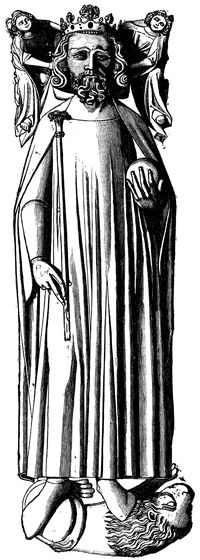
Edward II.; from his monument in Gloucester Cathedral.
21. Edward II. and Piers Gaveston. 1307—1312.—The new king, Edward II., was as different as possible from his father. He was not wicked, like William II. and John, but he detested the trouble of public business, and thought that the only advantage of being a king was that he would have leisure to amuse himself. During his father's life he devoted himself to Piers Gaveston, a (p. 225) Gascon, who encouraged him in his pleasures and taught him to mistrust his father. Edward I. banished Gaveston; Edward II., immediately on his accession, not only recalled him, but made him regent when he himself crossed to France to be married to Isabella, the daughter of Philip IV. The barons, who were already inclined to win back some of the authority of which Edward I. had deprived them, were very angry at the place taken over their heads by an upstart favourite, especially as Gaveston was ill-bred enough to make jests at their expense. The barons found a leader in Thomas, Earl of Lancaster, the son of that Edmund, the brother of Edward I., who had received the title of king of Sicily from the Pope (see p. 197). Thomas of Lancaster had very large estates. He was an ambitious man, who tried to play the part which had been played by Earl Simon without any of Simon's qualifications for the position. In 1308 the king yielded to the barons so far as to send Gaveston out of the country to Ireland as his Lieutenant. In 1309 he recalled him. The barons were exasperated, and in the Parliament of 1310 they brought forward a plan for (p. 226) taking the king's government out of his hands, very much after the fashion of the Provisions of Oxford. Twenty-one barons were appointed Lords Ordainers, to draw up ordinances for the government of the country. In 1311 they produced the ordinances. Gaveston was to be banished for life. The king was to appoint officers only with the consent of the barons, without which he was not to go to war nor leave the kingdom. The ordinances may have been justified in so far as they restrained the authority of a king so incapable as Edward II. Constitutionally their acceptance was a retrograde step, as, like the Provisions of Oxford, they placed power in the hands of the barons, passing over Parliament as a whole. Edward agreed to the ordinances, but refused to surrender Gaveston. The barons took arms to enforce their will, and in 1312, having captured Gaveston, they beheaded him near Warwick without the semblance of a trial.
22. Success of Robert Bruce. 1307—1314.—Whilst Edward and the barons were disputing Bruce gained ground rapidly. In 1313 Stirling was the only fortress of importance in Scotland still garrisoned by the English, and the English garrison bound itself to surrender on June 24, 1314, if it had not been previously relieved. Even Edward II. was stirred by this doleful news, and in 1314 he put himself at the head of an army to relieve Stirling. Lancaster, however, and all whom he could influence refused to follow him, on the ground that the king had not, in accordance with the ordinances, received permission from the barons to go to war. On June 24 Edward reached Bannockburn, within sight of Stirling. Like his father, he brought with him English archers as well as English horsemen, but he foolishly sent his archers far in advance of his horsemen, where they would be entirely unprotected. Bruce, on the other hand, not only had a small body of horse, which rode down the archers, but he strengthened the defensive position of his spearmen by digging pits in front of his line and covering them with turf. Into these pits the foremost horses of the English cavalry plunged. Edward's whole array was soon one mass of confusion, and before it could recover itself a body of gillies, or camp-followers, appearing over a hill was taken for a fresh Scottish army. The vast English host turned and fled. Stirling at once surrendered, and all Scotland was lost to Edward. Materially, both England and Scotland suffered grievously from the result of the battle of Bannockburn. English invasions of southern Scotland and Scottish invasions of northern England spread desolation far and wide, stifling the germs of nascent civilisation. Morally, both nations were in the (p. 227) end the gainers. The hardihood and self-reliance of the Scottish character is distinctly to be traced to those years of struggle against a powerful neighbour. England, too, was the better for being balked of its prey. No nation can suppress the liberty of another without endangering its own.
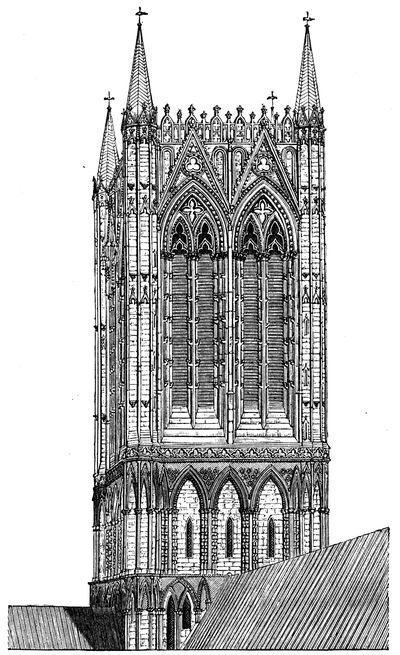
Lincoln Cathedral—the central tower; built about 1310.
(p. 228) 23. Lancaster's Government. 1314—1322.—Edward was thrown by his defeat entirely under the power of Lancaster, who took the whole authority into his hands and placed and displaced ministers at his pleasure. Lancaster, however, was a selfish and incompetent ruler. He allowed the Scots to ravage the north of England without venturing to oppose them, and as he could not even keep order at home, private wars broke out amongst the barons. In 1318 Bruce took Berwick, the great border fortress against Scotland. It was rather by good luck than by good management that Edward was at last able to resist Lancaster. Edward could not exist without a personal favourite, and he found one in Hugh le Despenser. Despenser was at least an Englishman, which Gaveston had not been, and his father, Hugh le Despenser the elder, did his best to raise up a party to support the king. In 1321, however, Parliament, under Lancaster's influence, declared against them and sentenced them to exile. Edward took arms for his favourites, and in 1322 defeated Lancaster at Boroughbridge, and then had him tried and beheaded at Pontefract.
24. A Constitutional Settlement. 1322.—Favourites as they were, the Despensers had at least the merit of seeing that the king could not overpower the barons by the mere assertion of his personal authority. At a Parliament held at York in 1322, the king obtained the revocation of the ordinances, and a declaration that 'matters to be established for the estate of our lord the king and of his heirs, and for the estate of the realm and of the people, shall be treated, accorded, and established in Parliaments by our lord the king, and by the consent of the prelates, earls and barons, and commonalty of the realm, according as hath been hitherto accustomed.' Edward I. had in 1295 gathered a full Parliament, including the commons. But there was no law to prevent him or his successors excluding the commons on some future occasion. Edward II. by this declaration, issued with consent of Parliament, confirmed his father's practice by a legislative act. Unless the law were broken or repealed, no future statute could come into existence without the consent of the commons.

Sir John de Creke; from his brass at Westley Waterless, Cambridgeshire: showing armour worn between 1300 and 1335 or 1340. Date, about 1325.
25. The Rule of the Despensers. 1322—1326.—For some years after the execution of Lancaster, Edward, or rather the Despensers, retained power, but it was power which did not work for good. In 1323 Edward made a truce with Scotland, but the cessation of foreign war did not bring with it a cessation of troubles at home. Edward was entirely unable to control his favourites. The elder Despenser was covetous and the younger (p. 229) Despenser haughty, and they both made enemies for themselves and the king. Queen Isabella was alienated from her husband, partly by his exclusive devotion to the Despensers and partly by the contempt which an active woman is apt to feel for a husband without a will of his own. In 1325 she went to France, and was soon followed by her eldest son, named Edward after his father. From that moment she conspired against her husband. In 1326 she landed, accompanied by her paramour, Robert Mortimer, and bringing with her foreign troops. The barons rose in her favour. London joined them, and all resistance was speedily beaten down. The elder Despenser was hanged by the queen at Bristol. The younger was hanged, after a form of trial, at Hereford.
26. The Deposition and Murder of Edward II. 1327.—Early in 1327 a Parliament met at Westminster. It was filled with the king's enemies, and under pressure from the queen and Mortimer Edward II. was compelled to sign a declaration of his own wrong-doing and incompetency, after which he formally resigned the crown. He was allowed to live for eight months, at the end of which he was brutally murdered in Berkeley Castle. The deposition of Edward II.—for his enforced resignation was practically nothing less than that—was the work of a faithless wife and of unscrupulous partisans, but at least they clothed their vengeance in the forms of Parliamentary action. It was by the action of Parliament in loosing the feudal ties by which vassals were bound to an (p. 230) unworthy king, that it rose to the full position of being the representative of the nation, and at the same time virtually proclaimed that the wants of the nation must be satisfied at the expense of the feudal claims of the king. The national headship of the king would (p. 231) from henceforward be the distinguishing feature of his office, whilst his feudal right to personal service would grow less and less important every year.[Back to Contents]
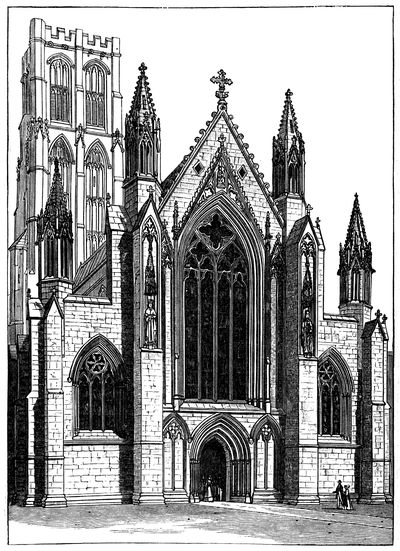
Howden Church, Yorkshire—the west front; built about 1310-1320. The tower was built between 1390 and 1407.
LEADING DATES
Reign of Edward III., 1327—1377
1. Mortimer's Government. 1327—1330.—Edward III. was only fifteen at his accession. For three years power was in the hands of his mother's paramour, Mortimer. Robert Bruce, though old and smitten with leprosy, was still anxious to wring from England an acknowledgment of Scottish independence, and, in spite of the existing truce, sent an army to ravage the northern counties of England. Edward led in person against it an English force far superior in numbers and equipment; but the English soldier needed many things, whilst the Scot contented himself with a little oatmeal carried on the back of his hardy pony. If he grew tired of that he had but to seize an English sheep or cow and to boil the flesh in the hide. Such an army was difficult to come up with. Fighting there was none, except once when the Scots broke into the English camp at night and almost succeeded in carrying off the young king. Mortimer was at his wits' end, and in 1328 agreed to a treaty acknowledging the complete independence of Scotland. It was a wise thing to do, but no nation likes to acknowledge failure, and Mortimer became widely unpopular. He succeeded indeed in breaking up a conspiracy against himself, and in 1330 even executed Edmund, Earl of Kent, a brother of Edward II. The discontented barons found another leader in the king, who, young as he was, had been married at fifteen to Philippa of Hainault. Though (p. 232) he was already a father, he was still treated by Mortimer as a child, and was virtually kept a prisoner. At Nottingham he introduced a body of Mortimer's enemies into the castle through a secret passage in the rock on which it stood. His mother pleaded in vain for her favourite: "Fair son, have pity on the gentle Mortimer." Mortimer was hanged, and Queen Isabella was never again allowed to take part in public affairs.
2. The French Succession. 1328—1331.—Isabella's three brothers, Louis X., Philip V., and Charles IV., had successively reigned in France. Louis X. died in 1316, leaving behind him a daughter and a posthumous son, who died a week after his birth. Then Philip V. seized the crown, his lawyers asserting that, according to the Salic law, 'no part of the heritage of Salic land can fall to a woman,' and that therefore no woman could rule in France. As a matter of fact this was a mere quibble of the lawyers. The Salic law had been the law of the Salian Franks in the fifth century, and had to do with the inheritance of estates, not with the inheritance of the throne of France, which was not at that time in existence. The quibble, however, was used on the right side. What Frenchmen wanted was that France should remain an independent nation, which it was not likely to do under a queen who might marry the king of another country. The rule thus laid down was permanently adopted in France. When Philip V. died in 1322 the throne passed, not to his daughter, but to his brother, Charles IV., and when Charles died in 1328, to his cousin, Philip of Valois, who reigned as Philip VI. At that time England was still under the control of Mortimer and Isabella, and though Isabella, being the sister of Charles IV., thought of claiming the crown, not for herself, but for her son, Mortimer did not press the claim. In 1329 he sent Edward to do homage to Philip VI. for his French possessions, but Edward only did it with certain reservations, and in 1330 preparations for war were made in England. In 1331, after Mortimer's fall, when Edward was his own master, he again visited France, and a treaty was concluded between the two kings in which he abandoned the reservations on his homage.
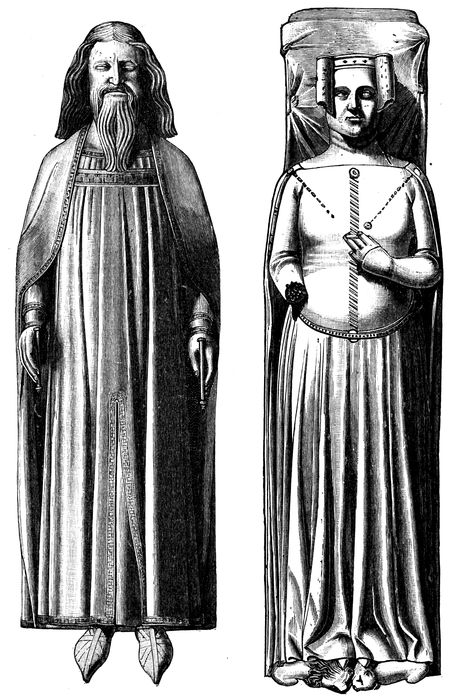
Effigies of Edward III. and Queen Philippa; from their tombs in Westminster Abbey.
3. Troubles in Scotland. 1329—1336.—On his return, Edward looked in another direction. In 1329 Robert Bruce died, leaving his crown to his son, David II., a child five years old. Certain English noblemen had in the late treaty (see p. 231) been promised restoration of the estates of their ancestors in Scotland, and in 1332 some of them, finding the promise unfulfilled, offered English forces to John Balliol's son, Edward, to help him to the Scottish crown. (p. 234) Aided by his English allies, Edward Balliol landed in Scotland, defeated the Scottish army at Dupplin, and was crowned king. Before the end of the year he was surprised at Annan, and fled to England to appeal to Edward for help. Though Edward had all the love of enterprise of his grandfather, Edward I., yet there was a marked contrast between the deliberate calculation of Edward I. and the almost accidental way in which Edward III. involved himself in an attempt to regain the lordship of Scotland. In 1333 he laid siege to Berwick, then in the hands of the Scots. The Scots advanced into England, and their spearmen crossed a marsh to attack the English array of knights and archers posted on the slope of Halidon Hill. The arrows poured like rain on their struggling columns. The Scots were thrown into confusion, and their whole army was almost destroyed. Berwick was regained, and Bannockburn, it seemed, was avenged. Edward not only set up Balliol as his vassal, but compelled him to yield all Scotland south of the Forth to be annexed to England. Such a settlement could not last. Balliol was as weak as his father had been, and the Scots, recovering courage, drove him out in 1334. Edward invaded Scotland again and again. As long as he was in the country he was strong enough to keep his puppet on the throne, but whenever he returned to England David Bruce's supporters regained strength. The struggle promised to be lengthy unless help came to the Scots.
4. Dispute with France. 1336—1337.—Philip VI., like Philip IV. in the days of Edward I. (see p. 218), had his own reasons for not allowing the Scots to be crushed. He pursued the settled policy of his predecessors in attempting to bring the great fiefs into his power, and especially that part of Aquitaine which was still held by the most powerful of his vassals, the king of England. Whilst Edward was doing his best to bring Scotland into subjection by open war, Philip was doing his best to disturb Edward in his hold upon Aquitaine by secret intrigues and legal chicanery. Ill-feeling increased on both sides. Philip welcomed David Bruce and gave him protection in France, and in 1336 French sailors attacked English shipping and landed plunderers in the Isle of Wight. In 1337 Edward determined to resist, and the long war roughly known as the Hundred Years' War began. It was in reality waged to discover by an appeal to arms whether the whole of Aquitaine was to be incorporated with France and whether Scotland was to be incorporated with England. That which gave it its peculiar bitterness was, however, not so much the claims (p. 235) of the kings, as the passions of their subjects. The national antagonism aroused by the plunderings of French sea-rovers would be invigorated by the plunderings of Englishmen in the fields of France.
5. Edward's Allies. 1337—1338.—To Edward it was merely a question of defending, first England, and then Aquitaine, against aggression. He won over, with large offers of money, the alliance of the princes of the Empire whose lands lay round the French frontier to the north and east, and even gained the support of the Emperor Lewis the Bavarian. His relations with Flanders were even more important. In Flanders there had sprung up great manufacturing towns, such as Ghent, Bruges, and Ypres, which worked up into cloth the wool which was the produce of English sheep. These wealthy towns claimed political independence, and thus came into collision with their feudal lord, the Count of Flanders. Early in the reign of Philip VI., the Count, who held the greater part of his lands from the king of France, had appealed to Philip for support, and Philip, who, unlike his wiser predecessors, despised the strength which he might gain from the goodwill of citizens in a struggle against their lords, took the part of the Count, and for a time crushed the citizens at the battle of Cassel. After a while the cities recovered themselves, and formed an alliance under the leadership of Jacob van Arteveldt, a Flemish nobleman, who had ingratiated himself with them by enrolling himself amongst the brewers of Ghent, and who was now successful in urging his countrymen to enter into friendship with Edward.
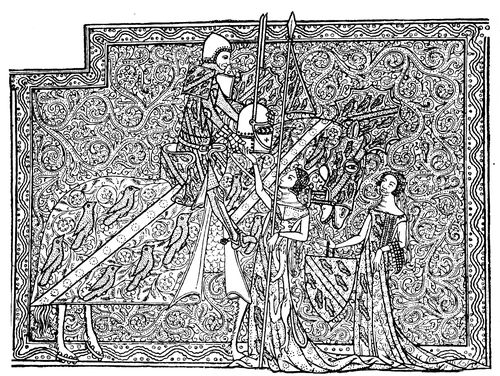
A knight—Sir Geoffrey Luttrell, who died 1345—receiving his helm and pennon from his wife. Another lady holds his shield.

William of Hatfield, second son of Edward III.; from his tomb in York Minster: showing rich costume worn by the youth of the upper classes about 1340. The embroidery on the tunic has been partly worn off on the effigy.
6. Chivalry and War.—In the long run Edward's cause would be found a losing one, but there were circumstances which made it prevail for a time. In France there was a broad distinction between gentlemen on the one side and citizens and peasants on the other. The gentlemen despised all who were not of their own class. In earlier days there had sprung up a view of life known as chivalry, which taught that the knight was bound to observe the laws of honour, to fight fairly, to treat with courtesy a defeated enemy, and to protect women and all who were unable to help themselves. Ennobling as the idea was, it had been narrowed by the refusal of the gentlemen to extend the rules of chivalry beyond their own order, and they were, therefore, ready to exercise cruelty upon those who were not gentlemen, whilst proffering the most high-flown compliments to those who were. In France, too, this broad distinction of ranks told upon the military strength of the crown. The fighting force of the French king was (p. 236) his feudal array of armour-protected cavalry, composed entirely of gentlemen, and aiming at deciding battles in the old fashion by the rush of horsemen. If foot soldiers were brought at all into the field they were, for the most part, ill armed and ill trained peasants, exposed to be helplessly slaughtered by the horsemen.
7. Commerce and War.—In England, on the other hand, the various orders of society had been welded together into a united people. The king and his vassals indeed still talked the language of chivalry, but they were wise enough to seek strength elsewhere. War had become in England the affair of the nation, and no longer the affair of a class. It must be waged with efficient archers as well as with efficient horsemen, the archers being drawn from the class of yeomen or free landed proprietors of small plots of land, which was entirely wanting in France. Such an army needed pay, and the large sums required for the purpose could only be extracted from a nation which, like the English, had grown comparatively rich because it was at peace within its own borders. Edward was compelled, if he wanted to fight, to encourage trade, though it is only fair to remember that he showed himself ready to encourage trade without any such ulterior object. He brought Flemish weavers into England, and did his best to improve the feeble woollen manufacture of the Eastern counties. (p. 237) His great resource, however, for purposes of taxation, was the export of wool to the Flemish manufacturing towns. Sometimes he persuaded Parliament to raise the duties upon exported wool; sometimes he raised them, by an evasion of the law, after making a private compact with the merchants without consulting Parliament at all; sometimes he turned merchant himself and bought wool cheaply in England to sell it dear in Flanders. It was said of a great minister of later times that he made trade flourish by means of war.[17] It might be said with greater truth of Edward III. that he made war flourish by means of trade.
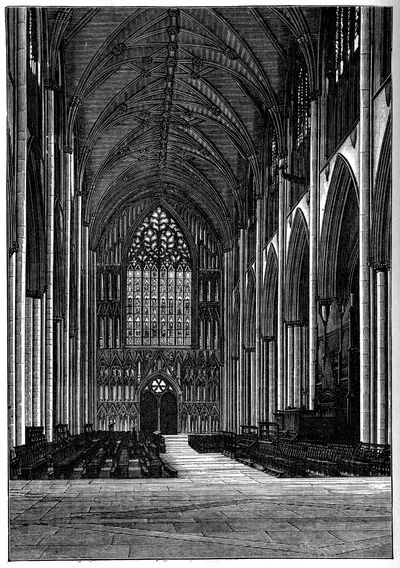
York Minster:—The nave, looking west, built during the first half of the fourteenth century. The west window was completed and glazed in 1338.
8. Attacks on the North of France. 1338—1340.—Great as was Edward's advantage in having a united nation at his back, it hardly seemed in the first years of the war as though he knew how to use it. Though he had declared war against Philip in 1337, he did not begin hostilities till the following year. In 1338, after landing at Antwerp, he obtained from the Emperor Lewis the title of Imperial Vicar, which gave him a right to the military services of the vassals of the Empire. Crowds of German and Low Country lords pressed into his ranks, but they all wanted high (p. 239) pay, and his resources, great as they were, were soon exhausted, and he had to pawn his crowns to satisfy their needs. These lords proved as useless as they were expensive. In 1339 Edward crossed the French frontier, but he could not induce Philip to fight, and being deserted by his German allies, he was obliged to return to England. He then attempted to fall back on the support of the Flemings, but was told by them that unless he formally took the title of king of France, which he had only occasionally done before, they could not fight for him, as the king of France, whoever he might be, was their superior lord, and as such had a claim to their services. After some hesitation, in the beginning of 1340, Edward satisfied their scruples by reviving the claim which he had formerly abandoned, declaring himself to be, in right of his mother, the lawful king of France; and quartering the French arms with his own. A third territorial question was thus added to the other two. Practically Edward's answer to Philip's effort to absorb all Aquitaine in France was a counter-demand that all France should be absorbed in England.
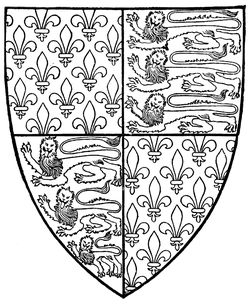
Royal arms of Edward III., adopted in 1340 and used till about 1405. From the tomb of Edward III.
9. Battle of Sluys. 1340.—Edward had not yet learnt to place confidence in those English archers who had served him so well at Halidon Hill. In 1340, however, he found himself engaged in a conflict which should have taught him where his true strength lay. The French navy held the Channel, and had burnt Southampton. The fleet of the Cinque Ports was no longer sufficient to cope with the enemy. Edward proudly announced that he, like his progenitors, was the lord of the English sea on every side, and called out every vessel upon which he could lay hands. The result was a naval victory at Sluys, in which well-nigh the whole French fleet was absolutely destroyed. It was by the English archers that (p. 240) the day was won. So complete was the victory that no one dared to tell the ill news to Philip, till his jester called out to him, "What cowards those English are!" "Because," he explained, "they did not dare to leap into the sea as our brave Frenchmen did."
10. Attacks on the West of France. 1341—1345.—If Edward was to obtain still greater success, he had but to fight with a national force behind him on land as he had fought at sea; but he was slow to learn the lesson. Personally he was as chivalrous as Philip, and thought that far more could be done by the charge of knights on horseback than by the cloth-yard shafts of the English bowmen. For six more years he frittered away his strength. There was a disputed succession in Brittany, and one of the claimants, John of Montfort, ranged himself on the side of the English. There was fighting in Brittany and fighting on the borders of Edward's lands in Aquitaine, but up to the end of 1345 there was no decisive result on either side. In Scotland, too, things had been going so badly for Edward that in 1341 David Bruce had been able to return, and was now again ruling over his own people.
11. The Campaign of Creçy. 1346.—Surprising as Edward's neglect to force on a battle in France appears to us, it must be remembered that in those days it was far more difficult to bring on an engagement than it is in the present day. Fortified towns and castles were then almost impregnable, except when they were starved out; and it was therefore seldom necessary for a commander—on other grounds unwilling to fight—to risk a battle in order to save an important post from capture. Edward, however, does not appear to have thought that there was anything to be gained by fighting. In 1346 he led a large English army into Normandy, taking with him his eldest son, afterwards known as the Black Prince, at that time a lad of sixteen. It had been from Normandy and Calais that the fleets had put out by which the coasts of England had been ravaged, and Edward now deliberately ravaged Normandy. He then marched on, apparently intending to take refuge in Flanders. As the French had broken the bridges over the Seine, he was driven to ascend the bank of the river almost to Paris before he could cross. His burnings and his ravages continued till Philip, stung to anger, pursued him with an army more than twice as numerous as his own. Edward had the Somme to cross on his way, and the bridges over that river had been broken by the French, as those over the Seine had been broken; and but for the opportune discovery of a ford at Blanche Tache Edward would have been (p. 241) obliged to fight with an impassable river at his back. When he was once over the Somme he refused—not from any considerations of generalship, but from a point of honour—to continue his retreat further. He halted on a gentle slope near the village of Creçy facing eastwards, as Philip's force had swept round to avoid difficulties in the ground, and was approaching from that direction.
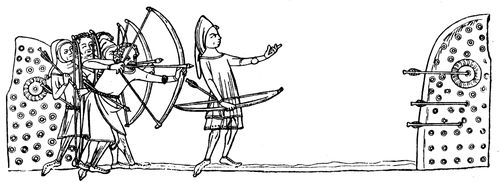
Shooting at the butts with the long-bow.
12. The Tactics of Creçy. 1346.—Great as was Edward's advantage in possessing an army so diverse in its composition as that which he commanded, it would have availed him little if he had not known how to order that army for battle. At once it appeared that his skill as a tactician was as great as his weakness as a strategist. His experience at Halidon Hill (see p. 234) had taught him that the archers could turn the tide of battle against any direct attack, however violent. He knew, too, from the tradition of Bannockburn (see p. 226), that archers could readily be crushed by a cavalry charge on the flank; and he was well aware that his own horsemen were in too small numbers to hold out against the vast host of the French cavalry. He therefore drew up his line of archers between the two villages of Creçy and Vadicourt, though his force was not large enough to extend from one to the other. He then ordered the bulk of his horsemen to dismount and to place themselves with levelled spears in bodies at intervals in the line of archers. The innovation was thoroughly reasonable, as spearmen on foot would be able to check the fiercest charge of horse, if only the horse could be exposed to a shower of arrows. The English army was drawn up in three corps, two of them in the front line. The Black Prince was in command of one of the two bodies in front, whilst the king himself took charge of the third corps, which acted as a reserve in the rear.
(p. 242) 13. The Battle of Creçy. August 26, 1346.—When Philip drew nigh in the evening his host was weary and hungry. He ordered his knights to halt, but each one was thinking, not of obeying orders, but of securing a place in the front, where he might personally distinguish himself. Those in the rear pushed on, and in a few minutes the whole of the French cavalry became a disorganised mob. Then Philip ordered 15,000 Genoese crossbowmen to advance against the enemy. At the best a crossbow was inferior to the English long-bow, as it was weaker in its action and consumed more time between each shot. To make matters worse, a heavy shower of rain had wetted the strings of the unlucky Genoese, rendering their weapons useless. The English had covers for their bows, and had kept them dry. The thick shower of their arrows drove the Genoese back. Philip took their retreat for cowardice. "Kill me those scoundrels!" he cried, and the French knights rode in amongst them, slaughtering them at every stride. Then the French horsemen charged the English lines. Some one amongst the Black Prince's retinue took alarm, and hurried to the king to conjure him to advance to the son's assistance. Edward knew better. "Is he dead?" he asked, "or so wounded that he cannot help himself?" "No, sire, please God," was the reply, "but he is in a hard passage of arms, and he much needs your help." "Return," answered the king, "to those that sent you, and tell them not to send to me again so long as my son lives; I command them to let the boy win his spurs." The French were driven off with terrible slaughter, and the victory was won. It was a victory of foot soldiers over horse soldiers—of a nation in which all ranks joined heartily together over one in which all ranks except that of the gentry were despised. Edward III. had contributed a high spirit and a keen sense of honour, but it was to the influence of Edward I.—to his wide and far-reaching statesmanship, and his innovating military genius—that the victory of Creçy was really due.
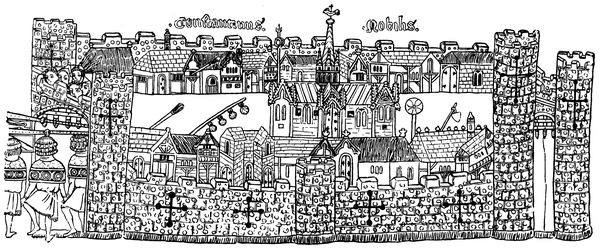
Contemporary view of a fourteenth-century walled town.
14. Battle of Nevill's Cross, and the Siege of Calais. 1346—1347.—Whilst Edward was fighting in France, the Scots invaded England, but they were defeated at Nevill's Cross, and their king, David Bruce (David II.), taken prisoner. Edward, when the news reached him, had laid siege to Calais. In this siege cannon,[18] which had been used in earlier sieges of the war, were employed, but they were too badly made and loaded with too little gunpowder to do much damage. (p. 243) In 1347 Calais was starved into surrender, and Edward, who regarded the town as a nest of pirates, ordered six of the principal burgesses to come out with ropes round their necks, as a sign that they were to be put to death. It was only at Queen Philippa's intercession that he spared their lives, but he drove every Frenchman out of Calais, and peopled it with his own subjects. A truce with Philip was agreed on, and Edward returned to England.
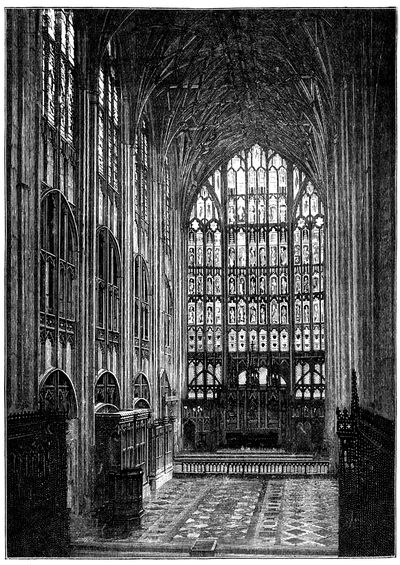
Gloucester Cathedral. The choir, looking east: built between 1340 and 1350.
15. Constitutional Progress. 1337—1347.—Edward III. had begun his reign as a constitutional ruler, and on the whole he had no reason to regret it. In his wars with France and Scotland he had the popular feeling with him, and he showed his reliance on it when, in 1340, he consented to the abolition of his claim to impose tallage on his demesne lands (see p. 221)—the sole fragment of unparliamentary taxation legally retained by the king after the Confirmatio Cartarum. In 1341 the two (p. 244) Houses of Parliament finally separated from one another, and when Edward picked a quarrel with Archbishop Stratford, the Lords successfully insisted that no member of their House could be tried excepting by his peers. The Commons, on the other hand, were striving—not (p. 245) always successfully—to maintain their hold upon taxation. In 1341 they made Edward a large money grant on condition of his yielding to their demands, and Edward (whose constitutional intentions were seldom proof against his wish to retain the power of the purse) shamelessly broke his engagement after receiving the money. On other occasions the Commons were more successful; yet, after all, the composition of their House was of more importance than any special victory they might gain. In it the county members—or knights of the shire—sat side by side with the burgesses of the towns. In no other country in Europe would this have been possible. The knights of the shire were gentlemen, who on the Continent were reckoned amongst the nobility, and despised townsmen far too much to sit in the same House with them. In England there was the same amalgamation of classes in Parliament (p. 246) as on the battle-field. When once gentlemen and burgesses formed part of the same assembly, they would come to have common interests; and, in any struggle in which the merchants were engaged, it would be a great gain to them that a class of men trained to arms would be inclined to take their part.
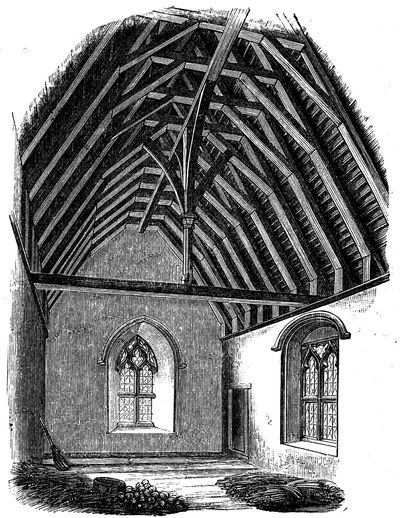
The upper chamber or solar at Sutton Courtenay manor-house. Date, about 1350.
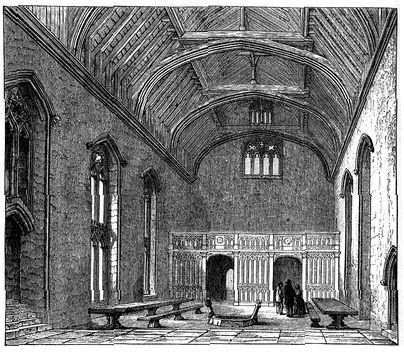
Interior of the Hall at Penshurst, Kent: showing the screen with minstrels' gallery over it, and the brazier for fire in the middle: built about 1340.
16. Edward's Triumph. 1347.—Edward's return after the surrender of Calais was followed by an outburst of luxury. As the sea-rovers of Normandy and Calais had formerly plundered Englishmen, English landsmen now plundered Normandy and Calais. "There was no woman who had not gotten garments, furs, feather-beds, and utensils from the spoils." Edward surrounded himself with feasting and jollity. About this time he instituted the Order of the Garter, and his tournaments were thronged with gay knights and gayer ladies in gorgeous attires. The very priests caught the example, and decked themselves in unclerical garments. Even architecture lent itself to the prevailing taste for magnificence. The beautiful Decorated style which had come into use towards the (p. 247) end of the reign of Edward I.—and which may be seen[19] in the central tower of Lincoln Cathedral (see p. 227), in the west front of Howden Church (see p. 230), and in the nave of York Minster (see p. 238)—was, in the reign of Edward III., superseded by the Perpendicular style, in which beauty of form was abandoned for the sake of breadth, as in the choir of Gloucester and the nave of Winchester (see pp. 244, (p. 248) 276). Roofs become wide, as in the Hall of Penshurst (see p. 246), and consequently halls were larger and better adapted to crowded gatherings than those at Meare and Norborough (p. 247).
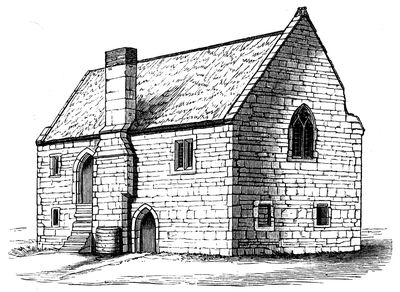
A small house or cottage at Meare, Somerset. Built about 1350.
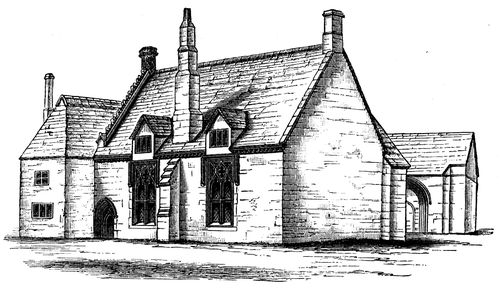
Norborough Hall, Northamptonshire. A manor-house built about 1350. The dormer windows and addition to the left are of much later date.
17. The Black Death. 1348.—In the midst of this luxurious society arrived, in 1348, a terrible plague which had been sweeping over Asia and Europe, and which in modern times has been styled the Black Death. No plague known to history was so destructive of life. Half of the population certainly perished, and some think that the number of those who died must be reckoned at two-thirds.

Ploughing.
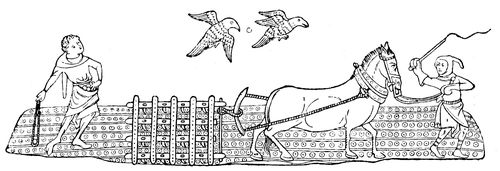
Harrowing. A boy slinging stones at the birds.
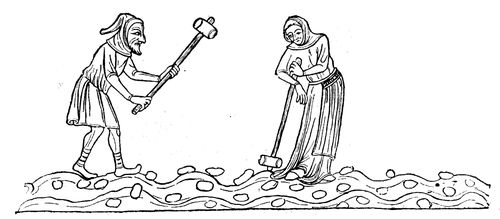
Breaking the clods with mallets.
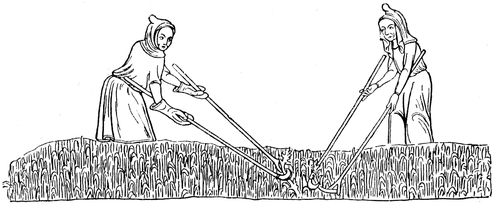
Cutting weeds.
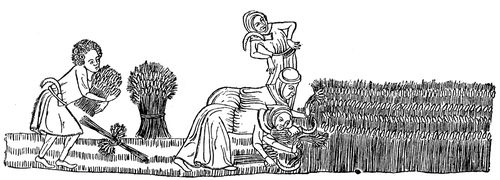
Reaping.
18. The Statute of Labourers. 1351.—This enormous destruction of life could not fail to have important results on the economic condition of the country. The process of substituting money rents for labour service, which had begun some generations before (see p. 168), had become very general at the accession of Edward III. so that the demesne land which the lord kept in his own hands was on most estates cultivated by hired labour. Now, when at least half of the labourers had disappeared, those who remained, having less competition to fear, demanded higher wages, whilst at the same time the price of the produce of the soil was the same or less than it had been before. The question affected not merely (p. 249) the great lords but the smaller gentry as well. The House of Commons, which was filled with the smaller gentry and the well-to-do townsmen—who were also employers of labour—was therefore as eager as the House of Lords to keep down wages. In 1351 the Statute of Labourers was passed, fixing a scale of wages at the rates which had been paid before the Black Death, and ordering punishments to be inflicted on those who demanded more. It is not necessary to suppose that the legislators had any (p. 250) tyrannical intentions. For ages all matters relating to agriculture had been fixed by custom; and the labourers were outrageously violating custom. Custom, however, here found itself in opposition to the forces of nature, and though the statute was often renewed, with increasing penalties, it was difficult to secure obedience to it in the teeth of the opposition of the labourers. The chief result of the statute was that it introduced an element of discord between two classes of society.
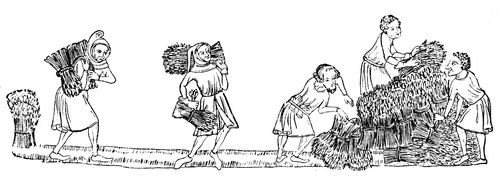
Stacking corn.
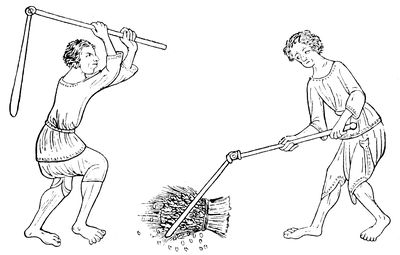
Threshing corn with the flail.
19. The Statute of Treasons. 1352.—In 1352 was passed the Statute of Treasons, by which the offences amounting to treason were defined, the chief of them being levying war against the (p. 251) king. As no one but a great nobleman was strong enough even to think of levying war against the king, this statute may be regarded as a concession to the wealthier landowners rather than to the people at large.
20. The Black Prince in the South of France. 1355.—In 1350 Philip VI. of France died, and was succeeded by his son John. The truce (see p. 243) was prolonged, and it was not till 1355 that war was renewed. Edward himself was recalled to England by fresh troubles in Scotland, but the Black Prince landed at Bordeaux and marched through the south of France, plundering as he went. Neither father nor son seems to have had any idea of gaining their ends except by driving the French by ill-treatment into submission. "You must know," wrote a contemporary in describing the condition of southern Languedoc, "that this was, before, one of the fat countries of the world, the people good and simple, who did not know what war was, and no war had ever been waged against them before the Prince of Wales came. The English and Gascons found the country full and gay, the rooms furnished with carpets and draperies, the caskets and chests full of beautiful jewels; but nothing was safe from these robbers." The Prince returned to Bordeaux laden with spoils.
21. The Battle of Poitiers. 1356.—In 1356 the Black Prince swept over central France in another similar plundering expedition. He was on his way back with his plunder to Bordeaux with no more than 8,000 men to guard it when he learnt as he passed near Poitiers that King John was close to him with 50,000. He drew up his little force on a rising ground amidst thick vineyards, with a hedge in front of him behind which he could shelter his archers. As at Creçy, the greater part of the English horsemen were dismounted, and John, thinking that therein lay their secret of success, ordered most of his horsemen to dismount as well, not having discovered that though spearmen on foot could present a formidable resistance to a cavalry charge, they were entirely useless in attacking a strong position held by archers. Then he sent forward 300 knights who retained their horses, bidding a strong body of dismounted horsemen to support them. The horsemen, followed by the footmen, charged at a gap in the hedge, but the hedge on either side was lined with English bowmen, and men and horses were struck down. Those who survived fled and scattered their countrymen behind. Seeing the disorder, the Black Prince ordered the few knights whom he had kept on horseback to sweep round and to fall upon the confused crowd in the flank. The (p. 252) archers advanced to second them, and, gallantly as the French fought, their unhorsed knights could accomplish nothing against the combined efforts of horse and foot. King John was taken prisoner and the battle was at an end.
22. The Courtesy of the Black Prince.—The Black Prince had been cruel to townsmen and peasants, but he was a model of chivalry, and knew how to deal with a captive king. At supper he stood behind John's chair and waited on him, praising his bravery. "All on our side," he said, "who have seen you and your knights, are agreed about this, and give you the prize and the chaplet if you will wear it." After the astounding victory of Poitiers, the Black Prince, instead of marching upon Paris, went back to Bordeaux. In 1357 he made a truce for two years and returned to England with his royal captive.
23. Misery of France. 1356—1359.—In 1356, the year in which the Black Prince fought at Poitiers, his father ravaged Scotland. Edward, however, gained nothing by this fresh attempt at conquest. In his retreat he suffered heavy loss, and in 1357, changing his plan, he replaced David Bruce (see p. 242) on the throne, and strove to win the support of the Scots instead of exasperating them by violence. In the meanwhile the two years' truce brought no good to France. The nobles wrung from the peasants the sums needed to redeem their relatives, who were prisoners in England, and the disbanded soldiers, French and English, formed themselves into free companies and plundered as mercilessly as the Black Prince had done in time of war. Worn down with oppression, the French peasants broke into a rebellion known as the Jacquerie, from the nickname of Jacques-Bonhomme, which the gentry gave to them. After committing unheard-of cruelties the peasants were repressed and slaughtered. An attempt of the States-General—a sort of French Parliament which occasionally met—to improve the government failed. Peace with England was talked of, but Edward's terms were too hard to be accepted, and in 1359 war began again.
24. Edward's Last Invasion. 1359—1360.—So miserably devastated was France that Edward, when he invaded the country in 1359, had to take with him not only men and munitions of war, but large stores of provisions. He met no enemy in the field, but the land had been so wasted that his men suffered much from want of food, in spite of the supplies which they had taken with them. "I could not believe," wrote an Italian who revisited France after an absence of some years, "that this was the same (p. 253) kingdom which I had once seen so rich and flourishing. Nothing presented itself to my eyes but a fearful solitude, an extreme poverty, land uncultivated, houses in ruins. Even the neighbourhood of Paris manifested everywhere marks of destruction and conflagration. The streets were deserted; the roads overgrown with weeds; the whole a vast solitude." In the spring of 1360 Edward moved on towards the banks of the Loire, hoping to find sustenance there. Near Chartres he was overtaken by a terrible storm of hail and thunder, and in the roar of the thunder he thought that he heard the voice of God reproving him for the misery which he had caused. He abated his demands and signed the treaty of Bretigni.
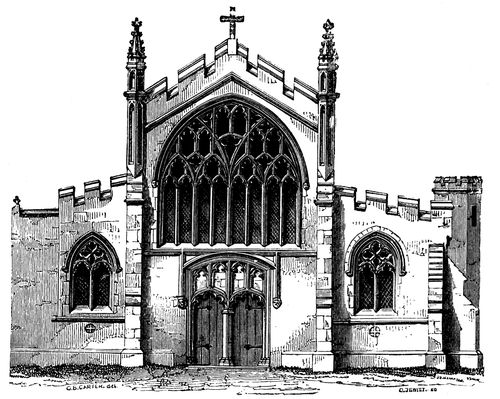
West front of Edington Church, Wilts: built about 1360. An example of the transition from the Decorated style to the Perpendicular.
25. The Treaty of Bretigni. 1360.—By the treaty of Bretigni John was to be ransomed for an enormous sum; Edward was to surrender his claim to the crown of France and to the provinces north of Aquitaine, receiving in return the whole of the duchy of Aquitaine together with the districts round Calais and Ponthieu, all of them to be held in full sovereignty, without any feudal obligation (p. 254) to the king of France. Probably it cost Edward little to abandon his claim to the French crown, which had only been an after-thought; and it was a clear gain to get rid of those feudal entanglements which had so frequently been used as a pretext of aggression against the English kings. It was hardly likely, however, that England would long be able to keep a country like Aquitaine, which was geographically part of France and in which French sympathies were constantly on the increase. "We will obey the English with our lips," said the men of Rochelle, when their town was surrendered, "but our hearts shall never be moved towards them."[Back to Contents]
LEADING DATES
Reign of Edward III., 1327—1377
1. The First Years of Peace. 1360—1364.—To hold his new provinces the better, Edward sent the Black Prince to govern them in 1363 with the title of Duke of Aquitaine. King John had been liberated soon after the making of the peace, and had been allowed to return to France on payment of part of his ransom, and on giving hostages for the payment of the remainder. In 1363 one of the hostages, his son, the Duke of Anjou, broke his parole and fled, on which John, shocked at such perfidy, returned to England to make excuses for him, and died there in 1364. If honour, he said, were not to be found elsewhere, it ought to be found in the breasts of kings.
2. The Spanish Troubles. 1364—1368.—John's eldest son and successor, Charles V., known as the Wise, or the Prudent, was less chivalrous, but more cautious than his father, and soon found an opportunity of stirring up trouble for the Black Prince without exposing his own lands to danger. Pedro the Cruel, king of Castile, who had for some time been the ally of England, had murdered (p. 255) his wife, tyrannised over his nobles, and contracted an alliance with the Mohammedans of Granada. The Pope having excommunicated him, his own illegitimate brother, Henry of Trastamara, claimed the crown, and sought aid of the king of France. Charles V. sent Bertrand du Guesclin, a rising young commander, to his help. Du Guesclin's army was made up of men of the Free Companies (see p. 252), which still continued to plunder France on their own account after the Peace of Bretigni. In this way Charles got rid of a scourge of his own country at the same time that he attacked an ally of the English. In 1366 Du Guesclin entered Spain. The tyrannical Pedro took refuge at Bayonne, where he begged the Black Prince to help him. The Gascon nobles pleaded with the Prince to reject the monster, but the Prince was not to be held back. "It is not a right thing or reasonable," he said, when they urged him to keep aloof from the unjust undertaking to which he invited them, "that a bastard should hold a kingdom, and thrust out of it, and of his heritage, a brother and heir of the land by legal marriage. All kings and sons of kings should never agree nor consent to it, for it is a great blow at the royal state." In 1367 the Black Prince entered Spain, and with the help of his English archers thoroughly defeated Henry at Navarrete. Then vengeance overtook him on the side on which he had sinned. Pedro was as false as he was cruel, and refused to pay the sums which he had engaged to furnish to the Prince's troops. Sickness broke out in the English ranks, and the Black Prince returned to Bordeaux with only a fifth part of his army, and with his own health irretrievably shattered. In 1368 Henry made his way back to Spain, defeated and slew Pedro, and undid the whole work of the Black Prince to the south of the Pyrenees.
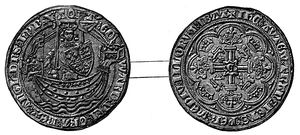
A gold noble of Edward III., struck between A.D. 1360 and 1369.
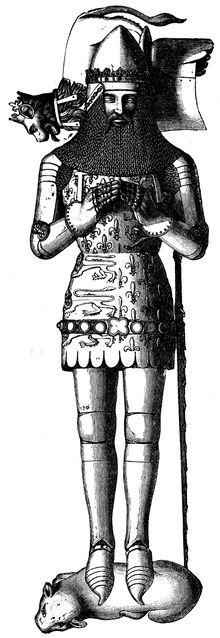
Effigy of Edward the Black Prince, from his tomb at Canterbury: showing the type of armour worn from 1335 to 1400.
(p. 256) 3. The Taxation of Aquitaine. 1368—1369.—Worse than this was in store for the Black Prince. As his soldiers clamoured for their wages, he levied a hearth tax to supply their needs. The Aquitanian Parliament declared against the tax, and appealed to the king of France to do them right. In 1369 Charles, who knew that the men of Aquitaine would be on his side, summoned the Black Prince to Paris to defend his conduct, on the pretext that, as there had been some informality in the treaty of Bretigni, he was himself still the feudal superior of the Duke of Aquitaine. "Willingly," replied the Black Prince when he received the summons, "we will go to the court of Paris, as the king of France orders it; but it shall be with helmet on head and sixty thousand men with us."
4. The Renewed War. 1369—1375.—Edward, by the advice of Parliament, resumed the title of King of France, and war broke out afresh in 1369. The result of the first war had been owing to the blunders of the French in attacking the English archers with the feudal cavalry. Charles V. and his commander, Du Guesclin, resolved to fight no battles. Their troops hung about the (p. 257) English march, cut off stragglers, and captured exposed towns. The English marched hither and thither, plundering and burning, but their armies, powerful as they were when attacked in a defensive position, could not succeed in forcing a battle, and were worn out without accomplishing anything worthy of their fame. The Black Prince, soured by failure and ill-health, having succeeded in 1370 in recapturing Limoges, ordered his men to spare no one in the town. "It was great pity," wrote the chronicler Froissart, "for men, women, and children threw themselves on their knees before the Prince, crying 'Mercy! mercy! gentle Sire!'" The Prince, who had waited at table behind a captive king, hardened his heart. More than three thousand—men, women and children—were butchered on that day. Yet the spirit of chivalry was strong within him, and he spared three gentlemen who fought bravely merely in order to sell their lives dearly. In 1371 the Black Prince was back in England. His eldest surviving brother, John of Gaunt—or Ghent—Duke of Lancaster, continued the war in France. In 1372 the English lost town after town. In 1373 John of Gaunt set out from Calais. He could plunder, but he could not make the enemy fight. "Let them go," wrote Charles V. to his commanders; "by burning they will not become masters of your heritage. Though storms rage over a land, they disperse of themselves. So will it be with these English." When the English reached the hilly centre of France food failed them. The winter came, and horses and men died of cold and want. A rabble of half-starved fugitives was all that reached Bordeaux after a march of six hundred miles. Aquitaine, where the inhabitants were for the most part hostile to the English, and did everything in their power to assist the French, was before long all but wholly lost, and in 1375 a truce was made which put an end to hostilities for a time, leaving only Calais, Cherbourg, Brest, Bayonne, and Bordeaux in the hands of the English.
5. Anti-Papal Legislation. 1351—1366.—The antagonism between England and France necessarily led to an antagonism between England and the Papacy. Since 1305 the Popes had fixed their abode at Avignon, and though Avignon was not yet incorporated with France, it was near enough to be under the control of the king of France. During the time of this exile from Rome, known to ardent churchmen as the Babylonian captivity of the Church, the Popes were regarded in England as the tools of the French enemy. The Papal court, too, became distinguished for luxury and vice, and its vast expenditure called for supplies which England was increasingly (p. 258) loth to furnish. By a system of provisions, as they were called, the Pope provided—or appointed beforehand—his nominees to English benefices, and expected that his nominees would be allowed to hold the benefices to the exclusion of those of the patrons. In 1351 the Statute of Provisors[20] attempted to put an end to the system, but it was not immediately successful, and had to be re-enacted in later years. In 1353 a Statute of Præmunire[21] was passed, in which, though the Pope's name was not mentioned, an attempt was made to stop suits being carried before foreign courts—in other words before the Papal court at Avignon. Another claim of the Popes was to the 1,000 marks payable annually as a symbol of John's vassalage, a claim most distasteful to Englishmen as a sign of national humiliation. Since 1333, the year in which Edward took the government into his own hands, the payment had not been made, and in 1366 Parliament utterly rejected a claim made by the Pope for its revival.
6. Predominance of the English Language.—The national spirit which revealed itself in an armed struggle with the French and in a legal struggle with the Papacy showed itself in the increasing predominance of the English language. In 1362 it supplanted French in the law courts, and in the same year Parliament was opened with an English speech. French was still the language of the court, but it was becoming a foreign speech, pronounced very differently from the 'French of Paris.'
7. Piers the Plowman. 1362.—Cruel as had been the direct results of the English victories in France, they had indirectly contributed to the overthrow of that feudalism which weighed heavily upon France and upon all Continental Europe. The success of the English had been the success of a nation strong in the union of classes. The cessation of the war drove the thoughts of Englishmen back upon themselves. The old spiritual channels had been, to a great extent, choked up. Bishops were busy with the king's affairs; monks had long ceased to be specially an example to the world; and even the friars had fallen from their first estate, and had found out that, though they might personally possess nothing, their order might be wealthy. The men who won victories in France came home to spend their booty in show and luxury. Yet, for all the splendour around, there was a general feeling that the times were out of joint, and this feeling was strengthened by a fresh inroad (p. 259) of the Black Death in 1361. To the prevalent yearning for a better life, a voice was given by William Langland, whose Vision of Piers the Plowman appeared in its first shape in 1362. In the opening of his poem he shows to his readers the supremacy of the Maiden Meed—bribery—over all sorts and conditions of men, lay and clerical. Then he turns to the purification of this wicked world. They who wish to eschew evil and to do good inquire their way to Truth—the eternal God—and find their only guide in 'Piers the Plowman.' The simple men of the plough, who do honest work and live upright lives, know how to find the way to Truth. That way lies not through the inventions of the official Church, the pardons and indulgences set up for sale. "They who have done good shall go into eternal life, but they who have done evil into eternal fire." Langland's teaching, in short, is the same as that of the great Italian poet, Dante, who, earlier in the century, had cried aloud for the return of justice and true religion. He stands apart from Dante and from all others of his time in looking for help to the despised peasant. No doubt his peasant was idealised, as no one knew better than himself; but it was honesty of work in the place of dishonest idleness which he venerated. It was the glory of England to have produced such a thought far more than to have produced the men who, heavy with the plunder of unhappy peasants, stood boldly to their arms at Creçy and Poitiers. He is as yet hardly prepared to say what is the righteousness which leads to eternal life. It is not till he issues a second edition in 1377 that he can answer. To do well, he now tells us, is to act righteously to all in the fear of God. To do better is to walk in the way of love: "Behold how good a thing it is for brethren to dwell in unity." To do best is to live in fellowship with Christ and the Church, and in all humility to bring forth the fruits of the Divine communion.
8. The Anti-Clerical Party. 1371.—Langland wished to improve, not to overthrow, existing institutions, but for all that his work was profoundly revolutionary. They who call on those who have left their first love to return to it are seldom obeyed, but their voice is often welcomed by the corrupt and self-seeking crowd which is eager, after the fashion of birds of prey, to tear the carcase from which life has departed. A large party was formed in England, especially amongst the greater barons, which was anxious to strip the clergy of their wealth and power, without any thought for the better fulfilment of their spiritual functions. In the Parliament of 1371 bishops were declared unfit to hold offices of state. Amongst others who (p. 260) were dismissed was William of Wykeham, the Bishop of Winchester. He was a great architect and administrator, and having been deprived of the Chancellorship used his wealth to found at Winchester the first great public school in England. By this time a Chancellor was no longer what he had been in earlier days (see p. 127), a secretary to the king. He was now beginning to exercise equitable jurisdiction—that is to say, the right of deciding suits according to equity, in cases in which the strict artificial rules of the ordinary courts stood in the way of justice.
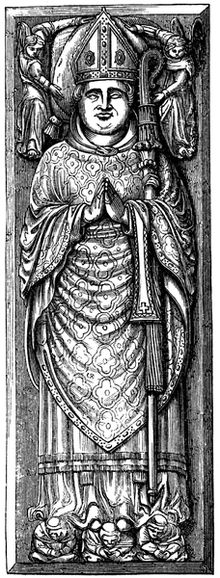
William of Wykeham, Bishop of Winchester, 1367-1404: from his tomb at Winchester.
9. The Duke of Lancaster. 1374—1376.—In 1374, as soon as the Duke of Lancaster returned from his disastrous campaign (see p. 257), he put himself at the head of the baronial and anti-clerical party. He was selfish and unprincipled, but he had enormous wealth, having secured the vast estates of the Lancaster family by his marriage with Blanche, the granddaughter of the brother of Thomas of Lancaster, the opponent of Edward II. Rich as he was he wished to be richer, and he saw his opportunity in an attack upon the higher clergy, which might end in depriving them not only of political power, but of much of their ecclesiastical property as well. His accession to the baronial party was of the greater importance because he was now practically the first man in the state. The king was suffering from softening of the brain, and had fallen under the influence of a greedy and unscrupulous mistress, Alice Perrers, whilst the Black Prince was disqualified by illness from taking part in the management of affairs. A bargain was struck between the Duke and Alice Perrers, who was able to obtain the consent of the helpless king to anything she pleased. She even sat on the bench with the judges, intimidating them into deciding in favour of the suitors who had bribed her most highly. It seemed as if Langland's (p. 261) Meed (see p. 259) had appeared in person. The king's patronage was shared between her and Lancaster.
10. John Wycliffe. 1366—1376.—If Lancaster's character had been higher, he might have secured a widespread popularity, as the feeling of the age was adverse to the continuance of a wealthy clergy. Even as things were, he had on his side John Wycliffe, the most able reasoner and devoted reformer of his age, who, like others before and after him, imagined that a high spiritual enterprise could be achieved with the help of low and worldly politicians. Wycliffe had distinguished himself at Oxford, and had attracted Lancaster's notice by the ability of his argument against the Pope's claim to levy John's tribute (see p. 258). In 1374 he had been sent to Bruges to argue with the representatives of the Pope on the question of the provisions, and by 1376 had either issued, or was preparing to issue, his work On Civil Lordship, in which, by a curious adaptation of feudal ideas, he declared that all men held their possessions direct from God, as a vassal held his estate from his lord; and that as a vassal was bound to pay certain military services, failing which he lost his estate, so everyone who fell into mortal sin failed to pay his service to God, and forfeited his right to his worldly possessions. In this way dominion, as he said, was founded on grace—that is to say, the continuance of man's right to his possessions depended on his remaining in a state of grace. It is true that Wycliffe qualified his argument by alleging that he was only announcing theoretical truth, and that no man had a right to rob another of his holding because he believed him to be living in sin. It is evident, however, that men like Lancaster would take no heed of this distinction, and would welcome Wycliffe as an ally in the work of despoiling the clergy for their own purposes.
11. Lancaster and the Black Prince. 1376.—Ordinary citizens, who cared nothing for theories which they did not understand, were roused against Lancaster by the unblushing baseness of his rule. Nor was this all. The anti-clerical party was also a baronial party, and ever since the Knights Bachelors of England had turned to the future Edward I. to defend them against the barons who made the Provisions of Oxford (see p. 199), the country gentry and townsmen had learnt the lesson that they would be the first to suffer from the unchecked rule of the baronage. They now had the House of Commons to represent their wishes, but as yet the House of Commons was too weak to stand alone. At last it was rumoured that when the Black Prince died his young son Richard was to be set aside, and that Lancaster was to claim the inheritance of the (p. 262) crown, as an earlier John had claimed it in the place of the youthful Arthur. The Black Prince awoke from his lethargy, and stood forward as the leader of the Commons.
12. The Good Parliament. 1376.—A Parliament, known as the Good Parliament, met in 1376, and, strong through the Black Prince's support, the Commons refused to grant supply till an account of the receipts and expenditure had been laid before them. "What," cried Lancaster, "do these base and ignoble knights attempt? Do they think they be the kings and princes of the land? I think they know not what power I am of. I will therefore, early in the morning, appear unto them so glorious, and will show such power among them, and with such vigour I will terrify them that neither they nor theirs shall dare henceforth to provoke me to wrath." Lancaster soon found that his brother was stronger than he. The Commons obtained a new Council, in which Wykeham was included and from which Lancaster was shut out. They then proceeded to accuse before the House of Lords Richard Lyons and Lord Latimer of embezzling the king's revenue. Lyons, accustomed to the past ways of the court, packed 1,000l. in a barrel and sent it to the Black Prince. The Black Prince returned the barrel and the money, and the Lords condemned Lyons to imprisonment. Latimer was also sentenced to imprisonment, but he was allowed to give bail and regained his liberty. These two cases are the first instances of the exercise of the right of impeachment—that is to say, of the accusation of political offenders by the Commons before the Lords. Alice Perrers was next driven from court.
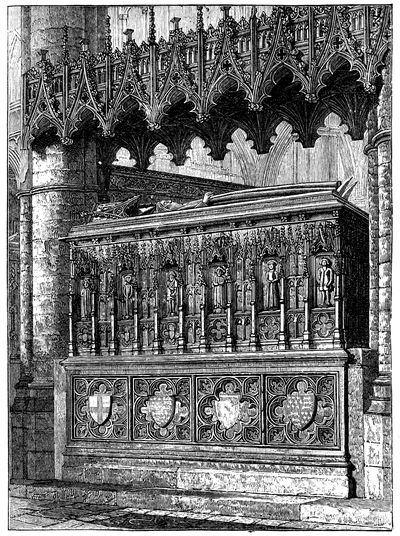
Tomb of Edward III. in Westminster Abbey.
13. The Last Year of Edward III. 1376—1377.—Whilst Parliament was still sitting the Black Prince, worn out by his exertions, died. His son, young Richard, was at once recognised as heir to the throne. Lancaster, however, regained his influence over his doting father. Alice Perrers and Lord Latimer found their way back to court. The Speaker of the House of Commons was thrown into prison. Frivolous charges were brought against Wykeham, who was deprived of his temporalities and banished from the court. In 1377 a new Parliament, elected under Lancaster's influence, reversed all the proceedings of the Good Parliament, and showed how little sympathy the baronial party had with the people by imposing a poll tax of 4d. a head on all except beggars, thus making the payment of a labourer and a duke equal. The bishops, unable to strike at Lancaster, struck at Wycliffe, as his creature. Wycliffe was summoned to appear before an ecclesiastical (p. 263) court at St. Paul's, presided over by Courtenay, the Bishop of London. He came supported by Lancaster and a troop of Lancaster's followers. Hot words were exchanged between them and the Bishop. The London crowd took their Bishop's part and the Duke was compelled to flee for his life. In the summer of 1377 (p. 264) Edward III. died, deserted by everyone, Alice Perrers making off, after robbing him of his finger-rings.
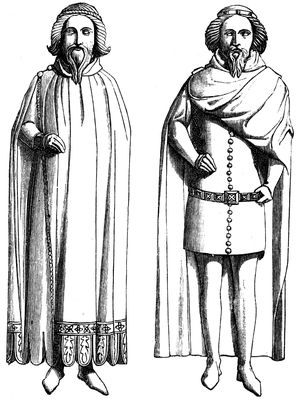
Figures of Edward, the Black Prince, and Lionel, Duke of Clarence, from the tomb of Edward III.; illustrating the ordinary costume of gentlemen at the end of the fourteenth century.
14. Ireland from the Reign of John to that of Edward II.—When England was gradually losing its hold on France, what hold it had had on Ireland was gradually slipping away. Henry II. had been quite unable to effect in Ireland the kind of conquest which William the Conqueror had effected in England. William had succeeded because he had been able to secure order by placing himself at the head of the conquered nation. In Ireland, in the first place, the king was a perpetual absentee; and, in the second place, there was no Irish national organisation at the head of which he could have placed himself, even if he had from time to time visited the island. There were separate tribes, each one attached to its own chief and to its own laws and customs. They were unable to drive out their feudal conquerors; but in the outlying parts of the country, they were able to absorb them, just as the English in their own country absorbed their Norman conquerors. The difference was that in England the conquerors were absorbed into a nation: in Ireland they were absorbed into the several tribes. The few who retained the English laws and habits were, for the most part, confined to the part of Ireland in the neighbourhood of Dublin, which was specially accessible to English influences. In 1315 Edward Bruce, the brother of Robert Bruce, (p. 265) invaded Ireland, and, though he was ultimately defeated and slain, he did enough to shatter the power of the English nobility; and it was mainly in consequence of his partial success that the authority of the English government was, for some time to come, limited to a certain district round Dublin, known about a century later as the English Pale, the extent of which varied from time to time.
15. The Statute of Kilkenny. 1367.—As long as the French wars lasted the attention of the English Government was diverted from Ireland. In 1361, however, the year after the Treaty of Bretigni, the king's son, Lionel Duke of Clarence, was sent to extend English rule. In 1367 he gathered a Parliament of the English colonists. This Parliament passed the Statute of Kilkenny, by which the relations between the two races were defined. Within the Pale English laws and customs were to prevail, and even Irishmen living there were to be debarred from the use of their own language. Beyond the Pale the Irish were to be left to themselves, communication between the two peoples being cut off as much as possible. The idea of conquering Ireland was abandoned, and the idea of maintaining a colony on a definite part of Irish soil was substituted for it. The Statute of Kilkenny was, in short, a counterpart of the Treaty of Bretigni. In both cases Edward III. preferred the full maintenance of his authority over a part of a country to its assertion over the whole.
16. Weakness of the English Colony. 1367—1377.—It takes two to make a bargain, and the Irish were not to be prevented from encroaching on the English because the English had resolved no longer to encroach upon them. The renewal of the war with France in 1369 made it impossible to send help from England, and during the latter part of the reign of Edward III. the Irish pillaged freely within the English territory, constantly winning ground from their antagonists.
Genealogy of the more important Sons of Edward III.
| Edward III. d. 1377 |
|||||||||||||
| Edward, the Black Prince, d. 1376 |
Lionel, Duke of Clarence, d. 1368 |
John of Gaunt, Duke of Lancaster, d. 1399 |
Edmund, Duke of York, d. 1402 |
Thomas, Duke of Gloucester, d. 1397 |
|||||||||
| [Back to Contents] | |||||||||||||
LEADING DATES
Reign of Richard II., 1377-1399
1. The First Years of Richard II. 1377—1378.—"Woe to the land," quoted Langland from Ecclesiastes, in the second edition of Piers the Plowman, "when the king is a child." Richard was but ten years of age when he was raised to the throne. The French plundered the coast, and the Scots plundered the Borders. In the presence of such dangers Lancaster and Wykeham forgot their differences, and as Lancaster was too generally distrusted to allow of his acting as regent, the council governed in the name of the young king. Lancaster, however, took the lead, and renewed the war with France with but little result beyond so great a waste of money as to stir up Parliament to claim a control over the expenditure of the Crown.
2. Wycliffe and the Great Schism. 1378—1381.—In 1378 began the Great Schism. For nearly half a century from that date there were two Popes, one at Avignon and one at Rome. Wycliffe had been gradually losing his reverence for a single Pope, and he had none left for two. He was now busy with a translation of the Bible into English, and sent forth a band of "poor priests," to preach the simple gospel which he found in it. He was thus brought into collision with the pretensions of the priesthood, and was thereby led to question the doctrines on which their authority was based. In 1381 he declared his disbelief in the doctrine of transubstantiation, and thereby denied to priests that power "of making the body of Christ," which was held to mark them off from their fellow-men. In any case, so momentous an announcement would have cost Wycliffe the hearts of large numbers of his supporters. It was the more fatal to his influence as it was coincident with social disorders, the blame for which was certain, rightly or wrongly, to be laid at his door.
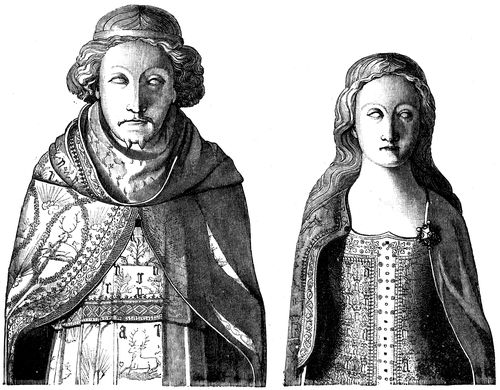
Richard II. and his first queen, Anne of Bohemia: from the gilt-latten effigies on their tomb in Westminster Abbey, made by Nicholas Broker and Godfrey Prest, coppersmiths of London, in 1395.
(p. 267) 3. The Poll-taxes. 1379—1381.—The disastrous war with France made fresh taxation unavoidable. In 1379 a poll-tax was imposed by Parliament on a graduated scale, reaching from the 6l. 13s. 4d. required of a duke, to the groat or 4d., representing (p. 268) in those days at least the value of 4s. at the present day, required of the poorest peasant. A second poll-tax in 1380 exacted no less than three groats from every peasant, and from every one of his unmarried children above the age of fifteen. In 1381 a tiler of Dartford in Kent struck dead a collector who attempted to investigate his daughter's age in an indecent fashion. His neighbours took arms to protect him. In an incredibly short time the peasants of the east and south of England rose in insurrection.
4. The Peasants' Grievances.—The peasants had other grievances besides the weight of taxation thrown on them by a Parliament in which they had no representatives. The landlords, finding it impossible to compel the acceptance of the low wages provided for by the Statute of Labourers (see p. 248), had attempted to help themselves in another way. Before the Black Death the bodily service of villeins had been frequently commuted into a payment of money which had been its fair equivalent, but which, since the rise of wages consequent upon the Black Death, could not command anything like the amount of labour surrendered. The landlords in many places now declared the bargain to have been unfair, and compelled the villeins to render once more the old bodily service. The discontent which prevailed everywhere was fanned not merely by the attacks made by Wycliffe's poor priests upon the idle and inefficient clergy, but by itinerant preachers unconnected with Wycliffe, who denounced the propertied classes in general. One of these, John Ball, a notorious assailant of the gentry, had been thrown into prison. His favourite question was—
When Adam delved and Eve span
Who was then a gentleman?
5. The Peasants' Revolt. 1381.—From one end of England to another the revolt spread. The parks of the gentry were broken into, the deer killed, the fish-ponds emptied. The court-rolls which testified to the villeins' services were burnt, and lawyers and all others connected with the courts were put to death without mercy. From Kent and Essex 100,000 enraged peasants, headed by Wat Tyler and Jack Straw, released John Ball from gaol and poured along the roads to London. They hoped to place the young Richard at their head against their enemies the gentry. The boy was spirited enough, and in spite of his mother's entreaties insisted on leaving the Tower, and being rowed across the Thames to meet the insurgents on the Surrey shore. Those who were with him, however, refused to allow him to land. The peasants had sympathisers (p. 269) in London itself, who allowed them to break into the city. Lancaster's palace of the Savoy and the houses of lawyers and officials were sacked and burnt. All the lawyers who could be found were murdered, and others who were not lawyers shared their fate. The mob broke into the Tower, and beheaded Simon of Sudbury, Archbishop of Canterbury, who had, as Chancellor, proposed the obnoxious taxes to Parliament.
6. The Suppression of the Revolt.—The boy-king met the mob at Mile-End, and promised to abolish villeinage in England. Charters of manumission were drawn out and sealed, and a great part of the insurgents returned contentedly home. About 30,000, however, remained behind. When Richard came amongst them at Smithfield, Wat Tyler threatened him, and Walworth, the Mayor of London, slew Wat Tyler with his dagger. A shout for vengeance was raised. With astonishing presence of mind Richard rode forward. "I am your king," he said; "I will be your leader." His boldness inspired the insurgents with confidence, and caused them to desist from their threats and to return to their homes. In the country the gentry, encouraged by the failure of the insurgents in London, recovered their courage. The insurrection was everywhere vigorously suppressed. Richard ordered the payment of all services due, and revoked the charters he had granted. The judges on their circuits hanged the ringleaders without mercy. When Parliament met it directed that the charters of manumission should be cancelled. Lords and Commons alike stood up for the rich against the poor, and the boy-king was powerless to resist them, and it is possible that he did not wish to do so.
7. Results of the Peasants' Revolt.—The revolt of the peasants strengthened the conservative spirit in the country. The villeinage into which the peasants had been thrust back could not, indeed, endure long, because service unwillingly rendered is too expensive to be maintained. Men were, however, no longer in a mood to listen to reformers. Great noblemen, whose right to the services of their villeins had been denied, now made common cause with the great churchmen. The propertied classes, lay and clerical, instinctively saw that they must hang together. Wycliffe's attack on transubstantiation finding little response, he was obliged to retire to his parsonage at Lutterworth, where he laboured with his pen till his death in 1384. His followers, known by the nickname of Lollards,[22] (p. 270) were, however, for some time still popular amongst the poorer classes.
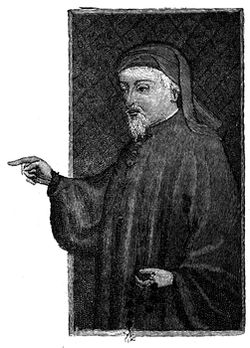
Portrait of Geoffrey Chaucer.
8. Chaucer's 'Canterbury Tales.'—A combination between the great nobles and the higher clergy might, at the end of the fourteenth century, meet with temporary success; but English society was too diversified, and each separate portion of it was too closely linked to the other to make it possible for the higher classes to tyrannise over the others for any long time. What that society was like is best seen in Chaucer's Canterbury Tales. Chaucer was in many ways the exact opposite of Langland, and was the precursor of modern literature as Wycliffe was the precursor of modern religion. He was an inimitable story-teller, with an eye which nothing could escape. He was ready to take men as he found them, having no yearning for the purification of a sinful world. Heroic examples of manly constancy and of womanly purity and devotion, are mingled in his pages with coarse and ribald tales; still, coarse and ribald as some of his narratives are, Chaucer never attempts to make vice attractive. He takes it rather as a matter of course, calling, not for reproof, but for laughter, whenever those who are doing evil place themselves in ridiculous situations.
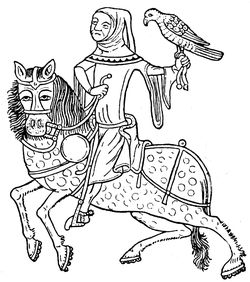
A gentleman riding out with his hawk: from the Luttrell Psalter.
9. The Prologue of the 'Canterbury Tales.'—Whilst, however, there is not one of the Canterbury Tales which fails to bring vividly before the reader one aspect or another of the life of Chaucer's day, it is in the prologue that is especially found evidence of the close connection which existed between different ranks of society. Men and women of various classes are there represented as riding (p. 271) together on a pilgrimage to the shrine of St. Thomas of Canterbury, and beguiling the way by telling stories to one another. No baron, indeed, takes part in the pilgrimage, and the villein class is represented by the reeve, who was himself a person in authority, the mere cultivator of the soil being excluded. Yet, within these limits, the whole circle of society is admirably represented. The knight, just returned from deeds of chivalry, is on the best of terms with the rough-spoken miller and the reeve, whilst the clerk of Oxford, who would gladly learn and gladly teach, and who followed in his own life those precepts which he commended to his parishioners, has no irreconcilable quarrel with the begging friar or with the official of the ecclesiastical courts, whose only object is to make a gain of godliness.
10. Chaucer and the Clergy.—In his representation of the clergy, Chaucer shows that, like Langland, he had no reverence for the merely official clergy. His "poor parson of a town," indeed, is a model for all helpers and teachers. The parson is regardless of his own comfort, ever ready to toil with mind and body for his parishioners, and, above all, resolved to set them an example, knowing
That if gold ruste, what schulde yren doo?
For if a prest be foul, on whom we truste,
No wondur is a lewid man to ruste.[23]
The final character given to him is:—
A bettre preest I trowe ther nowher non is.
He waytud after no pompe ne reverence,
Ne maked him a spiced conscience;[24]
But Cristes lore, and his apostles twelve,
He taught, and ferst he folwed[25] it himselve.
The majority amongst Chaucer's clergy are, however, of a very different kind. There is the parish clerk, who, when he is waving (p. 272) the censer in church thinks more of the pretty women there than of his duty; the monk who loves hunting, and hates work and reading; the friar who is ready to grant absolution to any one who will give money to the friars; who has a word and a jest for every man, and presents of knives and pins for the women; who takes a farthing where he cannot get a penny, but turns aside from those who have not even a farthing to give; the pardoner, who has for sale sham relics—a piece of the sail of the ship which carried St. Peter on the sea of Galilee, and a glass of pigs' bones, which he was ready to sell as bones of saints, if he could thereby extract something even from the poorest widow. He would not, he said, work with his hands like the apostles. He wanted to have money, wool, cheese, and wheat at other people's expense. Though Wycliffe had failed to reform the Church there was evidently much room for a reformer.
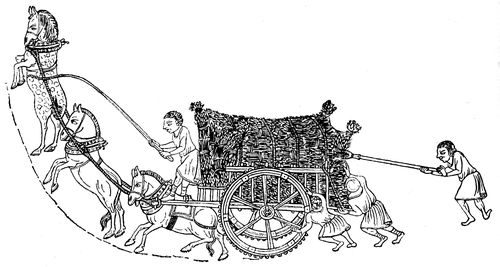
Carrying corn—a cart going uphill: from the Luttrell Psalter.
11. Roads and Bridges.—Such men as these latter did not go on pilgrimages through pure religious zeal. Villeins, indeed, were "bound to the soil," and lived and died on land which they tilled; but the classes above them moved about freely, and took pleasure in a pilgrimage, as a modern Englishman takes pleasure in a railway excursion. It was considered to be a pious work to make or repair roads and bridges, and the existence of many bridges especially was owing to the clergy. The most famous bridge in England, London Bridge, had been begun in the place of an old wooden one in 1176—in the reign of Henry II.—by a (p. 273) priest, Peter Colechurch, who obtained gifts for the purpose from notable people of all kinds. It was completed in 1209, houses being built upon it in order that their rents might pay for keeping it in good condition. Local taxes were sometimes levied to maintain the roads and bridges, and in default of these, it was held to be the duty of the owners of land to keep the communications open.
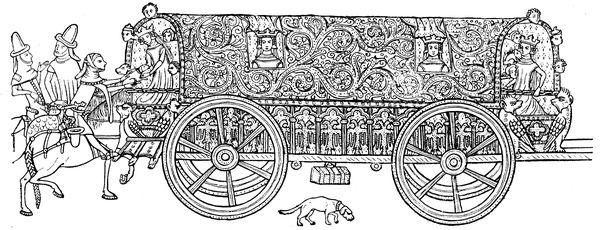
State carriage of the fourteenth century: from the Luttrell Psalter.
12. Modes of Conveyance.—In spite of these precautions, roads were often neglected, so that those who were not obliged to go on foot travelled almost entirely on horseback, women almost always riding astride like men. It was only at the end of the fourteenth century that a few ladies rode sideways. Kings and queens and exceedingly great people occasionally used lumbering but gorgeously ornamented carriages; but this was to enable them to appear in splendour, as this way of travelling must, at least in fine weather, have been far less agreeable than the ordinary ride. The only other wheeled vehicles (p. 274) in existence were the peasants' carts on two wheels, roughly made in the form of a square box either of boards or of a lighter framework. It was one of the grievances of the peasants that when the king moved from one manor to another his purveyors seized their carts to carry his property, and that though the purveyors were bound by frequently repeated statutes to pay for their hire, these statutes were often broken, and the carts sent back without payment for their use. The same purveyors often took corn and other agricultural produce, for which they paid little or nothing.
13. Hospitality and Inns.—When the king arrived in the evening at a town his numerous attendants were billeted upon the townsmen, without asking leave. Monasteries were always ready to offer hospitality to himself or to any great person, and even to provide rougher fare for the poorest stranger in a special guest-house provided for the purpose. In castles, the owner was usually glad to see a stranger of his own rank. The halls were still furnished with movable tables, as in the days before the Conquest (see p. 76), and at night mattresses were placed for persons of inferior rank on the floor, which was strewn with rushes; whilst a stranger of high rank had usually a bed in the solar (see p. 245) with the lord of the castle. Travellers of the middle class were not thought good enough to be welcomed in monasteries and castles, and were not poor enough to be received out of charity; and for them inns were provided. These inns provided beds, of which there were several in each room, and the guests then bought their provisions and fuel from the host, instead of being charged for their meals as is now the custom. From a manual of French conversation, written at the end of the fourteenth century for the use of Englishmen, it appears that cleanliness was not always to be found in these inns. "William," one traveller is supposed to say to another, "undress and wash your legs, and rub them well for the love of the fleas, that they may not leap on your legs; for there is a peck of them lying in the dust under the rushes.... Hi! the fleas bite me so, and do me great harm, for I have scratched my shoulders till the blood flows."
14. Alehouses.—By the roadside were alehouses for temporary refreshment, known by a bunch of twigs at the end of a pole, from which arose the saying that "Good wine needs no bush." The ale of the day was made without hops, which were still unknown in England, and ale would therefore only keep good for about five days.
15. Wanderers.—Besides the better class of travellers the (p. 275) roads were frequented by wanderers of all kinds, quack doctors, minstrels, jugglers, beggars, and such like. Life in the country was dull, and even great lords took pleasure in amusements which are now only to be heard of at country fairs. Any one who could play or sing was always welcome, and the verses sung were often exceedingly coarse. A tumbler who could stand on his head or balance a heavy article at the end of a stick balanced on his chin, or the leader of a performing bear, was seldom turned away from the door, whilst the pedlar went from place to place, supplying the wants which are now satisfied in the shop of the village or the neighbouring town.
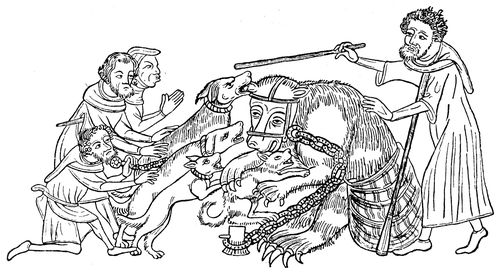
Bear-baiting: from the Luttrell Psalter.
16. Robbers and Criminals.—The roads, indeed, were not always safe. Outlaws who had escaped from the punishment due to their crimes took refuge in the broad tracts of forest land which occupied much of the soil which has since been cultivated, shot the king's deer, and robbed merchants and wealthy travellers, leaving the poor untouched, like the legendary Robin Hood of an earlier date. Such robbers were highly esteemed by the poor, as the law from which they suffered was cruelly harsh, hanging being the penalty for thefts amounting to a shilling. Villeins who fled from service could be reclaimed by their masters, unless they could succeed in passing a year in a town, and consequently were often found amongst vagabonds who had to live as best they might, often enough by committing fresh crimes. Prisons, in which even persons guilty of no more than harmless vagabondage were (p. 277) confined, reeked with disease, and those who were, as wanderers or drunkards, put in the stocks, had, if an unpleasant, at least a less dangerous experience than the prisoner. One means of escape, indeed, was available to some, at least, of these unfortunates. They could take refuge in the sanctuaries to be found in churches, from which no officer of the law could take them, and, though the Church preserved some guilty ones from just punishment, she also saved many who were either innocent or who were exposed to punishments far too severe for their slight offences.
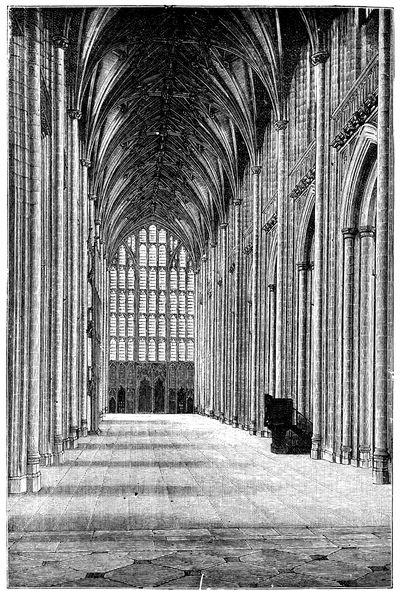
West end of the nave of Winchester Cathedral: begun by Bishop Edington (who built the great window) between 1360 and 1366: carried on by Bishop William of Wykeham from 1394 to 1416, and finally completed after his death.
17. Justices of the Peace.—Even harshness is less dangerous than anarchy, and from time to time measures were taken to provide against anarchy. Before the Conquest order had been kept by making either the kindred or the township liable to produce offenders, and this system was maintained by the Norman kings. In the time of Richard I. all men were required to swear to keep the peace, to avoid crime, and to join in the hue and cry in pursuit of criminals. In the time of Henry III. persons called guardians of the peace were occasionally appointed to see that order was kept, and at the accession of Edward III. these officials were established for a time by Act of Parliament as conservators of the peace. In 1360, the year of the Treaty of Bretigni, they were permanently continued, and the name of Justices of the Peace was given to them. They were to keep the peace in each county, and their number was to be made up of a lord, three or four gentlemen, and a lawyer, who was in those days always a cleric.[26] They were to seize and imprison, and even to try persons accused of crime. The king named these justices, but he had to name all of them except the lawyer from amongst the local landowners. In every way, in the fourteenth century, the chief local landowners were becoming prominent. The kings attempted to govern with their help, both in Parliament and in the counties.[Back to Contents]
LEADING DATES
Reign of Richard II., 1377-1399
1. Progress of the War with France. 1382—1386.—In 1382 Richard at the early age of fifteen was married to Anne of Bohemia. Though he was a young husband he was at all events old enough to be accused of disasters which he could not avoid. Not only was the war with France not prospering, but English influence was declining in Flanders. In 1382 Philip van Arteveldt, who like his father Jacob (see p. 235) headed the resistance of Ghent against the Count of Flanders, was defeated and slain at Roosebeke by Charles VI., the young king of France. In 1383 an English expedition led by Henry Spencer, Bishop of Norwich, under the pretext of a crusade against the French as the followers of the Pope of Avignon, ended in complete failure, and Flanders, the great purchaser of English wool, fell under the control of France. In 1385 Richard, indeed, invaded Scotland, ravaged the country and burnt Edinburgh, though without producing any permanent result. In 1386 a French fleet and army was gathered at Sluys, and an invasion of England was threatened.
2. Richard's growing Unpopularity. 1385—1386.—When the king returned from Scotland in 1385 he made a large creation of peers. He raised his two younger uncles to the Dukedoms of York and Gloucester; his Chancellor, Michael de la Pole, to the earldom of Suffolk, and his favourite, Robert de Vere, Earl of Oxford, to the marquisate of Dublin, making him not long afterwards Duke of Ireland. Suffolk was an able and apparently an honest administrator, who upheld the king's prerogative against the encroachments of Parliament. Oxford was a gay and heedless companion of (p. 279) Richard's pleasures, who encouraged him in unnecessary expense, and thereby provoked to resistance those who might have put up with an extension of the royal authority. That resistance, however, was to a great extent due to causes not of Richard's own making. Though the French in 1386 abandoned their attempt at invasion, the preparations to resist them had been costly, and Englishmen were in an unreasonable mood. Things, they said, had not gone so in the days of Edward III. A cry for reform and retrenchment, for more victories and less expense, was loudly raised.
3. The Impeachment of Suffolk and the Commission of Regency. 1386.—The discontented found a leader in Gloucester, the youngest of the king's uncles. Wealthy, turbulent, and ambitious, he put himself at the head of all who had a grievance against the king. Lancaster had just sailed for Spain to prosecute a claim in right of his second wife to the throne of Castile, and as York was without ambition, Gloucester had it all his own way. Under his guidance a Parliament demanded the dismissal of Richard's ministers, and, on his refusal, impeached Suffolk. Suffolk, though probably innocent of the charges brought against him, was condemned and driven from power, and Commissioners of regency were appointed for a year to regulate the realm and the king's household, as the Lords Ordainers had done in the days of Edward II. (see p. 226).
4. The Lords Appellant and the Merciless Parliament. 1387—1388.—In one way the Commissioners of regency satisfied the desire of Englishmen. In 1387 they sent the Earl of Arundel to sea, and Arundel won a splendid victory over a combined fleet of French, Flemings, and Spaniards. Richard, on the other hand, fearing that they would prolong their power when their year of office was ended, consulted upon the legality of the commission with the judges in the presence of Suffolk and others of his principal supporters, amongst whom was the Duke of Ireland. With one voice the judges declared that Parliament might not put the king in tutelage. Richard then made preparations to prevent by force the renewal of the commission, and to punish as traitors those who had originated it. His intention got abroad, and five lords, the Duke of Gloucester, the Earls of Arundel, Nottingham, Warwick, and Derby, the latter being the son of the absent Lancaster, appeared at the head of an overwhelming force against him. The five lords appellant, as they were called, appealed, or accused of treason five of Richard's councillors before a Parliament which met at Westminster in 1388, by flinging down (p. 280) their gloves as a token that they were ready to prove the truth of their charge in single combat. The Duke of Ireland, attempting resistance, was defeated by Derby at Radcot Bridge, and finally escaped to Ireland. The Parliament, called by its admirers the Wonderful, and by its opponents the Merciless Parliament, was entirely subservient to the lords appellant, who, instead of meeting their antagonists in single combat, accused them before the House of Lords. The Duke of Ireland, Suffolk, Chief Justice Tresilian, and Brember, who had been Mayor of London, were condemned to be hanged. The two first-named had escaped to the Continent, but the others were put to death. The fifth councillor, the Archbishop of York, escaped with virtual deprivation by the Pope. Four other knights, amongst them Sir Simon Burley, a veteran soldier and trusted companion of the Black Prince, were also put to death. Richard was allowed nominally to retain the crown, but in reality he was subjected to a council in which Gloucester and his adherents were supreme.
5. Richard's Restoration to Power. 1389.—Richard's entire submission turned the scale in his favour. England had been dissatisfied with him, but it had never loved the rule of the great feudal lords. Gloucester's council was no more popular than had been the Committees named in the Provisions of Oxford in the reign of Henry III., or the Lords Ordainers in the reign of Edward II., and it fell more easily than any government, before or afterwards. Suddenly, on May 3, 1389, Richard asked his uncle in full council how old he was. "Your highness," replied Gloucester, "is in your twenty-second year." "Then," said Richard, "I must be old enough to manage my own affairs, as every heir is at liberty to do when he is twenty-one." No attempt having been made to confute this argument, Richard dismissed the council, and ruled once more in person.
6. Richard's Constitutional Government. 1389—1396.—This sudden blow was followed by seven years of constitutional government. It seemed as if Richard had solved the problem of the relations between Crown and Parliament, which had perplexed so many generations of Englishmen. In 1389 he appointed ministers at his own pleasure, but when Parliament met in 1390 he commanded them to lay down their offices in order that no one should be deterred from bringing charges against them; and it was only upon finding that no one had any complaint to bring against them that he restored them to their posts. Nor did he show any signs of irritation against those by whom he had been outraged. Not only did he forbear to recall Suffolk and his other exiled (p. 281) favourites, but after a little time he admitted Gloucester and his supporters to sit in council alongside of his own adherents.
7. Livery and Maintenance. 1390.—During the fourteenth century the importance of the House of Commons had been steadily growing, and the king on the one hand and the great nobles on the other had been sorely tempted to influence the elections unduly. The means of doing so had come with a change in civil relationships, the natural result of that change in military relationships which had given a new character to the wars of Edward III. (see p. 236). Just as the king now fought with paid soldiers of every rank instead of fighting with vassals bound by feudal tenure, so the great nobles surrounded themselves with retainers instead of vassals. The vassal had been on terms of social equality with his lord, and was bound to follow him on fixed terms. The retainer was an inferior, who was taken into service and professed himself ready to fight for his lord at all times and in all causes. In return his lord kept open house for his retainers, supplied them with coats, known as liveries, marked with his badge, and undertook to maintain them against all men, either by open force or by supporting them in their quarrels in the law courts; and this maintenance, as it was called, was seldom limited to the mere payment of expenses. The lord, by the help of his retainers, could bully witnesses and jurors, and wrest justice to the profit of the wrongdoer. As yet, indeed, the practice had not attained the proportions which it afterwards assumed, but it was sufficiently developed to draw down upon it in 1390 a statute prohibiting maintenance and the granting of liveries. Such a statute was not merely issued in defence of private persons against intimidation; it also helped to protect the Crown against the violence of the great lords. The growth of the power of the House of Commons was a good thing as long as the House of Commons represented the wishes of the community. It would be a bad thing if it merely represented knots of armed retainers who either voted in their own names according to the orders of their lords, or who frightened away those who came to vote for candidates whom their lords opposed.
8. Richard's Domestic Policy. 1390—1391.—It was therefore well for the community that there should be a strong and wise king capable of making head against the ambition of the lords. For some years Richard showed himself wise. Not only did he seek, by opening the council to his opponents, to win over the lords to take part in the peaceable government of the country instead of disturbing it, but he forwarded legislation which carried out the general (p. 282) wishes of the country. The Statute of Provisors (see p. 258) was re-enacted and strengthened in 1390, the Statute of Mortmain (see p. 212) in 1391, and the Statute of Præmunire (see p. 258) in 1393.
9. Richard's Foreign Policy. 1389—1396.—Richard's foreign policy was based upon a French alliance. In 1389 he made a truce with France for three years. Negotiations for a permanent peace were frustrated because the French would make no peace unless Calais were surrendered to them, and English feeling was against the surrender of the claims sanctioned by the Treaty of Bretigni. The truce was, however, prolonged from time to time, and in 1396, when Richard, who was by that time a widower, married Isabella, the daughter of Charles VI., a child of eight, it was prolonged for twenty-eight years. Wise as this policy was, it was distasteful to Englishmen, and their dissatisfaction rose when they learnt that Richard had surrendered Brest and Cherbourg to the French. It was true that these places had been pledged to him for money, and that he had only given them up as he was bound to do when the money was paid, but his subjects drew no fine distinctions, and fancied that he was equally ready to surrender Calais and Bordeaux.
10. Richard's Coup d'État. 1397.—Richard knew that Gloucester was ready to avail himself of any widespread dissatisfaction, and that he had recently been allying himself with Lancaster against him. To please Lancaster, who had married his mistress, Catherine Swynford, as his third wife, Richard had legitimatised the Beauforts, his children by her, for all purposes except the succession of the crown, thus giving personal offence to Gloucester. Lancaster's son Derby, and Nottingham, another of the lords appellant (see p. 279), were now favourable to the king, and when rumours reached Richard that Gloucester was plotting against him, he resolved to anticipate the blow. He arrested the three of the lords appellant whom he still distrusted, Gloucester, Warwick, and Arundel, and charged them before Parliament, not with recent malpractices, of which he had probably no sufficient proof, but with the slaughter of his ministers in the days of the Merciless Parliament. Warwick was banished to the Isle of Man, Arundel was executed, and Gloucester imprisoned at Calais, where he was secretly murdered, as was generally believed by the order of the king. Archbishop Arundel, brother of the Earl of Arundel, was also banished. In such contradiction was this sudden outburst of violence to the prudence of Richard's recent conduct, that it has sometimes been supposed that, he had been dissimulating all the time. It is more probable that, without being actually insane, his mind had to some extent given way. He was (p. 283) always excitable, and in his better days his alertness of mind carried him forward to swift decisions, as when he met the mob at Smithfield, and when he vindicated his authority from the restraint of his uncle. Signs had not been wanting that his native energy was no longer balanced by the restraints of prudence. In 1394 he had actually struck Arundel in Westminster Abbey. In 1397 there was much to goad him to hasty and ill-considered action. The year before complaints had been raised against the extravagance of his household. The peace which he had given to his country was made the subject of bitter reproach against him, and he seems to have believed that Gloucester was plotting to bring him back into the servitude to which he had been subjected by the Commissioners of regency.
11. The Parliament of Shrewsbury. 1398.—Whether Richard was mad or not, he at all events acted like a madman. In 1398 he summoned a packed Parliament to Shrewsbury, which declared all the acts of the Merciless Parliament to be null and void, and announced that no restraint could legally be put on the king. It then delegated all parliamentary power to a committee of twelve lords and six commoners chosen from the king's friends. Richard was thus made an absolute ruler unbound by the necessity of gathering a Parliament again. He had freed himself not merely from turbulent lords but also from all constitutional restraints.
12. The Banishment of Hereford and Norfolk. 1398.—Richard had shown favour to the two lords appellant who had taken his side. Derby became Duke of Hereford, and Nottingham Duke of Norfolk. Before long Hereford came to the king with a strange tale. Norfolk, he said, had complained to him that the king still distrusted them, and had suggested that they should guard themselves against him. Norfolk denied the truth of the story, and Richard ordered the two to prove their truthfulness by a single combat at Coventry. When the pair met in the lists in full armour Richard stopped the fight, and to preserve peace, as he said, banished Norfolk for life and Hereford for ten years, a term which was soon reduced to six. There was something of the unwise cunning of a madman in the proceeding.
13. Richard's Despotism. 1398—1399.—Richard, freed from all control, was now, in every sense of the word, despotic. He extorted money without a semblance of right, and even compelled men to put their seals to blank promises to pay, which he could fill up with any sum he pleased. He too, like the lords, gathered round him a vast horde of retainers, who wore his badge and ill-treated (p. 284) his subjects at their pleasure. He threatened the Percies, the Earl of Northumberland and his son, Harry Hotspur, with exile, and sent them off discontented to their vast possessions in the North. Early in 1399 the Duke of Lancaster died. His son, the banished Hereford, was now Duke of Lancaster. Richard, however, seized the lands which ought to have descended to him from his father. Every man who had property to lose felt that Lancaster's cause was his own. Richard at this inopportune moment took occasion to sail to Ireland. He had been there once before in 1394 in the vain hope of protecting the English colonists (see p. 265). His first expedition had been a miserable failure: his second expedition was cut short by bad news from England.
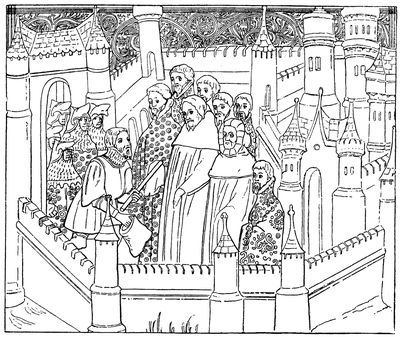
Meeting of Henry of Lancaster and Richard II. at Flint: from Harl. MS. 1319.
14. Henry of Lancaster in England. 1399.—Lancaster, with a small force, landed at Ravenspur, in Yorkshire, a harbour which has now disappeared in the sea. At first he gave out that he had come merely to demand his own inheritance. Then he alleged that he had come to redress the wrongs of the realm. Northumberland brought the Percies to his help. Armed men flocked to his support (p. 285) in crowds. The Duke of York, who had been left behind by Richard as regent, accepted this statement and joined him with all his forces. When Richard heard what had happened, he sent the Earl of Salisbury from Ireland to Wales to summon the Welshmen to his aid. The Welshmen rallied to Salisbury, but the king was long in following, and when Richard landed they had all dispersed. Richard found himself almost alone in Conway Castle, whilst Lancaster had a whole kingdom at his back.
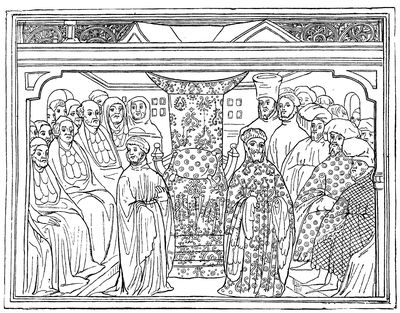
Henry of Lancaster claiming the throne: from Harl. MS. 1319.
15. The Deposition of Richard and the Enthronement of Henry IV. 1399.—By lying promises Lancaster induced Richard to place himself in his power at Flint. "My lord," said Lancaster to him, "I have now come before you have sent for me. The reason is that your people commonly say you have ruled them very rigorously for twenty or two and twenty years; but, if it please God, I will help you to govern better." The pretence of helping the king to govern was soon abandoned. Richard was carried to London and thrown into the Tower. He consented, probably not till after he had been threatened with the fate of Edward II., to sign his abdication. On the following morning the act of abdication was read in Parliament. The throne was empty (p. 286) Then Lancaster stepped forward. "In the name," he said, "of the Father, Son, and Holy Ghost, I, Henry of Lancaster, challenge this realm of England, and the crown with all its members and appurtenances, as I am descended by right line of the blood coming from the good lord King Henry the Third,[27] and through that right God of his grace hath sent me, with help of my kin and of my friends, to recover it, the which realm was in point to be undone for default of governance and undoing of the good laws." The assent of Parliament was given, and Lancaster took his seat in Richard's throne as King Henry IV.
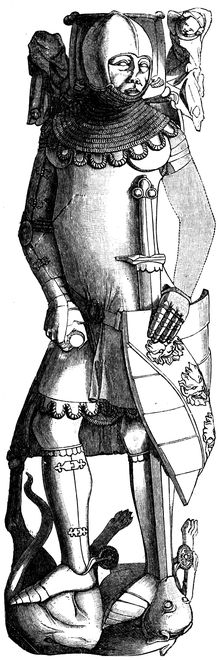
Effigy of a knight at Clehonger, showing development of plate armour. Date, about 1400.
16. Nature of the Claim of Henry IV.—The claim which Henry put forward would certainly not bear investigation. It laid stress on right of descent, and it has since been thought that Henry intended to refer to a popular belief that his ancestor Edmund, the second son of Henry III., was in reality the eldest son, but had been set aside in favour of his younger brother, Edward I., on account of a supposed physical deformity from which he was known as Edmund Crouchback. As a matter of fact the whole story was a fable, and the name Crouchback had been given to Edmund not because his back was crooked, but because he had worn a cross on his back as a crusader (see p. 197). That Henry (p. 287) should have thought it necessary to allude to this story, if such was really his meaning, shows the hold which the idea of hereditary succession had taken on the minds of Englishmen. In no other way could he claim hereditary right as a descendant of Henry III. Richard had selected as his heir Roger Mortimer, the son of the daughter of Lionel, Duke of Clarence, the next son of Edward III., after the Black Prince, who lived to be old enough to have children. Roger Mortimer, indeed, had recently been killed in Ireland, but he had left a boy, Edmund Mortimer, who, on hereditary principles, was heir to the kingdom, unless the doctrine announced by Edward III. that a claim to the crown descended through females was to be set aside. In fact the real importance of the change of kings lay not in what Henry said, but in what he avoided saying. It was a reversion to the old right of election, and to the precedent set in the deposition of Edward II. Henry tacitly announced that in critical times, when the wearer of the crown was hopelessly incompetent, the nation, represented by Parliament, might step in and change the order of succession. The question at issue was not merely a personal one between Richard and Henry. It was (p. 288) a question between hereditary succession leading to despotism on the one side, and to parliamentary choice, perhaps to anarchy, on the other. That there were dangers attending the latter solution of the constitutional problem would not be long in appearing.
Books recommended for further study of Part III.
Green, J. R. History of the English People. Vol. i. pp. 189-520.
Stubbs, W. (Bishop of Oxford). Constitutional History of England. Vol. i. chap. xii. sections 151-155; vol. ii. chaps. ix. and x.
—— The Early Plantagenets, 129-276.
Norgate, Miss K. England under the Angevin Kings. Vol. ii. p. 390.
Michelet, J. History of France (Middle Ages). Translated by G. H. Smith.
Longman, W. The History of the Life and Times of Edward III.
Gairdner, James. The Houses of Lancaster and York, pp. 1-64.
Rogers, James E. Thorold. A History of Agriculture and Prices in England. Vols. i. and ii.
Cunningham, W. Growth of English Industry and Commerce in the Early and Middle Ages, pp. 172-365.
Wakeman, H. O. and Hassall, A. (Editors). Essays Introductory to the Study of English Constitutional History.
Ashley, W. J. An Introduction to English Economic History and Theory. Vol. i.
Jusserand, J. J. English Wayfaring Life in the Middle Ages. Translated by Lucy Toulmin Smith (Miss).
Browne, M. Chaucer's England.
Jessopp, A., Dr. The Coming of the Friars, and other Historic Essays.
Oman, C. W. C. The Art of War in the Middle Ages.
Adams, G. B. The Political History of England. Vol. ii. From the Norman Conquest to the Death of John (1066-1216).
Tout, T. F. The Political History of England. Vol. iii. From the Accession of Henry III. to the Death of Edward III. (1216-1377).
Oman, C. The Political History of England. Vol. iv. From the Accession of Richard II. to the Death of Richard III. (1377-1485).[Back to Contents]
LEADING DATES
1. Henry's First Difficulties. 1399—1400.—Henry IV. fully understood that his only chance of maintaining himself on the throne was to rule with due consideration for the wishes of Parliament. His main difficulty, like that of his predecessor, was that the great lords preferred to hold their own against him individually with the help of their armies of retainers, instead of exercising political power in Parliament. In his first Parliament an angry brawl arose. The lords who in the last reign had taken the side of Gloucester flung their gloves on the floor of the House as a challenge to those who had supported Richard when he compassed Gloucester's death; and though Henry succeeded in keeping the peace for the time, a rebellion broke out early in 1400 in the name of Richard. Henry, like the kings before him, found his support against the turbulent nobles in the townsmen and the yeomen, and he was thus able to suppress the rebellion. Some of the noblemen who were caught by the excited defenders of the throne were butchered without mercy and without law.
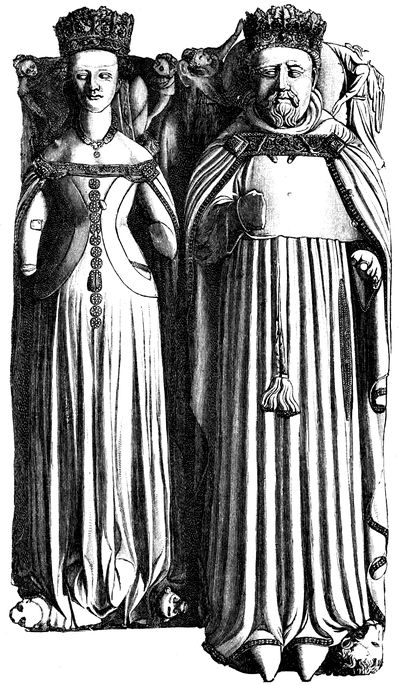
Henry IV. and his queen, Joan of Navarre: from their tomb in Canterbury Cathedral.
(p. 291) 2. Death of Richard II. 1400.—A few weeks after the suppression of this conspiracy it was rumoured that Richard had died in prison at Pontefract. According to Henry's account of the matter he had voluntarily starved himself to death. Few, however, doubted that he had been put to death by Henry's orders. To prove the untruth of this story, Henry had the body brought to St. Paul's, where he showed to the people only the face of the corpse, as if this could be any evidence whatever. After Richard's death, if hereditary succession had been regarded, the person having a claim to the crown in preference to Henry was the young Edmund Mortimer, Earl of March, the descendant of Lionel, Duke of Clarence (see p. 287). Henry therefore took care to keep the boy under custody during the whole of his reign.
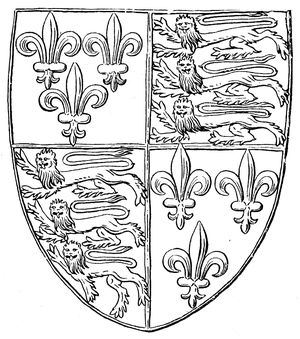
Royal arms as borne by Henry IV. after about 1408, and by successive sovereigns down to 1603.
3. Henry IV. and the Church.—Besides seeking the support of the commonalty, Henry sought the support of the Church. Since the rise of the friars at the beginning of the thirteenth century (see p. 191) the Church had produced no new orders of monks or friars. In the thirteenth and fourteenth she produced the schoolmen, a succession of great thinkers who systematised her moral and religious teaching. Imagining that she had no more to learn, she now attempted to strengthen herself by persecuting those who disbelieved her teaching, and after the suppression of the revolt of the peasants, made common cause with the landlords, who feared pecuniary loss from the emancipation of the villeins. This conservative alliance against social and religious change was the more easily made because many of the bishops were now members of (p. 292) noble families, instead of springing, as had usually been the case in the better days of the mediæval Church, from poor or middle-class parentage. In the reign of Richard II. a Courtenay, a kinsman of the Earl of Devonshire, had become first Bishop of London (see p. 263), and then Archbishop of Canterbury. He was succeeded in his archbishopric by an Arundel, brother of the Earl of Arundel who had been executed by Richard, and Archbishop Arundel was in the days of Henry IV. the spokesman of the clergy.

Thomas Cranley, Archbishop of Dublin, 1397-1417: from his brass at New College, Oxford. Showing the archiepiscopal mass-vestments and the cross and pall. Date, about 1400.
4. The Statute for the Burning of Heretics. 1401.—In 1401 the clergy cried aloud for new powers. The ecclesiastical courts could condemn men as heretics, but had no power to burn them. Bishops and abbots formed the majority of the House of Lords, and though the Commons had not lost that craving for the wealth of the Church which had distinguished John of Gaunt's party, they had no sympathy with heresy. Accordingly the statute for the burning of heretics (De hæretico comburendo), the first English law for the suppression of religious opinion, was passed with the ready consent of the king and both Houses. The first victim was William Sawtre, a priest who held, amongst other things, "that after the words of consecration in the Eucharist the bread remains bread, and nothing more." He was burnt by a special order from the king and council even before the new law had been enacted.
5. Henry IV. and Owen Glendower. 1400—1402.—If Henry found it difficult to maintain order in England, he found it still more difficult to keep the peace on the (p. 293) borders of Wales. In 1400 an English nobleman, Lord Grey of Ruthyn, seized on an estate belonging to Owen Glendower, a powerful Welsh gentleman. Owen Glendower called the Welsh to arms, ravaged Lord Grey's lands, and proclaimed himself Prince of Wales. For some years Wales was practically independent. English townsmen and yeomen were ready to support Henry against any sudden attempt of the nobility to crush him with their retainers, but they were unwilling to bear the burden of taxation needed for the steady performance of a national task. In the meanwhile Henry was constantly exposed to secret plots. In 1401 he found an iron with four spikes in his bed. In the autumn of 1402 he led an expedition into Wales, but storms of rain and snow forced him back. His English followers attributed the disaster to the evil spirits which, as they fully believed, were at the command of the wizard Glendower.
6. The Rebellion of the Percies. 1402—1404.—The Scots were not forgetful of the advantages to be derived from the divisions of England. They had amongst them some one—whoever he may have been—whom they gave out to be King Richard, and when Henry marched against Wales in 1402 they invaded England. They were met by the Percies and defeated at Homildon Hill. The Percies had still something of the enormous power of the feudal barons of the eleventh century. Their family estates stretched over a great part of Northumberland, and as they were expected to shield England against Scottish invasions they were obliged to keep up a military retinue which might be employed against the king as well as in his service. It was mainly through their aid that Henry had seated himself on the throne. Their chief, the Earl of Northumberland, and his brother, the Earl of Worcester, were aged men, but Northumberland's son, Henry Percy—Harry Hotspur as he was usually called—was of a fiery temper, and disinclined to submit to insult. Hotspur's wife was a Mortimer, and her brother, Sir Edmund Mortimer, the uncle of the young Earl of March, had been taken prisoner by Glendower. It was noticed that Henry, who had ransomed other prisoners, took no steps to ransom Mortimer, and it was believed that he was in no hurry to set free one whose hereditary claim to the crown, like that of the Earl of March, came before his own. Other causes contributed to irritate the Percies, and in 1403, bringing with them as allies the Scottish prisoners whom they had taken at Homildon Hill, they marched southwards against Henry. Southern England might not be ready adequately to support Henry in an invasion of Wales, but it was in no mood to allow him to be dethroned by the Percies. It rallied to (p. 294) his side, and enabled him signally to defeat the Percies at Shrewsbury. Hotspur was killed in the fight, and his uncle, the Earl of Worcester, being captured, was beheaded without delay. Northumberland, who was not present at the battle, was committed to prison in 1404, but was pardoned on promise of submission.
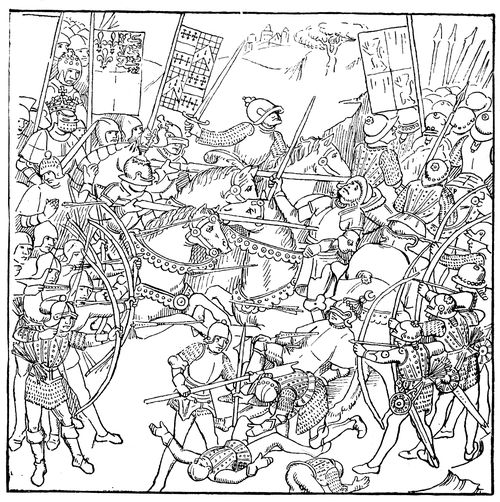
The battle of Shrewsbury: from the "Life of Richard Beauchamp, Earl of Warwick;" drawn by John Rous about 1485.
7. The Commons and the Church. 1404.—After such a deliverance the Commons could not but grant some supplies. In the autumn of 1404, however, they pleaded for the confiscation of the revenues of the higher clergy, which were sufficient, as they alleged, to support 15 earls, 1,500 knights, 6,200 esquires, and 100 hospitals as well. The king refused to listen to the proposal, and money was voted in the ordinary way. It was the first deliberate attempt to meet the growing expenditure of the Crown by the confiscation of ecclesiastical revenue.
(p. 295) 8. The Capture of the Scottish Prince. 1405.—Early in 1405 Henry was threatened with a fresh attack. Charles VI. of France was now a confirmed lunatic, and his authority had mainly fallen into the hands of his brother Louis, Duke of Orleans, a profligate and unscrupulous man who was regarded by the feudal nobility of France as their leader. The Duke of Orleans refused to consider himself bound to Henry by the truce which had been made with Richard, and, forming an alliance with Owen Glendower, prepared to send a fleet to his aid. When there was war between England and France the Scots seldom remained quiet, but this time Henry was freed from that danger by an unexpected occurrence. The reigning King of Scotland was Robert III., whose father, Robert II., had been the first king of the House of Stuart, and had ascended the throne after the death of David Bruce, as being the son of his sister Margaret.[28] Robert III., weakly in mind and body, had committed to the custody of his brother, the Duke of Albany, his eldest son, the Duke of Rothesay, who had gained an evil name by his scandalous debauchery. Rothesay died in the prison in which his uncle had confined him, and popular rumour alleged that Albany had murdered him to clear the way to the throne. Robert now sent young James, his only surviving son, to be educated in France in order to save him from Albany's machinations. On his way the prince was captured by an English ship, and delivered to Henry, who kept him under guard as a hostage for the peaceful behaviour of his countrymen. The prince, he said, should have been sent to him to be educated, as he could talk French as well as the king of France. When Robert died soon afterwards the (p. 296) captive became King James I.; but he was not allowed to return home, and Albany ruled Scotland as regent in his name.
9. The Execution of Archbishop Scrope. 1405.—The capture of such a hostage as James was the more valuable to Henry as at that very moment there was a fresh rising in the North, in which Scrope, the Archbishop of York, took a leading part. The insurgents were soon dispersed, and both Archbishop Scrope and Mowbray, the Earl Marshal, were captured. Henry had them both beheaded, though neither were tried by their peers, and ecclesiastics were not punishable by a secular court. Knowing that the insurrection had been contrived by Northumberland, Henry gave himself no rest till he had demolished the fortifications of his castles of Alnwick, Warkworth, and Prudhoe. Northumberland himself escaped to Scotland.
10. France, Wales, and the North. 1405—1408.—In 1405, whilst Henry was in the North, a French fleet landed a force in Wales and seized Carmarthen. In 1406 the Duke of Orleans attacked the possessions still held by the English in Guienne, but though he plundered the country he could do no more. Once again fortune relieved Henry of a dangerous enemy. The Duke of Orleans had a rival in his cousin John the Fearless, Duke of Burgundy, who, in addition to his own duchy and county of Burgundy, was ruler of Flanders through his mother. His wise and firm government attached the manufacturing towns of Flanders to him, and the example of his government in Flanders won him favour in Paris and other French towns, especially in the north of France. He was, however, personally brutal and unscrupulous, and having entered into a competition for power with the Duke of Orleans, he had him murdered in 1407 in the streets of Paris. At once a civil war broke out between the Burgundian party, supported by the towns, and the Orleans party, which rested on the feudal nobility, and was now termed the party of the Armagnacs, from the Count of Armagnac, its chief leader after the murder of the Duke of Orleans. Henry had no longer to fear invasion from France. In 1408 he was freed from yet another enemy. The old Earl of Northumberland, who had wandered from Scotland to Wales, now wandered north again to try his fortunes in his own country. As he passed through Yorkshire he was met by the sheriff of the county, and defeated and slain on Bramham Moor. At the same time South Wales fell again under the power of the king, and though Owen Glendower still continued to hold out in the mountainous region round Snowdon, his power rapidly declined.
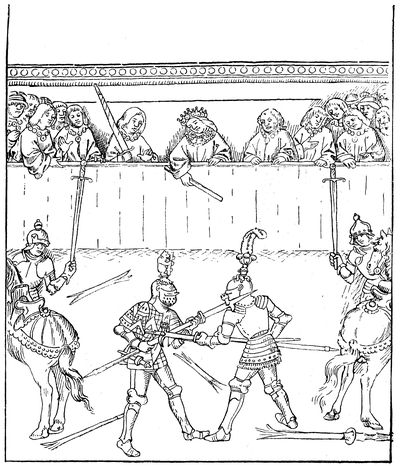
Fight in the lists with poleaxes between Richard Beauchamp, Earl of Warwick, and Sir Pandolf Malatesta, at Verona, temp. Henry IV.: from the "Life of Richard, Earl of Warwick;" drawn by John Rous about 1485.
(p. 297) 11. Henry, Prince of Wales. 1409—1410.—No one had been more helpful to the king in these wars than his son, Henry, Prince of Wales. He had fought at Shrewsbury and in Wales, and had learnt to command as well as to fight. Young as he was—in 1409 he was but twenty-two—he was already seen to be a man born to have the mastery. He took his place in his father's council as well as in his armies in the field. He was skilful, resolute, always knowing his own mind, prompt to act as each occasion arose. He (p. 298) was, moreover, unfeignedly religious. It seemed as if a king as great as Edward I. was about to ascend the throne. Yet between the character of Edward I. and the character of Prince Henry there was a great difference. Edward I. worked for the future as well as for the present. His constructive legislation served his country for generations after his death. Even his mistaken attempt to unite England and Scotland was, to some extent at least, an anticipation of that which was done by the Act of Union four hundred years after his death. The young Henry had no such power of building for the future. He worked for the present alone, and his work crumbled away almost as soon as he was in his grave. His ideas were the ordinary ideas of his age, and he never originated any of his own. In 1410, when a heretic, Badby, was led to be burnt, the Prince in vain urged him to recant. As the flames blazed up, the poor wretch, stung by the torment, cried for mercy. The Prince bade the executioners drag away the blazing faggots, and offered Badby support for his lifetime if he would abandon his heresy. Badby refused, and the Prince sternly ordered the executioners to push the faggots back and to finish their cruel work. In that very year the House of Commons, which was again urging the king to confiscate the revenues of the clergy, even urged him also to soften the laws against the Lollards. The king refused, and he had no opposition to fear from the Prince of Wales.

Costume of a judge, about 1400: from the brass of Sir John Cassy, Chief Baron of the Exchequer, at Deerhurst, Gloucestershire.
12. The Last Years of Henry IV. 1411—1413.—It was not long before a bitter quarrel broke out between Henry IV. and his son, which lasted till the death of the old man. In later times stories were told how Prince Henry gave himself up to the society of low and debauched companions, how he amused himself by robbing the (p. 299) receivers of his own rents, and how, having struck Chief Justice Gascoigne for sitting in judgment on one of his unruly followers, he was sent to prison for contempt of court. There is no real evidence in support of these stories; but there is good reason to believe that, though they were certainly exaggerated, they were not altogether without foundation. Since 1410 the Prince kept house in the heart of London, and, as a young and active man suddenly called from service in the field to live in the midst of the temptations of a city, he may very well have developed a taste for boisterous amusements, even if he did not fall into grosser forms of dissipation. It is certain that during this period of his life he ran deeply into debt, and was no longer on good terms with his father. Yet even the story about the Chief Justice goes on to say that the Prince took his punishment meekly and offered no resistance, and that his father thanked God that he had so upright a judge and so obedient a son. Political disagreement probably widened the breach between the King and the Prince. Henry IV. had grown accustomed to live from hand to mouth, and had maintained himself on the throne rather because Englishmen needed a king than because he was himself a great ruler. In his foreign policy he was swayed by the interests of the moment. In 1411 he helped the Burgundians against the Armagnacs. In 1412 he helped the Armagnacs against the Burgundians. Prince Henry already aimed at a steady alliance with the Burgundians, with a view to a policy more thoroughgoing than that of keeping a balance between the French parties. The king, too, was subject to epileptic attacks, and to a cutaneous disorder which his ill-willers branded by the name of leprosy. It has even been said that in 1412 the Prince urged his father to abdicate in his favour. If so, he had not long to wait for the crown. In 1413 Henry IV. died, and Henry V. sat upon his throne.
13. Henry V. and the Lollards. 1413—1414.—Henry V. was steadied by the duties which now devolved upon him. He indeed dismissed from the chancellorship Archbishop Arundel, who had supported his father against himself, and gave it to his half-uncle, Henry Beaufort, Bishop of Winchester, one of the legitimated sons of John of Gaunt and Catherine Swynford (see p. 282), but he allowed no plans of vengeance to take possession of his mind. His first thought was to show that he had confidence in his own title to the crown. He liberated the Earl of March, and transferred the body of Richard II. to a splendid tomb at Westminster, as if he had nothing to fear from any competitor. If there was one thing on which, as far as England was concerned, his heart was set, it (p. 300) was on strengthening the religion of his ancestors. He founded three friaries and he set himself to crush the Lollards. Sir John Oldcastle, who bore the title of Lord Cobham in right of his wife, was looked up to by the Lollards as their chief supporter. Oldcastle was brought before Archbishop Arundel. Both judge and accused played their several parts with dignity. Arundel without angry reviling asserted the necessity of accepting the teaching of the Church. Oldcastle with modest firmness maintained the falsity of many of its doctrines. In the end he was excommunicated, but before any further action could be taken he escaped, and was nowhere to be found. His followers were so exasperated as to form a plot against the king's life. Early in 1414 Henry fell upon a crowd of them in St. Giles's Fields. Most escaped, but of those who were taken the greater part were hanged or burnt. The result was a statute giving fresh powers to the king for the punishment of the Lollards. Every book written by them was to be confiscated. Three years later (1417) Oldcastle was seized and burnt. He was the last of the Lollards to play an historical part. The Lollards continued to exist in secret, especially in the towns, but there was never again any one amongst them who combined religious fervour with cultivated intelligence.
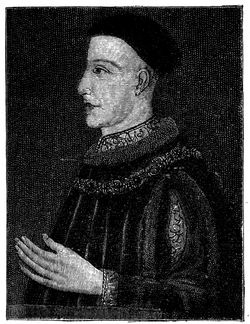
Henry V.: from an original painting belonging to the Society of Antiquaries.
14. Henry's Claim to the Throne of France. 1414.—Henry V. was resolved to uphold the old foreign policy of the days of Edward III. as well as the old religion. In 1414, whilst he amused the French court by offers of friendship, he was in reality preparing to demand the crown of France as the right of the king of England, leaving out of sight the consideration that if the claim of (p. 301) Edward III. had been worth anything at all, it would have descended to the Earl of March and not to himself. Everything seemed to combine to make easy an attack on France. Burgundians and Armagnacs were engaged in a death-struggle. In 1413 a riotous Burgundian mob had made itself master of Paris and the Government. Then the Armagnacs had got the upper hand, and the Duke of Burgundy was driven back to his own dominions. Henry now made an alliance with the Duke of Burgundy against the ruling powers, and prepared to invade the distracted land. Thus far he proceeded in imitation of Edward III., who had attacked Philip VI. in alliance with the Flemings. With Edward III., however, the claim to the French crown had always been a secondary consideration. He went to war because French sailors plundered English ports and the French king assisted the Scots. Henry had no such reason to urge. He went to war because he was young and warlike, because the enterprise was easy, and because foreign conquest would unite all Englishmen round his throne. When once the war was begun he was certain to carry it on in a different spirit from that of Edward III. Edward had gone to weaken the plunderers by plundering in return, and to fight battles only when they happened to come in his way. Henry went with the distinct resolution to conquer France and to place the French crown on his own head. Every step which he took was calculated with skill for the attainment of this end. Of immediate, perhaps of lifelong, success Henry was as nearly certain as it was possible to be. Yet, if he had remembered what had been the end of campaigns adorned by the brilliant victories of Creçy and Poitiers, he might have known that all that he could do would end in ultimate failure, and that the day must come when divided France would unite to cast out, if not himself, at least his heirs. It was significant that when his Chancellor, Beaufort, announced to Parliament the king's intention, he took for his text, after the manner of political speakers in those days, 'Let us work while it is called to-day.' Henry was not inclined, as Edward I. had been, to take thought for a distant morrow.
15. The Invasion of France. 1415.—In 1415 Henry openly made his claim and gathered his army at Southampton. He there detected a conspiracy to place the Earl of March on the throne, which had been formed by Lord Scrope and Sir Thomas Grey, in combination with March's brother-in-law, the Earl of Cambridge, a son of the Duke of York (see genealogy at p. 327), the son of Edward III. All three were executed, and then Henry sailed (p. 302) for France. He landed at the mouth of the Seine and besieged Harfleur. Harfleur fell after an heroic defence, and the Seine valley lay open to Henry.[29] Over two-thirds of his army, however, had perished from dysentery and fever, and with no more, even at the highest calculation, than 15,000 men, he was unable to take advantage of the opportunity to march upon Paris. His brother the Duke of Clarence, urged him to return to England, but Henry knew that if he went back with baffled hopes his throne would hardly stand the shock. He resolved to march to Calais. It might be that he would find a Creçy on the way.
16. The March to Agincourt. 1415.—Not a Frenchman could be found who would take seriously Henry's claim to be the true king of France. When he reached the Somme he found the bridges over the river broken, and he was only able to cross it by ascending it almost to its source. Then, bending to the left, he pushed on towards Calais. His own army was by this time scarcely more than 10,000 strong, and he soon learnt that a mighty French host of at least 50,000 men blocked the way at Agincourt. Though his little band was worn with hunger, he joyfully prepared for battle. He knew that the Duke of Burgundy had kept aloof, and that the Armagnac army opposed to him was a feudal host of the same character as that which had been defeated at Creçy. There were no recognised commanders, no subordination, no notion of the superior military power of the English archers.
17. The Battle of Agincourt, October 25, 1415.—In the early morning, mass was said in the English army, and Henry's scanty followers prayed earnestly that their king's right, as they believed it to be, might be shown on that day. Henry's own prayers were long and fervid. He was told that it was the hour of prime, the first hour of prayer. "Now," he said, "is good time, for all England prayeth for us, and, therefore, be of good cheer." He then went forth to marshal his army. To a knight who wished that every brave Englishman now at home were there, he replied that he would not have one man more. Few as they were, they were in the hands of God, who could give them the victory. Henry's tactics were those of Creçy. He drew up his archers between thick woods which defended their flanks, and with sharp stakes planted in the ground to defend them in front, placing his dismounted horsemen at intervals between the bodies of archers. The French, however, showed no signs of attacking, and Henry, knowing that unless he cut his way through his soldiers would starve, threw (p. 303) tactics to the winds and ordered his archers to advance. He had judged wisely. The French horsemen were on ploughed ground soaked with rain, and when at last they charged, the legs of their horses stuck fast in the clinging mud. The English arrows played thickly on them. Immovable and helpless, they were slaughtered as they stood. In vain their dismounted horsemen pushed forward in three columns upon the English knights. Their charge was vigorously resisted, and the archers, overlapping each column, drew forth the heavy leaden mallets which each man carried, and fell upon the helpless rout with blows which crashed through the iron headpieces of the Frenchmen. Such as could escape fled hastily to the rear, throwing into wild confusion the masses of their countrymen who had not as yet been engaged. The battle was won, but unfortunately the victory was stained by a cruel deed. Some French plunderers had got into the rear to seize upon the baggage, and Henry, believing that a fresh enemy was upon him, gave orders, which were promptly carried out, to slay the prisoners. The loss of the French was enormous, and fell heavily on their nobility, always eager to be foremost in fight. Amongst the prisoners who were spared was the young Duke of Orleans.

Effigy of William Phelip, Lord Bardolf (died 1441), with the Garter and Lancastrian collar of SS.: from his tomb at Dennington, Suffolk. The type of armour here shown prevailed from about 1415 to 1435.
18. Henry's Diplomacy. 1416—1417.—If Henry had not yet secured the crown of France, he had at least made sure of the crown of England. When he landed at Dover he was borne to land on the shoulders of the multitude. He entered London amidst wild enthusiasm. There was no fear of any fresh conspiracy to place the Earl of March on the throne. In 1416 he sent his brother, the Duke of Bedford, to secure Harfleur against a French attack, whilst he himself was diplomatically active in an attempt to win over to his side the Duke of Burgundy and Sigismund, King of the Romans, who actually visited him in England. Sigismund promised much, but had little power to fulfil his promises, whilst the Duke shifted backwards and forwards, looking out for his own advantage and giving no real help to either side. In 1417 the quarrels in France reached a head. The Count of Armagnac, getting into his possession the Dauphin Charles, a boy of fourteen, established a reign of terror in Paris, and the Duke of Burgundy, summoned by the frightened citizens to their help, levied war against the Armagnacs and marched to Paris.
19. Henry's Conquest of Normandy. 1417—1419.—Henry seized the opportunity and landed in Normandy. Caen was taken by storm, and in a few weeks all Normandy except Rouen had submitted to Henry. There had been a terrible butchery when (p. 304) Caen was stormed, but when once submission was secured Henry took care that justice and order should be enforced, and that his soldiers should abstain from plunder and outrage. In Paris affairs were growing worse. The citizens rose against the Armagnacs and imprisoned all of them on whom they could lay hands. Then the mob burst into the prisons and massacred the prisoners, the Count of Armagnac himself being one of the number. Henry's army in the meanwhile closed round Rouen. The magistrates, to prolong the defence, thrust out the poorer inhabitants. Henry, who knew not pity when there was a practical object to be gained, thrust them back. During five months the poor wretches wandered about half starved, dying off day by day. On Christmas Day, in honour of Christ's nativity, Henry sent some food to the few who were left. Famine did its work within as well as without the walls, and on January 19, 1419, Rouen, the old ducal capital of the Norman kings, surrendered to Henry.
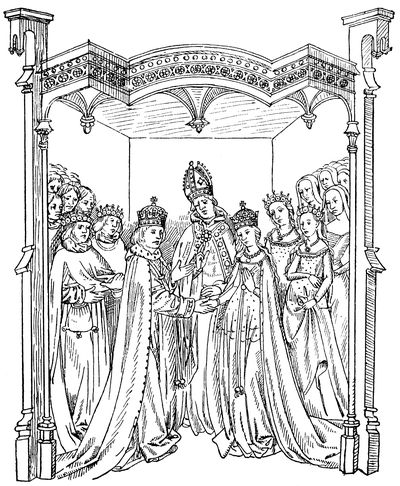
Marriage of Henry V. and Catherine of France: from the 'Life of Richard Beauchamp, Earl of Warwick,' drawn by John Rous about 1485.
20. The Murder of the Duke of Burgundy and the Treaty of Troyes. 1419—1420.—In the summer of 1419 English troops swept the country even up to the walls of Paris. Henry, however, gained more by the follies and crimes of his enemies than by his own skill. Terrified at the prospect of losing all, Burgundians (p. 305) and Armagnacs seemed for a moment to forget their quarrel and to be ready to join together in defence of their common country; but the hatred in their hearts could not be rooted out. At a conference between the Duke of Burgundy and the Dauphin on the bridge of Montereau, angry words sprang easily to the lips of both. The Duke put his hand on the pommel of his sword, and some of the Dauphin's attendants, believing their master's life in danger, fell on the Duke and slew him. After this an agreement between the (p. 306) factions was no longer possible. The new Duke of Burgundy, Philip the Good, at once joined the English against the Dauphin, whom he regarded as an accomplice of his father's murderers. Even Queen Isabella, the mother of the Dauphin, shared in the outcry against her own son, and in 1420 was signed the Treaty of Troyes, by which the Dauphin was disinherited in favour of Henry, who was to be king of France on the death of Charles VI. In accordance with its terms, Henry married Charles's daughter Catherine, and ruled France as regent till the time came when he was to rule it as king.
21. The Close of the Reign of Henry V. 1420—1422.—The Treaty of Troyes was very similar in its stipulations to that which Henry II. had made with Stephen at Wallingford (see p. 137). The result was, as might have been expected, totally different. Henry II. had the English nation behind his back. Henry V. presumed to rule over a foreign nation, the leaders of which had only accepted him in a momentary fit of passion. He never got the whole of France into his power. He held Paris and the North, whilst the Duke of Burgundy held the East. South of the Loire the Armagnacs were strong, and that part of France stood by the Dauphin, though even here the English possessed a strip of land along the sea-coast in Guienne and Gascony, and at one time drew over some of the lords to admit Henry's feudal supremacy. In 1420 Henry fancied it safe for him to return to England, but, in his absence, in the spring of 1421 his brother, the Duke of Clarence, was defeated and slain at Baugé by a force of Frenchmen and of Scottish auxiliaries. Clarence had forgotten that English victories had been due to English archery. He had plunged into the fight with his horsemen, and had paid the penalty for his rashness with his life. Henry hurried to the rescue of his followers, and drove the French over the Loire; though Orleans, on the north bank of that river, remained unconquered. Instead of laying siege to it Henry turned sharply round northwards to besiege Meaux, the garrison of which was plundering the country round Paris in the name of the Dauphin, and seemed likely to shake the fidelity to Henry even of Paris itself. Meaux held out for many months. When at last it fell, in 1422, Henry was already suffering from a disease which carried him off before the end of the year at the age of thirty-five. Henry V. had given his life to the restoration of the authority of the Church in England, and to the establishment of his dynasty at home by means of the glory of foreign conquest. What man could do he did, but he could not achieve the impossible.[Back to Contents]
LEADING DATES
Reign of Henry VI., 1422-1461
1. Bedford and Gloucester. 1422.—In England Henry V. was succeeded in 1422 by his son, Henry VI., a child of nine months. In the same year, in consequence of the death of Charles VI., the infant was acknowledged as king of France in the north and east of that country. The Dauphin, holding the lands south of the Loire, and some territory even to the north of it, claimed to reign over the whole of France by hereditary right as Charles VII. Henry V. had appointed his eldest surviving brother, John, Duke of Bedford, regent in France, and his youngest brother, Humphrey, Duke of Gloucester, regent in England. In England there were no longer any parties banded against the Crown, and the title of the Earl of March had not a single supporter; but both the Privy Council and the Parliament agreed that the late king could not dispose of the regency by will. Holding that Bedford as the elder brother had the better claim, they nevertheless, in consequence of his absence in France, appointed Gloucester Protector, with the proviso that he should give up his authority to Bedford if the latter were to return to England. They also imposed limitations upon the authority of the Protector, requiring him to act by the advice of the Council.
2. Bedford's Success in France. 1423—1424.—The English nation was bent upon maintaining its supremacy in France. Bedford was a good warrior and an able statesman. In 1423 he prudently married the sister of Philip of Burgundy, hoping thereby to secure permanently the all-important fidelity of the Duke. His next step was to place difficulties in the way of the Scottish auxiliaries who poured into France to the help of Charles. Through his influence the captive James I. (see p. 295) was liberated and sent home to Scotland, on the understanding that he would prevent (p. 308) his subjects from aiding the enemies of England. Bedford needed all the support he could find, as the French had lately been gaining ground. In 1424, however, Bedford defeated them at Verneuil. In England it was believed that Verneuil was a second Agincourt, and that the French resistance would soon be at an end.
3. Gloucester's Invasion of Hainault. 1424.—Bedford's progress in France was checked by the folly of his brother Gloucester, who was as unwise and capricious as he was greedy of power. Gloucester had lately married Jacqueline, the heiress of Holland and Hainault, though her husband, the Duke of Brabant, was still living, on the plea that her first marriage was null on the ground of nearness of kin. In 1424 Gloucester overran Hainault, which was under the government of the Duke of Brabant, thereby giving offence to the Duke of Burgundy, who was a cousin and ally of the Duke of Brabant, and who had no wish to see the English holding a territory so near to his own county of Flanders. The Duke of Brabant recovered Hainault and captured Jacqueline, who had already been abandoned by Gloucester. A coolness arose between the Duke of Burgundy and the English which was never completely removed.
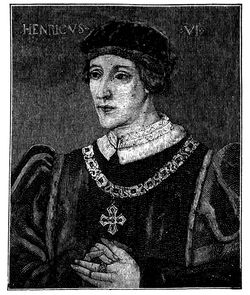
Henry VI.: from an original picture in the National Portrait Gallery.
4. Gloucester and Beaufort. 1425—1428.—In England as well as on the Continent Gloucester's self-willed restlessness roused enemies, the most powerful of them being his uncle, the Chancellor, Henry Beaufort, Bishop of Winchester (see pp. 301, 335), a wealthy and ambitious prelate not without those statesmanlike qualities which were sadly lacking to Gloucester. If Beaufort ruled the Council, Gloucester had the art of making himself popular with the multitude, whose sympathies were not likely to be given to a bishop of the type of Beaufort, who practised no austerities and who had (p. 309) nothing in him to appeal to the popular imagination. So bitter was the feud between Gloucester and Beaufort that in 1426 Bedford was obliged to visit England to keep the peace between them. Before he returned to France he persuaded Beaufort to surrender the chancellorship to Kemp, the Bishop of London, and to leave England for a time. Moreover, in 1427 he himself swore that as long as the king was under age the Council and not the Protector was to govern. When Gloucester was asked to take the same oath, he signed it, but refused to swear. In 1428, after Bedford had returned to France, Beaufort came back, bringing with him from Rome the title of Cardinal, and authority to raise soldiers for a crusade against heretics in Bohemia. A storm was at once raised against him. A Cardinal, it was said, was a servant of the Roman See, and as no man could serve two masters, he ought not to hold an English bishopric or to sit in the English Council, far less to send to Bohemia English troops which were needed in France. Gloucester fancied that the opportunity of overthrowing his rival had come. Beaufort, however, was too prudent to press his claims. He absented himself from the Council and allowed the men whom he had raised for Bohemia to be sent to France instead. Before the end of the year the outcry against him died away, and, Cardinal as he was, he resumed his old place in the Council.
5. The Siege of Orleans. 1428—1429.—The time had arrived when the presence of every English soldier was needed in France. Bedford had made himself master of almost the whole country north of the Loire except Orleans. If he could gain that city it would be easy for him to overpower Charles, who kept court at Chinon. In 1428, therefore, he laid siege to Orleans. The city, however, defended itself gallantly, though all that the French outside could hope to do was to cut off the supplies of the besiegers. In February 1429 they attempted to intercept a convoy of herrings coming from Paris for the English troops, but were beaten off in what was jocosely styled the Battle of the Herrings, and it seemed as though Orleans, and with it France itself, were doomed. Frenchmen were indeed weary of the foreign yoke and of the arrogant insolence of the rough island soldiers. Yet in France all military and civil organisation had hitherto come from the kings, and unfortunately for his subjects Charles was easy-tempered and entirely incapable either of carrying on war successfully or of inspiring that enthusiasm without which the most careful organisation is as the twining of ropes of sand. It would need a miracle to inspire Frenchmen with the belief that it was possible for them to defeat (p. 310) the victors of Agincourt and Verneuil, and yet without such a miracle irretrievable ruin was at hand.
6. Jeanne Darc and the Relief of Orleans. 1429.—The miracle was wrought by a young maiden of seventeen, Jeanne Darc, the daughter of a peasant of Domremi, in the duchy of Bar. Her home was at a distance from the actual scenes of war, but whilst she was still little more than a child, tales of horror, reaching her from afar, had filled her with 'pity for the realm of France' and for its young king, whom she idealised into the pattern of every virtue. As she brooded over the thought of possible deliverance, her warm imagination summoned up before her bright and saintly forms, St. Michael, St. Catherine, and St. Margaret, who bade her, the chosen of God, to go forth and save the king, and conduct him to Reims to be crowned and anointed with the holy oil from the vessel which, as men believed, had been brought down from heaven in days of old. At last in 1428 her native hamlet was burnt down by a Burgundian band. Then the voices of the saints bade her go to Vaucouleurs, where she would find a knight, Robert de Baudricourt, who would conduct her to Charles. Months passed before Baudricourt would do aught but scorn her message, and it was not till February 1429, when the news from Orleans was most depressing, that he consented to take her in his train. She found Charles at Chinon, and, as the story goes, convinced him of her Divine mission by recognising him in disguise in the midst of his courtiers. Soldiers and theologians alike distrusted her, but her native good sense, her simple and earnest faith, and above all her purity of heart and life disarmed all opposition, and she was sent forth to lead an army to the relief of Orleans. She rode on horseback clothed in armour as a man, with a sword which she had taken from behind the altar of St. Catherine by her side, and a consecrated banner in her hand. She brought with her hope of victory, enthusiasm built on confidence in Divine protection, and wide-reaching patriotism. 'Pity for the realm of France' inspired her, and even the rough soldiers who followed her forsook for a time their debaucheries that they might be fit to follow God's holy maid. Such an army was invincible; but whilst to the French the maid was an instrument of the mercy of God, to the English she was an emissary of hell and the forerunner of defeat. On May 7 she led the storm of one of the English fortified posts by which the town was hemmed in. After a sharp attack she planted her standard on the wall. The English garrison was slain to a man. The line of the besiegers was broken through, and Orleans was saved. On the 12th the English army was in full retreat.
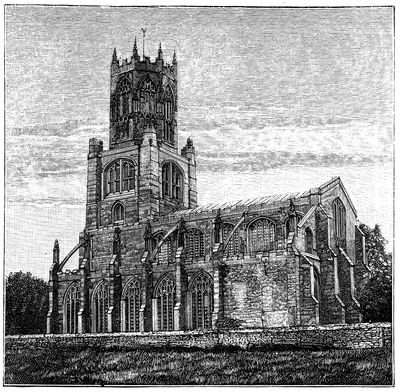
Fotheringhay Church, Northamptonshire. The contract for building it, between Edward Duke of York, and William Horwod, freemason, is dated September 24, 1434.
(p. 311) 7. The Coronation of Charles VII. and the Capture of the Maid. 1429—1430.—The Maid followed up her victory. She had at her side brave and skilful warriors, such as La Hire and the Bastard of Orleans, the illegitimate son of the murdered Louis of Orleans, and with their help she pressed the English hard, driving them northwards and defeating them at Patay. She insisted on conducting Charles to Reims, and he, indolently resisting at first, was carried away by her persistent urgency. Hostile towns opened their gates to her on the way, and on July 17 she saw with chastened joy the man whom she had saved from destruction crowned in the great cathedral of Reims. For her part, she was eager to push on the war, but Charles was slothful, and in a hurry to be back to (p. 312) the pleasures of his court. When she led the troops to the attack of Paris, she was ordered back by the king, and the army sent into winter quarters. In the spring of 1430 the Maid was allowed again to attack the English, but she had no longer the support which she had once had. Many of the French soldiers were meanly jealous of her, and were vexed when they were told that they owed their victories to a woman. On the other side the Duke of Burgundy was frightened by the French successes into giving real aid to Bedford, and on May 23, in a skirmish before Compiègne, her countrymen doing nothing to save or to rescue her, the Maid was taken by Burgundian soldiers. Before the end of the year her captors sold her to the English, who firmly believed her to be a witch.
8. The Martyrdom at Rouen. 1431.—The English had no difficulty in finding an ecclesiastical court to judge their prisoner. Even the French clergy detested the Maid as having appealed to supernatural voices which had not been recognised by the Church; and in spite of an intelligent and noble defence she was condemned to be burnt. At the stake she behaved with heroic simplicity. When the flames curled round her she called upon the saints who had befriended her. Her last utterance was a cry of "Jesus!" An Englishman who had come to triumph hung his head for shame. "We are lost," he said; "we have burnt a saint!"
9. The Last Years of the Duke of Bedford. 1431—1435.—The English gained nothing by their unworthy vengeance. Though the personal presence of the Maid was no longer there to encourage her countrymen, they had learnt from her to cherish that 'pity for the realm of France' which had glowed so brightly in her own bosom. It was in vain that towards the end of 1431 Bedford carried the young Henry, now a boy of ten years, who had already been crowned in England the year before, to be crowned at Nôtre Dame, the cathedral of Paris. The Parisians were disgusted by the troop of foreigners which accompanied him, and their confidence was shaken when Bedford sent the king back to England as not venturing to trust him amongst his French subjects. In 1432 the armies of Charles VII. stole forwards step by step, and Bedford, who had no money to pay his troops, could do nothing to resist them. The English Parliament, which had cheerfully voted supplies as long as there seemed a prospect of conquering France, hung back from granting them when victories were no longer won. In 1433 Bedford was again forced to return to England to oppose the intrigues of Gloucester, who, though he had lost the title of Protector when the young king was crowned, had thrown the government (p. 313) into confusion by his intrigues. When Bedford went back to France in 1434 he found the tide running strongly against him. Little more than Paris and Normandy were held by the English, and the Duke of Burgundy was inclining more and more towards the French. In 1435 a congress was held at Arras, under the Duke of Burgundy's presidency, in the hope that peace might be made. The congress, however, failed to accomplish anything, and soon after the English ambassadors were withdrawn Bedford died at Rouen. If so wise a statesman and so skilful a warrior had failed to hold down France, no other Englishman was likely to achieve the task.
10. The Defection of Burgundy. 1435.—After Bedford's death the Duke of Burgundy renounced his alliance with the English and entered into a league with Charles VII. In 1430, by the death of the Duke of Brabant, he inherited Brabant, and in 1436 he inherited from the faithless Jacqueline Hainault, Holland, Zealand, and Friesland (see p. 308). He thus, being already Count of Flanders, became ruler over well-nigh the whole of the Netherlands in addition to his own territories in Burgundy. The vassal of the king of France was now a European potentate. England had therefore to count on the enmity of a ruler whose power of injuring her was indeed serious.
11. The Duke of York in France. 1436—1437.—Bedford's successor was the young Richard, Duke of York, whose father was that Earl of Cambridge who had been executed at Southampton (see p. 301); whilst his mother was Anne Mortimer, the sister of the Earl of March. As the Earl of March had died in 1425, the Duke of York was now, through his mother, the heir of Lionel, Duke of Clarence, and thus, if hereditary right was to be regarded, heir to the throne. That a man with such claims should have been entrusted with such an office shows how firmly the victories of Henry V. had established the House of Lancaster in England. Disputes in the English Council, however, delayed his departure, and in April 1436, before he could arrive in France, Paris was lost, whilst the Duke of Burgundy besieged Calais. England, stung by the defection of Burgundy, made an unusual effort. One army drove the Burgundians away from before Calais, whilst another under the Duke of York himself regained several fortresses in Normandy, and in 1437 Lord Talbot drove the Burgundians behind the Somme.
12. The English Lose Ground. 1437—1443.—Gallant as the Duke of York was, he was soon recalled, and in 1437 was succeeded by Richard Beauchamp, Earl of Warwick. Warwick, however, (p. 314) failed to do more than to hold what his predecessor had gained, and he died in 1439. Both in England and France the suffering was terrible, and England would find neither men nor money to support a falling cause. In 1439 a peace conference was held at Calais, but the English continued arrogantly to claim the crown of France, and peace was not to be had. In 1440 York was sent back, and fighting went on till 1443, in which the English lost ground both in Normandy and in Guienne.
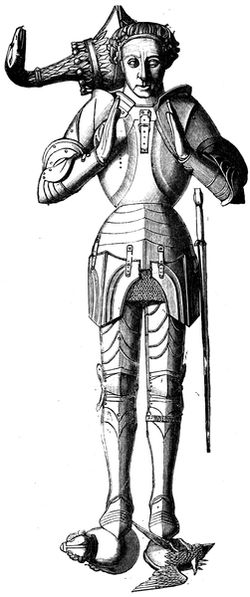
Gilt-latten effigy (front view) of Richard Beauchamp, Earl of Warwick, died 1439: from his tomb at Warwick. Made by William Austen, of London, founder, 1453.
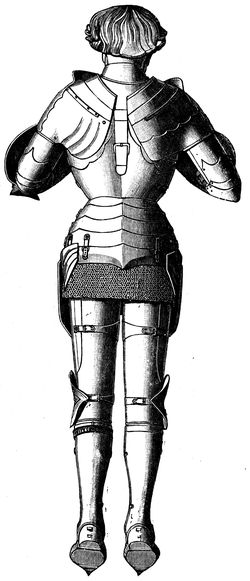
Gilt-latten effigy (back view) of Richard Beauchamp, Earl of Warwick, died 1439: from his tomb at Warwick. Made by William Austen, of London, founder, 1453.
13. Continued Rivalry of Beaufort and Gloucester. 1439—1441.—The chief advocate in England of the attempt to make peace at Calais in 1439 had been Cardinal Beaufort, whose immense wealth gave him authority over a Council which was always at its wits' end for money. Beaufort was wise enough to see that the attempt to reconquer the lost territory, or even to hold Normandy, was hopeless. Such a view, however, was not likely to (p. 315) be popular. Nations, like men, often refuse openly to acknowledge failure long after they cease to take adequate means to avert it. Of the popular feeling Gloucester made himself the mouthpiece, and it was by his influence that exorbitant pretensions had been put forward at Calais. In 1440 he accused Beaufort of using his authority for his own private interests, and though Beaufort gave over to the public service a large sum of money which he received as the ransom of the Duke of Orleans from a captivity which had lasted twenty-four years (see p. 303), Gloucester virulently charged him with an unpatriotic concession to the enemy. Gloucester's domestic relations, on the other hand, offered an easy object of attack. When he deserted Jacqueline he took a mistress, Eleanor Cobham, and subsequently married her, which he was able to do without difficulty, as his union with Jacqueline was, in the eyes (p. 316) of the Church, no marriage at all. The new Duchess of Gloucester being aware that if the king should die her husband would be next in order of succession to the throne, was anxious to hasten that event. It was a superstitious age, and the Duchess consulted an astrologer as to the time of the king's death, and employed a reputed witch to make a waxen image of the king under the belief that as the wax melted before the fire the king's life would waste away. In 1441 these proceedings were detected. The astrologer was hanged, the witch was burnt, whilst the Duchess escaped with doing public penance and with imprisonment for life. Gloucester (p. 317) could not save her, but he did not lose his place in the Council, where he continued to advocate a war policy, though with less success than before.
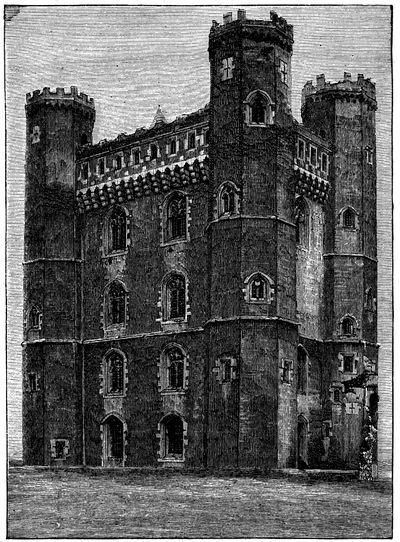
Tattershall Castle, Lincolnshire: built of brick by Ralph, Lord Cromwell, between 1433 and 1455.
14. Beaufort and Somerset. 1442—1443.—In 1442 Henry was in his twenty-first year. Unfeignedly religious and anxious to be at peace with all men, his character was far too weak and gentle to fit him for governing in those rough times. He had attached himself to Beaufort because Beaufort's policy was pacific, and because Gloucester's life was scandalous. Beaufort's position was secured at court, but the situation was not one in which a pacific statesman could hope for success. The French would not consent to make peace till all that they had lost had been recovered; yet, hardly bested as the English in France were, it was impossible in the teeth of English public opinion for any statesman, however pacific, to abandon lands still commanded by English garrisons. Every year, however, brought the problem nearer to the inevitable solution. In 1442 the French attacked the strip of land which was all that the English now held in Guienne and Gascony, and with the exception of Bordeaux and Bayonne captured almost every fortified town. The command in France was given to Cardinal Beaufort's nephew, John Beaufort, Duke of Somerset. Somerset, who was thoroughly incompetent, did not even leave England till the autumn of 1443, and when he arrived in France accomplished nothing worthy of his office.
15. The Angevin Marriage Treaty. 1444—1445.—Henry now fell under the influence of William de la Pole, Earl of Suffolk, a descendant of the favourite of Richard II. Suffolk had fought bravely in France, and had learnt by sad experience the hopelessness of the English cause. In 1444, with the consent of the king and the Parliament, he negotiated at Tours a truce for ten months. In order to make it more lasting there was to be a marriage between Henry and Margaret of Anjou. Her father, René, the Duke of Anjou, was titular king of Jerusalem and Sicily, in neither of which did he possess a foot of ground, whilst his duchy of Anjou was almost valueless to him in consequence of the forays of the English, who still held posts in Maine. Charles had the more readily consented to the truce, because it was understood that the surrender of Maine would be a condition of the marriage. In 1445 Suffolk led Margaret to England, where her marriage to Henry was solemnised. A French queen who brought with her no portion except a truce bought by the surrender of territory could hardly fail to be unpopular in England.
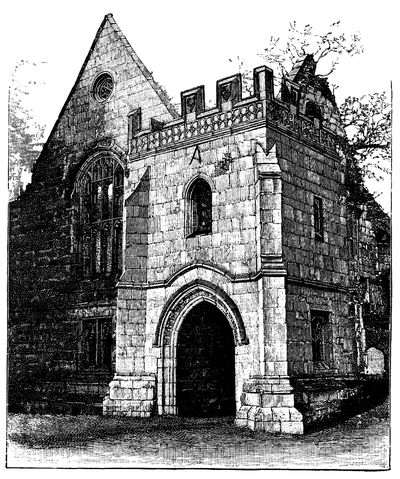
Part of Wingfield manor-house, Derbyshire: built by Ralph, Lord Cromwell, about 1440.
(p. 318) 16. Deaths of Gloucester and Beaufort. 1447.—The truce was renewed from time to time, and Suffolk's authority seemed firmly established. In 1447 Gloucester was charged with high treason in a Parliament held at Bury St. Edmunds, but before he had time to answer he was found dead in his bed. His death may, with strong probability, be ascribed to natural causes, but it was widely believed that he had been murdered and that Suffolk was the murderer. A few weeks later Gloucester's old rival, Cardinal Beaufort, the last real statesman who supported the throne of Henry VI., followed him to the grave, and Suffolk was left alone to bear the responsibility of government and the disgrace of failure.
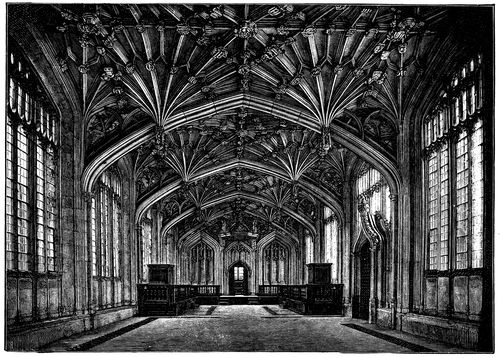
The Divinity School, Oxford: built between 1445 and 1454.
17. The Loss of the French Provinces. 1448—1449.—Suffolk had undertaken more than he was able to fulfil. Somerset had died in 1444, and Suffolk being jealous of all authority but his own, (p. 319) he sent York to govern Ireland. He could not secure the fulfilment of the conditions which he had made with the king of France. The English commanders refused to evacuate Maine, and in 1448 a French army entered the province and drove out the English. (p. 320) Edmund, the new Duke of Somerset, was sent to take the command in Normandy, which had formerly been held by his brother. In 1449 an Aragonese captain in the English service, who had no pay for his troops, having seized Fougères, a place on the frontier of Brittany, for the sake of the booty to be gained, Charles made the attack an excuse for the renewal of the war. So destitute was the condition in which the English forces were left that neither Somerset nor the warlike Talbot (see p. 313), who had recently been created Earl of Shrewsbury, was able to resist him. Rouen fell in 1450, and in 1450 the whole of Normandy was lost. In 1451 the French attacked Bordeaux and Bayonne, two port-towns which, in consequence of their close commercial intercourse with England, had no wish to transfer their allegiance to Charles. England, however, sent them no succour, and before the end of the year they were forced to capitulate. The relics of Guienne and Gascony thus passed into the hands of the French, and of all the possessions which the kings of England had once held on the Continent Calais alone remained.[Back to Contents]
LEADING DATES
Reign of Henry VI., 1422-1461
1. The Growth of Inclosures.—Since the insurrection of the peasants in 1381 (see p. 268) villeinage had to a great extent been dying out, in consequence of the difficulty felt by the lords in enforcing their claims. Yet the condition of the classes connected with the land was by no means prosperous. The lords of manors indeed abandoned the old system of cultivating their own lands (p. 321) by the labour of villeins, or by labourers hired with money paid by villeins in commutation for bodily service. They began to let out their land to tenants who paid rent for it; but even the new system did not bring in anything like the old profit. The soil had been exhausted for want of a proper system of manuring, and arable land scarcely repaid the expenses of its cultivation. For this evil a remedy was found in the inclosure of lands for pasturage. This change, which in itself was beneficial by increasing the productiveness of the country, and by giving rest to the exhausted soil, became oppressive because all the benefit went to the lords of the manors, whilst the tenants of the manors were left to struggle on as best they might. Not only had they no share in the increase of wealth which was brought about by the inclosure of what had formerly been the common land of the manors, but the poorer amongst them had less employment than before, as it required fewer men to look after sheep than to grow corn.
2. Increasing Power of the Nobility.—The disproportionate increase of the wealth of the landowners threw into their hands a disproportionate amount of power. The great landowner especially was able to gather bands of retainers and to spread terror around him. The evil of liveries and maintenance, which had become prominent in the reign of Richard II. (see p. 281), had increased since his deposition. It was an evil which the kings were powerless to control. Again and again complaints were raised of 'want of governance.' Henry V. had abated the mischief for a time by employing the unruly elements in his wars in France, but it was a remedy which, when defeat succeeded victory, only increased the disease which it was meant to cure. When France was lost bands of unruly men accustomed to deeds of violence poured back into England, where they became retainers of the great landowners, who with their help set king and laws at defiance.
3. Case of Lord Molynes and John Paston.—The difficulty of obtaining justice may be illustrated by a case which occurred in Norfolk. The manor of Gresham belonged to John Paston, a gentleman of moderate fortune. It was coveted by Lord Molynes, who had no legal claim to it whatever. Lord Molynes, however, took possession of it in 1448 with the strong hand. If such a thing had happened at present Paston would have gone to law; but to go to law implies the submitting of a case to a jury, and in those days a jury was not to be trusted to do justice. In the first place it was selected by the sheriff, and the sheriff took care to choose such men as would give a verdict pleasing to the great men whom (p. 322) he wished to serve, and in the second place, supposing that the sheriff did not do this, a juryman who offended great men by giving a verdict according to his conscience, but contrary to their desire, ran the risk of being knocked on the head before he reached home. Paston accordingly, instead of going to law, begged Lord Molynes to behave more reasonably. Finding his entreaties of no avail, he took possession of a house on the manor. Lord Molynes merely waited till Paston was away from home, and then sent a thousand men, who drove out Paston's wife and pillaged and wrecked the house. Paston ultimately recovered the manor, but redress for the injury done him was not to be had.
4. Suffolk's Impeachment and Murder. 1450.—A government which was too weak to redress injuries was certain to be unpopular. The loss of the French possessions made it still more unpopular. The brunt of the public displeasure fell on Suffolk, who had just been made a duke, and who, through the queen's favour, was all-powerful at court. It was believed that he had sold himself to France, and it was known that whilst the country was impoverished large grants had been made to court favourites. An outcry was raised that the king 'should live of his own,' and ask for no more grants from his people. In 1450 Suffolk was impeached. Though the charge brought against him was a tissue of falsehoods, Henry did not dare to shield him entirely, and ordered him into banishment for five years. Suffolk, indeed, embarked for the Continent, but a large ship ranged up alongside of the vessel in which he was. Having been dragged on board amidst cries of "Welcome, traitor!" he was, two days afterwards, transferred to a boat, where his head was chopped off with six strokes of a rusty sword. His body was flung on the beach at Dover.
5. Jack Cade's Rebellion. 1450.—Suffolk's supporters remained in office after his death. The men of Kent rose against them, and found a leader in an Irish adventurer, Jack Cade, who called himself Mortimer, and gave out that he was an illegitimate son of the late Earl of March. He established himself on Blackheath at the head of 30,000 men, asking that the burdens of the people should be diminished, the Crown estates recovered, and the Duke of York recalled from Ireland to take the place of the present councillors. Jack Cade's rebellion, in short, unlike that of Wat Tyler, was a political, not a social movement. In demanding that the government should be placed in the hands of the Duke of York, Jack Cade virtually asked that the Duke should step into the place, not of the Council, but of the King—that is to say, that a ruler who (p. 323) could govern should be substituted for one who could not, and in whose name the great families plundered England. It was this demand which opened the long struggle which was soon to devastate the country. At first it seemed as if Jack Cade would carry all before him. London, which had the most to gain by the establishment of a strong government, opened its gates to him. When, however, he was tested by success, he was found wanting. Striking with his sword the old Roman milestone known as London Stone, he cried out, "Now is Mortimer lord of this city." His followers gave themselves up to wild excesses. They beheaded Lord Say and his son-in-law, the Sheriff of Kent, and carried about their heads on pikes. They plundered houses and shops. The citizens who had invited them to enter now turned against them. After a fight on London Bridge the insurgents agreed to go home on the promise of a pardon. Jack Cade himself, attempting to gather fresh forces, was chased into Sussex and slain.
6. Rivalry of York and Somerset. 1450—1453.—In the summer of 1450, Richard, Duke of York, the real leader of the opposition, came back from Ireland. He found that Somerset, who had just returned from Normandy after the final loss of that province (see p. 320), had succeeded Suffolk in the king's confidence. Somerset, however, was not merely the favourite of Henry and the queen. The bulk of the nobility was on his side, whilst York was supported by the force of popular discontent and by such of the nobility as cherished a personal grudge against Somerset and his friends. In 1451 the loss of Guienne and Gascony increased the weight of Somerset's unpopularity. In 1452 both parties took arms; but, this time, civil war was averted by a promise from the king that York should be admitted to the Council, and that Somerset should be placed in confinement till he answered the charges against him. On this York dismissed his army. Henry, however, was not allowed to keep his promise, and Somerset remained in power, whilst York was glad to be allowed to retire unhurt. Somerset attempted to recover his credit by fresh victories in France, and sent the old Earl of Shrewsbury to Bordeaux to reconquer Gascony. Shrewsbury was successful for a while, but in 1453 he was defeated and slain at Castillon, and the whole enterprise came to nothing.
7. The First Protectorate of the Duke of York. 1453—1454.—Henry's mind had never been strong, and in 1453 it entirely gave way. His insanity was probably inherited from his maternal grandfather, Charles VI. The queen bore him a son, named Edward, but though the infant was brought to his father, Henry gave no sign (p. 324) of recognising his presence. It was necessary to place the government in other hands, and in 1454 the Duke of York was named Protector by the House of Lords, which, as the majority of its members were at that time ecclesiastics, did not always re-echo the sentiments of the great families. If only the king had remained permanently insane York might have established an orderly government. Henry, however, soon recovered as much sense as he ever had, and York's protectorate came to an end.
8. The First Battle of St. Albans and the Duke of York's Second Protectorate.—The restoration of Henry was in reality the restoration of Somerset. In 1455 York, fearing destruction, took arms against his rival. A battle was fought at St. Albans, in which Somerset was defeated and slain. This was the first battle in the wars known as the Wars of the Roses, because a red rose was the badge of the House of Lancaster, to which Henry belonged, and a white rose the badge of the House of York. After the victory York accompanied the king to London. Though the bulk of the nobility was against him, he had on his side the powerful family of the Nevills, as he had married Cicely Nevill, the sister of the head of that family, the Earl of Salisbury. Still more powerful was Salisbury's eldest son, who had married the heiress of the Beauchamps, Earls of Warwick, and who held the earldom of Warwick in right of his wife.[30] In June 1455 the king was again insane, and York was for the second time named Protector. This Protectorate, however, did not last long, as early in 1456 the king recovered his senses, and York had to resign his post.
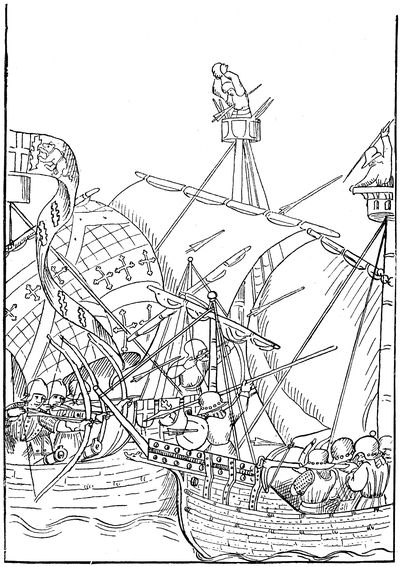
A sea-fight: from the 'Life of Richard Beauchamp, Earl of Warwick:' drawn by John Rous about 1485.
(p. 325) 9. Discomfiture of the Yorkists. 1456—1459.—For two years Henry exercised such authority as he was capable of exercising. In 1458 he tried his hand at effecting a reconciliation. The chiefs (p. 326) of the two parties walked hand in hand in procession to St. Paul's, York himself leading the queen. The Yorkists founded masses for the repose of the souls of their enemies slain at St. Albans, and paid money to their widows. It seemed as if the old practice of the weregild (see p. 32) had been unexpectedly revived. The spirit which had made weregild possible was, however, no longer to be found. Warwick retired to Calais, of which he was governor, and sent out vessels to plunder the merchant ships of all nations. When he was summoned to Westminster to give account of his actions, a quarrel broke out there between his servants and those of the king. Believing his own life to be in danger, he made his way back to Calais. The Yorkists spent the winter in preparing for war. In the summer of 1459 Lord Audley, sent by the queen to seize the Earl of Salisbury, was defeated by him at Blore Heath, in Staffordshire. Later in the year the two parties with their whole forces prepared for a battle near Ludlow, but the Yorkists found themselves no match for their enemies, and, without fighting, York, with his second son, the Earl of Rutland, took refuge in Ireland. His eldest son Edward, Earl of March, with Salisbury and Warwick, made his way to Calais.

Effigy of Sir Robert Harcourt, K.G. (died 1471): from his tomb at Stanton Harcourt, Oxon; showing armour worn from about 1445 to 1480.
10. The Battle of Northampton and the Duke of York's Claim to the Throne. 1460.—In 1460 the Yorkist Earls of Salisbury, Warwick, and March were once more in England. They defeated the royal army at (p. 327) Northampton and captured the king. York returned from Ireland, and, as soon as Parliament met, took an unexpected step. If hereditary descent was to count for anything, his claim to the throne was superior to that of Henry himself, as he was the heir of Edward III. through his mother Anne, the sister of the last Earl of March.[31] The Duke of York now placed his hand on the throne, claiming it in right of birth. The Lords decided that Henry, to whom they had sworn oaths of fealty, should retain the crown, but that York should succeed him, to the exclusion of Henry's son, Edward, Prince of Wales.
11. The Battle of Wakefield. 1460.—The struggle, which had at first been one between two unequal sections of the nobility, each nominally acknowledging Henry VI. as their king, thus came to be one between the Houses of Lancaster and York. The queen, savage at the wrong done to her son, refused to accept the compromise. Withdrawing to the North, she summoned to her aid the Earl of Northumberland and the Lancastrian lords. The North was always exposed to Scottish invasions, and the constant danger kept the inhabitants ready for war, and strengthened the authority of the great lords who led them. For the same reason the people of the North were ruder and less civilised than their fellow-countrymen in the South. Plunder and outrage did not come amiss to men who were frequently subjected to plunder and outrage. An army composed of 18,000 of these rough warriors placed (p. 328) itself at the queen's disposal. With these she routed her enemies at Wakefield. York himself was slain. His son, Rutland, was stabbed to death by Lord Clifford, whose father had been slain at St. Albans. Salisbury was subsequently beheaded by the populace at Pontefract. By command of Margaret, York's head was cut off, and, adorned in mockery with a paper crown, was fixed with those of Salisbury and Rutland above one of the gates of York.
12. The Battle of Mortimer's Cross and the Second Battle of St. Albans. 1461.—The battle of Wakefield differed in character from the earlier battles of the war. They had been but conflicts between bands of noblemen and their armed retainers, in which the general population took little part, whilst the ordinary business of the country went on much as usual. At Wakefield not only were cruel passions developed, but a new danger appeared. When Margaret attempted to gain her ends with the help of her rude northern followers, she roused against her the fears of the wealthier and more prosperous South. The South found a leader in York's son, Edward. Though only in his nineteenth year, Edward showed that he had the qualities of a commander. Rapid in his movements, he fell upon some Lancastrian forces and defeated them on February 2, 1461, at Mortimer's Cross. In the meanwhile Margaret was marching with her northern host upon London, plundering and destroying as she went. Warwick, carrying the king with him, met her on the way, but in the second battle of St. Albans—fought on February 17—was driven back, leaving the king behind him.
13. The Battle of Towton and the Coronation of Edward IV. 1461.—With a civilised army at her back, Margaret might have won her way into London, and established her authority, at least for a time. Her unbridled supporters celebrated their victory by robbery and rape, and Margaret was unable to lead them forward. The Londoners steeled their hearts against her. Edward was marching to their help, and on February 25 he entered London. The men of the neighbouring counties flocked in to his support. On March 2 the crown was offered to him at Clerkenwell by such lords as happened to be in London. On his presenting himself to the multitude in Westminster Hall, he was greeted with shouts of "Long live the king!" Edward IV. represented to peace-loving England the order which had to be upheld against the barbarous host which Margaret and the Lancastrian lords had called to their aid. He had yet to justify the choice. The northern host had retreated to its own country, and Edward swiftly followed (p. 329) it up. His advanced guard was surprised and driven back at Ferry Bridge; but his main army pressed on, and on March 29 gained a decisive victory at Towton. The slaughter of the defeated side was enormous. Margaret escaped with Henry to Scotland, and Edward, returning southwards, was crowned at Westminster on June 29.[Back to Contents]
LEADING DATES
1. Edward IV. and the House of Commons. 1461.—On June 29, 1461, Edward IV. was crowned, and created his two brothers, George and Richard, Dukes of Clarence and Gloucester. His first Parliament declared the three Lancastrian kings to have been usurpers, and Henry VI., his wife, his son, and his chief supporters, to be traitors. At the end of the session Edward thanked the Commons for their support, and assured them of his resolution to protect them at the hazard of his own life. It was the first time that a king had addressed the Commons, and his doing so was a sign that a new era had begun, in which the wishes of the middle class in town and country were to prevail over those of the great nobles. It did not follow that the House of Commons would take the control of the government into its own hands, as it does at the present day. For a long time the election of the members had been carried out under pressure from the local nobility. If the great men in a county resolved that certain persons should be returned as members, those who came to the place of election in support of others would be driven off, and perhaps beaten or wounded. Consequently each House of Commons had hitherto represented the dominant party, Lancastrian or Yorkist, as the case might be. (p. 330) Before there could be a House of Commons capable of governing, the interference of the nobles with elections would have to be brought to an end, and it was only by a strong king that their power could be overthrown. The strengthening of the kingship was the only road to future constitutional progress.
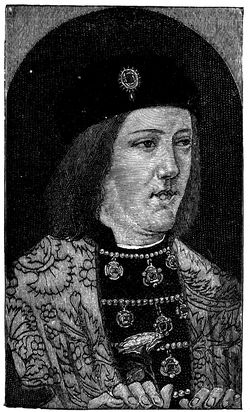
Edward IV.: from an original painting belonging to the Society of Antiquaries.
2. Loss of the Mediæval Ideals.—Before the end of the 15th century the English people had lost all the ideals of the middle ages. The attempt of Henry V. to revive the old ecclesiastical feeling had broken down through the race for material power opened by his French wars, and through the savagery of the wars of the Roses. The new religious feeling of Wycliffe and the nobler Lollards had perished with Sir John Oldcastle from the same causes. Neither the Church nor the opponents of the Church had any longer a sway over men's hearts. The clergy continued to perform their part in the services of the Church not indeed without belief, but without the spiritual fervour which influences the lives of men. The chivalry of the middle ages was as dead as its religion. Men spoke of women as coarsely as they spoke of their cattle. Human nature indeed could not be entirely crushed. John Paston's wife (see p. 321), for instance, was quaintly affectionate. "I would," she once wrote to her husband, "ye were at home, if it were for your ease ... now liever than a gown, though it were of scarlet." But the system of wardship (see p. 116) made marriages a matter of bargain and sale. "For very need," wrote a certain Stephen Scrope, "I was fain to (p. 331) sell a little daughter I have for much less than I should." When Scrope was old he wished to marry Paston's young sister, and the girl was willing to take him if she were sure that his land was not burdened with debt. She would be glad enough to escape from home. Her mother kept her in close confinement and beat her once or twice every week, and sometimes twice a day, so that her head was broken in two or three places. This low and material view of domestic life had led to an equally low and material view of political life, and the cruelty which stained the wars of the Roses was but the outcome of a state of society in which no man cared much for anything except his own greatness and enjoyment. The ideal which shaped itself in the minds of the men of the middle class was a king acting as a kind of chief constable, who, by keeping great men in order, would allow their inferiors to make money in peace.
3. Fresh Efforts of the Lancastrians. 1462—1465.—Edward IV. only very partially responded to this demand. He was swift in action when a crisis came, and was cruel in his revenge, but he was lustful and indolent when the crisis was passed, and he had no statesmanlike abilities to lay the foundations of a powerful government. The wars were not ended by his victory at Towton. In 1462 Queen Margaret reappeared in the North, and it was not till 1464 that Warwick's brother, Lord Montague, thoroughly defeated her forces at Hedgeley Moor and Hexham; for which victories he was rewarded by Edward with the earldom of Northumberland, which had been forfeited by the Lancastrian head of the House of Percy. Montague's victory was marked by the usual butcheries; the Duke of Somerset, a son of the duke who had been slain at St. Albans, being amongst those who perished on the scaffold. In 1465 Henry himself was taken prisoner and lodged in the Tower.
4. Edward's Marriage. 1464.—Whilst these battles were being fought Edward was lingering in the South courting the young widow of Sir John Grey, usually known by her maiden name as Elizabeth Woodville. His marriage to her gave offence to his noble supporters, who disdained to acknowledge a queen of birth so undistinguished; and their ill-will was increased when they found that Edward distributed amongst his wife's kindred estates and preferments which they had hoped to gain for themselves. The queen's father became Earl Rivers and Lord Constable, and her brothers and sisters were enriched by marriages with noble wards of the Crown. One of her brothers, a youth of twenty, was married to the old Duchess of Norfolk, who was over eighty.
(p. 332) 5. Estrangement of Warwick. 1465—1468.—No doubt there was as much of policy as of affection in the slight shown by Edward to the Yorkist nobility. Warwick—the King-maker, as he was called—had special cause for ill-humour. He had expected to be a King-ruler as well as a King-maker, and he took grave offence when he found Edward slipping away from his control. It seemed as if Edward had the settled purpose of raising up a new nobility to counterbalance the old. In 1467 Warwick's brother, the Archbishop of York, was deprived of the chancellorship. In foreign politics, too, Edward and Warwick disagreed. Warwick had taken up the old policy of the Beauforts, and was anxious for an alliance with the astute Louis XI., who had in 1461 succeeded his father, Charles VII., as king of France. Edward, perhaps with some thought passing through his head of establishing his throne by following in the steps of Henry V., declared for an alliance with Burgundy. In 1467 Warwick was allowed to go to France as an ambassador, whilst Edward was entertaining Burgundian ambassadors in England. In the same year Charles the Rash succeeded his father, Philip the Good (see p. 306), as Duke of Burgundy, and in 1468 married Edward's sister, Margaret. The Duke of Burgundy, the rival of the king of France, was the lord of the seventeen provinces of the Netherlands, and his friendship brought with it that peaceful intercourse with the manufacturing towns of Flanders which it was always the object of English policy to secure.
6. Warwick's Alliance with Clarence. 1469—1470.—Warwick, disgusted with Edward, found an ally in Edward's brother, Clarence, who, like Warwick, was jealous of the Woodvilles. Warwick had no son, and his two daughters, Isabel and Anne, would one day share his vast estates between them. Warwick gave Isabel in marriage to Clarence, and encouraged him to think that it might be possible to seat him—in days when everything seemed possible to the strong—on Edward's throne. Edward had by this time lost much of his popularity. His extravagant and luxurious life made men doubt whether anything had been gained by substituting him for Henry, and in 1469 and 1470 there were risings fomented by Warwick. In the latter year Edward, with the help of his cannon, the importance of which in battles was now great, struck such a panic into his enemies at a battle near Stamford that the place of action came to be known as Lose-coat Field, from the haste with which the fugitives stripped themselves of their armour to make their flight the easier. Warwick (p. 333) and Clarence fled across the sea. Warwick was governor of Calais, but his own officer there refused to admit him, and he was forced to take refuge in France.
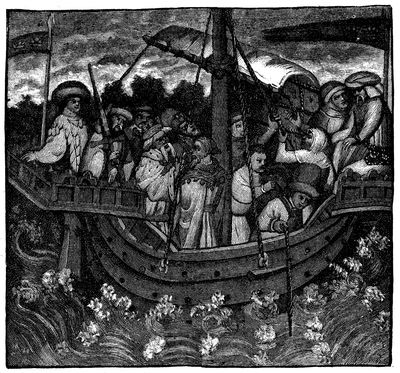
A fifteenth-century ship: from Harl. MS. 2278.
7. The Restoration of Henry VI. 1470.—Warwick knew that he had no chance of recovering power without the support of the Lancastrian party, and, disagreeable as it was to him, he allowed Louis XI. to reconcile him to Queen Margaret, the wife of that Henry VI., of whom he had been the bitterest enemy. Louis, who dreaded Edward's alliance with the Duke of Burgundy, did everything to support Edward's foes, and sent Warwick off to England, where he was subsequently to be joined by the queen. Edward, who was in his most careless mood, was foolish enough to trust Warwick's brother, Montague, from whom he had taken away, not only his new earldom of Northumberland to restore it to the head of the Percies (see p. 331), but all the lands connected with it, and had thought to compensate him with the mere marquisate (p. 334) of Montague, unaccompanied by any estate wherewith to support the dignity of his rank. Montague turned against him, and Edward, fearing for his life, fled to Holland. Warwick became master of England, and this time the King-maker drew Henry from the Tower and placed him once more on the throne, imbecile as he now was.
8. Edward IV. recovers the Throne. 1471.—In the spring of 1471 Edward was back in England, landing at Ravenspur, where Henry IV. had landed in 1399. Like Henry IV., he lyingly declared that he had come merely to claim his duchy and estates. Like Henry IV., too, he found a supporter in an Earl of Northumberland, who was this time the Percy who, Lancastrian as he was, had been restored by Edward to his earldom at the expense of Montague. Clarence, too—false, fleeting, perjured Clarence, as Shakspere truly calls him—had offered to betray Warwick. Edward gathered a sufficient force to march unassailed to London, where he was enthusiastically received. Taking with him the unfortunate Henry he won a complete victory at Barnet. The battle was fought in a dense fog, and was decided by a panic caused amongst Warwick's men through the firing of one of their divisions into another. Warwick and Montague were among the slain. By this time Margaret had landed with a fresh army at Weymouth. Edward caught her and her army at Tewkesbury, where he inflicted on her a crushing defeat. Her son, Edward Prince of Wales, was either slain in the battle, or more probably murdered after the fight was over; and the Duke of Somerset, the brother of the duke who had been executed after the battle of Hexham (see p. 331), the last male heir of the House of Beaufort, as well as others, who had taken refuge in the abbey, were afterwards put to death, though Edward had solemnly promised them their lives. On the night after Edward's return to London Henry VI. ended his life in the Tower. There can be no reasonable doubt that he was murdered, and that, too, by Edward's directions.
9. Edward IV. prepares for War with France. 1471—1474.—Edward IV. was now all powerful. He had no competitor to fear. No descendant of Henry IV. remained alive. Of the Beauforts, the descendants of John of Gaunt by Catherine Swynford (see p. 282), the male line had perished, and the only representative was young Henry, Earl of Richmond, whose mother, the Lady Margaret, was the daughter of the first Duke of Somerset, and the cousin of the two dukes who had been executed after the battles of Hexham (p. 335) and Tewkesbury.[32] His father, Edmund Tudor, Earl of Richmond, who died before his birth, was the son of a Welsh gentleman of no great mark, who had had the luck to marry Catherine of France, the widow of Henry V. The young Richmond was, however, an exile, and, as he was only fourteen years of age when Edward was restored, no serious danger was as yet to be apprehended from that side. Moreover, the slaughter amongst both the Yorkist and the Lancastrian nobility had, for the time, put an end to all danger of a rising. Edward was, therefore, at liberty to carry out his own foreign policy. He obtained grants from Parliament to enable him, in alliance with Charles of Burgundy, to make war against Louis XI. The grants were insufficient, and he supplemented them by a newly invented system of benevolences, which were nominally free gifts made to him by the well-to-do, but which were in reality exactions, because those from whom they were required dared not refuse to pay. The system raised little general ill will, partly because the small owners of property who were relieved from taxation were not touched by the benevolences, and partly because the end which Edward had put to the civil war made his government welcome. In some cases his personal charm counted for something. One old lady whom he asked for ten pounds (p. 336) replied that for the sake of his handsome face she would give him twenty. He kissed her and she at once made it forty.
10. The Invasion of France. 1475.—In 1475 Edward invaded France. If he could have secured the steady support of the Duke of Burgundy he might have accomplished something, but the Duke's dominions were too scattered to enable him to have a settled policy. He was sometimes led to attack the king of France, because he had interests as a French vassal; whilst at other times he threw all his strength into projects for encroachments in Germany, because he had also interests as a vassal of the Emperor. When Edward landed Charles was anxious to carry on war in Germany, and would give no help to Edward in France. Louis XI., who preferred a victory of diplomacy to one of force, wheedled Edward into a seven years' truce by a grant of 75,000 crowns, together with a yearly pension of 50,000, and by a promise to marry the Dauphin Charles to Elizabeth, the eldest daughter of the king of England. Louis also made presents to Edward's chief followers, and was delighted when the English army turned its back on France. In consequence of this understanding Queen Margaret recovered her liberty.
11. Fall and Death of Clarence. 1476—1478.—Soon after Edward's return he became suspicious of his brother Clarence, who took upon himself to interfere with the course of justice. In 1477 the Duke of Burgundy, Charles the Rash, was slain at Nancy by the Swiss, leaving only a daughter, Mary. Ducal Burgundy was at once seized by Louis, as forfeited for want of male heirs, but Franche Comté, or the county of Burgundy, was a part of the Empire, and therefore beyond his reach; and this latter district, together with the provinces of the Netherlands, formed a dower splendid enough to attract suitors for Mary's hand. Amongst these was Clarence,[33] now a widower. Edward, who had no wish to see his brother an independent sovereign, forbade him to proceed with his wooing. Other actions of Clarence were displeasing to the king, and when Parliament met, 1478, Edward with his own mouth accused his brother of treason. Clarence was condemned to death, and perished secretly in the Tower, being, according to rumour, drowned in a butt of malmsey.
12. The Last Years of Edward IV. 1478—1483.—The remainder of Edward's life was spent in quiet, as far as domestic affairs were (p. 337) concerned. In foreign affairs he met with a grave disappointment. Mary of Burgundy had found a husband in Maximilian, archduke of Austria, the son of the Emperor Frederick III. In 1482 she died, leaving two children, Philip and Margaret. The men of Ghent set Maximilian at naught, and, combining with Louis, forced Maximilian in the treaty of Arras to promise the hand of Margaret to the Dauphin, and the cession of some Netherlandish territory to France. Edward died on April 9, 1483, and it has been said that the treaty of Arras, which extended French influence in the Netherlands, brought about his death. It is more reasonable to attribute it to the dissoluteness of his life.
13. Edward V. and the Duke of Gloucester. 1483.—Edward IV. left two sons. The elder, a boy of twelve, was now Edward V., and his younger brother, Richard, was Duke of York.[34] The only grown-up man of the family was the youngest brother of Edward IV., Richard, Duke of Gloucester. Gloucester had shown himself during his brother's reign to be possessed of the qualities which fit a man to fulfil the duties of a high position. He was not only a good soldier and an able commander, but, unlike his brother Clarence, was entirely faithful to Edward, though he showed his independence by refusing to take part in Edward's treaty with Louis of France. He had a rare power of winning popular sympathy, and was most liked in Yorkshire, where he was best known. He had, however, grown up in a cruel and unscrupulous age, and had no more hesitation in clearing his way by slaughter than had Edward IV. or Margaret of Anjou. Though absolute proof is wanting, there is strong reason to believe that he took part in cutting down Prince Edward after the battle of Tewkesbury, and that he executed his (p. 338) brother's orders in providing for the murder of Henry VI. in the Tower. He made no remonstrance against, though he took no part in, the death of Clarence, with whom he was on bad terms, because Clarence claimed the whole of the estates of the King-maker, whose eldest daughter Isabel he had married; whereas Gloucester, having married the younger daughter Anne, the widow of the slaughtered son of Henry VI. put in a claim to half. Gloucester was now to be tried as he had never been tried before, his brother having appointed him by will to be the guardian of his young nephew and of the kingdom. If the authority thus conferred upon him met with general acceptance, he would probably make an excellent ruler. If it were questioned he would strike out, and show no mercy. In those hard days every man of high position must be either hammer or anvil, and Richard was resolved that he would not be the anvil.
14. Fall of the Queen's Relations. 1483.—The young king was at Ludlow, and rode up towards London, guarded by Earl Rivers, his uncle on his mother's side, and by his half-brother, Sir Richard Grey. Another half-brother, the Marquis of Dorset, was lieutenant of the Tower.[35] Gloucester had strong reasons for believing that the Greys intended to keep the young king in their hands and, having him crowned at once, so as to put an end to his own guardianship, to make themselves masters of the kingdom. He therefore struck the first blow. Accompanied by his friend and supporter, the Duke of Buckingham, he overtook the cavalcade, and sent Rivers and Grey prisoners to Pontefract. The queen-mother at once took refuge in the sanctuary at Westminster, whence no one could remove her without violating the privileges of the Church.
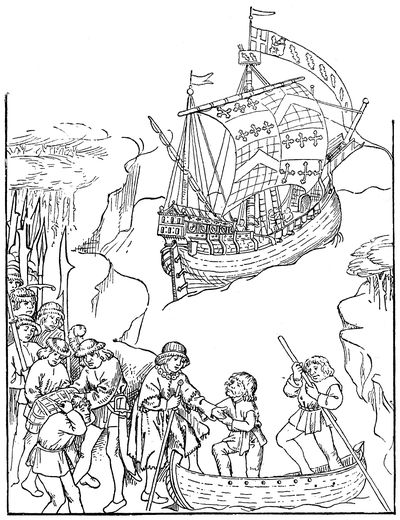
Large ship and boat of the fifteenth century. The mainsail of the ship has the Beauchamp arms, and the streamer the bear and ragged staff. From the 'Life of Richard Beauchamp, Earl of Warwick,' by John Rous; drawn about 1485.
15. Execution of Lord Hastings.—The young king arrived in London on May 4. The Council acknowledged Gloucester as Protector, and removed Edward to the Tower, which in those days was a place of safety rather than a prison. Dorset, however, had equipped a fleet, and Gloucester was afraid lest a fresh attempt (p. 339) might be made by the queen's party to overthrow him. His fears were increased because Lord Hastings, the leading member of the Council, who had taken his part against the Woodvilles, now turned against him and began to intrigue with the queen's (p. 340) supporters. Coming into the council chamber on June 13, he laid bare his left arm, which had been withered from his birth, and declared that the mischief was the effect of witchcraft, and that the witches were the queen and Jane Shore, who had been one of the many mistresses of Edward IV., and was now the mistress of Hastings. Hastings admitted that the queen and Jane Shore were worthy of punishment if they were guilty. "What!" cried Gloucester, "dost thou serve me with ifs and with ands? I tell thee they have done it, and that I will make good on thy body, traitor." Gloucester struck his fist on the table. Armed men rushed in, dragged Hastings out, and cut off his head on a log of wood. Jane Shore was compelled to do public penance in a white sheet. Of the causes of Hastings' desertion of Gloucester it is impossible to speak with certainty. It is a probable conjecture that he had discovered that Gloucester entertained the thought of making himself more than Protector. Young Edward's coronation would make the boy capable, formally at least, of exercising royal power, and as it was known that the boy loved his mother's relations, it was almost certain that he would place the Woodvilles in power. Now that Gloucester had imprisoned Rivers and Grey, it was certain that the first thing done by the Woodvilles, if they got a chance, would be to send Gloucester to the scaffold, and Gloucester was not the man patiently to allow himself to be crushed. It is ridiculous to speak of Gloucester as an accomplished dissembler. The story of witchcraft served its purpose, but it was the stupid lie of a man who had not hitherto been accustomed to lying.
16. Deposition of Edward V. 1483.—The execution of Hastings was promptly followed by the execution of Rivers and Grey. Dorset saved himself by escaping beyond sea. By threats Gloucester got the Duke of York into his hands, and lodged him with his brother in the Tower. He was now in a temper which would stop at no atrocity. He put up a Dr. Shaw to preach a sermon against Edward's claim to the throne. In those days if a man and woman made a contract of marriage neither of the contracting parties could marry another, though no actual marriage had taken place. Shaw declared that Edward IV. had promised marriage to one of his mistresses before he met Elizabeth Woodville, and that therefore, his marriage with Elizabeth being invalid, all his children by her were illegitimate, and Gloucester was the true heir to the throne. Further, Shaw declared that Gloucester was the only legitimate son of the Duke of York, both Edward IV. (p. 341) and Clarence being the sons of their mother by some other man. That Richard should have authorised so base an attack upon his mother's honour shows the depth of infamy to which he had now sunk. At first it seemed as if he had lowered himself to no purpose. The hearers of the sermon, instead of shouting, "God save King Richard!" held their peace. At a meeting in the City the Duke of Buckingham told the same story as had been told by Shaw, and there the servants of the two dukes shouted for 'King Richard,' and their voice was taken as the voice of the City. On June 25 Parliament declared Gloucester to be the lawful heir, and on July 6 he was crowned as Richard III. The Woodvilles were not popular, and the bloodshed with which Richard had maintained himself against them was readily condoned.
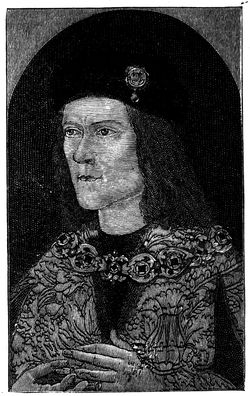
Richard III.: from an original painting belonging to the Society of Antiquaries.
17. Buckingham's Rebellion. 1483.—Richard's enemies were chiefly to be found amongst the nobility. No nobleman could feel his life secure if he crossed Richard's path. The first to revolt was Buckingham, who had played the part of a king-maker, and who was disappointed because Richard did not reward him by conceding his claim to estates so vast that if he possessed them he would have been master of England. Buckingham, who was descended from Edward III. through his youngest son, the Duke of Gloucester, at first thought of challenging a right to the throne for himself, but afterwards determined to support the claim of the Earl of Richmond, the Tudor heir of the House of Lancaster (see p. 334). He was skilfully led from one step to another by John (p. 342) Morton, Bishop of Ely, one of the ablest statesmen of the day. Richmond was to sail from Brittany, where he was in exile, and Buckingham was to raise forces in Wales, where the Welsh Tudors were popular, whilst other counties were to rise simultaneously. The rebellion came to nothing. Heavy rains caused a flood of the Severn, and Buckingham, in Shropshire, was cut off from his army in Wales. Buckingham was betrayed to Richard, and on November 2 was beheaded at Salisbury.
18. Murder of the Princes. 1483.—At some time in the summer or autumn the princes in the Tower ceased to live. There had been movements in their favour in some counties, and there can be no reasonable doubt that Richard had them secretly killed. It was only by degrees that the truth leaked out. Wherever it was believed it roused indignation. Murders there had been in plenty, but the murdered as yet had been grown men. To butcher children was reserved for Richard alone.
19. Richard's Government. 1484—1485.—As long as the last tale of murder was still regarded as doubtful, Richard retained his popularity. In a Parliament which met in January 1484 he enacted good laws, amongst which was one declaring benevolences illegal. In the summer he was welcomed as he moved about, yet he knew that danger threatened. Richmond was preparing invasion and the hollow friendship of the English nobility was not to be trusted. In vain Richard scattered gifts in profusion amongst them. They took the gifts and hoped for deliverance. The popular goodwill grew cooler, and in the winter Richard, needing money, and not venturing to summon another Parliament, raised a forced loan. A loan not being a gift, he did not technically break the statute against benevolences though practically he set it at naught. Domestic misfortunes came to add to Richard's political troubles. His only son, Edward, died in 1484. His wife, Anne, died in 1485. Richard was now eager, if he had not been eager before, to marry his niece, Elizabeth of York, the daughter of Edward IV. This monstrous proposal was scouted by his own supporters, and he had reluctantly to abandon the scheme. If there could be queens in England, Elizabeth was on hereditary principles the heiress of the throne, unless, indeed, Richard's argument against her mother's marriage (see p. 340) was to be accepted. Richmond was naturally as anxious as Richard could be to win her hand, and his promise to marry her was the condition on which he obtained the support of those Yorkists who were Richard's enemies.
(p. 343) 20. Richard Defeated and Slain at Bosworth. 1485.—In August 1485 Richmond landed at Milford Haven. As he marched on he was joined by considerable numbers, but on August 22 he found Richard waiting for him near Bosworth, with a host far larger than his own. Richard, however, could not count on the fidelity of his own commanders. Lord Stanley, who had married Richmond's widowed mother, the Lady Margaret (see p. 334), together with his brother, Sir William Stanley, were secretly in accord with Richmond, though they had placed themselves on Richard's side. When the battle began Stanley openly joined Richmond, whilst the Earl of Northumberland who was also nominally on Richard's side withdrew his forces and stood aloof. Knowing that defeat was certain, Richard, with the crown on his head, rushed into the thick of the fight and met a soldier's death. After the battle the fallen crown was discovered on a bush, and placed by Stanley, amidst shouts of 'King Henry!' on Richmond's head.
LEADING DATES
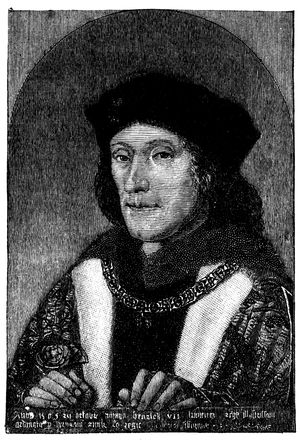
Henry VII.: from an original picture in the National Portrait Gallery.
1. The First Measures of Henry VII. 1485—1486.—Henry VII. owed his success not to a general uprising against Richard, but to a combination of the nobles who had hitherto taken opposite sides. To secure this combination he had promised to marry Elizabeth, the heiress of the Yorkist family. Lest an attempt should be made to challenge her title, Henry imprisoned in the Tower the Earl of Warwick, the son of Clarence, who might possibly maintain that a female was incapable of inheriting. He was indeed unwilling to have it thought that he derived his title from a wife, and when Parliament met on November 7 he obtained from it a recognition of (p. 344) his own right to the throne, though it would have puzzled the most acute controversialist to discover in what that right consisted. Parliament, therefore, contented itself with declaring that the inheritance of the crown was to 'be, rest, and abide in King Henry VII. and his heirs,' without giving any reasons why it was to be so.[36] As far as the House of Lords was concerned the attendance (p. 345) when this declaration was made was scanty. Only twenty-nine lay peers were present, not because many of the great houses had become extinct, but because some of the principal Yorkist peers had been attainted, and others had been left without a summons. In the quieter times which followed this slur upon them was removed, and the House of Lords was again filled. On January 18, 1486, Henry married Elizabeth. This marriage and the blending of the white and red rose in the Tudor badge was Henry's way of announcing that he intended to be the king of both parties.
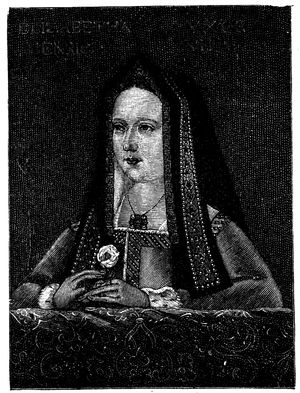
Elizabeth of York, queen of Henry VII.: from an original picture in the National Portrait Gallery.
2. Maintenance and Livery.—Henry could not maintain himself on the throne merely by the support of the nobility. The middle classes, as in the days of Edward IV., called out for a strong king, and were ready to overlook violence and cruelty if only order could be secured. Henry was shrewd enough to know that their aid was indispensable, and, Lancastrian as he was, he adopted the policy of the Yorkist kings. Economical and patient, he might succeed where Edward IV. had partially failed. He had no injuries to avenge, no cruelties to repay. He clearly saw that both the throne and the lives and properties of the middle classes were rendered insecure by maintenance and livery—the support given by (p. 346) the great landowners to their retainers, and the granting of badges by which the retainers might recognise one another, and thus become as it were a uniformed army ready to serve their lords in the field. Against these abuses Richard II. had directed a statute, (see p. 281) and that statute had been confirmed by Edward IV. These laws had, however, been inoperative; and Henry, in his first Parliament, did not venture to do more than to make the peers swear to abandon their evil courses.
3. Lovel's Rising. 1486.—In 1486 Lord Lovel, who had been one of Richard's ministers, rose in arms and seized Worcester. Henry found warm support even in Yorkshire, where Richard had been more popular than elsewhere. At short warning a 'marvellous great number of esquires, gentlemen, and yeomen' gathered round him, and the rebellion was easily put down. Lovel escaped to Flanders, where he found a protector in Margaret, the dowager Duchess of Burgundy, the sister of Edward IV. and Richard III. Before long a new attack upon Henry was developed. For the first time an English king had to ward off danger from Ireland.
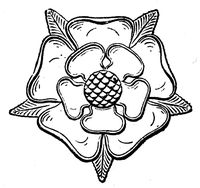
Tudor rose (white and red): from the gates of the Chapel of Henry VII.
4. Lancaster and York in Ireland. 1399—1485.—Since the expedition of Richard II. no king had visited Ireland, and the English colonists were left to defend themselves against the Celtic tribes as best they might. In 1449 Richard, Duke of York, who had not at that time entered on his rivalry with Henry VI., was sent to Dublin as Lord Lieutenant (see p. 319) where he remained till 1450, and gained friends amongst both races by his conciliatory firmness. In 1459, after the break-up of his party at Ludlow (see p. 326), he appeared in Ireland in the character of a fugitive seeking for allies. Between him and the English colony a bargain was soon struck. They gave him troops which fought gallantly for him at Wakefield, and he, claiming to be Lord Lieutenant, assented to an act in which they asserted the complete legislative independence of the Parliament of the colony. The colony, therefore, became distinctly Yorkist. Its leader was the Earl of Kildare, the chief of the eastern Fitzgeralds or Geraldines, the Earl of Desmond being the chief of the Geraldines of the West. Between them was the Earl of Ormond, the chief of the Butlers, the hereditary foe of the (p. 347) Geraldines, who, probably merely because his rivals were Yorkist, had attached himself to the Lancastrian party. All three were of English descent, but all three exercised the tribal authority of an Irish chief, and were practically independent of English control. Ormond fought at Towton on the Lancastrian side, and was executed after the battle. Family quarrels broke out amongst his kindred, and for the time Kildare was supreme in the English Pale (see p. 265).
5. Insurrection of Lambert Simnel. 1487.—Kildare and the colonists had every reason to distrust Henry, but to oppose him they needed a pretender. They found one in the son of an Oxford tradesman, a boy of ten, named Lambert Simnel, who had been persuaded to give himself out as the Earl of Warwick, who, as it was said, had escaped from the Tower. In 1487 Simnel landed in Ireland, where he was soon joined by Lord Lovel from Flanders, and by the Earl of Lincoln, of the family of Pole or De la Pole,[37] whose mother, Elizabeth, was the eldest sister of Edward IV., and who had been named by Richard III. as his heir after the death of his son (see p. 342). Lincoln and Lovel, after crowning Simnel at Dublin, crossed to Lancashire, taking with them the pretender, and 2,000 trained German soldiers under Martin Schwarz; as well as an Irish force furnished by Kildare. Scarcely an Englishman would join them, and on June 16 they were utterly defeated by Henry at Stoke, a village between Nottingham and Newark. Lincoln and Schwarz were slain. Lovel was either drowned in the Trent or, according to legend, was hidden in an underground vault, where he was at last starved to death through the neglect of the man whose duty it was to provide him with food. Simnel (p. 348) was pardoned, and employed by Henry as a turnspit in his kitchen.
6. The Court of Star Chamber. 1487.—Nothing could serve Henry better than this abortive rising. At Bosworth he had been the leader of one party against the other. At Stoke he was the leader of the nation against Irishmen and Germans. He felt himself strong enough in his second Parliament to secure the passing of an act to ensure the execution of the engagements to which the lords had sworn two years before (see p. 345). A court was to be erected, consisting of certain specified members of the Privy Council and of two judges, empowered to punish with fine and imprisonment all who were guilty of interfering with justice by force or intrigue. The new court, reviving, to some extent, the disused criminal authority of the king's Council, sat in the Star Chamber[38] at Westminster. The results of its establishment were excellent. Wealthy landowners, the terror of their neighbours, who had bribed or bullied juries at their pleasure, and had sent their retainers to inflict punishment on those who had displeased them, were brought to Westminster to be tried before a court in which neither fear nor favour could avail them. It was the greatest merit of the new court that it was not dependent on a jury, because in those days juries were unable or unwilling to give verdicts according to their conscience.
7. Henry VII. and Brittany. 1488—1492.—Henry VII. was a lover of peace by calculation, and would gladly have let France alone if it had been possible to do so. France, however, was no longer the divided power which it had been in the days of Henry V. When Louis XI. died in 1483, he left to his young son, Charles VIII., a territory the whole of which, with the exception of Brittany, was directly governed by the king. Charles's sister, Anne of Beaujeu, who governed in his name, made it the object of her policy to secure Brittany. She waged war successfully against its duke, Francis II., and after he died, in 1488, she continued to wage war against his daughter, the Duchess Anne. In England there was a strong feeling against allowing the Duchess to be overwhelmed. At the beginning of 1489 Henry, having received from Parliament large supplies, sent 6,000 Englishmen to Anne's assistance. Maximilian—whose hold on the Netherlands, where he ruled in the name of his young son, Philip (see p. 337), was always slight—proposed marriage to the (p. 349) young duchess, and in 1490 was wedded to her by proxy. He was a restless adventurer, always aiming at more than he had the means of accomplishing. Though he could not find time to go at once to Brittany to make good his claim, yet in 1491 he called on Henry to assist him in asserting it.
8. Cardinal Morton's Fork. 1491.—Henry, who knew how unpopular a general taxation was, fell back on the system of benevolences (see p. 335), excusing his conduct on the plea that the statute of Richard III. abolishing benevolences (see p. 342) was invalid, because Richard himself was a usurper. In gathering the benevolence the Chancellor, Cardinal Morton, who had been helpful to Henry in the days of his exile (see p. 341), invented a new mode of putting pressure on the wealthy, which became known as Cardinal Morton's fork. If he addressed himself to one who lived in good style, he told him that his mode of living showed that he could afford to give money to the king. If he had to do with one who appeared to be economical, he told him that he must have saved and could therefore afford to give money to the king. Before Henry could put the money thus gained to much use, Anne, pressed hard by the French, repudiated her formal marriage with Maximilian, who had never taken the trouble to visit her, and gave her hand to Charles VIII., who on his part refused to carry out his contract to marry Maximilian's daughter Margaret (see p. 337). From that time Brittany, the last of the great fiefs to maintain its independence, passed under the power of the king of France. Feudality was everywhere breaking down, and in France, as in England, a strong monarchy was being erected on its ruins.
9. The Invasion of France. 1492.—Maximilian's alliance had proved but a broken reed, but there was now arising a formidable power in the south of Europe, which might possibly give valuable support to the enemies of France. The peninsula to the south of the Pyrenees had hitherto been divided amongst various states, but in 1469 a marriage between Ferdinand, king of Aragon, and Isabella, the heiress of Castile, united the greater part under one dominion. Ferdinand and Isabella were, for the present, fully occupied with the conquest of Granada, the last remnant of the possessions of the Moors in Spain, and that city did not surrender till early in 1492. In the meanwhile all England was indignant with the king of France on account of his marriage with the heiress of Brittany. Money was voted and men were raised, and on October 2, 1492, Henry crossed to Calais to invade France. He (p. 350) was, however, cool enough to discover that both Ferdinand and Maximilian wanted to play their own game at his expense, and as Anne of Beaujeu was ready to meet him half-way, he concluded a treaty with the French king on November 3 at Etaples, receiving large sums of money for abandoning a war in which he had nothing to gain. In 1493 the Spaniards followed Henry's example, and made a peace with France to their own advantage.[39]
10. Perkin Warbeck. 1491—1494.—Henry's prudent relinquishment of a war of conquest was not likely to bring him popularity in England, and his enemies were now on the watch for another pretender to support against him. Such a pretender was found in Perkin Warbeck, a Fleming of Tournay, who had landed at Cork in the end of 1491 or the beginning of 1492, and who had been pressed by the townsmen to give himself some name which would attach him to the Yorkist family. He allowed them to call him Richard, Duke of York, the younger of the princes who had been murdered in the Tower. He received support from Desmond, and probably from Kildare, upon which Henry deprived Kildare of the office of Lord Deputy. Perkin crossed to France, and ultimately made his way to Flanders, where he was supported by Margaret of Burgundy. In 1493 Henry demanded his surrender, and on receiving a refusal broke off commercial intercourse between England and Flanders. The interruption of trade did more harm to England than to Flanders, and gave hopes to the Yorkist party that it might give rise to ill-will between the nation and the king. For some time, however, no one gave assistance to Perkin, and in 1494 Charles VIII. crossed the Alps to invade Italy, and drew the attention of the Continental powers away from the affairs of England.
11. Poynings' Acts. 1494.—Henry seized the opportunity to (p. 351) bring into obedience the English colony in Ireland. He sent over as Lord Deputy Sir Edward Poynings, a resolute and able man. At a Parliament held by him at Drogheda two acts were passed. By the one it was enacted that all English laws in force at that time should be obeyed in Ireland; by the other, known for many generations afterwards as Poynings' Law, no bill was to be laid before the Irish Parliament which had not been previously approved by the king and his Council in England. At the same time the greater part of the Statute of Kilkenny (see p. 265) was re-enacted; and restricted the authority of the Government at Dublin to the English Pale.
12. Perkin's First Attempt on England. 1495.—Henry's firm government in England had given offence even to men who were not Yorkists. Early in 1495 he discovered that Sir William Stanley, who had helped him to victory at Bosworth, had turned against him. Stanley, who was probably involved in a design for sending Perkin to invade England, was tried and executed. In the summer of 1495 Perkin actually arrived off Deal. Being no warrior, he sent a party of his followers on shore, though he remained himself on shipboard to see what would happen. The countrymen fell upon the invaders, who were all slain or captured. Then Perkin sailed to Ireland, was repulsed at Waterford, and ultimately took refuge in Scotland, where King James IV., anxious to distinguish himself in a war with England, acknowledged him as the Duke of York, and found him a wife of noble birth, Lady Catherine Gordon. It was probably in order to rally even the most timid around him, in face of such a danger, that Henry obtained the consent of Parliament to an act declaring that no one supporting a king in actual possession of the crown could be subjected to the penalty of treason in the event of that king's dethronement.
13. The Intercursus Magnus. 1496.—The danger of a Scottish invasion made Henry anxious to be on good terms with his neighbours. Maximilian had become Emperor in 1493 upon his father's death. In the Netherlands, however, his influence had declined, as his son, the young Archduke Philip, was now growing up, and claimed actually to rule the country which he had inherited from his mother, Mary of Burgundy (see p. 337), his father having merely the right of administering the government of it till he himself came of age. It was therefore with Philip, and not with Maximilian, that Henry concluded, in 1496, a treaty known as the Intercursus Magnus, for the encouragement of trade between England and the Netherlands, each (p. 352) party engaging at the same time to give no shelter to each other's rebels.
14. Kildare Restored to the Deputyship. 1496.—In Ireland also Henry was careful to avert danger. The government of Poynings had not been entirely successful, and the Geraldines had taken good care to show that they could be troublesome in spite of the establishment of English government. The Earl of Kildare was at the time in England, and a story is told of some one who, having brought a long string of charges against him, wound up by saying that all Ireland could not govern the Earl, whereupon the king replied that then the Earl should govern all Ireland. The story is untrue, but it well represents the real situation. In 1496 Henry sent Kildare back as Lord Deputy. A bargain seems to have been struck between them. Henry abandoned his attempt to govern Ireland from England, and Kildare was allowed to use the king's name in any enterprise upon which his heart was set, provided that he did not support any more pretenders to the English throne.
15. Perkin's Overthrow. 1496—1497.—In the autumn of 1496 James IV. made an attack on England in Perkin's name, but it was no more than a plundering foray. Henry, however, early in 1497, obtained from Parliament a grant of money, to enable him to resist any attempt to repeat it. This grant had unexpected consequences. The Cornishmen, refusing payment, marched up to Blackheath, where on June 18 they were overpowered by the king's troops. James IV., thinking it time to be quit of Perkin, sent him off by sea. In July Perkin arrived at Cork, but there was no shelter for him there now that Kildare was Lord Deputy, and in September he made his way to Cornwall. Followed by 6,000 Cornishmen he reached Taunton, but the news of the defeat of the Cornish at Blackheath depressed him, and the poor coward ran away from his army and took sanctuary in Beaulieu Abbey. He was brought to London, where he publicly acknowledged himself to be an impostor. Henry was too humane to do more than place him in confinement.
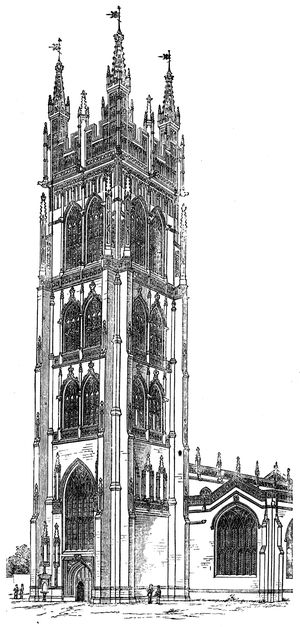
Tower of St. Mary's Church, Taunton: built about 1500.
16. European Changes. 1494—1499.—In 1494 Charles VIII. had passed through Italy as a conqueror to make good his claims to the kingdom of Naples. In 1495 he had returned to France, and in 1496 the French army left behind had been entirely destroyed. Yet the danger of a renewed attack from France made the other Continental powers anxious to unite, and in 1496 the Archduke Philip married Juana, the eldest daughter of Ferdinand (p. 354) and Isabella, whilst his sister was sent to Spain to be married to their only son, Juan. In 1497 the death of the young prince led to consequences unexpected when the two marriages were arranged. Philip, who held Franche Comté and the Netherlands, and who was through his father Maximilian heir to the German dominions of the House of Austria, would now, that his wife had become the heiress of Spain, be able to transmit to his descendants the whole of the Spanish monarchy as well. That monarchy was no longer confined to Europe. Portugal at the end of the fourteenth century had led the way in maritime adventure, and Portuguese navigators discovered a way to India round the Cape of Good Hope. Spain was anxious to do as much, and in 1492 Columbus had discovered the West Indies, and the kings of Spain became masters of the untold wealth produced by the gold and silver mines of the New World. It was impossible but that the huge power thus brought into existence would one day arouse the jealousy of Europe. For the present, however, the danger was less than it would be after the deaths of Ferdinand and Isabella, as the actual combination of their territories with those which Philip was to inherit from Maximilian had not been effected. In 1499 France gave a fresh shock to her neighbours. Charles VIII. had died the year before, and his successor, Louis XII., invaded Italy and subdued the duchy of Milan, to which he had set up a claim. Naturally the powers jealous of France sought to have Henry on their side. There had been for some time a negotiation for a marriage between Henry's eldest son, Arthur, Prince of Wales, and Catherine of Aragon, the youngest daughter of Ferdinand and Isabella, but hitherto nothing had been concluded.
17. Execution of the Earl of Warwick. 1499.—Perkin had long been eager to free himself from prison. In 1498 he was caught attempting to escape, but Henry contented himself with putting him in the stocks. He was then removed to the Tower, where he persuaded the unhappy Earl of Warwick (see p. 343) to join him in flight. It is almost certain that Warwick was guilty of no more, but Henry, soured by the repeated attempts to dethrone him, resolved to remove him from his path. On trumped-up evidence Warwick was convicted and executed, and Perkin shared his fate.
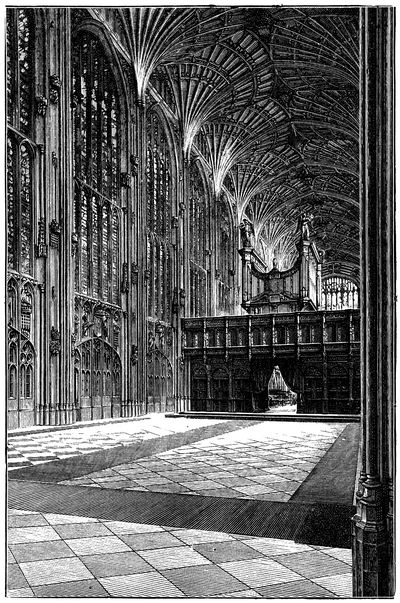
King's College Chapel, Cambridge (looking east). Begun by Henry VI. in 1441, completed by Henry VII. The screen built between 1531 and 1535.
18. Prince Arthur's Marriage and Death. 1501—1502.—Warwick's death was the one judicial murder of Henry's reign. To the Spaniards it appeared to be a prudent action which had cleared away the last of Henry's serious competitors. The negotiations (p. 356) for the Spanish marriage were pushed on, and in 1501 Catherine, a bride of fifteen, gave her hand to Arthur, a bridegroom of fourteen. In 1502 the prince died, and the attempt to bind England and Spain together seemed to have come to an end.
19. The Scottish Marriage. 1503.—Another marriage treaty proved ultimately to be of far greater importance. Henry was sufficiently above the prejudices of his time to be anxious to be on good terms with Scotland. For some time a negotiation had been in progress for a marriage between James IV. and Henry's daughter, Margaret. The marriage took place in 1503. To the counsellors who urged that in the case of failure of Henry's heirs in the male line England would become subject to Scotland Henry shrewdly replied that there was no fear of that, as 'the greater would draw the less.'
20. Maritime Enterprise.—Henry's chief merit was that he had re-established order. Commercial prosperity followed, though the commerce was as yet on a small scale. It is probable that the population of England was no more than 2,500,000. London contained but 130,000 inhabitants, whilst Paris contained 400,000. There was no royal navy, as there was no royal army, but merchant vessels were armed to protect themselves. The company of Merchant Adventurers made voyages to the Baltic, and the men of Bristol sent out fleets to the Iceland fishery. Henry did what he could to encourage maritime enterprise. He had offered to take Columbus into his service before the great navigator closed with Spain, and in 1497 he sent the Venetian, John Cabot, and his sons across the Atlantic, where they landed in Labrador before any Spaniards had set foot on the American continent. England however, was as yet too poor to push these discoveries farther, and the lands beyond the sea were for the present left to Spain.
21. Growth of the Royal Power.—The improvement in the general well-being of the country had been rendered possible by the extension of the royal power, and the price paid for order was the falling into abeyance of the constitutional authority of Parliaments. The loss indeed was greater in appearance than in reality. In the fifteenth century the election of members of the House of Commons depended more upon the will of the great lords than upon the political sentiments of the community. In the first half of the sixteenth century they depended on the will of the king. The peculiarity of the Tudor rule was that its growing despotism was (p. 357) exercised without the support of the army. It rested on the goodwill of the middle classes. Treading cautiously in the steps of Edward IV., Henry VII. recognised that in order to have a full treasury it was less dangerous to exact payments illegally from the few than to exact them legally from the many. Hence his recourse in times of trouble to benevolences. Hence, too, the eagerness with which he gathered in fines. The Cornish rebels were fined individually. The great lords who persisted in keeping retainers were fined. On one occasion the king visited the Earl of Oxford, and found, when he went away, a band of retainers drawn up to do him honour. "My lord," he said, "I thank you for your entertainment, but my attorney must speak with you." If there was a man in England who had deserved well of Henry it was Oxford, but Oxford had to pay 15,000l., a sum worth perhaps 180,000l. at the present day, to atone for his offence. No services rendered to Henry were to excuse from obedience to the law.
22. Empson and Dudley.—As Henry grew older the gathering of money became a passion. His chief instruments were Empson and Dudley, who under pretence of enforcing the law established the worst of tyrannies. Even false charges were brought for the sake of extracting money. At the end of his reign Henry had accumulated a hoard of 1,800,000l., mainly gathered by injustice and oppression. The despotism of one man was no doubt better than the despotism of many, but the price paid for the change was a heavy one.
23. Henry and his Daughter-in-law. 1502—1505.—On the death of Prince Arthur in 1502, Ferdinand and Isabella proposed that their daughter Catharine should marry her brother-in-law, Henry, the only surviving son of the king of England, though the boy was six years younger than herself. They had already paid half their daughter's marriage portion, and they believed, probably with truth, that they had little chance of recovering it from Henry VII., and that it would therefore be more economical to re-marry their daughter where they would get off with no more expense than the payment of the other half. Henry on the other hand feared lest the repayment of the first half might be demanded of him, and consequently welcomed the proposal. In 1503 a dispensation for the marriage was obtained from Pope Julius II., but in 1505, when the time for the betrothal arrived, the young Henry protested, no doubt at his father's instigation, that he would proceed no farther.
24. The Last Years of Henry VII. 1505—1509.—Circumstances (p. 358) were changed by the death of Isabella in 1504, when her son-in-law, the Archduke Philip, claimed to be sovereign of Castile in right of his wife Juana. Philip, sailing from the Netherlands to Spain in 1506, was driven into Weymouth by a storm, and Henry seized the opportunity of wringing from him commercial concessions as well as the surrender of Edmund de la Pole, a brother of the Earl of Lincoln who perished at Stoke, and a nephew of Edward IV. Henry was himself now a widower on the look-out for a rich wife, and Philip promised him the hand of his sister, Margaret, who had formerly been betrothed to Charles VIII. (see p. 337). Once more, however, the conditions of the game changed. Philip died a few months after his arrival in Spain, leaving a mad widow, and as Ferdinand then regained his authority Catharine's marriage was again discussed. Other schemes were also proposed, amongst them one for marrying Catharine, not to the young prince, but to her old father-in-law, the king. In 1509, before any of these plans could take effect, Henry VII. died. He deserves to be reckoned amongst the kings who have accomplished much for England. If he was not chivalrous or imaginative, neither was the age in which he lived. His contemporaries needed a chief constable to keep order, and he gave them what they needed.
25. Architectural Changes and the Printing Press.—Architecture, which in England, as upon the Continent, had been the one great art of the Middle Ages, was already, though still instinct with beauty, giving signs in its over-elaboration of approaching decadence. To the tower of Fotheringhay Church (see p. 311) had succeeded the tower of St. Mary's, Taunton. To the roof of the nave of Winchester Cathedral (see p. 276) had succeeded the roof of the Divinity School at Oxford (see p. 319), and of the chapel of King's College, Cambridge (see p. 355). Art in this direction could go no farther. The new conditions in which the following age was to move were indicated by the discovery of America and the invention of printing. New objects of knowledge presented themselves, and a new mode of spreading knowledge was at hand. In the reign of Edward IV., Caxton, the earliest English printer, set up his press at Westminster, and the king and his nobles came to gaze at it as at some new toy, little knowing how profoundly it was to modify their methods of government. Henry VII. had enough to do without troubling himself with such matters. It was his part to close an epoch of English history, not to open a fresh one.
(p. 359) Books recommended for further study of Part IV.
Green, J. R. History of the English People. Vol. i. p. 521-Vol. ii. p. 77.
Stubbs, W. (Bishop of Oxford). Constitutional History of England. Vol. ii. from p. 441, and Vol. iii.
Hallam, H. Constitutional History of England. Vol. i. pp. 1-15.
Rogers, J. E. Thorold. History of Agriculture and Prices. Vols. iii. and iv.
Cunningham, W. The Growth of English Industry and Commerce. Vol. i. pp. 335-449.
Wylie, J. H. History of England under Henry IV.
Gairdner, James. Lancaster and York.
—-—-— Richard III.
—-—-— Henry VII.
Ramsay, Sir James. Lancaster and York.
Oman, C. The Political History of England. Vol. iv. From the Accession of Richard II. to the Death of Richard III. (1377-1485).
Fisher, H. A. L. The Political History of England. Vol. v. From the Accession of Henry VII. to the Death of Henry VIII. (1485-1547).[Back to Contents]
Aaron, martyrdom of,
23.
Aclea, battle of,
57.
Acre, captured by the Crusaders,
161;
Edward I. at,
204.
Adrian IV. grants Ireland to Henry II.,
152.
Adulterine castles,
137.
Aedan, king of the Scots, is defeated at Degsastan,
42.
Ælfgar, earl of the Mercians,
90.
Ælfgifu, wife of Eadwig,
65,
66.
Ælfheah, Archbishop, murdered by the Danes,
82.
Ælfred, his struggle with the Danes,
58;
his position after the Treaty of Wedmore,
59;
gains London, ib.;
character of his work,
60.
Ælfred the Ætheling, murder of,
85,
86.
Ælfthryth, wife of Eadgar,
78.
Ælla, king of Deira, slave-boys from his kingdom found at Rome,
38.
Æscesdun, battle of,
58.
Æthelbald, king of the Mercians,
53.
Æthelbald, king of the West Saxons,
57.
Æthelberht, king of Kent, his supremacy,
38;
becomes a Christian,
39;
helps Augustine to set up bishoprics,
40;
death of,
41.
Æthelberht, king of the West Saxons,
57.
Æthelflæd, the Lady of the Mercians,
62.
Æthelfrith, king of North-humberland, his struggle with the northern Welsh,
41;
defeats the Scots at Degsastan,
42;
and the Kymry near Chester,
43;
is defeated and slain by Eadwine, ib.
Æthelred, ealdorman of Mercia,
60.
Æthelred, king of the West Saxons, his struggle with the Danes,
58,
62.
Æthelred the Unready, his relations with the Danes,
79;
and with the Normans,
80;
orders a massacre of the Danes,
81;
flies to Normandy,
82;
returns and dies,
83.
Æthelric unites North-humberland,
41.
Æthelstan, reign of,
63.
Æthelstan, the Half-King,
73.
Æthelwold drives secular canons from Winchester,
68.
Æthelwulf defeats the Northmen,
57.
Aëtius refuses help to the Britons,
26.
Agincourt, battle of,
302.
Agricola, campaigns of,
16;
forts built by,
17.
Agriculture in Eadgar's time,
75.
Aidan establishes himself in Holy Island,
47;
his relations with Oswald, ib.;
and with Oswine, ib.
Alban, martyrdom of,
23.
Albany, the Duke of, suspected of the murder of the Duke of Rothesay,
295;
is regent of Scotland,
296.
Albigeois, the, crusade against,
193.
Albin, probable Iberian derivation of the name, 6.
Albion, see Albin.
Alcluyd (Dumbarton), the capital of Strathclyde,
43.
Alexander, bishop of Lincoln,
134.
Alexander III., king of Scotland, death of,
214.
Alexander III., Pope, shrinks from supporting Archbishop Thomas,
145.
Alexander IV., Pope, confirms a grant of Sicily to Edmund Crouchback,
197.
Allectus asserts a claim to the Empire,
22.
Alnwick, Malcolm Canmore slain at,
119;
William the Lion captured at,
154;
dismantled,
296.
Ambresbyrig (Amesbury) named from Ambrosius,
34.
Ambrosius fights with the West Saxons,
34.
Ambrosius Aurelianus, fights with the Jutes,
27.
Amiens, the mise of,
200.
Anderida destroyed by the South Saxons,
28.
Andred's Wood covers the Weald,
27.
Angevin kings, Church and State under,
165;
growth of learning under,
167;
growth of commerce under,
168;
architectural changes under,
170.
Angles ravage Roman Britain,
24;
settle in Britain,
28;
advance gradually,
36;
see Bernicia, Deira, East Anglia, Mercia, North-humberland.
Anglesea, see Mona.
Anjou, Geoffrey, Count of,
131;
united with Normandy,
137;
declares for Arthur,
174;
conquered by Philip II.,
176;
English forays in,
317.
Anne of Beaujeu, policy of,
348.
Anne of Bohemia marries Richard II.,
278.
Anne of Brittany is married to Maximilian by proxy,
349;
married to Charles VIII.,
349.
Anselm acknowledges Ælfheah to be a martyr,
82;
character of,
117;
becomes Archbishop of Canterbury,
118;
quarrels with William II., ib.;
his relations with Henry I.,
125.
Antoninus Pius, wall of,
17.
Appellant, the Lords,
279.
Aquitaine, Duchy of, passes to Henry II. by his marriage,
137;
is given to Richard,
155;
divided in language and character from the North of France,
176;
intrigues of Philip IV. in,
218;
efforts of Philip VI. to gain,
234;
ceded to Edward III.,
253;
the Black Prince made Duke of,
254;
resistance to the Black Prince in,
256;
almost wholly lost,
257;
complete loss of,
320.
Aquæ Sulis (Bath) subdued by the West Saxons,
35.
Archers employed at Senlac,
96;
armed with the long bow at Falkirk,
221;
improperly employed at Bannockburn,
226;
effect of, at Halidon Hill,
234;
drawn from the yeomen,
236;
win the battle of Creçy,
242;
are successful at Poitiers,
251.
Architecture before the Conquest,
51;
Norman,
89;
under the Angevins,
170;
Early English style of,
207;
Decorated and Perpendicular styles of,
247;
later development of,
358.
Arles, Council of,
23.
Armagnac, the Count of, establishes a reign of terror,
303;
murder of,
304.
Armagnacs, party of the, oppose the Burgundians,
296;
relations of Henry IV. with,
299;
make war with the Burgundians,
301;
insurrection of the Parisians against,
304.
Army, the, the folk-moot in arms,
33;
Ælfred's organisation of,
60;
under William I.,
104,
106;
reorganised by Henry II.,
141;
its condition under Edward III.,
236.
Arras, congress at,
313;
Treaty of,
337.
Arteveldt, Jacob van,
235.
Arteveldt, Philip van,
278.
Arthur, legend of,
33.
Arthur, nephew of John, descent of,
173;
murder of,
174.
Arthur, Prince of Wales, marriage and death of,
356.
Arundel, Archbishop of Canterbury, banished,
282;
his position under Henry IV.,
292;
deprived of the Chancellorship,
299;
Oldcastle tried before,
300.
Arundel, the Earl of, opposes Richard II.,
279;
executed,
282.
Aryans, the,
5.
Assandun, battle of,
83.
Asser, life of Ælfred by,
61.
Assize of Arms,
154.
Assize of Clarendon, see Clarendon.
Athelney, Ælfred takes refuge in,
58.
Augustine preaches to the men of Kent,
39;
becomes Archbishop of Canterbury and founds other bishoprics,
40;
fails to obtain the co-operation of the Welsh bishops,
41.
Aumale, Earl of, surrenders his castles to Hubert de Burgh,
187.
Austria, imprisonment of Richard I. in,
161.
Avice of Gloucester divorced by John,
174.
Avignon, the Popes at,
257.
Badby burnt as a heretic,
298.
Badon, Mount, see Mount Badon.
Balliol, Edward, wins and loses the crown of Scotland,
232,
233.
Balliol, John, descent of,
215;
declared King of Scotland,
216;
is defeated and surrenders the crown,
219.
Bamborough, Ida's fortress at,
36;
Mowbray besieged in,
120.
Bangor-iscoed, monastery at,
42;
slaughter of the monks of,
43.
Bannockburn, battle of,
226.
Barnet, battle of,
334.
Basques, the, Iberian descent of,
5.
Bath, see Aquæ Sulis.
Battle Abbey, site of,
96.
Baugé, battle of,
306.
Bayeux Tapestry, the,
98.
Bayonne taken by the French,
320.
Bears, performing,
275.
Beaufort, Henry, Bishop of Winchester, becomes Chancellor,
299;
invites Parliament to support Henry V.,
301;
opposes Gloucester,
308;
becomes a cardinal,
309;
continues his opposition to Gloucester,
314;
policy of,
317;
death of,
318.
Bec, Abbey of,
89,
117.
Becket, see Thomas, Archbishop of Canterbury.
Bede, Ecclesiastical History of,
52.
Bedford, West Saxon victory at,
35;
castle of Faukes de Breauté at,
187.
Bedford, John, Duke of, brother of Henry V., sent to secure Harfleur,
303;
Regent of France,
307;
marries the Duke of Burgundy's sister, ib.;
defeats the French at Verneuil,
308;
returns to England,
312;
death of,
313.
Belgians land in Britain,
8.
Bellême, see Robert of Bellême.
Benedict of Nursia establishes the Benedictine rule,
40.
Benedictines, monasteries of the,
128.
Benevolences invented by Edward IV.,
335;
abolished by Richard III.,
342.
Bensington, Mercian victory at,
53.
Berengaria marries Richard I.,
161.
Bernard du Guesclin, see Du Guesclin.
Bernicia, formation of the kingdom of,
36;
is merged for a time in North-humberland,
41;
is untouched by the preaching of Paulinus,
46;
is finally merged in North-humberland,
48;
maintains its independence after the Danish conquest,
59.
Bertha obtains from Æthelberht a disused church,
38.
Bigod, Hugh, appointed justiciar by the barons,
199.
Bigod, Roger, Earl of Norfolk, resists Edward I.,
220.
Black Death, the,
248,
259.
Black Prince, the, fights at Creçy,
242;
ravages the south of France, and defeats the French at Poitiers,
251;
his courtesy to King John,
252;
is sent to Aquitaine,
254;
his expedition into Spain,
255;
taxes Aquitaine,
256;
loses Aquitaine,
257;
leads the Good Parliament, and dies,
262.
Blanche Tache, ford of,
240.
Blore Heath, battle of,
326.
Boadicea, insurrection of,
15.
Bohun, Humfrey, Earl of Hereford, resists Edward I.,
220.
Boniface VIII.,
220.
Boniface of Savoy, Archbishop of Canterbury,
197.
Bordeaux taken by the French,
320.
Boroughbridge, defeat of Thomas of Lancaster at,
228.
Bosworth, battle of,
343.
Bouvines, battle of,
181.
Brabant, the Duke of, captures Jacqueline of Hainault,
308.
Bradford-on-Avon, early stone church at,
51.
Bramham Moor, defeat of Northumberland on,
296.
Brember hanged,
280.
Bretigni, Treaty of,
253.
Bretwalda, title of,
44.
Bridgenorth, Robert of Bellême's castle at,
121;
besieged by Henry I.,
124.
Bridges, making and repair of,
272,
273.
Brigantes, the, conquest of,
16.
Brihtnoth slain at Maldon,
79.
Bristol garrisoned by Robert of Gloucester,
134.
Britain, its name derived from the Britons,
6;
tin trade opened to,
8;
Gauls and Belgians in, ib.;
Cæsar's invasion of,
11;
trade of Gaul with,
12;
beginning of the Roman conquest of,
13-17;
condition of the Roman province of,
19-22;
emperors specially connected with,
22;
Christianity in,
23;
ravaged by the Picts and Scots,
23;
and by the Saxons,
24;
military divisions of, ib.;
end of the Roman government of,
25,
26;
is deserted by the Romans,
26;
its organisation after the departure of the Romans, ib.;
the English conquest of,
27-29.
Britons, the, succeed the Goidels,
6;
languages spoken by the descendants of,
7;
habits of,
9;
religion of,
10;
introduction of Roman manners amongst,
13;
increased civilisation of,
21;
non-existence of a national feeling amongst,
22;
ask Honorius in vain for help,
25;
the groans of the,
26;
treatment of, by the English conquerors,
29;
are better treated in the West,
31;
slight modification of English language by them,
31;
see Kymry.
Brittany, its relation with Henry II.,
155;
Edward III. sends forces to,
240;
annexed to France,
349.
Bruce, Edward, invades Ireland,
264.
Bruce, Robert, claims the crown of Scotland,
215.
Bruce, Robert, grandson of the preceding, see Robert I.
Brunanburh, battle of,
63.
Brut, Layamon's,
207.
Brythons, see Britons.
Buchan, Countess of, imprisoned,
224.
Buckingham, Edward Stafford, Duke of, supports Richard III.,
338,
341;
executed as a rebel,
342.
Burford, West Saxon victory at,
53.
Burgundians, party of the, opposed to the Armagnacs,
296,
299;
are friendly to Henry V.,
301.
Burgundy, Charles the Rash, Duke of, marries the sister of Edward IV.,
332;
policy of,
336;
is slain at Nancy, ib.
Burgundy, John the Fearless, Duke of, has the Duke of Orleans murdered,
296;
allies himself with Henry V.,
301;
holds aloof in the campaign of Agincourt,
302;
makes war upon the Armagnacs,
303;
murder of,
305.
Burgundy, Philip the Good, Duke of, joins the English against the Dauphin,
306;
allies himself with the Duke of Bedford,
307;
forms a league with Charles VII.,
313;
inherits territories in the Netherlands, ib.
Burhs erected by Eadward the Elder,
62.
Burley, Sir Simon, executed,
280.
Bury St. Edmunds, foundation of the monastery at,
58;
death of Svend at,
82;
meeting of barons at,
181.
Cade, Jack, rebellion of,
322.
Cædmon, poetry of,
52.
Cædwalla, allied with Penda,
46;
is defeated by Oswald,
47.
Caen, burial of William I. at,
114;
stormed by Henry V.,
303.
Caerleon upon Usk, see Isca Silurum.
Cæsar, Gaius Julius, makes war in Gaul and Germany,
10;
twice invades Britain,
11.
Caint, the, occupied by the Cantii,
8.
Calais taken by Edward III.,
243;
besieged by the Duke of Burgundy,
313.
Caledonians, the, wars of Agricola with,
16.
Cambridge, the Earl of, execution of,
301.
Camulodunum, Cunobelin's headquarters at,
12;
Roman colony of,
13;
captured by Boadicea,
15.
Cannon, first use of,
242.
Canterbury, Æthelberht's residence at,
38;
Augustine preaches at,
39;
foundation of the archbishopric of,
40;
murder of Archbishop Thomas at,
150;
Henry II. does penance at,
153;
architecture of the choir of,
171;
disputed election of the Archbishop of,
177.
Canterbury Tales, the,
270.
Caractacus, defeat and flight of,
13;
capture of,
14.
Carausius claims to be emperor,
22.
Carham, battle of,
84.
Carlisle fortified by William II.,
119.
Carnarvon, Edward I. builds a castle at,
210.
Carriages and carts,
273.
Carucage substituted for Danegeld,
162.
Cashel, synod at,
152.
Cassel, battle of,
235.
Cassiterides, the geographical position of,
8.
Cassivelaunus, resistance to Cæsar by,
11.
Castile, intervention of the Black Prince in,
255;
united with Aragon,
349.
Catherine of Aragon married to Prince Arthur,
356;
marriages proposed for,
357.
Catherine of France marries Henry V.,
306;
marries Owen Tudor,
335.
Catuvellauni, the, position of,
9;
attacked by Cæsar,
11;
subsequent history of,
12.
Caxton, William, establishes a printing press at Westminster,
358.
Ceawlin overruns the Severn Valley,
35;
defeated at Wanborough,
36.
Celibacy of the clergy, early opinion in favour of,
65;
inculcated at Cluny,
67.
Celtic Christianity, influence of,
47,
49.
Celts, the, succeed the Iberians in Western Europe,
5;
are divided into two stocks,
7;
know their conquerors as Saxons,
29.
Ceorls, distinguished from Eorls,
29;
are the tillers of the soil,
30.
Chancellor, the official position of,
127;
becomes a judge,
260.
Charles Martel defeats the Mohammedans,
54.
Charles the Great, Emperor,
55,
63.
Charles the Simple, king of the West Franks,
63;
cedes Normandy to Hrolf,
80.
Charles IV., king of France, death of,
232.
Charles V., king of France, opposes the English in Spain,
255;
summons the Black Prince to Paris,
256;
renews the war against the English, ib.;
avoids a battle,
257.
Charles VI., king of France, defeats the Flemings,
278;
allies himself with Richard II.,
282;
loses his senses,
295;
disinherits the Dauphin,
306;
dies,
307.
Charles VII., king of France, as Dauphin, falls into the hands of the Armagnacs,
303;
is present at the murder of John, Duke of Burgundy,
305;
is disinherited,
306;
claims to succeed to the crown at his father's death,
307;
his weakness,
309;
is helped by the Maid of Orleans,
310;
is crowned,
311;
consents to a truce,
317;
renews the war,
320.
Charles VIII., king of France, succeeds to the crown,
348;
invades Italy,
352;
death of,
354.
Château Gaillard built by Richard I.,
165;
lost by John,
354.
Chaucer, Geoffrey, his Canterbury Tales,
270.
Chester (see Deva) submits to William I.,
103.
Chinon, Henry II. dies at,
157.
Chivalry,
235.
Christ Church, at Canterbury, privileges of,
177;
expulsion of the monks of,
178.
Christianity introduced into Britain,
23;
into England,
39;
character of early English, see England, the Church of.
Chronicle, the, begun under Ælfred,
61;
continued at Worcester,
68,
129;
completed at Peterborough,
129.
Church of England, see England, the Church of.
Cinque Ports, the,
218.
Cirencester, see Corinium.
Cistercians, the, introduced into England,
129;
decline of asceticism amongst,
167;
are fined by John,
179.
Clare, Gilbert de, see Gloucester, Earl of.
Clare, Richard de, see Strongbow.
Clare, Richard de, see Gloucester, Earl of.
Clarence, Lionel, Duke of, sent to Ireland,
265.
Clarence, George, Duke of, brother of Edward IV., created a duke,
329;
marries Warwick's daughter, and quarrels with Edward IV.,
332;
put to death,
336.
Clarence, Thomas, Duke of, brother of Henry IV., killed at Baugé,
306.
Clarendon, the Constitutions of,
144;
the assize of,
146.
Claudius, the Emperor, plans the conquest of Britain,
13.
Clergy, the, see Ecclesiastical Courts, England, Church of.
Clericis Laicos, the Bull named,
220.
Clifford, Lord, stabs the Earl of Rutland,
328.
Cluny, clerical celibacy inculcated at,
67;
reforms originated at,
107.
Cnut, reign of,
83-85.
Cobham, Eleanor, mistress and wife of the Duke of Gloucester,
315;
does penance for witchcraft,
316.
Colleges, first foundation of, at Oxford,
207.
Colman disputes with Wilfrid,
50.
Columba founds a monastery at Iona,
47.
Columbus discovers the West Indies,
354.
Commerce between Britain and Gaul,
8,
12;
between England and Gaul,
38;
under the Angevin kings,
168;
under Edward I.,
211;
under Edward III.,
235,
236;
under Henry VII.,
351.
Common Pleas, establishment of a separate Court of,
212.
Commons, the House of (see Parliament), finally separated from the Lords,
243;
struggle of, against unparliamentary taxation,
244;
importance of the constitution of,
245;
supported by the Black Prince,
261;
influence over the elections of,
281;
proposes to confiscate Church property,
294;
addressed by Edward IV.,
329.
Compurgation, system of,
32;
set aside by Henry II.,
146,
147.
Comyn, John (the Red), slain by Bruce,
224.
Confirmatio Cartarum,
221.
Conrad III., Emperor, takes part in the second Crusade,
157.
Constance of Brittany marries Geoffrey,
155.
Constantine takes an army from Britain,
25.
Constantine, king of the Scots, allies himself with Eadward,
63.
Constantine the Great becomes sole Emperor,
22;
acknowledges Christianity as the religion of the Empire,
23.
Constantius, the Emperor,
22.
Constitutions of Clarendon,
144;
renounced by Henry II.,
153.
Convocations of the clergy vote money,
219.
Conway, Edward I. builds a castle at,
210.
Corinium (Cirencester), West Saxon conquest of,
35.
Cornish, the, derivation of the old language of,
7;
submit to Ecgberht,
55.
Cotentin, the, sold to Henry,
119.
County courts derived from the shire-moots,
141.
Courtenay, Bishop of London, supported by the citizens against Lancaster,
263.
Creçy, battle of,
241,
242.
Cressingham, Sir Hugh, governs Scotland in the name of Edward I.,
219.
Crown, the, see King.
Crusade, the first,
120;
the second,
157;
the third,
161;
against the Albigeois,
193;
the seventh,
204.
Cumberland, origin of the name of,
37;
annexed by William II.,
119;
left to David I.,
133;
regained by Henry II.,
140.
Cunedda, extensive rule of,
37.
Cunobelin, government of,
12.
Curia Regis, the, organised under Henry I.,
127;
strengthened by Henry II.,
141;
powers assigned by the Constitutions of Clarendon to,
145;
orders the appointment of recognitors,
147;
divided into three courts,
212.
Customs on imports and exports under Edward I.,
211,
221.
Cutha,
35.
Cymbeline, original of Shakspere's,
12.
Cynric captures Sorbiodunum,
34.
Danegeld, levy of,
81; abolition of,
143.
Danelaw, the, formation of,
59.
Danes, the, invade England,
58;
make peace with Ælfred,
59;
extent of the settlements of,
62;
are amalgamated with the English,
64;
relations of Dunstan with,
67;
reappear as invaders,
79;
conquer England,
81-83;
settle in Ireland,
152.
Darc, Jeanne, delivers Orleans,
310;
conducts Charles VII. to Rheims,
311;
martyrdom of,
312.
David I., king of the Scots, invades England,
131.
David II. (Bruce), king of Scotland,
232;
takes refuge with Philip VI.,
234;
restoration of,
240;
taken prisoner at Nevill's Cross,
242;
restored by Edward III.,
252.
David, brother of Llewelyn, executed,
140.
David, Earl of Huntingdon,
215.
David, St., piety of,
42.
Decorated style, the,
247.
Degsastan, Æthelfrith's victory at,
42.
Deira, formation of the kingdom of,
36;
is merged for a time in North-humberland,
41;
accepts Christianity,
46;
is finally merged in North-humberland,
48;
Danish kingdom of,
62,
63.
Deorham, battle of,
35.
Derby, Earl of (son of John of Gaunt), opposes Richard II.,
279;
defeats the Duke of Ireland,
280;
becomes Duke of Hereford, and is banished,
283;
succeeds to the Duchy of Lancaster,
284;
and forces Richard II. to abdicate,
285;
see Henry IV.
Dermot invites Strongbow to Ireland,
152.
Despensers, the,
228,
229.
Deva, Roman colony of,
14,
19.
Devizes, surrender of the castle of,
134.
Dialogus de Scaccario,
167.
Diocletian reorganises the Empire,
22.
Domesday Book,
111.
Domestic life in Eadgar's time,
75.
Domfront occupied by Henry,
119.
Dominic, St.,
190.
Dominicans arrive in England,
191.
Donald Bane made king of the Scots by the Celts,
119.
Dorchester, abandonment of the see of,
107.
Dorset, Marquis of, his relations with Richard III.,
338.
Druids, character of the,
10;
resist Suetonius,
14.
Dublin, Danish settlement in,
152.
Du Châtel, Tannegui, murders the Duke of Burgundy,
305.
Du Guesclin, Bernard, supports Henry of Trastamara,
255;
his mode of fighting with the English,
256.
Dunbar, Balliol defeated at,
219.
Duncan II., king of the Scots,
120.
Dunstan, character and work of,
65;
banished by Eadwig,
67;
becomes Eadgar's Minister, ib.;
his attitude towards the monks,
68;
supports Eadward's succession,
78;
death of,
79.
Dupplin, Edward Balliol's victory at,
234.
Durham, architecture of the choir and galilee of,
171.
Eadgar, reign of,
67.
Eadgar, king of the Scots,
121.
Eadgar the Ætheling, early years of,
90;
chosen king,
98;
is abandoned,
100.
Eadgyth married to Eadward the Confessor,
87.
Eadgyth married to Henry I.,
122;
is known as Matilda,
124.
Eadmund Ironside,
83.
Eadmund, king of East Anglia, killed by the Danes,
58.
Eadmund, king of the English,
63.
Eadred, king of the English,
64.
Eadward the Confessor, his life in Normandy,
85;
is chosen king,
86;
his relations with Godwine,
87;
makes William his heir,
88;
dies,
91.
Eadward the Elder, reign of,
62;
his relations with the Scots,
63.
Eadward the Ætheling, death of,
90.
Eadward the Martyr,
78.
Eadwig, reign of,
64;
his quarrel with the clergy,
65;
his marriage and death,
67.
Eadwine, king of North-humberland, greatness of,
43;
marries Æthelburh,
44;
is converted and slain,
46.
Eadwine, son of Ælfgar, becomes Earl of the Mercians,
90;
is present at Eadgar's election,
98;
submits to William,
102;
is murdered,
103.
Eadwinesburh, see Edinburgh.
Ealdhelm as a builder and teacher,
51.
Ealdormen, the, are the leaders of the English conquerors,
30;
preside over the folk-moot,
33;
growing power of,
73;
their position under Æthelred the Unready,
79.
Ealdred, Archbishop of York, crowns William I.,
100.
Earl, title of, derivation of,
64.
Earldoms under Cnut,
83;
diminished after the Norman Conquest,
105.
Early English architecture,
171.
East Anglia, first settlement of,
28;
growth of,
36;
comparative weakness of,
41;
its relations with Ecgberht,
55;
overrun by the Danes,
58.
East Saxons establish themselves to the north of the Thames,
28;
capture London,
35;
see Essex.
Easter, dispute on the mode of keeping,
50.
Ebbsfleet, landing of the Jutes at,
27;
landing of Augustine at,
39.
Ecclesiastical courts, jurisdiction of,
106;
conflict of Henry II. with,
142.
Ecgberht, at the court of Charles the Great,
53;
becomes king of the West Saxons, and over-lord of the other kingdoms,
55.
Edinburgh, Eadwine builds the castle of,
43;
occupied by the Scots,
68.
Edmund Crouchback, second son of Henry III., named king of Sicily and Naples,
196;
supposed primogeniture of,
286.
Education in the time of Ælfred,
61;
in the time of Dunstan,
65;
carried on at Oxford,
167,
207.
Edward I., appeal of the Knights Bachelors to,
199;
taken prisoner at Lewes,
201;
defeats Earl Simon at Evesham,
203;
takes part in the seventh Crusade
204;
becomes king,
208;
constitutional position of,
209;
his dealings with Wales,
210;
finance of,
211;
judicial reforms and legislation of,
212;
arranges for a personal union between England and Scotland,
214;
erects the Eleanor crosses,
215;
awards the Scottish crown to John Balliol,
216;
his relations with Philip IV.,
218;
summons the Model Parliament,
218;
his first conquest of Scotland,
219;
grants the Confirmatio Cartarum,
220;
his second conquest of Scotland,
221;
incorporates Scotland with England,
222;
his third conquest of Scotland, and death,
224.
Edward II., birth of,
210;
succeeds to the crown,
224;
marriage of,
225;
resistance of the barons to, ib.;
defeated at Bannockburn,
226;
overthrows Lancaster and effects a constitutional settlement,
228;
deposed and murdered,
229.
Edward III., accession and marriage of,
231;
does homage to Philip VI.,
232;
sets up Edward Balliol in Scotland and begins war with France,
234;
allies himself with the Emperor and the cities of Flanders,
235;
encourages trade,
236;
is named Imperial Vicar,
237;
claims the crown of France,
239;
wins the battle of Sluys, ib.;
marches through the north of France,
240;
wins the battle of Creçy,
241,
242;
takes Calais,
243;
constitutional progress under, ib.;
restores David Bruce,
252;
makes peace with France,
253;
enters on a fresh war with France,
256.
Edward IV., as Earl of March, takes part in the battle of Northampton,
326;
wins the battle of Mortimer's Cross,
and is acknowledged by the Londoners as king,
328;
wins the battle of Towton, and is crowned,
329;
marries Elizabeth Woodville, and promotes her kindred,
331;
allies himself with Burgundy,
332;
loses and recovers the crown,
334;
invents benevolences,
335;
invades France,
336;
puts Clarence to death,
336;
death of,
337.
Edward V. succeeds to the throne,
337;
lodged in the Tower,
340;
deposed,
341;
murdered,
342.
Edward, Prince of Wales, see Black Prince, the.
Edward, Prince of Wales, son of Henry VI., birth of,
323;
slain at Tewkesbury,
334.
Edward, Prince of Wales, son of Richard III., death of,
342.
Eleanor of Aquitaine marries Henry II.,
137;
imprisonment of,
155;
takes part with John against Arthur,
174.
Eleanor of Castile, wife of Edward I., accompanies her husband on the Crusade,
204;
death of,
214.
Eleanor of Provence marries Henry III.,
192.
Eleanor, sister of Henry III., marries Simon de Montfort,
193.
Elizabeth, daughter of Edward IV., proposed marriage of the Dauphin to,
336;
proposed marriage of Richard III. to,
342;
marries Henry VII.,
345.
Elmet conquered by Eadwine,
43.
Emma marries Æthelred,
81.
Empire, the Western, revived by Charles the Great,
55.
Empson and Dudley, exactions of,
357.
England, early social and political institutions of,
29-32;
contrasted with Gaul,
37;
commerce with Gaul renewed by,
38;
Christianity introduced into,
39;
growing power of three kingdoms in,
41;
character of the later conquests in,
44;
political changes in,
45;
spread of Christianity in,
49;
influence of Church Councils on the political unity of,
52;
Ecgberht's over-lordship in,
55;
attacks of the Northmen and Danes on,
56;
its condition under Ælfred,
60;
its relations with Scotland,
63,
68;
development of the institutions of,
69;
Danish conquest of,
79-83;
Norman conquest of,
96-103;
Norman constitution of,
113;
civil war in,
134;
pacification of,
137;
administrative reforms of Henry II. in,
140;
made tributary to the Papacy,
180;
military reforms in,
154;
effect of the reign of Henry II. on,
158;
constitutional result of the administration of Hubert Walter in,
163;
growth of learning in,
167;
growth of commerce in,
168;
architectural changes in,
170;
the Barons' Wars in,
200-203;
architectural and literary growth in,
206,
207;
complete national unity of,
208;
completion of the Parliamentary constitution of,
218,
220,
228,
243;
relieved of tribute to the Papacy,
258;
social and moral condition of, during the Wars of the Roses,
330.
England, the Church of, Wilfrid's influence on,
50;
parochial organisation of, ib.;
its close connection with the State,
52;
councils of, ib.;
organisation of, after the Norman Conquest,
106;
its relations with Stephen,
134;
and with Henry II.,
149;
result of the Angevin reigns on,
166;
Papal exactions resisted by,
194;
payments exacted from,
197;
temporary Parliamentary representation of the clergy of,
219;
taxation resisted by the clergy of,
220;
social condition of,
236;
supports Henry IV.,
291;
members of noble families in the episcopate of, ib.;
procures a statute for burning heretics,
292;
proposal to confiscate the property of,
294.
English, the, origin of the name of,
28;
nature of their conquest of Britain,
29;
village settlements of, ib.;
division of ranks among, ib.;
effect of the conquest of Britain on the language of,
31;
early political organisation of, ib.;
early judicial system of,
32;
position of, under William I.,
104;
support William II.,
115;
support Henry I.
124;
cease to be distinguished from Normans,
155;
reappearance of their language in literature,
207;
predominance of their language,
258.
Eorls, distinguished from Ceorls,
29;
their relation to Gesiths,
30.
Erse, a Goidelic language,
7.
Eskimos, compared with palæolithic men,
3.
Essex, Saxon settlement in,
28;
is dependent on Kent, and accepts Christianity,
40;
relapses into heathenism,
41;
comparative weakness of, ib.
Eustace, Count of Boulogne, visits Eadward the Confessor,
87.
Eustace, son of Stephen, death of,
137.
Evesham, battle of,
203.
Exchequer, the, organised by Roger of Salisbury,
127;
disorganised under Stephen,
134;
reorganised under Henry II.,
140;
establishment of a separate Court of,
212.
Exeter taken by William I.,
102.
Faddiley, battle of,
35.
Falaise, Treaty of,
154;
abandoned by Richard I.,
159.
Falkirk, Wallace defeated at,
222.
Faukes de Breauté, banishment of,
187.
Ferdinand V., king of Aragon, marries Isabella of Castile,
349.
Ferry Bridge, skirmish at,
329.
Feudality, early forms of,
81;
after the Norman Conquest,
104;
organised by William I.,
113;
Flambard's further organisation of,
116;
ideas of Edward I. on,
214.
Fitz-Osbern, William, oppresses the English,
102.
Five Boroughs, the,
62.
Flambard, Ranulf, tyranny of,
116;
imprisonment of,
122;
escapes,
124.
Flanders, commercial intercourse with,
211;
Edward I. in,
221;
alliance of Edward III. with,
235;
falls under the control of France,
278.
Flemings emigrate to Wales,
128;
introduced as weavers by Edward III.,
236.
Folk-moot, functions of the,
33.
Fountains Abbey,
129.
France, social condition of,
235;
miserable state of,
251,
252;
friendship of Richard II. with,
282.
Francis of Assisi, St.,
190.
Franciscans, the, constitution of,
190;
arrive in England,
191.
Frederick I., Barbarossa, Emperor, supports an anti-pope,
145.
Frederick II., Emperor, excommunication of,
194;
death of,
195.
Freemen, gradual disappearance of,
69.
French, the, Dukes of,
63;
Hugh Capet, king of,
80.
Friars, the, orders of,
190;
arrive in England,
191.
Fyrd, the, a general army of the villagers,
30;
Ælfred reforms,
60;
comparative disuse of,
69;
retained after the Norman Conquest,
106;
see Assize of Arms.
Gaelic a Goidelic language,
7.
Gainas, the, settlements of,
28.
Gainsborough, origin of the name of,
28.
Garter, the order of the, institution of,
246.
Gascoigne, Chief Justice,
299.
Gaul, trade of Britain with,
8,
12;
persistency of Roman civilisation in,
37;
renewal of trade with,
38.
Gauls arrive in Britain,
8.
Gaveston, Piers, favoured by Edward II.,
224;
execution of,
226.
Geoffrey, Count of Anjou, marries the Empress Matilda,
131;
conquers Normandy,
136.
Geoffrey Fitz-Peter, Justiciar,
163.
Geoffrey, son of Henry II., marries the heiress of Brittany,
155;
dies,
156.
Gesiths, the, personal devotion of,
30;
their relation to the Ceorls, ib.;
their name changed to that of Thegns,
31.
Gewissas, the, combine with Jutes,
28;
see West Saxons.
Ghent, Jacob van Arteveldt at,
235;
Philip van Arteveldt at,
278.
Giraldus Cambrensis,
167.
Glanvile, Ranulf de, captures William the Lion,
154;
writes the first English law-book,
167.
Glastonbury, Dunstan, abbot of,
65;
proceedings of Dunstan at,
106.
Glendower, Owen, heads the Welsh,
293;
decline of the power of,
296.
Glevum (Gloucester), Saxon conquest of,
35.
Gloucester, Duke of (brother of Edward IV.), see Richard III.
Gloucester, Duke of, Humphrey (brother of Henry V.), appointed Protector,
307;
marries Jacqueline of Hainault,
308;
quarrels with Cardinal Beaufort,
309,
314;
his relations with Eleanor Cobham,
315;
advocates a war policy,
317;
death of,
318.
Gloucester, Duke of, Thomas, son of Edward III., heads the opposition to Richard II.,
279;
driven from power,
280;
murdered,
282.
Gloucester, Earl of (Gilbert de Clare), allies himself with Earl Simon,
200;
becomes one of the three Electors,
201;
joins Edward against Simon at Evesham,
203.
Gloucester, Earl of, see Robert.
Gloucester, Earl of (Richard de Clare), quarrels with Earl Simon,
199;
joins Earl Simon, and dies,
200.
Gloucester, see Glevum.
Godfrey of Bouillon,
121.
Godwine becomes Earl of the West Saxons,
84;
supports Harthacnut,
85;
charged with the murder of Ælfred,
86;
governs under Eadward,
87;
outlawed,
88;
return and death of,
89.
Goidels, the, a branch of the Celts,
6;
languages spoken by the descendants of,
7.
Good Parliament, the,
262.
Granada, conquest of,
349.
Graupian Hill, the, battle of,
17.
Great Council, the, composition of,
113;
urges William to name an archbishop,
117;
summoned to Rockingham,
118;
becomes unimportant under Henry I.,
126;
frequently consulted by Henry II.,
141;
meets at Clarendon,
144;
remonstrates with Henry III.,
188,
192;
refuses money to Henry III.,
194;
begins to be known as Parliament,
195;
see Parliament.
Gregory I., Pope, finds English slave-boys at Rome,
28;
sends Augustine to England,
39.
Gregory VII., Pope, his relations with William I.,
107.
Gregory IX., Pope, demands money from England,
194.
Grey, John de, nominated Archbishop of Canterbury by John,
177;
unpopularity of,
178.
Grey, family of, favoured by Edward IV.,
331.
Grey, Sir Thomas, execution of,
301.
Grossetête, Robert, Bishop of Lincoln, opposes Henry III.,
194,
195;
death of,
197.
Gualo, legate of Honorius III.,
185.
Guthrum defeats Ælfred,
58;
makes peace at Wedmore,
59;
cedes London to Ælfred, ib.;
extent of the kingdom of,
62.
Gwledig, British title of,
26;
title thought to have been assumed by Eadwine,
44.
Gwynnedd under Cædwalla,
46.
Gyrth, Earl of East Anglia,
89.
Hadrian, the Emperor, wall of,
17.
Halidon Hill, the Scots defeated at,
234.
Harfleur taken by Henry V.,
302;
secured by the Duke of Bedford,
303.
Harold Hardrada invades England,
94;
is slain at Stamford Bridge,
96.
Harold, son of Cnut, chosen king by the Mercians,
85;
death of,
86.
Harold, son of Godwine, earl of the West Saxons,
89;
rules England under Eadward,
90;
chosen king,
91;
his oath to William,
93;
marches into the North,
94;
defeats Harold Hardrada at Stamford Bridge,
95;
defeated and slain at Senlac,
98.
Harthacnut, chosen king of the West Saxons,
85;
comes to England, and dies,
86.
Hastings, battle of, see Senlac.
Hastings, John, claims a third of Scotland,
215.
Hastings, Lord, turns against Richard III.,
339;
execution of,
340.
Heathfield, battle of,
46.
Heavenfield, battle of,
47.
Hedgeley Moor, battle of,
331.
Helie de la Flêche opposes William II.,
121.
Hengist, traditional leader of the Jutes,
27.
Henry I. receives no land at his father's death,
114;
his wars with his brothers,
119;
accession and marriage of,
122;
puts down insurrections,
124;
conquers Normandy,
125;
his dispute with Anselm, ib.;
judicial reforms of,
127;
makes war in Normandy,
129;
loses his only son,
130;
death of,
131.
Henry II., early career of,
136;
marries Eleanor,
137;
character of,
138;
advances Thomas of London,
140;
administrative system of,
140-142;
appoints Thomas archbishop, and quarrels with him,
143;
draws up the Constitutions of Clarendon,
144;
persecutes Thomas,
145;
issues the Assize of Clarendon,
146;
renews the itinerant justices, and inquires into the conduct of the sheriffs,
148;
has young Henry crowned,
149;
uses strong language against Thomas,
150;
goes to Ireland,
151;
renounces the Constitutions of Clarendon,
153;
does penance,
154;
issues the Assize of Arms, ib.;
his domestic troubles,
155;
takes the cross and dies,
157;
his weakness on the Continent and strength in England,
158;
literary vigour under,
167.
Henry III., minority of,
185;
favours Poitevins under the influence of Peter des Roches,
187;
marries Eleanor of Provence and favours Provençals,
192;
frequently renews the Great Charter,
192;
quarrels with Simon de Montfort,
193;
surrenders Poitou,
194;
is opposed by Parliament,
195;
hopes to make his second son King of Sicily,
196;
misgovernment of,
197;
consents to the Provisions of Oxford,
198;
recovers power,
200;
taken prisoner at Lewes,
201;
last years of,
204;
progress of the country in the reign of,
206.
Henry IV., (see Derby) Earl of, claims the throne,
286;
meets with difficulties,
289;
leans on the Church,
291;
rebellion of the Percies against,
293;
keeps James I. as a hostage,
295;
suppresses a rebellion in the North,
296;
quarrels with the Prince of Wales,
298;
death of,
299.
Henry IV., Emperor, resists Gregory VII.,
108.
Henry V., career of, as Prince of Wales,
297-299;
domestic policy of,
299;
claims the crown of France,
300;
defeats the French at Agincourt,
302;
conquers Normandy,
303;
forms an alliance with the Duke of Burgundy, and is declared heir to the French throne,
306;
marriage and death of, ib.
Henry V., Emperor, marries Matilda,
131.
Henry VI., accession of,
307;
crowned at Westminster and Paris,
312;
marriage of,
317;
supports Somerset,
323;
insanity of, ib.;
recovery and renewed insanity of,
324;
second recovery of, ib.;
attempts to reconcile the parties,
325;
declared a traitor by Edward IV.,
329;
restoration of,
333;
murder of,
334.
Henry VI., Emperor, his relations with Richard I.,
161,
162.
Henry VII., as Earl of Richmond, genealogy of,
334;
invades England,
343;
defeats Richard III. and becomes king, ib.;
supported by the middle classes,
345;
suppresses Lord Lovel's rising,
346;
his relations with Brittany and France,
348;
assailed by Perkin Warbeck,
350;
sends Poynings to Ireland,
352;
restores Kildare to the Deputyship,
352;
secures Warbeck, ib.;
effects an alliance with Scotland,
356;
encourages maritime enterprise,
356;
fills his treasury,
357;
his alliance with the Archduke Philip,
358;
last years and death of,
358.
Henry of Blois, Bishop of Winchester,
131;
declares against Stephen,
134.
Henry of Trastamara,
255.
Henry, son of Henry II., coronation of,
149;
rebellion of,
153;
death of,
156.
Henry the Fowler, his mode of warfare,
79.
Hereford, Duke of, see Derby, Earl of.
Hereford, Earl of, see Bohun, Humfrey.
Heretics, Statute for burning,
292.
Hereward, rising of,
103.
Herrings, battle of the,
309.
Hexham, battle of,
331.
Hii, see Iona.
Hlaford, see Lord.
Homildon Hill, battle of,
293.
Honorius III., Pope, protects Henry III.,
185.
Horsa, a traditional leader of the Jutes,
27.
Horses used to carry warriors to battle,
75.
House-carls,
83,
93.
Hrolf, Duke of the Normans,
80.
Hubert, Walter, administration of,
163;
death of,
177.
Hubert de Burgh holds Dover Castle,
185;
administration of,
186-188.
Hugh Capet,
80.
Hugh of Lusignan rises against John,
174.
Hugh the Great, Duke of the French,
63.
Hundreds, early political organisation of the,
31.
Hundred Years' War, the,
234.
Hundred-moot, the, organisation of,
31;
judicial functions of,
32;
gradual decay of,
72.
Huntingdon, David I. holds the earldom of,
132.
Hwiccas, the, split off from the West Saxons,
36.
Iberians, the,
5.
Iceni, the geographical position of,
8;
take part with the Romans,
13;
roused to insurrection by Boadicea,
15.
Ictis, probably identified with Thanet,
8.
Ida becomes king of Bernicia,
36.
Idle, the, Eadwine's victory on,
43.
Impeachment of Latimer and Lyons,
262;
of Suffolk,
322.
Inclosures, growth of,
320.
Ine, his rule in Wessex,
53.
Innocent III., Pope, influences the election of Stephen Langton,
177;
puts England under an interdict, and reduces John to submission,
178-180;
declares against the barons,
181-184;
establishes the Friars,
190.
Innocent IV. becomes Pope,
195;
wins over Henry III.,
196.
Inquisition of the Sheriffs, the,
148.
Intercursus Magnus, the,
351.
Interdict, England under,
178.
Investiture, William I. claims the right of granting,
108;
Anselm's position with regard to,
125;
compromise on,
126.
Iona, missionaries sent forth from,
47.
Ireland, ancient language of,
7;
Druids in,
10;
Christianity introduced into,
47;
state of civilisation in,
151;
partially conquered by Henry II.,
152;
results of the conquest of,
264;
weakness of the English colony in,
265;
under Lancaster and York,
346;
under Henry VII.,
350,
351.
Ireland, Duke of (see Oxford, Earl of), supports Richard II.,
279;
is condemned to death, but escapes,
280.
Isabella of Angoulême marries John,
174.
Isabella of Bavaria, Queen of France, takes part against her son,
306.
Isabella of France marries Edward II.,
225;
obtains the deposition of her husband,
229;
gives power to Mortimer,
231;
is placed in seclusion,
232.
Isca Silurum, Roman colony of,
14;
martyrdom of Aaron at,
23.
Isle of Wight, Jutish settlements in,
28;
plundered by the French,
234.
Itinerant justices under Henry I.,
127;
under Henry II.,
148.
Jacquerie, the,
252.
Jacqueline of Hainault, marriage of,
308.
James I., king of Scotland, kept in custody by Henry IV.,
295;
liberation of,
307.
James IV., king of Scotland, invades England,
352;
marries the daughter of Henry VII.,
356.
Jerusalem captured by the Crusaders,
121;
captured by Saladin,
157;
Richard I. refuses to look at,
161.
Jews, the, encouraged by William II.,
115;
protected by Henry I.,
128;
massacre of,
160;
persecuted by John,
179;
banished by Edward I.,
212.
Jews' House, the so-called,
170.
John, king of England, his misconduct in Ireland,
156;
leads the opposition to William of Longchamps,
161;
joins Philip II. against Richard,
162;
accession of,
173;
loses Normandy and Anjou,
174;
appoints an Archbishop of Canterbury,
177;
quarrels with the Pope,
178;
submits to the Pope,
180;
quarrels with the barons,
181;
confirms Magna Carta,
182;
makes war with the barons,
184;
dies,
185.
John, king of France, defeated at Poitiers,
251;
brought to England,
252;
is liberated, but returns to England and dies,
254.
John Ball,
268.
Judicial system of the early English,
31;
of Eadgar,
72;
of William I.,
107;
of Henry I.,
127;
of Henry II.,
146.
Judith accuses Waltheof,
110.
Jury of presentment,
147.
Jury system, the, germ of,
147;
completed,
321.
Justices of the peace, the, origin of,
277.
Justiciar, institution of the office of,
116;
his position under Henry I.,
127.
Jutes, probably ravage Roman Britain,
24;
subdue Kent,
27;
settle in the Isle of Wight and the mainland opposite,
28.
Kemp, Bishop of London, becomes Lord Chancellor,
309.
Kenilworth, Earl, Simon's castle at,
199.
Kenneth, king of the Scots, receives Lothian from Eadgar,
68.
Kenneth MacAlpin unites the Scots and Picts,
63.
Kent, foundation of the Jutish kingdom of,
27;
its inhabitants driven back by the West Saxons,
35;
Gaulish traders in,
38;
accepts Christianity,
39;
is kept by Lawrence from relapsing,
41;
comparative weakness of, ib.
Kent, Earl of (brother of Edward II.), execution of,
231.
Kildare, Earl of, supports the Yorkists,
347;
supports Lambert Simnel, ib.;
is deprived of the Deputyship for supporting Warbeck,
350;
restored to the Deputyship,
352.
Kilkenny, Statute of,
265.
King, authority of the, origin of,
33;
effect of the enlargement of the kingdoms on,
45;
increased importance of,
69;
limitations imposed by Magna Carta on,
182;
proposed administrative restrictions on,
195;
effect of the revolution of 1399 upon,
289.
King's Bench, Court of,
212.
Knights Bachelors, the, appeal to Edward,
199.
Knights of the shire first admitted to Parliament,
196;
later elections of,
200,
201;
importance of their conjunction with borough members,
245.
Kymry, the, origin of the name,
37;
share in the defeat of the Scots at Degsastan,
42;
are defeated by Æthelfrith near Chester,
43;
geographical dismemberment of, ib.;
in alliance with Penda,
46;
weakness of,
49;
see Welsh.
Labourers, Statute of,
248,
268.
Lambeth, ford over the Thames at,
20.
Lancaster, Duke of (John of Gaunt), makes unsuccessful war in France,
257;
heads the anti-clerical party,
260;
opposes the Black Prince,
262;
reverses the proceedings of the Good Parliament, ib.;
supports Wycliffe,
263;
takes the lead at the accession of Richard II.,
266;
goes to Spain,
279;
marries Catherine Swynford,
282.
Lancaster, Earl of (Thomas), opposes Edward II.,
225;
execution of,
228.
Lanfranc trusted by William I.,
88;
becomes Archbishop of Canterbury,
106;
crowns William II.,
114;
death of,
117.
Langland, William,
259.
Langton, Stephen, chosen Archbishop of Canterbury at Rome,
177;
allowed by John to come to England,
180;
produces a charter of Henry I.,
181;
his part in obtaining the Great Charter,
182.
Latimer, Lord, impeached,
262.
Lawrence, Archbishop of Canterbury, keeps Kent Christian,
41.
Layamon's Brut,
207.
Leicester, Anglian settlement at,
36;
earldom of, inherited by Simon de Montfort,
193.
Leicester, Earl of, shares the Justiciar's office with Richard de Lucy,
140.
Le Mans, sieges of,
121.
Leo IX., Papacy of,
88.
Leofric, Earl of the Mercians,
85,
90.
Leofwine, Earl of the Mercians,
84.
Leofwine, son of Godwine, earl of the shires about the Thames,
90.
Leopold, Duke of Austria, imprisons Richard I.,
161.
Lewes, battle of,
201.
Lewis III. (the Bavarian), Emperor, supports Edward III.,
235.
Lilla gives his life for his lord,
44.
Limoges taken by the Black Prince,
257.
Lincoln (see Lindum), settlement of the Lindiswaras round,
28;
establishment of the see of,
107;
Stephen taken prisoner at,
135;
cathedral at,
171,
207.
Lincoln, Earl of, killed at Stoke,
347.
Lindiswaras, settlement of,
28;
possible advance of,
36.
Lindum, Roman city at,
20;
Anglian settlers round,
28.
Liveries, see Maintenance and Livery.
Llewelyn, career of,
140.
Loidis conquered by Eadwine,
43.
Lollards, the, rise of,
269;
Oldcastle's leadership of,
300.
Londinium, see London.
London, early importance of the position of,
20;
foundation of the bishopric of,
40;
its commercial position under the kings of Essex, ib.;
acquired and fortified by Ælfred,
62,
63;
attacked by Olaf Trygvasson and Svend,
79;
after the Conquest,
127;
supports Stephen,
131,
134;
submits for a time to Matilda,
135;
municipal organisation of,
169;
sends troops to the battle of Lewes,
201;
Wat Tyler in,
269;
Jack Cade in,
323;
Edward IV. in,
328.
London Bridge, building of,
272.
Long bow, the, see Archers.
Longchamps, William of, appointed a justiciar in the absence of Richard I.,
159;
is banished,
161.
Lord, devotion of Gesiths to their,
30;
is expected to marry, ib.;
growth of his jurisdiction,
72.
Lords, House of, names the Duke of York Protector,
324;
decides on his claim to the crown,
329.
Lose-coat Field,
332.
Lothian, cession of, to Scotland,
68,
84.
Louis VI., king of France, makes war with Henry I.,
129.
Louis VII., king of France, divorces Eleanor of Aquitaine,
137;
supports young Henry's rebellion,
153;
takes part in the second Crusade,
157.
Louis (afterwards Louis VIII., king of France) opposes John,
184;
expelled from England,
185.
Louis IX., Saint, king of France, surrenders territory to Henry III.,
200;
mediates between Henry III. and the barons, ib.
Louis X., king of France, succeeded by his brother,
232.
Louis XI., king of France, succeeds his father,
332;
buys off Edward IV.,
336.
Louis XII., king of France, invades Italy,
354.
Lovel, Lord, insurrection of,
345;
supports Simnel, and is defeated at Stoke,
346,
347.
Lucy, Richard de, joint justiciar with the Earl of Leicester,
140;
makes head against young Henry's rebellion,
153.
Ludlow, break-up of the Yorkists at,
326.
Lynn supports Stephen,
134.
Lyons, Richard, impeached,
262.
Mad Parliament, the,
198.
Magna Carta,
182;
partially renewed at the accession of Henry III.,
185;
attitude of Edward I. to,
288.
Magnus, king of Norway,
85.
Maiden Castle,
4.
Maine conquered by William I.,
91;
failures of William II. in,
121;
conquered by Philip II.,
176;
surrendered to René by Henry VI.,
317;
the English driven out of,
319.
Maintenance and livery, Statute against,
281;
increase of,
321;
measures of Henry VII. against,
345.
Malcolm, king of the Scots, his alliance with Eadmund,
64.
Malcolm III., Canmore, ravages England,
103;
submits to William I.,
104;
death of,
119.
Malcolm IV. loses North-humberland and Cumberland,
140.
Man, Isle of, subdued by Eadwine,
43.
Manfred, king of Sicily and Naples,
195,
197.
Manor courts,
141.
Mantes burnt by William I.,
114.
Manx, a Goidelic language,
7.
March, Earl of, see Edward IV.
March, Edmund Mortimer, Earl of, his claim to the crown,
287;
imprisoned by Henry IV.,
291;
freed by Henry V.,
299.
March, Roger, Earl of, grandson of the Duke of Clarence, named heir by Richard II.,
287.
Margaret, daughter of Henry VII., married to James IV.,
356.
Margaret of Anjou marries Henry VI.,
317;
gives birth to a son,
323;
puts herself at the head of the Northern forces,
326;
defeats the Duke of York at Wakefield, and Warwick at the second battle of St. Albans,
328;
is defeated at Towton,
329;
is defeated at Hedgeley Moor and Hexham,
331;
reconciled to Warwick,
333;
defeated at Tewkesbury,
334.
Margaret, sister of Edward IV., married to Charles the Rash,
332;
protects Lord Lovel,
346.
Margaret, the Lady,
334.
Margaret, the Maid of Norway,
214.
Margaret, first wife of Malcolm Canmore,
119.
Marlborough, Statute of,
204.
Marriages of heiresses arranged by the lord,
117.
Marshal, Richard the,
188,
189.
Marshal, William, the, guardian of Henry III.,
185.
Martin, Master, his exactions,
195.
Mary, heiress of Burgundy,
336;
marries the Archduke Maximilian, and dies,
337.
Maserfield, Oswald slain at,
48.
Massalia, tin-trade of,
8.
Matilda, daughter of Henry I., married to the Emperor Henry V., and to Geoffrey of Anjou,
131;
claims the crown,
134;
fails to maintain her claim,
135.
Matilda, wife of Henry I., see Eadgyth.
Maximilian I., Emperor, as Archduke, marries Mary of Burgundy,
337;
marries Anne of Brittany by proxy,
348.
Maximus leads an army out of Britain,
25.
Meaux besieged by Henry V.,
306.
Mercenaries employed on the Continent by Henry II.,
142;
temporarily brought to England,
153,
155;
employed by John,
182.
Merchant Adventurers, the,
356.
Merchant Gild, the,
169.
Mercia, first settlement of,
36;
comparative smallness of,
41;
unites with other districts under Penda,
46;
accepts Christianity, and rejects the supremacy of North-humberland,
48;
its relations with Ecgberht,
55;
its relations with Ælfred,
60;
under Leofwine,
84;
under Leofric,
85,
87;
under Ælfgar and Eadwine,
90.
Mercians, the, distinguished from the Middle English,
36.
Merciless Parliament, the,
280.
Merton College, foundation of,
207.
Middle English, the, first settlements of,
36.
Middle Saxons a branch of the East Saxons,
35.
Middlesex, Saxon settlement in,
35.
Ministerial responsibility, proposal to establish,
195.
Mirebeau, Eleanor besieged in,
174.
Mise of Amiens, the,
200.
Mohammedanism, origin and spread of,
54.
Molynes, Lord, ill-treats John Paston,
321.
Mona (Anglesey) conquered by Suetonius,
14.
Monasticism, character of early,
39;
converts made in England by,
40;
character of Irish,
47;
Benedictine,
128.
Monks contrasted with Friars,
191.
Montague, Lord, made Earl of North-humberland,
331;
is deprived of the earldom,
333;
turns against Edward IV., and is killed at Barnet,
332.
Montfort, de, see Simon de Montfort.
Morkere, becomes Earl of North-humberland,
90;
is present at Eadgar's election,
98;
submits to William,
102;
is banished,
103.
Mortimer, Edmund, see March, Earl of.
Mortimer, Roger, paramour of Queen Isabella,
229;
governs in the name of Edward III.,
231;
is hanged,
232.
Mortimer, Sir Edmund, imprisoned by Glendower,
293.
Mortimer's Cross, battle of,
328.
Mortmain, Statute of,
212.
Morton, Thomas, Bishop of Ely, afterwards Cardinal and Archbishop of Canterbury, gives advice to Buckingham,
341,
342;
his 'fork,'
349.
Mount Badon, British victory at,
28.
Mowbray, Robert of, rebellion of,
120.
Navarrete, battle of,
255.
Navy, Ælfred's,
60.
Neolithic man,
3.
Nevill, influence of the family of,
324.
Nevill, George, Archbishop of York, deprived of the Chancellorship,
332.
Nevill's Cross, battle of,
242.
Newark, death of John at,
185.
Newcastle-on-Tyne, foundation of,
120.
New Forest, the, making of,
110;
death of William II. in,
122.
Nigel, Bishop of Ely, Treasurer of Henry I., Stephen's attack on,
134;
is reappointed Treasurer,
140.
Norfolk, origin of the name of,
28.
Norfolk, Duke of, banished by Richard II.,
283.
Norfolk, Earl of, see Bigod, Roger.
Norham, award of the crown of Scotland at,
216.
Norman Conquest, the,
96-103.
Normandy, early dukes of,
80;
institutions of,
81;
its condition under Robert,
118;
pledged to William II.,
121;
recovered by Robert,
124;
conquered by Henry I.,
125;
conquered by Geoffrey,
136;
Henry, Duke of,
137;
conquered by Philip II.,
174,
176;
invaded by Edward III.,
240;
conquered by Henry V.,
303;
reconquered by the French,
320.
Normans favoured by Eadward,
87;
their style of architecture,
89.
Northampton, Archbishop Thomas called to account at,
145;
battle of,
326.
North-humberland, component parts of,
36;
united by Æthelric,
41;
divided by Penda, and re-united under Oswald,
47;
is again divided, but re-united under Oswiu,
48;
its relations with Ecgberht,
55;
overrun by the Danes,
58;
Danish kingdom in,
62,
63;
is amalgamated with England,
64;
its condition under Cnut,
84;
under Siward,
84,
87.
Northmen, their attacks on England,
56;
religion of,
57;
see Danes.
Northumberland invaded by Malcolm Canmore,
119;
given to Henry, son of David I.
133;
recovered by Henry II.,
140.
Northumberland, the Earl of, assists Henry IV.,
284;
quarrels with Henry IV.,
293;
imprisoned and pardoned,
294;
defeated and slain,
296.
Norwich, establishment of the see of,
107.
Nottingham, Anglian settlement at,
56;
seizure of Mortimer at,
232.
Nottingham, Earl of, opposes Richard II.,
279;
is made Duke of Norfolk and banished,
283.
Oda, Archbishop, advocates the celibacy of the clergy,
65;
separates Eadwig and Ælfgifu,
67.
Odo oppresses the English,
102;
is banished by William II.,
115.
Offa, king of the Mercians, defeats the West Saxons at Bensington,
53;
his dyke,
54.
Olaf Trygvasson,
79,
80.
Oldcastle, Sir John, burnt as a Lollard,
300.
Old Sarum, earthworks of Sorbiodunum at,
34.
Ordainers, the Lords,
226.
Ordeal, system of,
32;
continued by Henry II.,
146.
Ordovices, the, resist the Romans,
14.
Orleans, siege of,
309.
Orleans, Duke of, Charles, captured at Agincourt,
303;
ransomed,
315.
Orleans, Duke of, Louis, makes an alliance with Glendower,
295;
murdered,
296.
Ormond, Earl of, supports the Lancastrians,
346.
Osric governs Deira,
48.
Ostorius Scapula arrives in Britain,
13;
conquests of,
14.
Oswald, bishop of Worcester,
68.
Oswald, King of North-humberland, his greatness and piety,
47;
is slain at Maserfield,
48.
Oswini, his relations with Aidan,
48;
is murdered, ib.
Oswiu unites North-humberland,
48;
defeats Penda, ib.;
decides for Wilfrid against Colman,
50.
Otho, Cardinal, legate of Gregory IX.,
194.
Otto I., Emperor,
63.
Otto IV., Emperor, supports John,
179;
defeated at Bouvines,
181.
Over-lordship, character of,
38.
Oxford, growth of the University of,
167;
the so-called Mad Parliament meets at,
198;
thronged with scholars,
207.
Oxford, Earl of (Robert de Vere), made Duke of Ireland,
298;
see Ireland, Duke of.
Palæolithic man, 1.
Pandulf receives John's submission,
180.
Papacy, influence of, in the time of Gregory I.,
39;
strength of, in the eleventh century,
88;
its position in the time of Gregory VII.,
107;
in the time of Innocent III.,
178;
Babylonian captivity of,
257;
England relieved of tribute to,
258;
great schism of,
266.
Paris, the capital of Hugh Capet's duchy,
80;
rising against the Armagnacs in,
304;
Henry VI. crowned at,
312;
lost to the English,
313.
Parliament (see Great Council, the), germ of representation in,
180;
first use of the name of,
195;
scheme of administrative reform proposed in, ib.;
knights of the shire elected to,
196;
relations between the clergy and the barons,
197;
insists on the Provisions of Oxford,
197;
representatives of towns admitted by Earl Simon to,
201;
growth of, under Edward I.,
210,
218;
Scottish representatives in,
222;
acknowledgment of the legislative power of the Commons in,
228;
finally separated into two Houses,
244;
opposition to the clergy in,
259;
Richard II. invites complaints in,
280.
Paston, John, attacked by Lord Molynes,
321;
domestic life of,
330.
Patay, battle of,
311.
Patrick, St., introduces Christianity into Ireland,
47.
Paulinus effects conversions in Deira,
46.
Peasants' Revolt, the,
268.
Pedro the Cruel,
255.
Pembroke, Earl of, see William the Marshal.
Penda defeats Eadwine at Heathfield,
46;
splits up North-humberland,
47;
is defeated and slain,
48.
Penitential system, the, introduced by Theodore,
50.
Percies, the, territorial influence of,
293.
Percy, Henry (Hotspur),
293,
294.
Perpendicular style, the,
247.
Perrers, Alice,
260,
262.
Peter des Roches influences Henry III.,
188;
is dismissed,
189.
Peter the Hermit,
120.
Pevensey, landing of William at,
96.
Philip I., king of France, makes war with William I.,
114.
Philip II., king of France, stirs up enmity between Henry II. and his sons,
156;
quarrels with Richard I.,
161;
stirs up John against Richard,
162;
supports Arthur against John,
174;
wins Normandy and Anjou from John,
175;
prepares an invasion of England,
179;
wins a victory at Bouvines,
181.
Philip IV., king of France, his relations with Edward I. and with Scotland,
218.
Philip V., king of France, succeeds in virtue of the so-called Salic law,
232.
Philip VI., king of France, succeeds in virtue of the so-called Salic law, and receives the homage of Edward III.,
232;
protects David Bruce,
234;
defeats the Flemings at Cassel,
235;
avoids fighting the English,
239;
is defeated at Creçy,
242;
death of,
251.
Philip, the Archduke, birth of,
337;
marries Juana,
352;
dies,
358.
Philippa of Hainault marries Edward III.,
231;
begs the lives of the burgesses of Calais,
243.
Phœnicians, the, supposed visits to Britain of,
7.
Picts, the, ravages of,
23,
26;
unite with the Scots,
63.
Piers the Plowman,
259.
Pippin becomes king of the Franks,
54.
Plautius, Aulus, subdues south east Britain,
13.
Poitevins, favour of Henry III. to,
187,
194.
Poitiers, battle of,
251.
Poitou, John's attack on the barons of,
174;
submission to Philip II. of part of,
176;
John attempts to recover,
180;
Henry III. surrenders,
194.
Poll-taxes,
267,
268.
Poor priests sent out by Wycliffe,
268.
Posidonius visits Britain,
8.
Poynings' Acts,
350.
Præmunire, Statute of,
258;
re-enacted,
282.
Printing press, the,
358.
Prisons, condition of,
275.
Provençals favoured by Henry III.,
192.
Provisions of Oxford, the,
198.
Provisors, Statute of,
258;
re-enacted,
282.
Puiset, Hugh de, appointed a justiciar in the absence of Richard I.,
159.
Punishments, early English,
32;
mediæval,
275.
Purveyors,
274.
Pytheas opens a trade-route to Britain,
8.
Quia emptores, Statute of, 212.
Radcot Bridge, the Duke of Ireland defeated at,
280.
Rædwald, king of East Anglia,
41;
Eadwine takes refuge with,
43.
Ralph de Diceto,
167.
Ralph of Wader takes part in the Rising of the Earls,
110.
Ranulph Flambard, see Flambard.
Recognitions,
147.
Reginald elected Archbishop of Canterbury by the monks,
177.
Regni, the, join Aulus Plautius,
13.
Regular clergy, the,
65.
Rent, land let for,
321.
Representative institutions, see Parliament.
Retainers substituted for vassals,
281;
increase of the number of,
321.
Rich, Edmund, Archbishop of Canterbury,
189.
Richard I., as Duke of Aquitaine,
155;
takes the cross,
157;
becomes King of England,
159;
sells the homage of Scotland, ib.;
his Crusade and imprisonment,
161;
is liberated,
162;
his short visit to England, ib.;
death of,
165.
Richard II., proposal to set aside,
261;
his minority,
266;
meets the insurgents,
268;
offers to head them,
269;
marries Anne of Bohemia,
278;
his favouritism, ib.;
superseded in his authority by a Commission of Regency,
279;
regains power and governs constitutionally,
280;
makes an alliance with France, and marries Isabella,
282;
makes himself absolute, ib.;
banishes Norfolk and Hereford,
283;
goes to Ireland,
284;
forced to abdicate,
285;
murdered,
291;
alleged reappearance of,
293;
buried at Westminster,
299.
Richard III. (see Duke of Gloucester) is created a duke,
329;
character of,
337;
becomes Protector,
338;
has Hastings executed,
340;
is crowned king,
341;
his government,
342;
defeated and slain,
343.
Richard, Earl of Cornwall, leads the barons against Henry III.,
192;
deserts the barons,
195;
takes part in summoning knights of the shire to Parliament,
196;
is chosen king of the Romans,
198;
hides himself after the battle of Lewes,
201.
Richard Fitz-Nigel writes the Dialogus de Scaccario,
167.
Richard the Fearless, Duke of the Normans,
80.
Richard the Good, Duke of the Normans,
81.
Richmond, Earl of, see Henry VII.
Riding on horseback,
273.
Ripon, architecture of the choir of,
171.
Rising of the Earls, the,
110.
Rivers, Earl, becomes Lord Constable,
331;
imprisoned,
338;
executed,
340.
Roads, making and repair of,
272,
273.
Robert I. (Bruce), king of Scotland, allied with Edward I.,
223;
slays Comyn, and is crowned King of Scotland,
224;
defeats Edward II. at Bannockburn,
226;
leprosy of,
231;
death of,
232.
Robert II., king of Scotland,
295.
Robert III., king of Scotland,
295.
Robert, Earl of Gloucester, his power in the West of England,
133;
declares for Matilda,
134;
taken prisoner, and exchanged for Stephen,
135;
death of, ib.
Robert, Duke of the Normans (father of William the Conqueror),
88.
Robert, Duke of the Normans (son of William the Conqueror), incapacity of,
114;
rebellion in England in favour of,
115;
goes on the first Crusade,
121;
fails to overthrow Henry I.,
124;
defeat, imprisonment, and death of,
125.
Robert of Bellême, cruelty of,
119;
becomes Earl of Shrewsbury,
121;
expelled by Henry I.,
124;
imprisonment of,
125.
Robert of Jumièges, Archbishop of Canterbury,
87.
Robin Hood, legend of,
275.
Rochester, foundation of the bishopric of,
40;
Odo besieged in,
115.
Rockingham, Council at,
118.
Roger, Archbishop of York, crowns the young Henry,
149.
Roger, Bishop of Salisbury, Minister of Henry I.,
126;
quarrels with Stephen,
134.
Roger, Earl of Hereford, takes part in the Rising of the Earls,
110.
Roger of Hoveden,
167.
Roger, son of Roger of Salisbury,
134.
Roman Empire, the establishment of,
12;
continuance of, in the East after its destruction in the West,
27.
Romans, the, invasion of Gaul by,
10;
invasion of Britain by,
11;
commencement of the conquest of Britain by,
12;
massacre of,
15;
complete conquest of the greater part of Britain by,
17;
civilisation introduced into Britain by,
21;
end of their rule in Britain,
26;
persistency of their civilisation in Gaul,
37.
Romney Marsh divides Jutes from South Saxons,
27.
Roosebeke, battle of,
278.
Roses, Wars of the, see Wars of the Roses.
Rothesay, Duke of, death of,
295.
Rouen occupied by Hrolf,
80;
surrenders to Henry V.,
304;
retaken by the French,
320.
Rutland, Earl of (son of the Duke of York), accompanies his father to Ireland,
326;
murdered,
328.
St. Albans (see Verulam), architecture of the nave of the abbey of,
171;
meeting of a national jury at,
180;
the first battle of,
324;
the second battle of,
328.
St. John, Knights of,
157.
St. Michael's Mount, Henry besieged at,
119.
Saladin takes Jerusalem,
157.
Saladin tithe, the,
157.
Salic law, the so-called,
232.
Salisbury, great Gemot at,
113;
cathedral at,
207.
Salisbury, Richard, Earl of, his connection with the Duke of York,
324;
takes part in the battles of Blore Heath and Northampton,
326;
beheaded,
328.
Sarum, Old,
34.
Savoy, the, burnt,
269.
Saxon shore, the defence of,
25;
over run by the Jutes,
27.
Saxons, the (see East Saxons, South Saxons, West Saxons), ravage Roman Britain,
24;
settle in Britain,
27;
merge their name in that of English,
28;
are known by the Celts as Saxons,
29.
Sawtre, William, burnt as a heretic,
292.
Say, Lord, beheaded by Jack Cade,
323.
Schwartz, Martin, defeated at Stoke,
347.
Scotland, kingdom of, formed by a union of Scots and Picts,
63;
its relations with England under Eadmund,
64;
its relations with Cnut,
84;
with William I.,
104;
with William II.,
119;
with Stephen,
133;
with Henry II.,
154;
with Richard I.,
159;
disputed succession in,
214;
Edward I. acknowledged Lord Paramount of,
216;
its league with France,
218;
twice conquered by Edward I.,
219,
221;
incorporated with England,
222;
conquered a third time by Edward I.,
224;
independence of,
226;
first war of Edward III. with,
231;
struggle between Edward Balliol and David Bruce in,
232,
234;
accession of the Stuarts to the throne of,
295;
assists France in its wars with England,
307.
Scots, the ravages of,
23;
abode of, in Ireland,
23;
renewed ravages of,
26;
settle in Argyle, and are defeated at Degsastan,
42;
their relations with Eadward the Elder,
63;
see Scotland.
Scrope, Archbishop of York, executed,
296.
Scrope, Lord, execution of,
301.
Scutage,
141.
Secular clergy, the,
67.
Selsey, landing of the South Saxons near,
27.
Senlac, battle of,
96.
Serfs, see Villeins.
Severn, West Saxon conquest of the Valley of,
35.
Severus fails in conquering the Caledonians,
19.
Sheriffs, their position in Eadgar's reign,
73;
weakened by Henry II.,
148.
Shires, origin of,
73.
Shire-moot, the,
73;
see County Courts.
Shore, Jane, penance of,
340.
Shrewsbury, Earl of, see Talbot, Lord.
Shrewsbury, Parliament of,
283;
battle of,
294.
Silchester, Roman church at,
23.
Simnel, Lambert, insurrection in favour of,
347.
Simon de Montfort, early career of,
193;
takes the side of the barons,
195;
employed in Gascony,
196;
executes the Provisions of Oxford,
199;
heads the baronial party,
200;
wins the battle of Lewes,
201;
constitutional scheme of, ib.;
killed at Evesham,
203;
compared with Archbishop Thomas,
204.
Siward, Earl of North-humberland,
84,
87.
Slaves preserved alive at the English conquest,
30.
Sluys, battle of,
239.
Somerset, Welsh driven out of,
53.
Somerset, Edmund Beaufort, second Duke of, commands in Normandy,
320;
supported by Henry VI.,
323;
slain at St. Albans,
324.
Somerset, Edmund Beaufort, fourth Duke of, executed,
334.
Somerset, John Beaufort, first Duke of, commands in France,
317;
kept from court by Suffolk,
318;
dies,
320.
Somerset, Henry Beaufort, third Duke of, executed,
331.
Sorbiodunum (Old Sarum), the stronghold of Ambrosius,
34.
South Saxons, the, first conquests of,
27;
destroy Anderida,
28.
Spain, union of the kingdoms of,
349;
growth of the monarchy of,
354.
Spencer, Henry, bishop of Norwich, leads an expedition to Flanders,
278.
Stamford Bridge, battle of,
95.
Standard, battle of the,
133.
Stanley, Lord, joins Henry VII.,
343.
Stanley, Sir William, deserts Richard III.,
343;
execution of,
351.
Star Chamber, Court of, organisation of,
348.
States-General, the French, meet during John's captivity,
252.
Statute of Wales,
210.
Stephen, accession of,
131;
makes peace with the Scots,
133;
quarrels with the barons, ib.;
quarrels with the clergy,
134;
death of,
135.
Stigand, Archbishop of Canterbury,
89.
Stirling, Wallace's victory at,
221.
Stoke, battle of,
347.
Stone implements,
1-4.
Strathclyde, formation of the kingdom of,
43;
is not dependent on Ecgberht,
55;
its relations with Eadmund,
64.
Strongbow in Ireland,
152.
Stuart, family of, inherit the throne of Scotland,
295.
Suetonius Paullinus, campaigns of,
14-16.
Suffolk, origin of the name of,
28.
Suffolk, Michael de la Pole, Earl of, Chancellor of Richard II.,
278;
driven from power,
279;
condemned to death,
280.
Suffolk, William de la Pole, Earl of, arranges a truce with France,
317;
presides over the government of England,
318;
impeached and murdered,
322.
Surrey, Earl of, governs Scotland in the name of Edward I.,
219.
Sussex, conquest of,
27,
28;
weakness of,
41;
accepts Christianity,
49.
Svend attacks London,
79;
returns to Denmark,
80;
invades England,
81;
death of,
83.
Swegen, son of Godwine, misconduct of,
87;
death of,
88.
Swynford, Catherine, marries John of Gaunt,
282.
Talbot, Lord, defeats the Burgundians,
313;
becomes Earl of Shrewsbury,
320;
defeated and slain,
323.
Tallages levied by Edward I.,
221;
abolished by Edward III.,
243.
Taxation, see Danegeld, Customs.
Templars, the Knights,
157.
Tewkesbury, battle of,
334.
Thames, the, early ferry over,
20.
Thanet, probable identification of Ictis with,
8;
Jutes established in,
27.
Thegns, how distinguished from Gesiths,
31;
their devotion to their lord,
44;
growing military importance of,
69.
Theodore, Archbishop, his influence on the Church of England,
50;
assembles the first Church Council,
52.
Thetford, removal of the see from,
107.
Thomas of London (Becket), Chancellor,
140;
being appointed Archbishop of Canterbury, resists Henry II.,
143;
takes refuge in France,
145;
returns to England,
149;
is murdered,
150.
Thurstan, Archbishop, leads the levies at the Battle of the Standard,
132.
Tiberias, battle of,
157.
Tin, Phœnician and Greek trade in,
8.
Tinchebrai, battle of,
125.
Tintern Abbey,
129.
Togidumnus, death of,
13.
Tostig, Earl of North-humberland,
89;
driven from his earldom,
90;
allied to Harold Hardrada,
94;
killed at Stamford Bridge,
96.
Touraine conquered by Philip II.,
176.
Towns, growth of,
62,
72,
168;
condition of the outskirts of,
191.
Townships, early political organisation of,
31.
Towton, battle of,
329.
Trade, see Commerce.
Transition from round-arched to Pointed architecture,
171.
Travelling modes of,
273.
Treasons, Statute of,
250.
Trent, the Anglian occupation of the Valley of,
36.
Tresilian, Chief Justice, hanged,
280.
Trinobantes, the geographical position of,
8;
side with Cæsar,
11;
submit to Cunobelin,
12.
Troyes, the Treaty of,
306.
Tudor, Owen, marries the widow of Henry V.,
335.
Tumblers,
275.
Tyre in danger,
157.
Universities, growth of,
167.
Urban II., Pope, supported by Lanfranc,
118;
preaches a Crusade,
120.
Uriconium, see Viriconium.
Valence, William de, resists the Provisions of Oxford,
199.
Val-ès-dunes, battle of,
88.
Verneuil, battle of,
308.
Verulamium, Roman city at,
19;
martyrdom of St. Alban at,
23.
Vicar, meaning of the term,
129.
Villages, arrangements of,
75.
Villeins, the, uncertain origin of,
31;
increase of,
69;
position of, after the Norman conquest,
102;
partial commutation of the services of,
168;
effect of the Black Death upon,
248;
insurrection of,
268;
take refuge in towns,
275;
land ceases to be cultivated by,
320,
321.
Viriconium, Roman colony at,
14.
Vortigern establishes Jutes in Thanet,
27.
Wakefield, battle of,
328.
Wales reduced by Harold,
90;
Flemish settlement in,
128;
conquered by Edward I.,
210;
marches of, ib.;
supports Richard II.,
285.
Wallace, William, rises against Edward I.,
221;
execution of,
222.
Wallingford, Treaty of,
137.
Walls, the Roman,
17.
Walter Map,
167.
Waltheof, Earl of Northamptonshire and Huntingdonshire,
90;
is beheaded,
110.
Wanborough, Ceawlin defeated at,
36.
War-band, the, composed of Gesiths,
30.
Warbeck, Perkin, insurrection of,
350-352;
execution of,
354.
Wardship, nature of the lord's claim to,
116;
results of the system,
330.
Wars of the Roses, origin of the name of,
324;
state of society during,
330.
Warwick, Earl of, opposes Richard II.,
279;
banishment of,
282.
Warwick, Earl of (son of the Duke of Clarence), imprisonment of,
343;
execution of,
354.
Warwick, Richard Beauchamp, Earl of, regent in France,
313.
Warwick, Richard Nevill, Earl of (the King-maker), influence of,
324;
retires to Calais, and comes back and defeats the Lancastrians at Northampton,
326;
estranged from Edward IV.,
332;
is reconciled to Queen Margaret,
333;
restores Henry VI., and is defeated and slain at Barnet,
334.
Wat Tyler, insurrection of,
268,
269.
Wedmore, Peace of (the so-called),
59.
Welsh, the, speak a language derived from that of the Britons,
7;
origin of their name,
31;
adopt the name Kymry,
37;
defeated by Æthelfrith near Chester,
43;
split up into three divisions, ib.;
driven out of Somerset,
53;
their relations with Ecgberht,
56;
see Wales.
Weregild, system of,
32.
Wessex, gradual formation of,
28,
34,
35;
is weakened by internal quarrels,
41;
accepts Christianity,
48;
growing unity of,
53;
causes of the supremacy of,
55;
an earldom under Godwine and Harold,
84,
89.
West Saxons, the, first conquests of,
28;
defeated at Mount Badon, ib.;
occupy Salisbury Plain,
34;
wage war with the men of Kent and with the Britons of the Severn Valley,
35;
are defeated at Faddiley, ib.;
see Wessex.
West Wales split off from other Welsh territory,
42.
Westminster Abbey, consecration of,
91;
coronation of William I. in,
100.
White Ship, the, wreck of,
129.
Wilfrid supports Papal authority,
50.
William I. (the Conqueror) declared heir of Eadward the Confessor,
88;
his rule in Normandy, ib.;
claims the crown from Harold,
91;
lands at Pevensey, and defeats Harold at Senlac,
96-98;
crowned at Westminster,
100;
progress of his conquest,
101-103;
devastates the Vale of York,
103;
subdues Hereward, and receives Malcolm's submission,
104;
his method of keeping English and Normans in subjection,
104-106;
his relations with the Church,
106-110;
suppresses the Rising of the Earls,
110;
lays waste the New Forest, ib.;
has Domesday Book prepared,
111;
receives oaths at Salisbury,
113;
death of,
114.
William II. (Rufus) is crowned King of England,
114;
is supported by the English against Robert,
115;
character of, ib.;
his treatment of Anselm,
117;
his quarrels with his brothers,
118;
his relations with Scotland,
119;
suppresses Mowbray's rebellion,
120;
last years of,
121;
is murdered,
122.
William, son of Henry I., wrecked,
129.
William Clito, son of Robert,
129.
William Longbeard,
169,
170.
William of Malmesbury,
129.
William of Newburgh,
167.
William the Lion, king of Scotland, acknowledges himself to be a vassal of Henry II.,
154;
frees himself from vassalage,
159.
Winchelsey, Archbishop,
221.
Winchester, secular canons driven out of
68;
burial of William II. at,
122;
Stephen chosen king at,
131.
Winwæd, the battle of,
48.
Witenagemot, the, constitution of,
45;
discussion on the acceptance of Christianity in,
46;
constitutional powers of,
74;
becomes the Great Council,
113;
see Great Council, the.
Women, education of, in the Middle Ages,
65.
Wonderful Parliament, the,
280.
Worcester, secular canons driven from,
68.
Wroxeter, see Viriconium.
Wulfhere maintains the independence of Mercia,
48.
Wycliffe, John, his doctrines,
261;
summoned before an ecclesiastical court at St. Paul's,
262;
sends out 'poor priests,' and renounces transubstantiation,
266;
retires, and dies,
269.
Wykeham, William of, deprived of the Chancellorship,
260;
restored to the Council, and again dismissed,
262.
Yarmouth supports Stephen,
134.
York (see Eboracum) submits to Harold Hardrada,
95;
taken by William I.,
102;
devastation of the Vale of,
103;
massacre of Jews at,
160.
York Archbishop of, his right to crown a king questioned,
149.
York, Archbishopric of, founded,
46.
York, Duke of Edmund (son of Edward III.), joins Henry IV.,
285.
York, Richard, Duke of, (father of Edward IV.), is regent in France,
313;
governs Ireland,
319;
first Protectorate of,
323;
second Protectorate of,
324;
driven to Ireland,
326;
claims the throne,
327;
defeated and slain,
328.
York, Richard, Duke of (son of Edward IV.), lodged in the Tower,
341;
murdered,
342.
PRINTED BY
SPOTTISWOODE AND CO., NEW-STREET SQUARE
LONDON
Footnote 1: There were also four smaller divisions, ultimately increased to five. All that is known about their position is that they were not where they are placed in our atlases.[Back to Main Text]
Footnote 2: Genealogy of the principal Northumbrian kings:—[Note.—The names of kings are in capitals. The figures denote the order of succession of those who ruled over the whole of North-humberland. Those whose names are followed by a B. or D. ruled only over Bernicia or Deira respectively.]
| House of Bernicia | House of Deira | |||||||
| Ida B. | Iffa D. | |||||||
| 1. Æthelric | Ælla D. | Ælfric | ||||||
| Æthelfrith | = | Acha | 3. Eadwine | Osric D. | ||||
| 4. Oswald | 5. Oswiu | Oswini D. | ||||||
| [Back to Main Text] | ||||||||
Footnote 3: Genealogy of the English kings from Ecgberht to Eadgar:—
| Ecgberht 802-839 |
|||||||||||
| Æthelwulf 839-858 |
|||||||||||
| Æthelbald 858-860 |
Æthelberht 860-866 |
Æthelred 866-871 |
Ælfred 871-901 |
||||||||
| Eadward 899-925 |
Æthelflæd (the Lady of the Mercians) |
= | Æthelred | ||||||||
| Æthelstan 925-940 |
Eadmund 940-946 |
Eadred 946-955 |
|||||||||
| Eadwig 955-959 |
Eadgar 959-975 |
||||||||||
| [Back to Main Text] | |||||||||||
Footnote 4: Genealogy of the English kings from Eadgar to Eadgar the Ætheling:—
| Eadgar 959-975 |
|||||
| Eadward the Martyr 975-979 |
Æthelred the Unready 979-1016 |
||||
| Eadmund Ironside 1016 |
Eadward the Confessor 1042-1066 |
||||
| Eadward the Ætheling |
|||||
| Eadgar the Ætheling |
|||||
| [Back to Main Text] | |||||
Footnote 5: Genealogy of the Danish kings:—
| Svend | |||||||
| (1) Ælfgifu | = | Cnut 1016-1035 |
= | Emma | |||
| Harold Harefoot 1035-1040 |
Harthacnut 1040-1042 |
||||||
| [Back to Main Text] | |||||||
Footnote 6: Genealogical connection between the Houses of England and Normandy:—
| Dukes of Normandy | ||||||||||||||
| Richard I. the Fearless |
||||||||||||||
| Richard II. the Good |
(1) Æthelred the Unready 979-1016 |
= | Emma | = | (2) Cnut, 1016-1035 |
|||||||||
| Godwine | ||||||||||||||
| Richard III. | Robert | Ælfred | Eadward the Confessor 1042-1066 |
= | Eadgyth | Harold 1066 |
||||||||
| William the Conqueror 1066-1087 |
||||||||||||||
| [Back to Main Text] | ||||||||||||||
Footnote 7: Genealogy of the Mercian earls:—
| Leofwine | |||||
| Leofric | |||||
| Ælfgar | |||||
| Eadwine, Earl of Mercia |
Morkere, Earl of North-humberland |
||||
| [Back to Main Text] | |||||
Footnote 8: Genealogy of the family of Godwine:—
| Godwine | ||||||||||||||||||||||
| Swegen | Harold 1066 |
Tostig | Leofwine | Gyrth | Wulfnoth | Eadgyth | = | Eadward the Confessor |
||||||||||||||
| [Back to Main Text] | ||||||||||||||||||||||
Footnote 9: Genealogy of the Conqueror's sons and grandchildren:—
| William I. 1066-1087 |
= | Matilda of Flanders | |||||||||||
| Robert, Duke of Normandy | William II. 1087-1100 |
Henry I. 1100-1135 |
Adela | = | Stephen of Blois | ||||||||
| Stephen 1135-1154 |
|||||||||||||
| William Clito | William | ||||||||||||
| (1) The Emperor Henry V. | = | Matilda | = | (2) Geoffrey Plantagenet | |||||||||
| Henry II. 1154-1189 |
|||||||||||||
| [Back to Main Text] | |||||||||||||
Footnote 10: The number usually given, '1,115,' is probably an error.[Back to Main Text]
Footnote 11: His father's name was Becket, but at that time hereditary surnames had not come into use. He was once called Thomas Becket in his lifetime by one of his murderers as an insult.[Back to Main Text]
Footnote 12: Genealogy of the sons and grandchildren of Henry II.:—
| Henry II. 1154-1189 |
||||||||||||||
| Henry m. Margaret of France |
Richard 1189-1199 m. Berengaria of Navarre |
Geoffrey m. Constance of Brittany |
John 1199-1216 |
= | (1) Avice of Gloucester (2) Isabella of Angoulême |
|||||||||
| Arthur | Henry III. 1216-1272 |
|||||||||||||
| [Back to Main Text] | ||||||||||||||
Footnote 13: A phrase which may serve to keep in mind the medieval meaning of 'libertas' is to be found in the statement that a certain monastery kept up a pair of stocks 'pro libertate servandâ'—that is to say, to keep up its franchise of putting offenders into the stocks.[Back to Main Text]
"Igitur communitas regni consulatur;
Et quid universitas sentiat, sciatur,
Cui leges propriæ maxime sunt notæ.
Nec cuncti provinciæ sic sunt idiotæ,
Quin sciant plus cæteris regni sui mores,
Quos relinquunt posteris hii qui sunt priores."[Back to Main Text]
Footnote 15: Genealogy of the claimants of the Scottish throne:—
| David I. 1124-1153 |
|||||||||||||||
| Henry | |||||||||||||||
| Malcolm IV. 1153-1165 |
William the Lion 1165-1214 |
David, Earl of Huntingdon | |||||||||||||
| Alexander II. 1214-1249 |
Margaret m. Alan, Lord of Galloway |
Isabella m. Robert Bruce |
Ada m. Henry Hastings |
||||||||||||
| Alexander III. 1249-1285 |
Devorguilla m. John Balliol |
Robert Bruce the Claimant |
Henry Hastings | ||||||||||||
| Margaret m. Eric, king of Norway |
Margaret m. John, the Black Comyn |
John Balliol 1292-1296 |
Robert Bruce | John Hastings, the Claimant |
|||||||||||
| Margaret The Maid of Norway |
John, the Red Comyn | Edward Balliol | Robert Bruce 1306-1329 |
||||||||||||
| [Back to Main Text] | |||||||||||||||
Footnote 16: Sandwich, Dover, Hythe, Romney, Hastings; to which were added Winchelsea and Rye as 'ancient towns,' besides several 'limbs' or dependencies.[Back to Main Text]
Footnote 17: See the inscription on the monument to the elder Pitt in the Guildhall, in the City of London.[Back to Main Text]
Footnote 18: It has been said that they were used at Creçy, but this is uncertain.[Back to Main Text]
Footnote 19: Lichfield Cathedral (p. 213) is transitional.[Back to Main Text]
Footnote 20: Provisors are the persons provided or appointed to a benefice.[Back to Main Text]
Footnote 21: So called from the first words of the writs appointed to be issued under it, Præmunire facias; the first of these two words being a corruption of Præmoneri.[Back to Main Text]
Footnote 22: The name is said to have been derived from a low German word, lollen, to sing, from their habit of singing, but their clerical opponents derived it from the Latin lolium (tares), as if they were the tares in the midst of the wheat which remained constant to the Church.[Back to Main Text]
Footnote 23: i.e., if a priest, who is like gold, allow himself to rust, or fall into sloth or sin, how can he expect the 'lewid man' or layman, who is as iron to him, to be free from these faults?[Back to Main Text]
Footnote 24: A nice conscience; to see offence where there is none.[Back to Main Text]
Footnote 25: Followed.[Back to Main Text]
Footnote 26: Many clerics took one of the minor orders so as to secure the immunities of the clergy, without any intention of being ordained a deacon or a priest.[Back to Main Text]
Footnote 27: Genealogy of the claimants of the throne in 1399:—
| Henry III. 1216-1272 |
|||||||||||||||
| Edward I. 1272-1307 |
Edmund | ||||||||||||||
| Edward II. 1307-1327 |
Thomas, Earl of Lancaster |
Henry, Earl of Lancaster |
|||||||||||||
| Edward III. 1327-1377 |
|||||||||||||||
| Henry, Duke of Lancaster | |||||||||||||||
| Edward, the Black Prince |
Lionel, Duke of Clarence |
||||||||||||||
| Blanche | = | John of Gaunt, Duke of Lancaster |
|||||||||||||
| Richard II. 1377-1399 |
Philippa | = | Edmund Mortimer, Earl of March |
||||||||||||
| Roger Mortimer, Earl of March |
Henry IV. 1399-1413 |
||||||||||||||
| Edmund Mortimer, Earl of March |
|||||||||||||||
| [Back to Main Text] | |||||||||||||||
Footnote 28: Genealogy of the kings of Scotland from Robert Bruce to James I.:—
| Robert I., Bruce (1306-1329) |
|||||||||
| David II. (1329-1370) |
Margaret | = | Walter Stewart | ||||||
| Robert II., Stewart or Stuart (1370-1390) |
|||||||||
| Robert III. (1390-1406) |
Robert, Duke of Albany | ||||||||
| David, Duke of Rothesay |
James I. (1406-1437) |
||||||||
| [Back to Main Text] | |||||||||
Footnote 29: Havre de Grâce was not yet in existence.[Back to Main Text]
Footnote 30: Genealogy of the Nevills:—
| John of Gaunt | |||||||||||||
| Thomas Montague, Earl of Salisbury |
Ralph Nevill, Earl of Westmoreland |
= | Joan | ||||||||||
| Richard Beauchamp, Earl of Warwick |
Alice | = | Richard, Earl of Salisbury, beheaded at Pontefract, 1460 |
Cicely | = | Richard, Duke of York, killed at Wakefield, 1460 |
|||||||
| Anne | = | Richard, Earl of Warwick, the king-maker, killed at Barnet, 1471 |
John, Marquess of Montague |
George, Archbishop of York |
|||||||||
| [Back to Main Text] | |||||||||||||
Footnote 31: Genealogy of the Houses of Lancaster and York:—
| Edward III. (1307-1377) |
|||||||||||||||||||
| Edward, the Black Prince |
Lionel, Duke of Clarence |
John of Gaunt | Edmund, Duke of York |
||||||||||||||||
| Richard II. (1377-1399) |
Philippa | = | Edmund Mortimer, Earl of March |
Henry IV. (1399-1413) |
|||||||||||||||
| (1) Henry V. (1413-1422) |
(2) John, Duke of Bedford |
||||||||||||||||||
| (3) Thomas, Duke of Clarence | |||||||||||||||||||
| Roger Mortimer, Earl of March |
Henry VI. (1422-1461) |
(4) Humphrey, Duke of Gloucester |
|||||||||||||||||
| Edmund Mortimer, Earl of March |
Anne | = | Richard, Earl of Cambridge | ||||||||||||||||
| Richard, Duke of York | |||||||||||||||||||
| Edward, Earl of March, afterwards Edward IV. |
|||||||||||||||||||
| [Back to Main Text] | |||||||||||||||||||
Footnote 32: Genealogy of the Beauforts and the Tudors:—
| John of Gaunt | = | Catherine Swynford | ||||||||||||
| John Beaufort, Earl of Somerset, legitimated by Act of Parliament |
Cardinal Beaufort, legitimated by Act of Parliament |
|||||||||||||
| Owen Tudor | = | Catherine, widow of Henry V. |
||||||||||||
| John, 1st Duke of Somerset | Edmund, 2nd Duke of Somerset, killed at St. Albans, 1455 |
|||||||||||||
| Edmund Tudor Earl of Richmond, d. 1456 |
= | Margaret | Henry, 3rd Duke of Somerset, executed after the battle of Hexham 1464 |
Edmund, 4th Duke of Somerset, executed after the battle of Tewkesbury, 1471 |
||||||||||
| Henry VII. (1485-1509) |
||||||||||||||
| [Back to Main Text] | ||||||||||||||
Footnote 33: Mary was the child of an earlier wife of Charles the Bold than Margaret the sister of Edward IV. and Clarence, and the latter was therefore not related to her.[Back to Main Text]
Footnote 34: Genealogy of the Yorkist Kings:—
| Richard, Duke of York, killed at Wakefield, 1460 |
|||||||||||||||||||
| Elizabeth Woodville | = | Edward IV. (1461-1483) |
Margaret | = | Charles, the Rash, Duke of Burgundy |
George Duke of Clarence, d. 1478 |
= | Isabel Nevil | Richard III. Duke of Gloucester, afterwards king, m. to Anne Nevill (1483-1485) |
||||||||||
| Elizabeth, m. to Henry VII. |
Edward V., murdered 1483 |
Richard, Duke of York, murdered 1483 |
Edward, Earl of Warwick, executed 1499 |
Edward, d. 1484 |
|||||||||||||||
| [Back to Main Text] | |||||||||||||||||||
Footnote 35: Genealogy of the Woodvilles and Greys:—
| Richard, Earl Rivers | |||||||||||
| Anthony Woodville, Earl Rivers, executed 1483 |
(1) Sir John Grey | = | Elizabeth Woodville | = | (2) Edward IV. | ||||||
| Thomas Grey, Marquis of Dorset |
Sir Richard Grey, executed 1483 |
Edward V., murdered 1483 |
|||||||||
| [Back to Main Text] | |||||||||||
Footnote 36: Abbreviated genealogy of Henry VII. and his competitors:—
| Edward III. | |||||||||
| Lionel, Duke of Clarence |
John of Gaunt, Duke of Lancaster |
||||||||
| George Duke of Clarence |
|||||||||
| Edward IV. | Edward, Earl of Warwick |
||||||||
| Elizabeth | Henry VII. | ||||||||
| [Back to Main Text] | |||||||||
Footnote 37: Genealogy of the De la Poles and Poles:—
| Richard, Duke of York | |||||||||||||||||||
| Elizabeth | = | John de la Pole, Duke of Suffolk |
George, Duke of Clarence, died 1477 |
||||||||||||||||
| John de la Pole, Earl of Lincoln, killed at Stoke, 1487 |
Edmund de la Pole, Earl of Suffolk, beheaded 1513 |
Sir Richard de la Pole, killed at Pavia, 1525 |
Margaret, Countess of Salisbury |
= | Sir Richard Pole | ||||||||||||||
| Henry, Lord Montague, beheaded 1538 |
Reginald Pole, Cardinal and Archbishop of Canterbury, died 1558 |
||||||||||||||||||
| [Back to Main Text] | |||||||||||||||||||
Footnote 38: So called either because the roof was decorated with stars or because it was the room in which had formerly been kept Jewish bonds or 'starres.'[Back to Main Text]
Footnote 39: Genealogy of the Houses of Spain and Burgundy:—
| Charles the Rash, Duke of Burgundy |
Frederick III., Emperor |
||||||||||||||
| Mary | = | Maximilian I. Emperor |
Ferdinand V. King of Aragon |
= | Isabella, Queen of Castile |
||||||||||
| Margaret | Philip | = | Juana | Catharine | = | Henry VIII., King of England |
|||||||||
| Charles V., Emperor |
Ferdinand I., Emperor |
Mary, Queen of England |
|||||||||||||
| [Back to Main Text] | |||||||||||||||
End of the Project Gutenberg EBook of A Student's History of England, v. 1 (of 3),
by Samuel Rawson Gardiner
*** END OF THIS PROJECT GUTENBERG EBOOK HISTORY OF ENGLAND ***
***** This file should be named 28157-h.htm or 28157-h.zip *****
This and all associated files of various formats will be found in:
http://www.gutenberg.org/2/8/1/5/28157/
Produced by Darren Izzard, Christine P. Travers and the
Online Distributed Proofreading Team at http://www.pgdp.net
(This file was produced from images generously made
available by The Internet Archive/Canadian Libraries)
Updated editions will replace the previous one--the old editions
will be renamed.
Creating the works from public domain print editions means that no
one owns a United States copyright in these works, so the Foundation
(and you!) can copy and distribute it in the United States without
permission and without paying copyright royalties. Special rules,
set forth in the General Terms of Use part of this license, apply to
copying and distributing Project Gutenberg-tm electronic works to
protect the PROJECT GUTENBERG-tm concept and trademark. Project
Gutenberg is a registered trademark, and may not be used if you
charge for the eBooks, unless you receive specific permission. If you
do not charge anything for copies of this eBook, complying with the
rules is very easy. You may use this eBook for nearly any purpose
such as creation of derivative works, reports, performances and
research. They may be modified and printed and given away--you may do
practically ANYTHING with public domain eBooks. Redistribution is
subject to the trademark license, especially commercial
redistribution.
*** START: FULL LICENSE ***
THE FULL PROJECT GUTENBERG LICENSE
PLEASE READ THIS BEFORE YOU DISTRIBUTE OR USE THIS WORK
To protect the Project Gutenberg-tm mission of promoting the free
distribution of electronic works, by using or distributing this work
(or any other work associated in any way with the phrase "Project
Gutenberg"), you agree to comply with all the terms of the Full Project
Gutenberg-tm License (available with this file or online at
http://gutenberg.org/license).
Section 1. General Terms of Use and Redistributing Project Gutenberg-tm
electronic works
1.A. By reading or using any part of this Project Gutenberg-tm
electronic work, you indicate that you have read, understand, agree to
and accept all the terms of this license and intellectual property
(trademark/copyright) agreement. If you do not agree to abide by all
the terms of this agreement, you must cease using and return or destroy
all copies of Project Gutenberg-tm electronic works in your possession.
If you paid a fee for obtaining a copy of or access to a Project
Gutenberg-tm electronic work and you do not agree to be bound by the
terms of this agreement, you may obtain a refund from the person or
entity to whom you paid the fee as set forth in paragraph 1.E.8.
1.B. "Project Gutenberg" is a registered trademark. It may only be
used on or associated in any way with an electronic work by people who
agree to be bound by the terms of this agreement. There are a few
things that you can do with most Project Gutenberg-tm electronic works
even without complying with the full terms of this agreement. See
paragraph 1.C below. There are a lot of things you can do with Project
Gutenberg-tm electronic works if you follow the terms of this agreement
and help preserve free future access to Project Gutenberg-tm electronic
works. See paragraph 1.E below.
1.C. The Project Gutenberg Literary Archive Foundation ("the Foundation"
or PGLAF), owns a compilation copyright in the collection of Project
Gutenberg-tm electronic works. Nearly all the individual works in the
collection are in the public domain in the United States. If an
individual work is in the public domain in the United States and you are
located in the United States, we do not claim a right to prevent you from
copying, distributing, performing, displaying or creating derivative
works based on the work as long as all references to Project Gutenberg
are removed. Of course, we hope that you will support the Project
Gutenberg-tm mission of promoting free access to electronic works by
freely sharing Project Gutenberg-tm works in compliance with the terms of
this agreement for keeping the Project Gutenberg-tm name associated with
the work. You can easily comply with the terms of this agreement by
keeping this work in the same format with its attached full Project
Gutenberg-tm License when you share it without charge with others.
1.D. The copyright laws of the place where you are located also govern
what you can do with this work. Copyright laws in most countries are in
a constant state of change. If you are outside the United States, check
the laws of your country in addition to the terms of this agreement
before downloading, copying, displaying, performing, distributing or
creating derivative works based on this work or any other Project
Gutenberg-tm work. The Foundation makes no representations concerning
the copyright status of any work in any country outside the United
States.
1.E. Unless you have removed all references to Project Gutenberg:
1.E.1. The following sentence, with active links to, or other immediate
access to, the full Project Gutenberg-tm License must appear prominently
whenever any copy of a Project Gutenberg-tm work (any work on which the
phrase "Project Gutenberg" appears, or with which the phrase "Project
Gutenberg" is associated) is accessed, displayed, performed, viewed,
copied or distributed:
This eBook is for the use of anyone anywhere at no cost and with
almost no restrictions whatsoever. You may copy it, give it away or
re-use it under the terms of the Project Gutenberg License included
with this eBook or online at www.gutenberg.org
1.E.2. If an individual Project Gutenberg-tm electronic work is derived
from the public domain (does not contain a notice indicating that it is
posted with permission of the copyright holder), the work can be copied
and distributed to anyone in the United States without paying any fees
or charges. If you are redistributing or providing access to a work
with the phrase "Project Gutenberg" associated with or appearing on the
work, you must comply either with the requirements of paragraphs 1.E.1
through 1.E.7 or obtain permission for the use of the work and the
Project Gutenberg-tm trademark as set forth in paragraphs 1.E.8 or
1.E.9.
1.E.3. If an individual Project Gutenberg-tm electronic work is posted
with the permission of the copyright holder, your use and distribution
must comply with both paragraphs 1.E.1 through 1.E.7 and any additional
terms imposed by the copyright holder. Additional terms will be linked
to the Project Gutenberg-tm License for all works posted with the
permission of the copyright holder found at the beginning of this work.
1.E.4. Do not unlink or detach or remove the full Project Gutenberg-tm
License terms from this work, or any files containing a part of this
work or any other work associated with Project Gutenberg-tm.
1.E.5. Do not copy, display, perform, distribute or redistribute this
electronic work, or any part of this electronic work, without
prominently displaying the sentence set forth in paragraph 1.E.1 with
active links or immediate access to the full terms of the Project
Gutenberg-tm License.
1.E.6. You may convert to and distribute this work in any binary,
compressed, marked up, nonproprietary or proprietary form, including any
word processing or hypertext form. However, if you provide access to or
distribute copies of a Project Gutenberg-tm work in a format other than
"Plain Vanilla ASCII" or other format used in the official version
posted on the official Project Gutenberg-tm web site (www.gutenberg.org),
you must, at no additional cost, fee or expense to the user, provide a
copy, a means of exporting a copy, or a means of obtaining a copy upon
request, of the work in its original "Plain Vanilla ASCII" or other
form. Any alternate format must include the full Project Gutenberg-tm
License as specified in paragraph 1.E.1.
1.E.7. Do not charge a fee for access to, viewing, displaying,
performing, copying or distributing any Project Gutenberg-tm works
unless you comply with paragraph 1.E.8 or 1.E.9.
1.E.8. You may charge a reasonable fee for copies of or providing
access to or distributing Project Gutenberg-tm electronic works provided
that
- You pay a royalty fee of 20% of the gross profits you derive from
the use of Project Gutenberg-tm works calculated using the method
you already use to calculate your applicable taxes. The fee is
owed to the owner of the Project Gutenberg-tm trademark, but he
has agreed to donate royalties under this paragraph to the
Project Gutenberg Literary Archive Foundation. Royalty payments
must be paid within 60 days following each date on which you
prepare (or are legally required to prepare) your periodic tax
returns. Royalty payments should be clearly marked as such and
sent to the Project Gutenberg Literary Archive Foundation at the
address specified in Section 4, "Information about donations to
the Project Gutenberg Literary Archive Foundation."
- You provide a full refund of any money paid by a user who notifies
you in writing (or by e-mail) within 30 days of receipt that s/he
does not agree to the terms of the full Project Gutenberg-tm
License. You must require such a user to return or
destroy all copies of the works possessed in a physical medium
and discontinue all use of and all access to other copies of
Project Gutenberg-tm works.
- You provide, in accordance with paragraph 1.F.3, a full refund of any
money paid for a work or a replacement copy, if a defect in the
electronic work is discovered and reported to you within 90 days
of receipt of the work.
- You comply with all other terms of this agreement for free
distribution of Project Gutenberg-tm works.
1.E.9. If you wish to charge a fee or distribute a Project Gutenberg-tm
electronic work or group of works on different terms than are set
forth in this agreement, you must obtain permission in writing from
both the Project Gutenberg Literary Archive Foundation and Michael
Hart, the owner of the Project Gutenberg-tm trademark. Contact the
Foundation as set forth in Section 3 below.
1.F.
1.F.1. Project Gutenberg volunteers and employees expend considerable
effort to identify, do copyright research on, transcribe and proofread
public domain works in creating the Project Gutenberg-tm
collection. Despite these efforts, Project Gutenberg-tm electronic
works, and the medium on which they may be stored, may contain
"Defects," such as, but not limited to, incomplete, inaccurate or
corrupt data, transcription errors, a copyright or other intellectual
property infringement, a defective or damaged disk or other medium, a
computer virus, or computer codes that damage or cannot be read by
your equipment.
1.F.2. LIMITED WARRANTY, DISCLAIMER OF DAMAGES - Except for the "Right
of Replacement or Refund" described in paragraph 1.F.3, the Project
Gutenberg Literary Archive Foundation, the owner of the Project
Gutenberg-tm trademark, and any other party distributing a Project
Gutenberg-tm electronic work under this agreement, disclaim all
liability to you for damages, costs and expenses, including legal
fees. YOU AGREE THAT YOU HAVE NO REMEDIES FOR NEGLIGENCE, STRICT
LIABILITY, BREACH OF WARRANTY OR BREACH OF CONTRACT EXCEPT THOSE
PROVIDED IN PARAGRAPH F3. YOU AGREE THAT THE FOUNDATION, THE
TRADEMARK OWNER, AND ANY DISTRIBUTOR UNDER THIS AGREEMENT WILL NOT BE
LIABLE TO YOU FOR ACTUAL, DIRECT, INDIRECT, CONSEQUENTIAL, PUNITIVE OR
INCIDENTAL DAMAGES EVEN IF YOU GIVE NOTICE OF THE POSSIBILITY OF SUCH
DAMAGE.
1.F.3. LIMITED RIGHT OF REPLACEMENT OR REFUND - If you discover a
defect in this electronic work within 90 days of receiving it, you can
receive a refund of the money (if any) you paid for it by sending a
written explanation to the person you received the work from. If you
received the work on a physical medium, you must return the medium with
your written explanation. The person or entity that provided you with
the defective work may elect to provide a replacement copy in lieu of a
refund. If you received the work electronically, the person or entity
providing it to you may choose to give you a second opportunity to
receive the work electronically in lieu of a refund. If the second copy
is also defective, you may demand a refund in writing without further
opportunities to fix the problem.
1.F.4. Except for the limited right of replacement or refund set forth
in paragraph 1.F.3, this work is provided to you 'AS-IS' WITH NO OTHER
WARRANTIES OF ANY KIND, EXPRESS OR IMPLIED, INCLUDING BUT NOT LIMITED TO
WARRANTIES OF MERCHANTIBILITY OR FITNESS FOR ANY PURPOSE.
1.F.5. Some states do not allow disclaimers of certain implied
warranties or the exclusion or limitation of certain types of damages.
If any disclaimer or limitation set forth in this agreement violates the
law of the state applicable to this agreement, the agreement shall be
interpreted to make the maximum disclaimer or limitation permitted by
the applicable state law. The invalidity or unenforceability of any
provision of this agreement shall not void the remaining provisions.
1.F.6. INDEMNITY - You agree to indemnify and hold the Foundation, the
trademark owner, any agent or employee of the Foundation, anyone
providing copies of Project Gutenberg-tm electronic works in accordance
with this agreement, and any volunteers associated with the production,
promotion and distribution of Project Gutenberg-tm electronic works,
harmless from all liability, costs and expenses, including legal fees,
that arise directly or indirectly from any of the following which you do
or cause to occur: (a) distribution of this or any Project Gutenberg-tm
work, (b) alteration, modification, or additions or deletions to any
Project Gutenberg-tm work, and (c) any Defect you cause.
Section 2. Information about the Mission of Project Gutenberg-tm
Project Gutenberg-tm is synonymous with the free distribution of
electronic works in formats readable by the widest variety of computers
including obsolete, old, middle-aged and new computers. It exists
because of the efforts of hundreds of volunteers and donations from
people in all walks of life.
Volunteers and financial support to provide volunteers with the
assistance they need, are critical to reaching Project Gutenberg-tm's
goals and ensuring that the Project Gutenberg-tm collection will
remain freely available for generations to come. In 2001, the Project
Gutenberg Literary Archive Foundation was created to provide a secure
and permanent future for Project Gutenberg-tm and future generations.
To learn more about the Project Gutenberg Literary Archive Foundation
and how your efforts and donations can help, see Sections 3 and 4
and the Foundation web page at http://www.pglaf.org.
Section 3. Information about the Project Gutenberg Literary Archive
Foundation
The Project Gutenberg Literary Archive Foundation is a non profit
501(c)(3) educational corporation organized under the laws of the
state of Mississippi and granted tax exempt status by the Internal
Revenue Service. The Foundation's EIN or federal tax identification
number is 64-6221541. Its 501(c)(3) letter is posted at
http://pglaf.org/fundraising. Contributions to the Project Gutenberg
Literary Archive Foundation are tax deductible to the full extent
permitted by U.S. federal laws and your state's laws.
The Foundation's principal office is located at 4557 Melan Dr. S.
Fairbanks, AK, 99712., but its volunteers and employees are scattered
throughout numerous locations. Its business office is located at
809 North 1500 West, Salt Lake City, UT 84116, (801) 596-1887, email
[email protected]. Email contact links and up to date contact
information can be found at the Foundation's web site and official
page at http://pglaf.org
For additional contact information:
Dr. Gregory B. Newby
Chief Executive and Director
[email protected]
Section 4. Information about Donations to the Project Gutenberg
Literary Archive Foundation
Project Gutenberg-tm depends upon and cannot survive without wide
spread public support and donations to carry out its mission of
increasing the number of public domain and licensed works that can be
freely distributed in machine readable form accessible by the widest
array of equipment including outdated equipment. Many small donations
($1 to $5,000) are particularly important to maintaining tax exempt
status with the IRS.
The Foundation is committed to complying with the laws regulating
charities and charitable donations in all 50 states of the United
States. Compliance requirements are not uniform and it takes a
considerable effort, much paperwork and many fees to meet and keep up
with these requirements. We do not solicit donations in locations
where we have not received written confirmation of compliance. To
SEND DONATIONS or determine the status of compliance for any
particular state visit http://pglaf.org
While we cannot and do not solicit contributions from states where we
have not met the solicitation requirements, we know of no prohibition
against accepting unsolicited donations from donors in such states who
approach us with offers to donate.
International donations are gratefully accepted, but we cannot make
any statements concerning tax treatment of donations received from
outside the United States. U.S. laws alone swamp our small staff.
Please check the Project Gutenberg Web pages for current donation
methods and addresses. Donations are accepted in a number of other
ways including checks, online payments and credit card donations.
To donate, please visit: http://pglaf.org/donate
Section 5. General Information About Project Gutenberg-tm electronic
works.
Professor Michael S. Hart is the originator of the Project Gutenberg-tm
concept of a library of electronic works that could be freely shared
with anyone. For thirty years, he produced and distributed Project
Gutenberg-tm eBooks with only a loose network of volunteer support.
Project Gutenberg-tm eBooks are often created from several printed
editions, all of which are confirmed as Public Domain in the U.S.
unless a copyright notice is included. Thus, we do not necessarily
keep eBooks in compliance with any particular paper edition.
Most people start at our Web site which has the main PG search facility:
http://www.gutenberg.org
This Web site includes information about Project Gutenberg-tm,
including how to make donations to the Project Gutenberg Literary
Archive Foundation, how to help produce our new eBooks, and how to
subscribe to our email newsletter to hear about new eBooks.